
December 31, 2013
 100 Comics Positives For 2013: The PictureBox Secret
100 Comics Positives For 2013: The PictureBox Secret

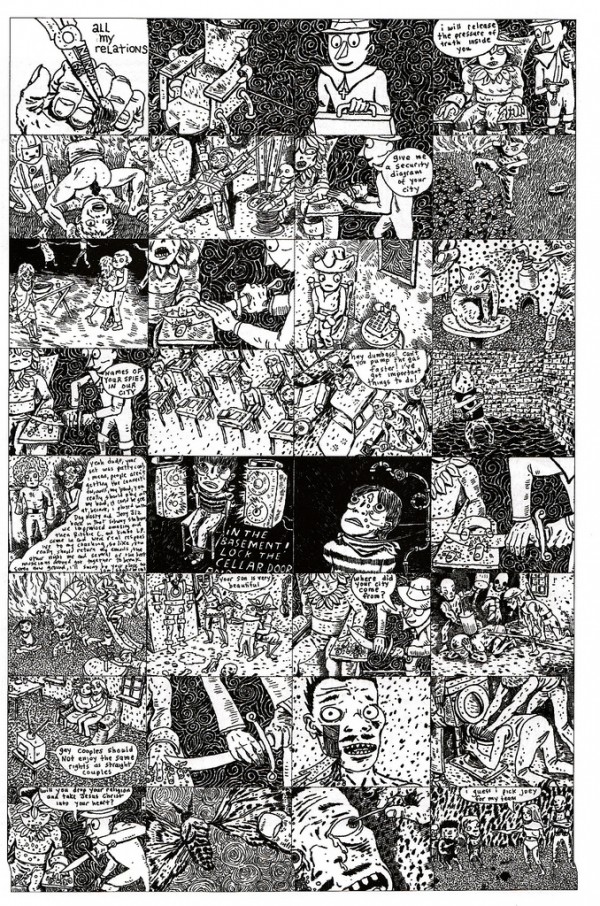
I'm not sure there's much of a positive spin that can be put on the closure of Dan Nadel's
PictureBox Inc. unless you take the approach that it's all positive -- and certainly that's legitimate, as much as we'll selfishly miss the books they facilitated (and don't believe anyone that tells you that they'll all end up somewhere else). Nadel announced the closure of his boutique publishing arm from a position of strength and out of a desire to organize his life differently, not from crushing financial burden or some sort of existential panic. He even put together a nice sale that was a wonderful thing all by itself in terms of consumers picking up items they otherwise might not have been able to afford.
One humorous positive that occurred to me was how much of an open secret the closure was. It was suspected for more than a year. Dan Nadel informed his artists I think a week or two before SPX; certainly by that show it was an item of open gossip. But it didn't end up everywhere, or published, until Nadel was ready, and I think that's part of the respect that a lot of people had for the company and what it accomplished. It may also have been hope that Nadel would change his mind.
posted 11:55 pm PST |
Permalink
100 Comics Positives For 2013: Two Books From The Manga Author Kyoko Okazaki And Vertical

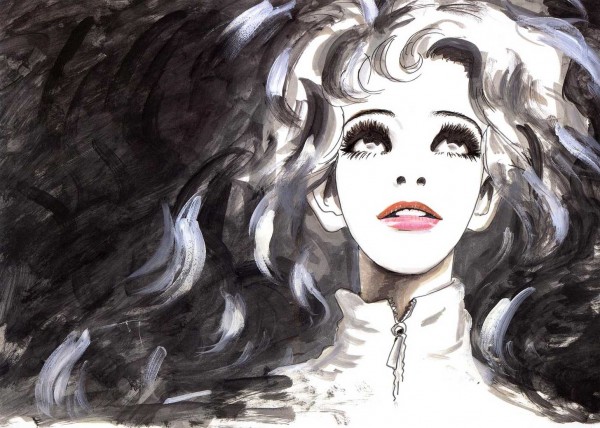
It's hard to figure out what you've seen when it comes to manga that you can still be blindsided by what you haven't. Two books from the just-turned-50 manga creator Kyoko Okazaki arrived from Vertical this year: one from the mid-1990s (
Helter Skelter) and one from the late 1980s (
the reputation-making Pink). One of the things unique to manga because it represents such a diverse array of expression is that you can read books like these and can't imagine how you haven't been alerted to them before. What is usually is that many fans have more than been made aware of this material, even English-language reading ones: there's just a level of involvement and commitment that's not present for you to have been in place to see it before. The idea that there's still so much material left in the world to unearth is an exciting one, as exciting as Okazaki's dark, humorous, giddy takes on human frailty and excess.
posted 11:45 pm PST |
Permalink
100 Comics Positives For 2013: A Few People Kind Of, Sort Of Remembered Ben Katchor Had A Book Out

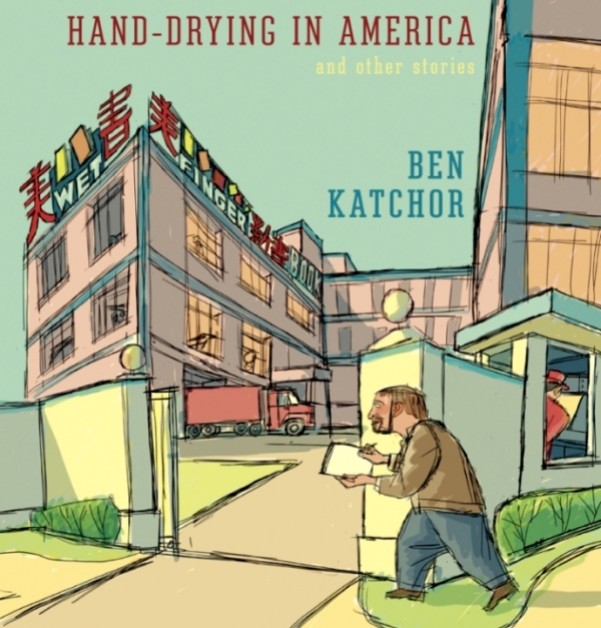
The great Ben Katchor's frequent exclusion from Best Of Lists and Year End Round-Ups is one of those things that gets brought up by comics cognoscenti late at night over coffee and pie -- or whiskey and cigarettes -- as one of those oddball indictments of a comics culture that has a hard time processing people that exist largely independent from its various commercial classifications and artistic movements. Call it The Feiffer Effect. It was deeply encouraging to see Katchor's excellent
Hand-Drying In America be the subject of press when it came out, be put on a few lists at the end of the year as one of the best comics efforts, be an object used to club other lists that pretend that his work isn't there.
posted 11:35 pm PST |
Permalink
100 Comics Positives For 2013: The Writer Matt Fraction Uses His Public Platform For Good


The writer
Matt Fraction had a big hit in 2013 with
Sex Criminals (with Chip Zdarsky) and continued his well-regarded work on
Hawkeye (with David Aja and other talented people); his other creative partners have included Mike Allred and Howard Chaykin -- he's a good year. Fraction has also maintained a commendable public profile, mostly humorous and only modestly forthcoming but becoming serious twice this year in two significant posts:
this one about his addictions;
this one about suicide. I hope that both did some of the good for which they were intended, and suspect this is so. For as much as creators' on-line personae have become increasingly coarsened into an almost constant barrage of PR indistinguishable at time from actual publicity campaign of the kind that use to be done on one's behalf, it's nice to see something that smart, and genuine and forthright not once but twice this year.
posted 11:25 pm PST |
Permalink
100 Comics Positives For 2013: Bill K. Published Ruppert & Mulot

Bill Kartalopoulos previewed his first release through Rebus Books -- Ruppert & Mulot's
Barrel Of Monkeys -- back in late 2012, but the official debut wasn't until the 2013 calendar year. It's a shame it hasn't made more Best-Of lists, but I think that's the nature of such lists more than it is the quality of this work. A profoundly funny, occasionally nasty and formally audacious book,
Barrel Of Monkeys is one I'll remember when many of the more well-heeled and respectable entries fade from memory. I hope Rebus publishes again, frequently and soon.
posted 11:15 pm PST |
Permalink
100 Comics Positives For 2013: Mike Sterling Hits Ten


The retailer and foundational comics blogger Mike Sterling
passed his 10th-year anniversary supplying content on-line this year. He is a daily stop for me and I am grateful for his contributions to my bottom-line understanding of comics retailer, Swamp Thing, and the horrors of
Diamond Previews.
posted 11:05 pm PST |
Permalink
100 Comics Positives For 2013: Helping The Sakais

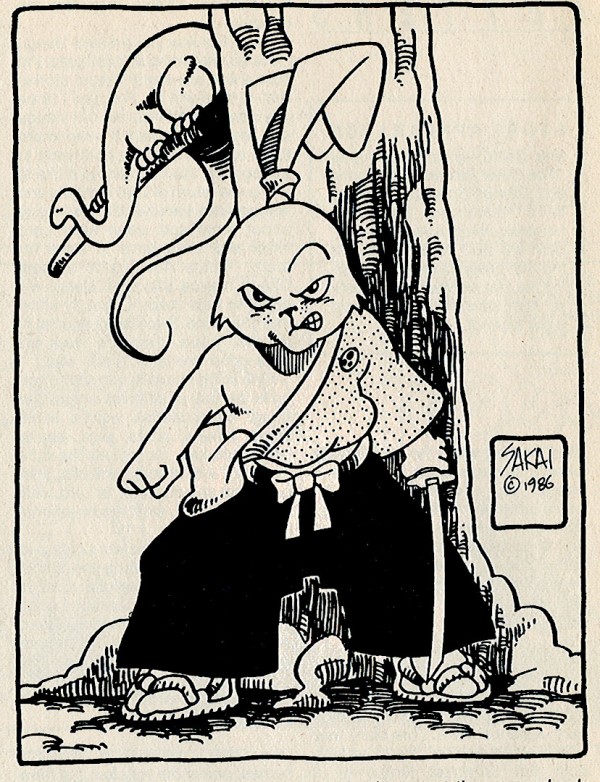
Over $20,000 has so far found its way into the hands of Stan and Sharon Sakai after
a public appeal on their behalf spearheaded by the Cartoon Art Professional Society. Several thousand more should see its way to the Sakais as the result of an art auction, for which they're accepting pieces until February. Stan Sakai is one of our finest cartoonists and classiest professionals, and he deserves every bit of attention that may benefit him here.
posted 10:55 pm PST |
Permalink
100 Comics Positives For 2013: Denis Kitchen’s File Cabinets Enroll At Columbia University

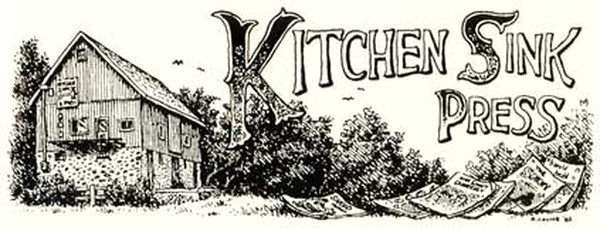
The Rare Book and Manuscript Library at Columbia
won one of the unique windfalls long-whispered about in super-nerdy comics history circles: the supposedly very complete records and archives kept by Denis Kitchen in the course of running and operating Kitchen Sink Press. Kitchen Sink published with a humongous range of important 20th Century creators, so what they have on hand adds to our knowledge of them as well as the company itself. The acquisition also marks the further ascendancy of Columbia's Karen Green as a force to be reckoned with in comics archival circles.
posted 10:45 pm PST |
Permalink
100 Comics Positives For 2013: Stray Bullets Set To Return

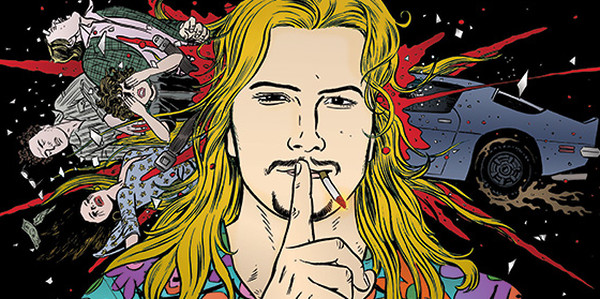
It used to be that friends of mine would occasionally mention how well David Lapham's 1990s-originating self-published crime series
Stray Bullets would fit into the current Image Comics line-up of creator-drive genre series. Now they can say that because
it will actually be part of the publisher's comics efforts. I think it's a nice thing when a series like this finds a new life and a new home, and I know a lot of comics readers were bothered by the lack of closure they experienced with the title. I hope he sells a bunch of copies and suspect he will.
posted 10:35 pm PST |
Permalink
100 Comics Positives For 2013: Joseph Hughes Saves ComicsAlliance

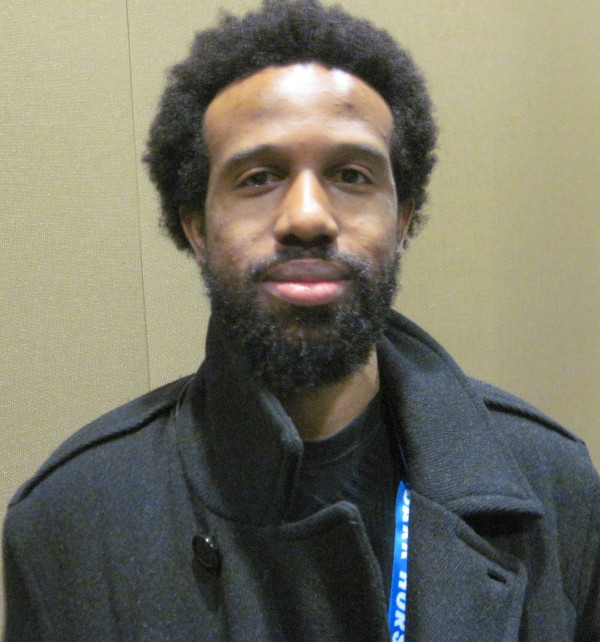
Editing a successful comics and comics-culture news site is a difficult enough gig without being asked mid-stream to find a new publishing arrangement for the entire enterprise, but that's what Joe Hughes of
ComicsAlliance did in one of the truly heroic publishing stories of the year. The popular AOL site was apparently not the kind of popular that allows a gigantic mega-corporation to squeeze more money out of the world because of a sleek and harmonious profile of what they do -- or something, I start vomiting when I try to figure this stuff out -- so Hughes found a new place for
CA with a more Internet content-friendly concern. I will be honest: I did not think this was possible when I heard the attempt would be made. The end result is a) more
ComicsAlliance, b) a bunch of us are all super-intimidated by Joe now.
posted 10:25 pm PST |
Permalink
100 Comics Positives For 2013: Art Spiegelman Relaxes

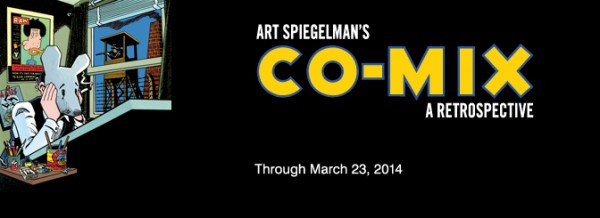
Art Spiegelman has shepherded his extensive, career-spanning museum exhibit across multiple continents, but it may not have been until a small but vibrant reception for friends and fellow cartoonists at the Jewish Museum the Thursday before the show's opening in November that he was able to smile and enjoy himself -- or at least that's how it felt to some folks in the room. Most of the reviews for the exhibit -- with a real focus on process and a surprising number of Spiegelman side-project that by themselves would constitute a considerable comics-making career -- have been positive, although Spiegelman's role as a lightning rod for... something... brought out the usual odd referendums on his relative comics celebrity and folks musing over whether or not he deserves the attention he receives. Give him ten times the attention, that's what I say; he'll do something interesting with it.
posted 10:15 pm PST |
Permalink
100 Comics Positives For 2013: Michael DeForge Takes Home Three Bricks At The Ignatz Awards

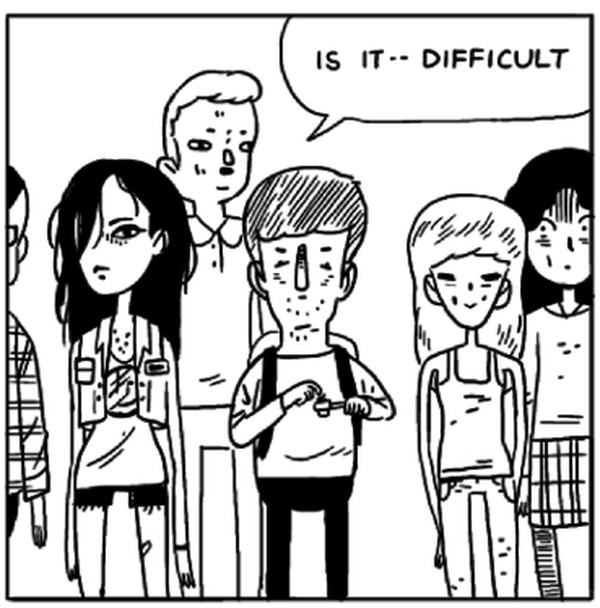
There were a lot of great awards moments in 2014 in terms of who won what and how but one that stands out a bit was
Michael DeForge picking up three Ignatzes. Awards like the Ignatzes tend not to stick with the same people year in year out -- it tends to be one of those awards where someone wins another award at some point and you think it might be their first and then you found out they won an Ignatz six years earlier. So winning a bunch at once a few years along in your career means something. The first of DeForge's books with Drawn and Quarterly is out with reviewers now, and he should continue his publishing onslaught for years to come. Let's hope so, anyway.
posted 10:05 pm PST |
Permalink
100 Comics Positives For 2013: CAB Rises From BCGF Ashes

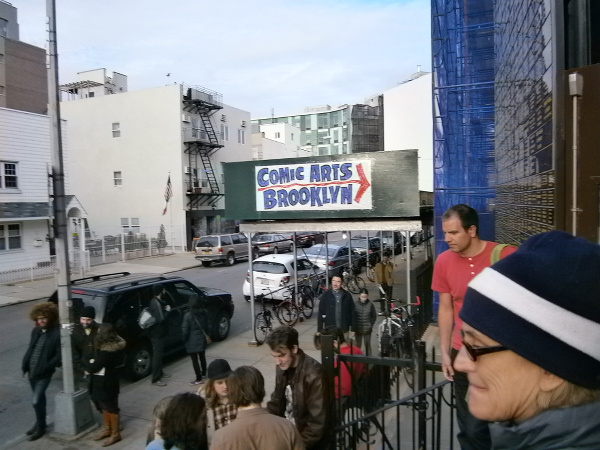
Comic Arts Brooklyn began where Brooklyn Comics And Graphics Festival ended, and did so without almost no hitch in continuity -- there may have been the tiniest drop-off in terms of attendance, as it never felt crazy, but the show was mostly packed and everyone I talked to did well. Another nice thing was that Gabe Fowler had his former BCGF partners Bill Kartalopoulos and Dan Nadel participate at the show in some way.
It was a good day for comics, that CAB day.
posted 9:55 pm PST |
Permalink
100 Comics Positives For 2013: Tagame Tagame Tagame

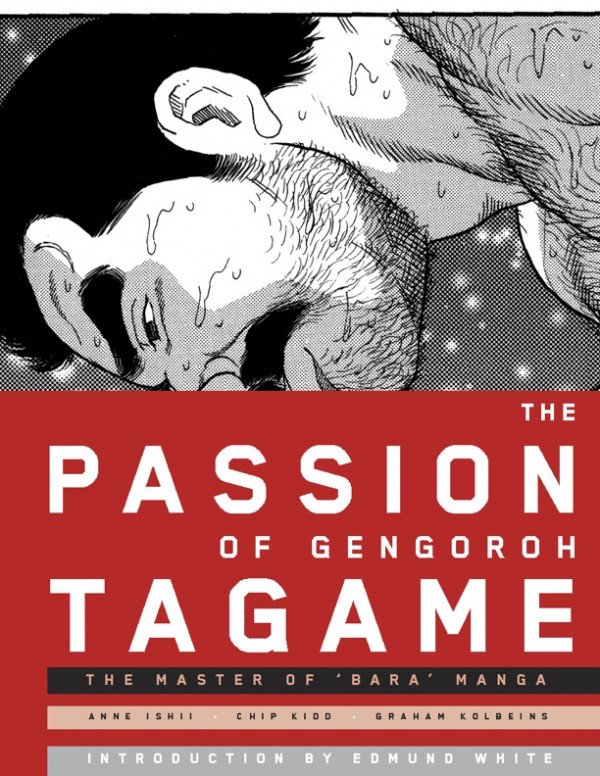
There are maybe a half-dozen points of discussion for
The Passion Of Gengoroh Tagame -- pornography, manga, gay comics, a personal project for Chip Kidd, Anne Ishii working in comics again, a significant late-in-publishing-life debut for PictureBox -- but let's not forget the comics themselves: well-crafted, festooned with body types not always seen in comics, frequently funny and occasionally brutal. I'm not sure we've seen anything like it.
posted 9:45 pm PST |
Permalink
100 Comics Positives For 2013: RASL Collected In Hardcover

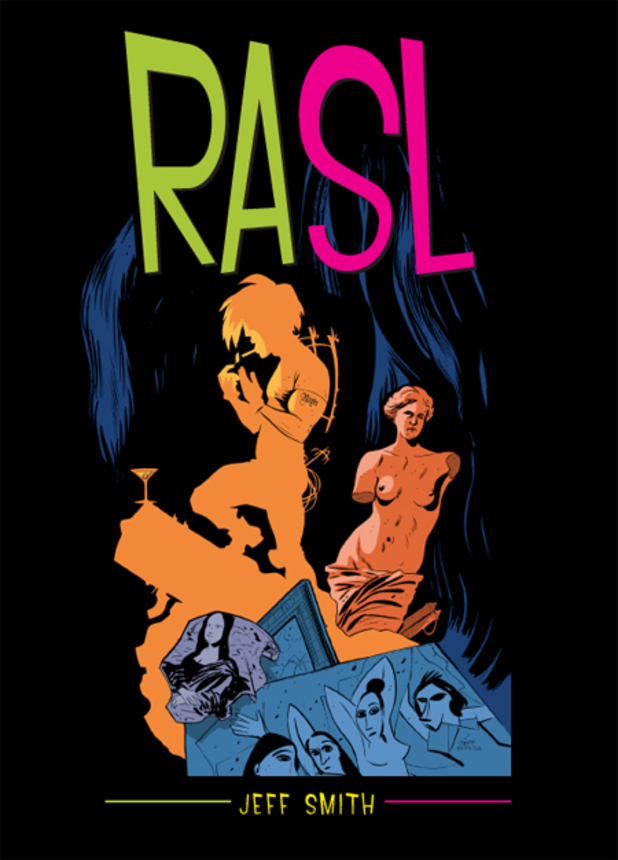
It's really, really hard to do an extended comic book series turned sizable, single-volume graphic novel.
Jeff Smith's done two.
posted 9:35 pm PST |
Permalink
100 Comics Positives For 2013: Jack Kirby Day Seemed To Have Gained Significant Momentum

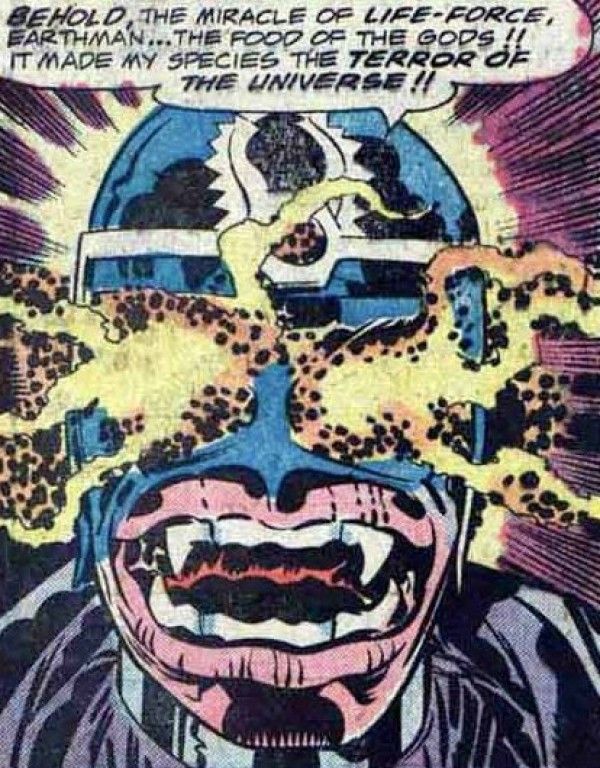
This is more a hunch than anything else, but the celebration of the late Jack Kirby's birthday every year seems to have turned the corner at some point to become more of a widespread opportunity to celebrate the life and works of someone on the Mount Rushmore of popular art creation. A big part of this is the participation of the family. This could be an even bigger event by the time the 100th anniversary of the King's birth rolls around.
posted 9:25 pm PST |
Permalink
100 Comics Positives For 2013: The Strange Tale Of Panorama Island Finally Came Out

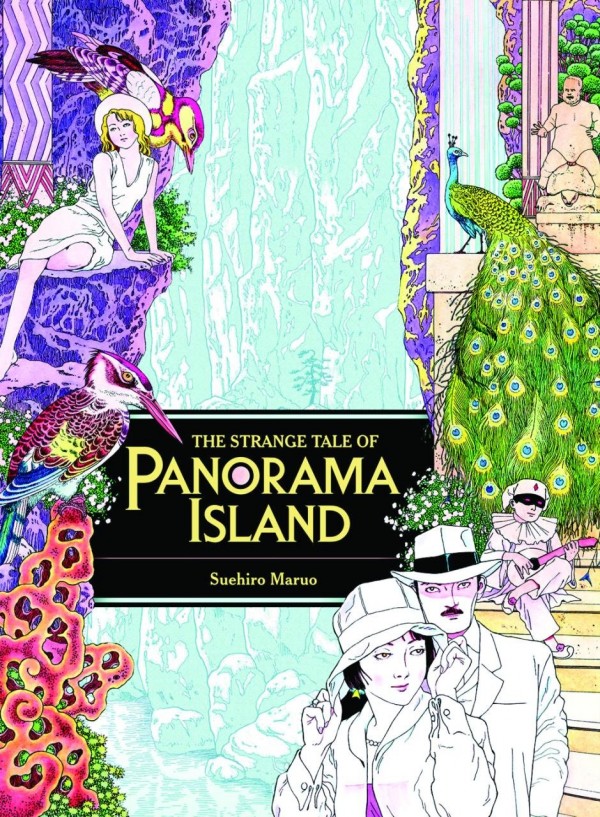
1. It seems like we've been promised this one forever; 2. It has to be the only prestige comics release featuring full frontal male nudity (kind of) right on the cover; 3. It makes total sense for this to come out in such a great year for prestige manga (its own post later today), 4. Last Gasp releases are rare enough in and of themselves that this one is worth noting on that basis alone; 5. It's very good -- weird and entertaining.
posted 9:15 pm PST |
Permalink
100 Comics Positives For 2013: Fantagraphics To Publish Another Year

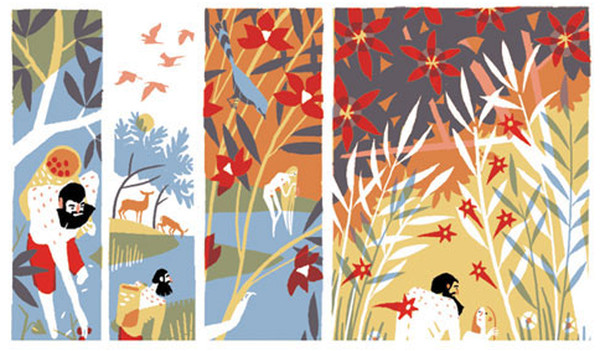
Fantagraphics
ran a kickstarter for the ages -- and perhaps one that will be remember for a very long time for its influence on how boutique publishers in all media approach raising capital -- in a way that will allow them to publish through their next season. Given what they have planned, such as the Eleanor Davis short-story collection and excerpt of which appears above, every season for a publisher like that is worth celebrating.
posted 9:05 pm PST |
Permalink
100 Comics Positives For 2013: Kim Thompson Was Remembered With A Significant Amount Of Joy


There were any number of lovely tributes to the late Kim Thompson in 2013, including the fun portrait by his friend Jim Blanchard shown above and Gary Groth's terribly moving description of their goodbye conversation. A favorite for me was one I witnessed live and in person. At the Eisner Awards several distinguished personalities ranging from Dave Lasky to Chip Kidd to Neil Gaiman took time out of a slightly raucous evening to express their thanks and admiration for the impact that Thompson had on their creative lives. It was like having Kim back for a little while, awkwardly interjecting into a rolling conversation about all things comics.
posted 8:55 pm PST |
Permalink
100 Comics Positives For 2013: We Started To Talk About Comics’ Culture Of Sexual Harassment


Talking about instances of sexual harassment, gender exclusion and the culture that enables both is never pleasant. It's even true that well-meaning, right-thinking people may disagree on the shape and scope and direction of such discussions in terms of their optimal value in moving comics from one set of understandings to another. That doesn't mean that getting to talk about these things isn't a godsend for an industry that has long needed certain inexcusable things sorted out. What isn't up for a lot of debate is the value of a ground-level call for renewed professionalism across the board and the necessity of zero tolerance for asinine behavior no matter how some may attempt to justify that kind of behavior. This needs to be talked about in every way possible moving forward, and we should all be grateful for the instances and actors that put it in the forefront of discussion over the last few months.
posted 8:45 pm PST |
Permalink
100 Comics Positives For 2013: My Friend Dahmer In Europe

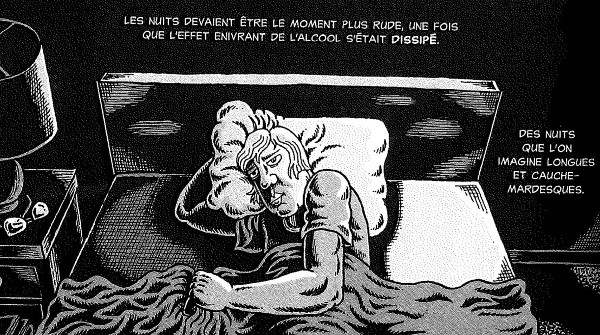
One of 2012's most-lauded English-language comics work,
My Friend Dahmer by Derf Backderf, found a significant second life in Europe,
culminating by making the Selection Officielle List at this month's big comics festival in Angouleme. One thing that's interesting about this is that Dahmer is virtually unknown in Europe, so this memoir doesn't have any of the built-in interest that met the English-language edition.
posted 8:35 pm PST |
Permalink
100 Comics Positives For 2013: Ryan Sands Launches Youth In Decline

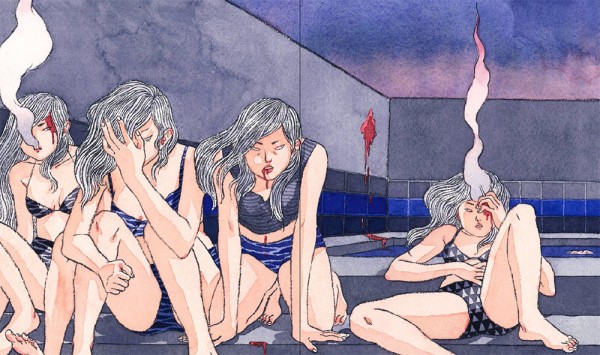
2013
saw the public debut of the first two issues of Ryan Sands'
Frontier, published under the "Youth In Decline" banner. The first featured Uno Moralez and came out for TCAF; the second gave us Hellen Jo and was out for SPX. It's not the first time that Sands has published, but it feels like this effort comes with a seriousness of intent that should help keep him around for years.
posted 8:25 pm PST |
Permalink
100 Comics Positives For 2013: With Great Power, A Surprise Hit

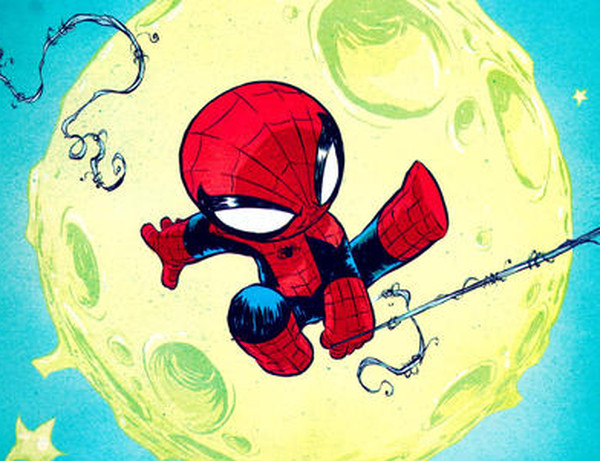
Actually, I don't pay enough attention to mainstream comic book sales number to know if
Superior Spider-Man is a hit, but it feels like one from all the other measures: I know what's going on in it (roughly), you hear a bunch from its primary aligned talent (in this case, that's mostly been veteran scribe Dan Slott) and there are spin-off storylines and plots that directly reference the original concept. There's a joke in mainstream comics about how a plot point will enrage a certain kind of fan to the point they doubly-pay attention to a comic just to keep an eye on what's being done to it. I imagine that was some of this one at the start, but people don't pay attention for this long unless there's something in there to which they're responding. Comic book lines -- or, if you prefer, eras in mainstream comic book publishing -- are made or broken not by the top-of-line hits but the solid performers editors and creative talent can wring out of standard franchises. I have to imagine that Marvel is super-happy with the way this one has performed for them.
posted 8:15 pm PST |
Permalink
100 Comics Positives For 2013: The Return Of Minimum Wage

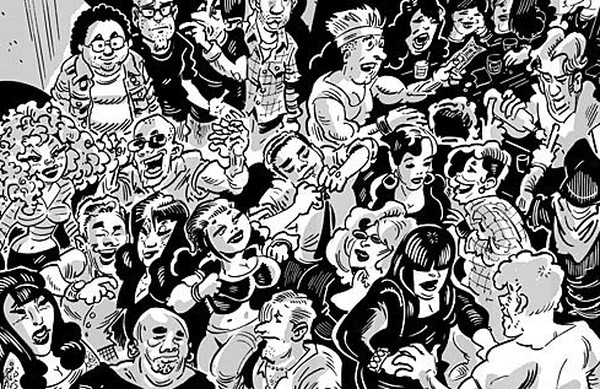
Although it's officially a January 2014 release, this site received a copy of Bob Fingerman's
re-launched Minimum Wage comic book in the mail the day before the year ended, using a single-color effect that doesn't come through in the above-preview image and plunging back in the world of the cartoonist's everyman stand-in. An oversized edition of the previously-published 1990s alt-comic series was certainly released this year. It's nice to have Fingerman back working on this project. Its arrival in trade form and now series form marks certain changes in context in comic books over the last few years: that having the writer Robert Kirkman as a fan is a great thing to be able to say right now, that Image's continuing climb gives just about any series they do a certain level of industry interest, that there are comics on the stands (
Sex Criminals) with which Fingerman's worked can be paired by an enterprising retailer, and that the rise of cable TV series provides hope for Fingerman's work as fodder for cross-media interpretation.
posted 8:05 pm PST |
Permalink
100 Comics Positives For 2013: Comix Experience Retailer Brian Hibbs Took Over Comic Outpost

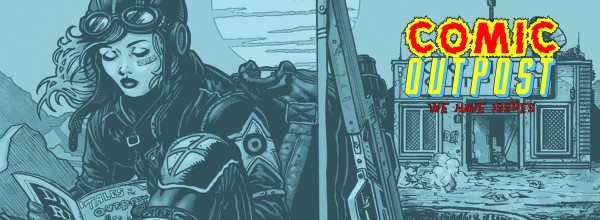
Veteran retailer/industry advocate Brian Hibbs announced his assumption of a second comic shop
here. We need as many comic shops as we can get and as many good comic shop owners -- there is no surer thing owner-wise than someone that already owns one such business. I quite liked Hibbs' shop the time I was able to get in there, and I'm sure the customers of the newly-transferred store are going to be very well-served.
posted 7:25 pm PST |
Permalink
100 Comics Positives For 2013: Julia Wertz Made Comics Again


They weren't as widely noticed as Kate Beaton's splendid flood of holiday-themed family cartoons, but as noted by the cartoonist herself,
these Christmas-season efforts by Julia Wertz mark the first time she's made comics in months and months. It was really good to see them.
posted 7:15 pm PST |
Permalink
100 Comics Positives For 2013: New Insurance Realities


There was a joke in comics that the only on-line cock-up as bad as the 2013 SPX registration snafu was this Fall's launch of an Internet interface for new health care options accessible via federal and state agencies. There have been a ton of frustrations, and I've read a few unpleasant anecdotes from comics people as well, but at least so far the bulk of those I've talked to in the comics world remain excited by the opportunity to avail themselves of greater options in this area -- and as mostly independent contractors making relatively little money, comics people fit one stereotypical target audience for a lot of the newer permutations of existing programs in addition to the newer ones. Two different creators told me that they anticipated being insured next year for the first time in more than a decade. If nothing else, this much attention on insurance options forced many creators to engage with an area of personal maintenance and upkeep that many let slide in favor of hitting the next show or making the next deadline.
posted 7:05 pm PST |
Permalink
100 Comics Positives For 2013: SPX Made Lemonade

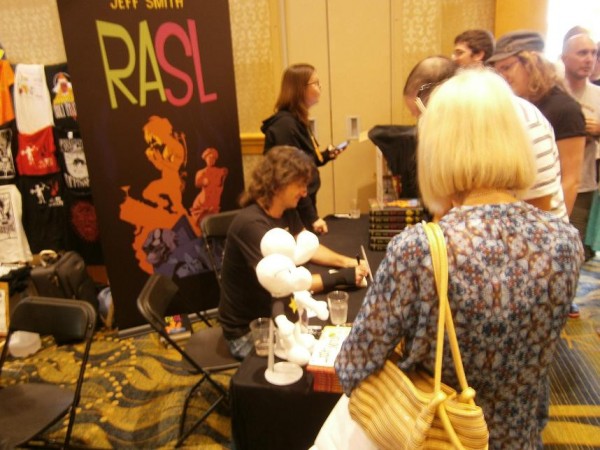
This isn't one that would have occurred to me as a positive, but a bunch of folks mentioned it via e-mail and I'm a listener.
SPX experienced a disastrous -- for a show that depends on the good will of the small press community -- initial sign-up period marked by an interest so intense it throttled the traditional channels for signing up at the essentially non-curated show. They worked through the difficulties as best they could, they did not assume the comics-industry defensive crouch and start yelling about unfair treatment at the hands of those complaining, and they worked out the best solution they could, including opening up the show for a bunch more exhibitors. This came at a definite risk in terms of upsetting a fruitful balance between attendee and exhibitor that's marked the show the last half decade. While there was some grumbling in that direction, for the most part the 2013 show vibe was positive, and marked by that enormous number of new exhibitors on hand and big lines for legitimate heavy-hitters like cartoonist Jeff Smith and Congressman turned comics-maker John Lewis. In December, the Expo announced a mostly-lottery system designed to diminish the hassle of signing up while keep the show's ethos of non-curated access.
posted 6:55 pm PST |
Permalink
100 Comics Positives For 2013: ECCC Became A Seattle Thing


Sure, sure, sure, Seattle's
Emerald City Comicon continued its growth in stature as an early, just-short-of-national-although-maybe-that-measure-no-longer-makes-sense show with which to reckon in the world of comics: like Baltimore and Charlotte, it's one that most creators in North America and certainly everyone within one day's driving distance makes a firm decision whether or not to attend. It's on the mind, and will stay there: the comics creators in attendance seem to enjoy it greatly, as the show has retained its comics focus while folding in genre entertainment features, and the mid-sized companies seem entrenched in a way that won't be shaken loose if anyone out there decides now is the time to exhibit. What was clear on the ground this year, though, is how the city has taken to it: every Seattle comic shop for a week leading up to the show was beset with phone calls from folks looking for tickets; there were local media features galore; there was signage on the buses; none of my dozen or so friends still in Seattle that don't work in comics asked what I was doing in town. Conventions are tricky at every size, but having the gut-level endorsement of a city's cultural state-of-mind is a threshold that many shows never cross; it should also benefit those looking to partner with city governments in other places.
posted 6:45 pm PST |
Permalink
100 Comics Positives For 2013: Steven Grant Got A Payday


I don't know how movie deals work except for the fact that in comics many of them are exploitative because of the original agreement and that one hears that the movie contracts themselves are tougher than ever due in part to huge surge of interest in supplying material for that kind of creation. I also don't know anything about individual contracts. My personal impression, however, is that the writer Steve Grant -- a solid veteran of comics-making and an important figure in writing about comics on-line -- was happy with what he received for a movie version of his
2 Guns work, and it was nice to see him in San Diego
and before and after back on-line writing a bit. Hopefully we get to the point where this kind of thing isn't noteworthy at all because it's ubiquitous, and the rewards from the comics themselves grown in significance to the point where everything else is gravy, but that shouldn't change our happiness when something like this works out for a creator the way they intended it to. I hope my hunch is correct.
posted 6:35 pm PST |
Permalink
100 Comics Positives For 2013: Carter Scholz Reviewed Dash Shaw


There isn't a long list of stand-up-and-notice-when-they-write-about-comics critics -- and we all have our favorites -- but there was something particularly nice about one-time bedrock of
The Comics Journal in the days of its rapid, ambitious growth Carter Scholz
engaging with Dash Shaw. Part of it may be the difference in age: Scholz turned 60 in 2013; Shaw turned 30. It's much more common for occasional critics of comics to write about someone of their own generation when they put idea down for consumption. Part of it is that Shaw's
New School was under-examined in the general. My favorite thing, though, was to hear Scholz's forceful yet conversational voice discuss the work in a way that indicates he has tracked Shaw through past efforts. That Carter Scholz writes about comics occasionally is wonderful -- and the Nadel/Hodler
TCJ has done a great job of bringing in the magazine's traditional heavyweights when they can -- but that Scholz seems to be reading them independent of that writing, that really cool.
posted 6:25 pm PST |
Permalink
100 Comics Positives For 2013: Peter David Came Home Early After Suffering Late 2012 Stroke


The popular mainstream comics writer Peter David suffered a stroke while on a Disney-themed vacation in late 2012. His recovery, buoyed by the support of family, his fans and creative peers, went well enough
that he was able to go home after less time in initial recovery than it was initially believed he would need. Kathleen David, one of the very best bloggers to read about life in a comics-oriented creative household, provided a one-year-later update on the writer's recovery
here.
posted 6:15 pm PST |
Permalink
100 Comics Positives For 2013: Kate Beaton’s Christmas Comics


They were very entertaining, and while not a total surprise -- she's done comics like this before -- you can't say you expect a comics-maker of that quality to do that many comics at any time during the calendar year let alone Christmas.
posted 6:05 pm PST |
Permalink
100 Comics Positives For 2013: Portland Gets An Alt/Arts Show

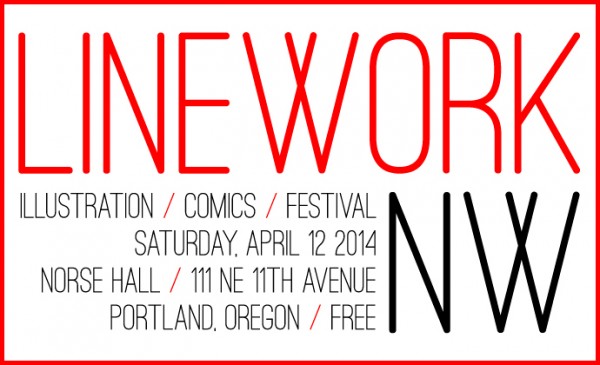
Portland is a great comics town and had a few comics shows in 2013: The Projects, Rose City, Stumptown and a Wizard show. With Stumptown deciding to end its status as a stand-alone show in favor of a partnership with Rose City, that provided Zack Soto and Francois Vigneault with an opportunity to run a more traditional small press show,
Lineworks NW, starting in April 2014. I hope to be there.
posted 5:55 pm PST |
Permalink
100 Comics Positives For 2013—David Collier Wins Award, Acts Like David Collier


Veteran cartoonist David Collier
won the Pigskin Peters portion of the Doug Wright Awards evening in May, and proceeded to tell a long and rambling story that made little to no sense in accepting the honor. Those that had never seen Collier in person before were astonished at how odd and affecting it was; people that had experience with Collier weren't surprised at all. Everybody laughed. It was hard not to feel good for this devoted comics-maker.
posted 5:45 pm PST |
Permalink
100 Comics Positives For 2013—Hellboy Turned Twenty


Mike Mignola's Hellboy character turned twenty this year. That is a fun character, the comics in which he stars are and which he's inspired have been an excellent vehicle for Mignola's unique visual sensibilities, and as a property it's been managed extremely, extremely well. It's only in comics that you tend to look at franchise work with such admiration, I think because 1) there are more talented cartoonists than there are opportunities for them to make comics, 2) a lot of the franchises and properties are used in a depressing way. I imagine you could go to the comics shop and buy nothing but comics spun out of the creation of this character; what's more, that's a relationship with comics I would totally respect.
posted 5:35 pm PST |
Permalink
100 Comics Positives For 2013—We Saw A Lot Of Chris Ware At Festivals And Conventions

This actually started in Fall 2012 as
Building Stories rolled out, but we've seen a lot of Chris Ware on the road the last 15 or so months, perhaps more than we'll ever see from this tremendous cartoonist. Ware is a funny, articulate and honest speaker about comics in addition to his considerable talent as a cartoonist, so it's always good to encounter him out on the road. Here he is at the Edinburgh Book Festival.
posted 5:25 pm PST |
Permalink
100 Comics Positives For 2013—Dean Haspiel’s Affecting Honesty On His Career To Date


On January 2, 2012, Dean Haspiel's holiday interview here at
CR laid out some of the very human, potential costs of staying in comics for several years at a time. Honest assessments like Haspiel's on that day are still a rarity, and shouldn't pass without our appreciation.
posted 5:15 pm PST |
Permalink
100 Comics Positives For 2013—Rising Star Brandon Graham


Becoming a cartoonist of note with one foot in the independent comics world and the other in the mainstream comics world may be the most difficult trick to pull off, but
Brandon Graham has come as close as anyone has in the last 15 years. Graham's team-executed
Prophet continues to be one of the best big-publisher comics going, and his own work continues to develop in idiosyncratic, increasingly lovely directions -- his art book from PictureBox was one of the slightly-below-the-radar pleasures of the late Summer/early Fall. I stole the above from
this photo-driven travelogue by Robin McConnell; Graham is one of the few people where I know people that made an effort this year to go to one of his appearances just to meet him.
posted 5:05 pm PST |
Permalink
Go, Look: Drawing Strength From My Grandfather

 posted 3:30 pm PST
posted 3:30 pm PST |
Permalink
Happy 47th Birthday, Nick Abadzis!

 posted 3:00 pm PST
posted 3:00 pm PST |
Permalink
December 30, 2013
 CR Holiday Interview #13—Ed Piskor
CR Holiday Interview #13—Ed Piskor

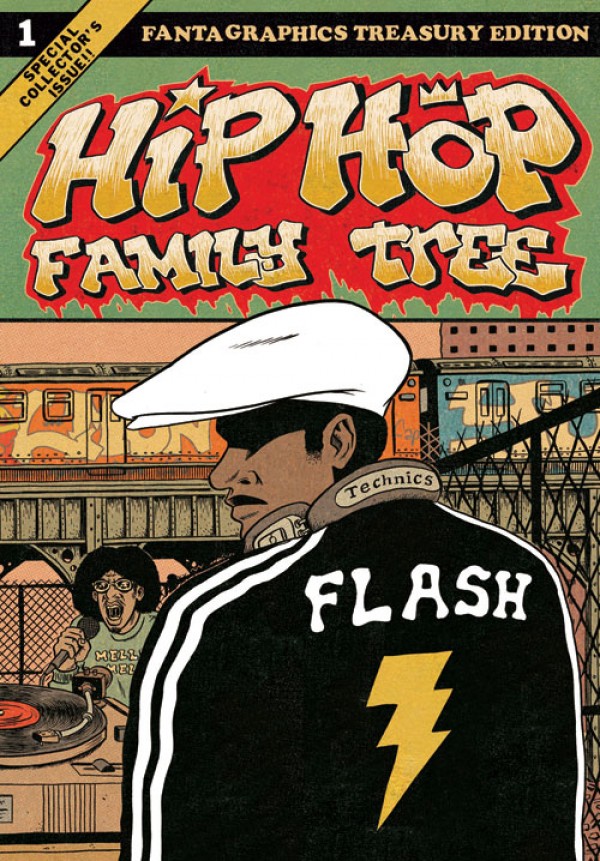
*****
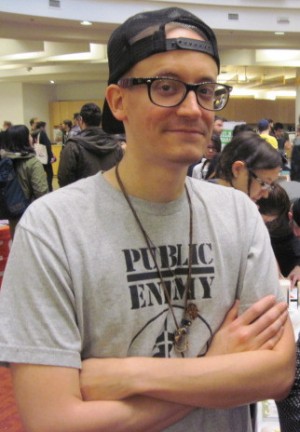
It's my great pleasure to end posting at
CR for the year by running an interview the cartoonist
Ed Piskor. Piskor is one of a thriving group of Pittsburgh-area cartoonists that have become a frequent presence at comics shows east of the Mississippi. He's a comics lifer: first a fan, then a maker of comics like those he was reading with ambitions of comics stardom, then briefly a student at
the Kubert School, then a mini-comics maker, then an artist that caught the eye of
Harvey Pekar, then a working cartoonist writing his own material again and slowly building an audience through works like the phone-phreak driven
Wizzywig. Piskor's latest project is
Hip Hop Family Tree, a history of the sub-culture that focuses on the small sprawl of neighborhoods and interlocking relationships which changed American pop expression. His publisher is
Fantagraphics. I always enjoy talking to Ed and was happy to get a chance to ask him about this latest work, one of the defining releases of 2013. -- Tom Spurgeon
*****
TOM SPURGEON: A real basic kind of opening question: where are you with the cycle of Hip Hop Family Tree
Vol. 1, Ed? I'm guessing you're still doing publicity right now. You've traveled a little bit for it, I think; where are you right now in what you have to do to get word of your book out there?
ED PISKOR: We sold out of the first printing. It sold out before... I guess the way
Diamond works is that it takes two weeks for a book to hit every store that Diamond distributes to. Two days after the first batch of stores got their comics, the Friday of that first week, they called Fantagraphics and said we needed to print more. So it's doing good, man. For a couple of months, starting in September with
SPX, I did a lot of traveling, every weekend going to different book festivals, arts festivals...
I spoke at this symposium in Chicago that had Buzz Aldrin giving speeches.
SPURGEON: That's right. I saw that.
PISKOR: The comic has opened up a lot of cool opportunities outside of the comics microcosm, which has been pretty cool.
Right now -- at this very moment -- I'm inking the last two pages of book two.
SPURGEON: So you're that far ahead. Now, you're devoted to a yearly cycle with this series, am I right?
 PISKOR:
PISKOR: Pretty much. The second book should come out for
San Diego Comic-Con. I had the first book almost complete by the time I decided on Fantagraphics as the publisher. So I was already pretty done with that. It's going to stabilize into being an annual thing for a while.
SPURGEON: I heard that you're contracted for multiple books, but I also heard that maybe you don't know how many books the series will be. Someone told me that you're sort of feeling your way through the books, and don't know how many books the whole thing may encompass. The idea is that you don't know yet what you'll end up spending a lot of time on, that once you get into something, that pay mean an extra four pages here, and extra six pages there, and that this could add up. Is that a fair assessment? Or do you have a firmer idea now of exactly where you're going.
PISKOR: With each book I don't have a map of where it's going to end, but I know all the key points that need to be covered. Each book is going to be roughly the same page count: about 112 pages apiece. When the first book was winding down, the last 20 pages or so, I started seeing a very clear place of where it should end. That's also been the case with book two. So I think that's how it will end up being.
I'm signed up for six books with Fantagraphics. And if I'm still into it... this project is a part of my five-year plan. After that point we can assess. Hopefully sales will still be strong enough to warrant continuing to do it, but it's really cool -- I'm in a sweet spot right now. I'm doing the exact comic I want to, and it's working out.
SPURGEON: Have they been a good publishing partner for you? Your public reputation is of someone who knows what they want and how you want it done. I assume they've been a good partner in terms of staying hands-off and facilitating your doing what you want to do with the project.
PISKOR: They're hands-on when they need to be. They're super-receptive to other parts of the process more related to business things. Like very early on -- I put the strip up once a week on
Boing Boing. That's millions of readers a month. That's not to say millions of people read my comic, but I bet tens of thousands do. The site is not really built for comics to be read in a serial way. That space is almost like a billboard for the actual book. I told the guys at Fanta, "Listen, we have to make this book available for pre-order as soon as possible. Every week I put this strip up without the book being available for pre-order, I feel like we're leaving money on the table. This is a valuable opportunity." People pay money for that kind of advertising space. They listened.
Mike Baehr at one point said it was the most pre-ordered book they had on-line ever, by like a multitude. It's cool that they listened to that stuff. They have good suggestions here and there, too. So it's been real great.
SPURGEON: I'm not going to stick to business for the entire interview, I promise. But you're just past the age of 30... I think that's an age when artists in all media start to really pay close attention to what they're going to do in the medium they chose. At 30, you're usually no longer just taking whatever comes to you when it comes to you. There's an active thought process of your own, an idea of what you want to see happen. I wonder if that is true of you, and I wonder if that is true of you and this book. This seems like a very ambitious project, Ed, something in which you're very invested. You see yourself settling into projects like this from now on, or is there still going to be an element of winging it?
PISKOR: This project in particular... this is a comic I want to do. I want to see it through. It's a chunk of good fortune that people are responding well to it. I think I would still do it anyhow.
I have to make this stuff work for me. So I'm very conscious of the business part of it. I can't just do exactly what I want to. By the way, to go with Fanta was a little bit of a gamble. I had some other publishers that were interested, and I could have made more up front money doing that. I had a very specific idea of how I wanted it to look to create the experience I wanted. It had to be this big, over-sized treasury format. That was a no-go for a lot of publishers. I have these yellowed pages to go with the artwork; a lot of the publishers wanted to drop that background layer and leave the pages white. That would destroy -- the color is based on that yellow. There were all these problems that were mitigated just by going with Fanta. I am invested in this project in particular. Whatever I involve myself in I'm going to be invested in it.
SPURGEON: We both know there's a fine line in comics. We both know people that don't have a ton to offer in terms of the comic, but they're extremely business-like. We also know folks with a lot to offer in terms of the comics they make, but are constantly getting in their own way. It seems like it's tough to find that balance in comics: letting your artistic impulses drive the car, but be open to hearing from the business-minded guy in the passenger seat. You've been around long enough to see people fail for all sorts of reasons.
PISKOR: For sure. If there's one thing that I've discovered meeting cartoonists, and even cartoonists I would call my heroes, I learned and realized that a lot of people are their own worst enemy and they create their own glass ceilings and stuff like that. It's all this logic and they have these personal, limited beliefs that create barriers to what they do. So realizing those sticking points, seeing them in other people, I'm just trying to take care of that so as to not inhibit what's possible.
SPURGEON: You're actually younger than hip-hop. So by the time you were aware of it, it must have been ubiquitous. You can't remember a time hip-hop wasn't around.
PISKOR: That's correct.
SPURGEON: I imagine that's true of comics, too, of course. They were around as well. But hip-hop... the book has this unique take on the role of scene
. It's very generous and solicitous towards the regional aspects of hip-hop's creation. But since your memory of hip-hop was shaped by it having gone national, I wonder how you started thinking about hip-hop so that it became this expression of something that happened in those specific East Coast communities. Do you remember when you started to have that kind of interest, this specific conception of cultural history? Do you remember your initial curiosity?
PISKOR: Yeah, I do. It started with getting what was popular at the time. You would hear older rap records being sampled -- a line or a beat or something like that. It sort of hit the same compulsive tendencies that I had as a kid reading comic books, before I really cared about creators and stuff. It was about the stories and whatever else in mainstream comics. I would dig around looking for old comic books, like the first appearance of Cable from
X-Force. Whatever. To find Dr. Dre's first record digging in record crates and talking to people, asking around in record stores, it hit that same compulsion. Then when you dig very deep and learn about the earliest people, I feel like I'm on some of the same footing as some of those guys. I come from poor circumstances and stuff like that... it's an inspiring story to see someone come from under the radar, to see these people do cool, creative stuff.
 SPURGEON: What's fascinating about the history as you choose to portray it is that it's almost week to week and apartment to apartment and party to party and neighborhood to neighborhood in its specificity. It's very graspable, too. That was something I loved when I learned about comics, that comics history wasn't that old -- you could go to conventions and see the guys that were there at the beginning. So was having that grasp of it, wast that exciting to you, being able to grasp the entirety of it?
SPURGEON: What's fascinating about the history as you choose to portray it is that it's almost week to week and apartment to apartment and party to party and neighborhood to neighborhood in its specificity. It's very graspable, too. That was something I loved when I learned about comics, that comics history wasn't that old -- you could go to conventions and see the guys that were there at the beginning. So was having that grasp of it, wast that exciting to you, being able to grasp the entirety of it?
PISKOR: Yeah. It is cool. It is cool. If you think about what we know of rap and of hip-hop, it started in a very confined space. Everybody knew everybody. It's the same for comics as well. Distribution. The distributors are the gatekeepers, so you have to know somebody that knows somebody to get something to happen. You read about the history of comics or the history of rap and you see that there are all these relationships that were required to get it to the point where it is right now. There were almost no rap records being put out outside of New York and New Jersey -- the part of the New Jersey that
Sugarhill was from was right over a bridge. Everybody in those early days, for the first 15 years, had a relationship to each other. It's fun to explore how these weird circumstances built upon themselves to create this kind of phenomenon.
Reading about that history there are other kinds of music that come into vogue and quickly disappear that people don't talk about anymore. These are things that could have been the next hip-hop if certain situations took place. I'm talking about
house music, or Washington D.C.'s
Go-go music. Those things are still around but they're not at the scale rap music grew to, and they came around the same time.
SPURGEON: You have talked about trying to double-source the incidents you depict, and you've actually complimented what you feel are pretty solid sources upon which you can draw. Is there any sorting process... did you have to make any decisions as to what you believed was real at any point, or is there pretty much an orthodoxy when it comes to this specific cultural history?
PISKOR: There are situations that come up where there might be an exciting, visually interesting narrative conjured up out of the mouth of one or two of the people that were part of the situation.
SPURGEON: What would be an example of that? Is there something in the book kind of like that?
PISKOR: This is from book two:
KRS-One's origin. He talked about being kicked out of the house. His family was poor and he at the last bit of food that was supposed to be for their dinner. He got kicked out and never went back. You can't reference... there's nothing else to reference but his words. There are tools in comics were you can take his words and you can make sure they're not your words. You can take those words and put them in his mouth, make it a story from his point of view and use captions that say things like "As the legend goes..." or something like that. You make sure that if it is some mythological thing you separate yourself from that. I'm very conscious of that kind of thing. As more rappers get in touch and tell me some crazy stuff and I can't find source material, that's how I'm going to approach it. I'm going to put it "In the words of..." There's a running dialogue in captions throughout the book, so when you switch that up you hope the reader picks up on that.
 SPURGEON: People become accustomed to your rigor.
SPURGEON: People become accustomed to your rigor.
PISKOR: When you use a different storytelling device, I hope that it creates a feeling that it's not me saying this
per se. Doing this stuff on
Boing Boing -- and I'm sure you know this from your site -- people are happy to let you know when you've done something wrong. [Spurgeon laughs] I've created all of these contingency plans. Ways to prevent damage, if there's something I'm not fully convinced might be 100 percent accurate because I can't find more source material.
SPURGEON: Were there any roads not taken? Did you consider doing one individual's story as a different way of structuring the book? One of the things that's really intriguing about this book is how fiercely scene-oriented and community-focused it is. There's this run of personality after personality after personality. Did you ever think of focusing your history, perhaps doing one person? What was the appeal of making it this broad and comprehensive of a history?
PISKOR: The appeal of doing the broad scope thing was really because of the regional nature of hip-hop's origins; I'm really fascinated by how everyone had a relationship with each other. I considered doing just a biographical comic. Even with
Wizzywig, it started out as a biography. But my popularity, and with comics in general... I think people don't respect comics or me as a creator.
To do a biography in comics you have to have access to the person -- at least as far I'm concerned. You have to be able to work with them. There were no takers. In the hacker world I approached people. I had only done a little bit of stuff for Harvey Pekar at this time, so I don't fault them -- in fact, I'm friends with a lot of these people -- but they wouldn't even respond. I had no idea how to even approach a rapper to try and tell us a specific story. In the end, I think this was the way to go. It's like the character in my comic is hip-hop. It's a biography of hip-hop and everybody is a cog in the wheel that helped created this thing.
SPURGEON: Did you think of another fictionalized account?
PISKOR: For a long time, even since high school, I've been wanting to do a comic with this kind of imagery. I love hip-hop fashion, I love graffiti, I love '70s New York films --
Scorsese films,
French Connection,
[Taking Of] Pelham 1-2-3 -- it just has that grit. I always wanted to do something in that landscape. A fictionalized account. I was thinking I could do a crime story set in this world. Ultimately, I felt like this was the way to go.
By the way, I had no idea, and I still have no idea, if what I'm doing is like, illegal. You know? [Spurgeon laughs] I have no clue. It's literally something I wanted to do. I was surprised that
Boing Boing said it was okay to publish. I'm surprised Fantagraphics said it was cool. Does that mean somebody could do a comic about me? That feels invasive.
SPURGEON: Maybe someone will get their revenge by doing a comic about you doing this comic... Ed, I'm also interested in the visual sourcing aspects of your research. Did you spend time in these neighborhoods? Would that even work at this point? Did someone take photos of that time period?
PISKOR: There were a few great photographers that really captured that scene. I'm not even sure they consider themselves... at the time I don't even know if they considered themselves photographers or if they knew what the heck they were doing or how important they were in capturing the birth of this culture. There was a photographer named
Joe Conzo -- still, he's not a professional photographer. He's a New York City fireman. He had a camera in those early days, and shot film at these live performances and block parties. I have access to some great photographs from that period. Another photographer named
Martha Cooper... when graffiti started to catch on, she saw value in that and started capturing photos of that stuff. She really captured that New York landscape in a beautiful way. There's hyperbole in the work, too, and that comes from my love of the films I mentioned earlier. That's sort of the soup my work was created out of. There a few good hip-hop flicks. There's
Style Wars and
Wild Style that helped give me visual cues.
 SPURGEON: This is a hunch on my part, but I liked the way you didn't aggressively pursue a comics solution for the music. When people do comics about music, there tends to be a dramatic choice on how to portray the work being done in that medium -- you portray the performances and the art itself in a very matter of fact style. There's not a big shift -- you can't flip through the book and easily pick out the performance pages. There's no trickery in portraying the art involved. Is that on purpose? Did you want to portray the music in this matter-of-fact way rather than making a case for it.
SPURGEON: This is a hunch on my part, but I liked the way you didn't aggressively pursue a comics solution for the music. When people do comics about music, there tends to be a dramatic choice on how to portray the work being done in that medium -- you portray the performances and the art itself in a very matter of fact style. There's not a big shift -- you can't flip through the book and easily pick out the performance pages. There's no trickery in portraying the art involved. Is that on purpose? Did you want to portray the music in this matter-of-fact way rather than making a case for it.
PISKOR: The way that I see this comic is that it's not a music comic. It's about community. It's about these people that had some ingenuity meeting each other, putting together these ideas, building off the existing ideas, and creating this big thing. It has almost nothing to do with rap. Rap is a byproduct. It's all of these people coming together to make this big thing. The music part of it is simply a byproduct of the story, the narrative taking place.
Right now, a strip I just submitted is that
Run-DMC went to the West Coast for the first time. They're basically nobodies, so they're playing this club. Two guys who work at the club are
DJ Yella and a very young
Dr. Dre -- Dre and Yella go on to form
NWA and then Dr. Dre goes on to do his own thing. He discovers
Eminem. This performance set Dre towards more of a street-level style as opposed to trying to be like
Prince or
Michael Jackson -- which is what he was doing at the time. He had on scrubs and a surgical mask. So that's what this comic is: how these guys inspired each other and weird business things that happened, just that kind of stuff. Music is almost negligible.
 SPURGEON: Are there scenes in there you were really looking forward to doing? I think in this book one of the scenes you take some time with is a famous one with Kool Moe Dee and -- I always forget the other guy's name because I think of Kool Moe Dee feuding with LL Cool J but that's later than this. It's Kool Moe Dee's beatdown of...
SPURGEON: Are there scenes in there you were really looking forward to doing? I think in this book one of the scenes you take some time with is a famous one with Kool Moe Dee and -- I always forget the other guy's name because I think of Kool Moe Dee feuding with LL Cool J but that's later than this. It's Kool Moe Dee's beatdown of...
PISKOR: Busy Bee.
SPURGEON: Right. That's a famous enough incident that when it was happening in your book I sort of remembered it as part of the lore of that world, as a famous incident. Were there scenes like that that you looked forward to doing because they were pivotal scenes.
PISKOR: Yeah, for sure. There are still a lot of scenes I'm looking forward to portraying in a big way. I consider that a paradigm shifting moment.
In book two, there's like ten pages or 12 pages devoted to the movie
Wild Style. That was a very important movie in terms of propagating a style. Just as a fan, I remember hearing about
Wild Style and how important it was for the culture. Then I saw it, and I didn't recognize anybody in the movie except for
Fab 5 Freddy and
Grandmaster Flash. So I had a million questions in my head. "If this is so important, then who the hell are these people?" [Spurgeon laughs] "What is this. What gives them the right to even be in this important movie?" I want to answer the questions you might have once you see
Wild Style. A couple of times this year -- it was
Wild Style's 30th anniversary. I opened it up in a local theater and had a 30 minute talk. I introduced the film and who the people are and who helped them make the flick. When situations happen that are paradigm shifting or are on a bigger level for publicizing the culture outside of New York, it really deserves extra attention in the comic. Maybe just a couple of pages, but however long it takes to present the relevance of a situation and its importance.
 SPURGEON: You mentioned Fab 5 Freddy. Keith Haring is in there. Jean-Michel Basquiat. So you have the wider New York art scenes... the New York arts world more generally, with Debbie Harry in there -- she would of course contributed to the popularity of hip-hop culture. Was it important to you to include these other arts figure because of their importance in how that culture was transferred? You could argue that people like that weren't involved in the core scene.
SPURGEON: You mentioned Fab 5 Freddy. Keith Haring is in there. Jean-Michel Basquiat. So you have the wider New York art scenes... the New York arts world more generally, with Debbie Harry in there -- she would of course contributed to the popularity of hip-hop culture. Was it important to you to include these other arts figure because of their importance in how that culture was transferred? You could argue that people like that weren't involved in the core scene.
PISKOR: It makes more sense in Book Two. I'm talking about hip-hop culture as four elements that include graffiti art. Graffiti is the first element of hip-hop that was able to be monetized. So in the earliest '80s, graffiti started to invade downtown art galleries in Manhattan. Keith Haring was a graffiti artist. Basquiat: graffiti artist. It was when they were brought downtown and selling these paintings -- making excellent money by the way -- as a companion piece to these art shows, they would bring the guys from the Bronx, they would bring
Afrika Bambaataa to play in these galleries. They would bring the break dancers. The whole thing.
The byproduct is that these scared white people didn't have to go to the Bronx to see this happen. These scared white people are people who might be producers of
20/20, the magazine show. They might write for
Rolling Stone. They might write for the
New York Times. They didn't have to to into treacherous territory to see this stuff happen. It was right there in their face. More opportunities about once they were on the radar of the bourgeois -- the art crowd, whatever you want to call it. Their inclusion is very important. Basquiat produced a rap record that's the most valuable rap record in history because of its artwork. It's like the cheapest Basquiat print you can get and the most expensive rap record. He deserves to be mentioned in the book.
 SPURGEON: You mention Afrika Bambaataa. Your design on him is very striking. Russell Simmons is portrayed in much the same way -- there are outsized, cartoony elements to them. Was it fun to do that with some of the characters. We talked about photo reference a little bit, and this seems like something totally different. Was that fun to work out the look of each one -- the visual signifiers? Were there things you wanted to do with the look of certain people.
SPURGEON: You mention Afrika Bambaataa. Your design on him is very striking. Russell Simmons is portrayed in much the same way -- there are outsized, cartoony elements to them. Was it fun to do that with some of the characters. We talked about photo reference a little bit, and this seems like something totally different. Was that fun to work out the look of each one -- the visual signifiers? Were there things you wanted to do with the look of certain people.
PISKOR: Yeah it's really fun. There's a lot to consider an a lot to juggle. With the iconography of comics, you can really screw things up and confuse people. You have to figure those things out. The different resources I used in comics to make sense of this huge ensemble cast, it would be things like
Chris Claremont's
X-Men or
Larry Hama's
GI Joe comics, how you can have a cast of hundreds of people. You have to have some shorthand visuals so that people are like "Oh, who is this person again?" Part of it is you want to capture personality, but I like to lock myself into costumes with these people. Per era.

As another instance, this page I'm looking at right now, Dr. Dre with his surgical mask on. I draw him with the respirator and the doctor's outfit and the fake gloves so you can immediately see it is Dr. Dre. He would wear that costume for real, so it's like let's keep him in it at all times. It's also comedic, because he's out on the street. There's no scene like that in here with him like that -- you can imagine him against the background of other buildings in his doctor's scrubs. It's kind of funny.
SPURGEON: I want to ask you some comics questions to wrap things up. When I think about guys that worked with Harvey Pekar, and when I think of your comics, I think of a baseline clarity; they seem to be very direct. Hip Hop Family Tree
seems like it would be a tremendous challenge to that, that it would be difficult to convey all the information you want to convey while keeping things moving. It's a staggering amount of information this narrative. Was that a special concern, just to make sure what needed to be gotten across got across page to page to page? Was there any working over of certain scenes, perhaps reducing what information would be shared for the sake of clarity? What were the challenges there?
PISKOR: There aren't a lot of challenges to it, because I'm giving myself a lot of personal rules and deadlines -- that helps me keep on track. Part of the aesthetic of those old comics was deadline-oriented, so I want to keep that spirit. So you have to make choices; the choices I've been making are more like life choices. I'm definitely hanging out with friends a lot less to make sure I have time to work on the strip. For each two-page strip, I spend an entire day reading material, thinking about it, playing around with ideas, etc., etc. For every two pages I try to pick things out, focus on the most visually appealing stuff -- or at least the most visually appealing way to get the information across -- and then spend the rest of the week executing the stuff.
Working with Harvey, there were certain... I didn't learn so much from him... what I learned from Harvey was basically the disciplinary stuff. "If you're going to work in comics, it takes a lot of work." We did
this book about the Beat Generation. One of the things that I took from that experience for this one is that Harvey chose a lot of good moments panel-to-panel wise. It's sort of the same format in the way of the storytelling, where there's not much panel to panel cause and effect, moment to moment interaction.
SPURGEON: They are definitely striking when it happens. You're right, it's not that way.
PISKOR: That's something I took from him. I've really developed a strong habit of comic-book making over the past nine years of doing stuff. I got into the game at 21. When I put pencil on paper with Harvey for the first time, that's when I hooked up with
Jim Rugg and
Tom Scioli. Jim was doing his first
Street Angel comics and Tom was doing stuff for
Image. Those guys are older than me; if I was 21, they were 26 or 27. That's a big gap.
SPURGEON: It is.
PISKOR: I was a real jerk-off. Having access to Jim and Tom has pushed my work five years ahead of where it might be not having them as friends. I see what it takes to be a cartoonist. Part of it is me just trying to stack up to them, live up to what they do. Did you ever read
the Malcolm Gladwell book bout outliers?
SPURGEON: Sure.
PISKOR: He talks about that there's a shocking percentage of
NHL all-stars that were all born in January because of some weird Canadian weird cut-off date to play hockey. They snuck in under the wire. They were younger than everyone else and they were smaller than everyone else. So they had to work ten times harder. I'm not saying I'm an all-star, I'm just saying I'm a young dude that have privileged access to these guys who turn out to be some of my favorite cartoonists working today. I see what it takes. It's been beaten into my head for a long time. The comic-book making part of it, there's a lot to consider, but it's never daunting. It's already a strong habit.
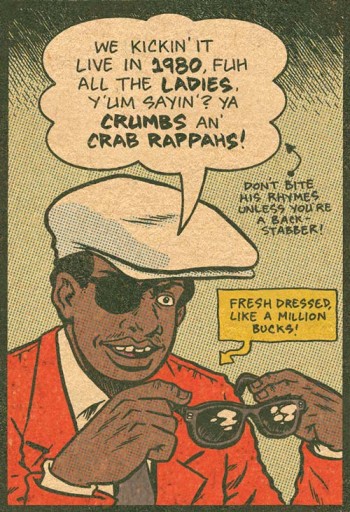 SPURGEON: What is the key element you find satisfying about doing comics? You talked in your interview with Marc Sobel about comics at one point having a therapeutic effect for you. When you were a young guy they were a way to get over some feelings of isolation that came after getting over some health issues. Comics was a way you processed your life. I always wonder after pleasure with cartoonists, though. You have talked about the fun of doing work set in this time period, so obviously you've thought about doing comics in terms of fun and enjoyment. But what is it for you: is it the process? Is it getting work done? Is it
SPURGEON: What is the key element you find satisfying about doing comics? You talked in your interview with Marc Sobel about comics at one point having a therapeutic effect for you. When you were a young guy they were a way to get over some feelings of isolation that came after getting over some health issues. Comics was a way you processed your life. I always wonder after pleasure with cartoonists, though. You have talked about the fun of doing work set in this time period, so obviously you've thought about doing comics in terms of fun and enjoyment. But what is it for you: is it the process? Is it getting work done? Is it having
work done? Is it getting to see it reflected back towards you when people read it? Do you like the time you spend cartooning? You seem so devoted.
PISKOR: I personally feel like I get a lot of rewards from doing comics. The actual process of making comics is so fun to me. It's probably the most fun I can have. I'm sure that people will look at this and go, "Oh, that's pathetic." [Spurgeon laughs] You can think that. But I do not bind myself to any societal standards at all. You can think I'm a loser; I'm having a freaking ball. I think about the times when I was a little kid really, really frustrated with myself that I couldn't draw something the way I wanted it to look. I still can't! But it's getting better. As a kid I kept drawing because I noticed the next time I drew something it would get a little bit closer... so I have this privileged opportunity of meeting goals. I set goals for myself and I accomplish them. There's a feeling to that I can't even explain to you. That's how it goes with the production stuff.
I'd be lying -- and by the way, I think all cartoonists who have publishers and who put stuff out into wide release, I think
they'd all be lying if they said they didn't want people to see the stuff and provide a reaction. That's cool, too. Positive and negative. The negative doesn't cramp my style. It either helps me to work harder, if it's negative feedback from somebody I respect, or if I think they're a douchebag I'm going to ramp things up ten times more to just kind of fuck with them. That's fun. Going to conventions and stuff... I've made some really, really great friends. You know from going to conventions, too, you'll see two people talking who are obviously and clearly strong friends in a really deep conversation and they could look like they're members of different tribes. I've been making friends I know I would otherwise never make because they would think that I'm an asshole or maybe I think they're a douchebag, just from the first visual reaction that you feel inside. Whatever that initial instinct is. So that's been really awesome, making cool friends over the years. I'm a lifer, Tom, and it's no joke. And there's all aspects of it I find enjoyable.
SPURGEON: I heard different cartoonists talk this Fall that basically said they developed style after failing to match the standard provided by a stylistic role model. Their own style was not being able to draw like their hero. Do you have ideals, are there signposts, are there people you wish you could draw like? Are you jealous of anyone's specific skill? Or are you really comfortable with what you do at this point.
PISKOR: I look at people's work a lot and try to see what I can steal from it. For myself. I definitely have cartoonists who are my favorites. I consider myself a good student but sometimes I am a slow learner with certain things. To the point that it embarrasses me. One of the latest things, one of the eureka type moments I've had, is a few years ago I was revisiting a few comics that really inspired me to move forward as a cartoonist. I'm thinking of stuff as varying as
Dark Knight Returns and
Love & Rockets the magazine issues. These are comics I read very early on. At the time when I read them as a kid, I wanted to grow up to make comics like those guys. I wanted to make my
Love & Rockets-type comic. I wanted to do something with the same spirit as
The Dark Knight Returns. Revisiting that work after so many years -- I would read them on and off again, but I had this eureka moment this time where I was thinking, "I will never in a million years be able to do this kind of comic." I guess as I've become friends with and talked with other cartoonists, I could see how parts of their psychology crept into their work. I realized that you have to put a certain amount of yourself into the work, right? That's when I had this realization, I think. Not just, "Oh, man, I'm never going to be able to make comics like this."
I have to look within myself and figure out who I am and see what I can bring to the table that no other cartoonist have an interest in or whatever. That's how
Wizzywig came about and that's how this hip-hop thing comes about. I don't think there's another cartoonist who can tell this story the way that I'm doing that. I believe that with some confidence. Don't get me wrong: there are other cartoonists who have hip hop flavor and are inspired, but the way that I'm doing this, I'm really trying -- as cliche as it sounds -- to make a comic I want to read. So I'm putting what I want in there. It's cool there are other people down with this and see where it's going. They're along for the ride it seems.
 SPURGEON: Let me wrap this up with a fan that's partly a question for you as a fan. Is there a character in your book that surprised you -- maybe one you liked that you didn't think you'd like, or someone whose scenes you grew to particularly enjoy doing. Is there anyone in there like that?
SPURGEON: Let me wrap this up with a fan that's partly a question for you as a fan. Is there a character in your book that surprised you -- maybe one you liked that you didn't think you'd like, or someone whose scenes you grew to particularly enjoy doing. Is there anyone in there like that?
PISKOR: There's no one in particular, but there has been some interesting stuff that's come up through my own research an interests. I have tremendous respect for Kool Moe Dee. I've had it for years, but it developed over a lot of time. I remember for first grade, for music class, we had to dance -- we did some sort of dance thing to that song he did, "
Wild, Wild West." You remember that?
SPURGEON: Sure.
PISKOR: I recognized that as a piece of garbage in the first grade, so I always thought he was cheesy. But then when you discover his root and where he came from and how he listened to record executives to create that kind of style, where kids could listen to his lyrics and learn them -- he slowed his style down a lot. Then you realize he just kind of sold out, but he had a very, very strong foundation. But there's not like one character where I'm like, "Oh, this guy's the man."
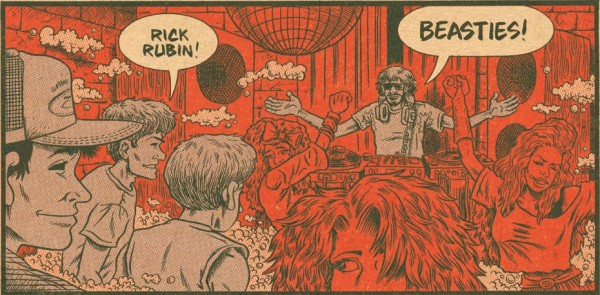 SPURGEON: I wondered, because the work is so egalitarian. You have such an even-handed approach to your entire cast: no one's a bad guy, no one's a hero. I think that's an interesting way to portray a scene like that.
SPURGEON: I wondered, because the work is so egalitarian. You have such an even-handed approach to your entire cast: no one's a bad guy, no one's a hero. I think that's an interesting way to portray a scene like that.
PISKOR: Some people have criticized the way I do Russell Simmons. Early on, there are even flicks you can watch where he's got this funny eye, and he lisps a lot, and he was this flamboyant, wild character back in the day. They look at Russell Simmons as the way he portrays himself now: this meditative, Zen Buddhist yogi-type guy. A vegan. He absolutely did not start out that way. If I have my druthers with this story, you'll be able to see him develop over time as he becomes this sophisticated guy, a more worldly person and more considerate. But that's going to play out over time. That's not something you're going to fit into a first book.
The Beastie Boys are the same way, man. They're pretty wild and crazy; their first album, they were going to call it, "Don't Be A Faggot." These are the same guys that spearheaded the Tibetan Freedom Concert, and became altruistic and philanthropic. These people start off very young, and we're all jerk-offs when we're young. Their stuff is just on record.
*****
*
Ed Piskor
*
Hip Hop Family Tree Vol. 1
*
Hip Hop Family Tree Vol. 2
*
Hip Hop Family Tree at Boing Boing
*****
* all images from
Hip Hop Family Tree except the photo which is about two years old and was taken by me
*****

*****
*****
posted 4:00 pm PST |
Permalink
Missed It: Jeff Smith Original Art In Close-Up

 posted 3:54 pm PST
posted 3:54 pm PST |
Permalink
Maybe One Last Thing To Do In 2013 Would Be To Consider A Small Gift To The Sakai Family

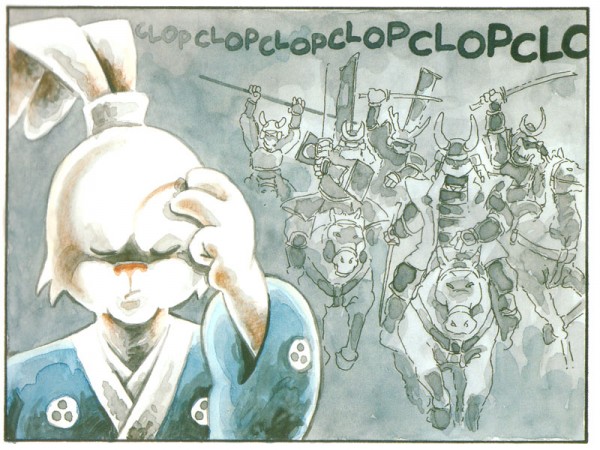
Efforts to raise money for the cartoonist Stan Sakai, caught by a shortcoming in financing necessary home healthcare services for his beloved wife Sharon, remain ongoing. The family announced an additional tragedy this week through
a posting by Sakai on his Facebook account.
You can go to a campaign page here.
It's really easy to give, and every tiny, modest amount can help in a situation like that one. I'm hoping to give another few dollars at some point today. I wish it could be more, and automatic.
Sakai is in the midst of a wholly admirable career, and to my knowledge has always conducted himself with class and significant kindness. In an arts community that can sometimes define need in terms of the desire to profit at maximum return from a vanity project or the preference to shoulder an everyday burden with the help of those that have less than the person asking for aid, I would hope there's room for an outpouring of direct support for one of comics' best at a time of real difficulty. He just strikes me as a good guy, is all, caught in an unfortunate situation; further, his career output is one of those that could hold a child's attention for hours at a time on the worst weekend of their life. Anyway, I hope you'll consider it.
posted 3:52 pm PST |
Permalink
Go, Look: My First Mate

 posted 3:50 pm PST
posted 3:50 pm PST |
Permalink
Go, Read: Becky Cloonan On Self-Publishing Comics


I quite liked
this Becky Cloonan post on self-publishing comics, as it gets into details with which a lot of similar posts don't bother, like how digital sales might become a component of those sales and the basic "why" of doing it at all. I have to imagine there's something in there if you're thinking about doing this or have done it, as I enjoyed it without having anything close to a shareable, like experience or overlapping curiosity.
posted 3:45 pm PST |
Permalink
Missed It: That Batman 1972 Image Series In One Place

 posted 3:40 pm PST
posted 3:40 pm PST |
Permalink
By Request Extra: Year-End Giving And Timely Campaigns

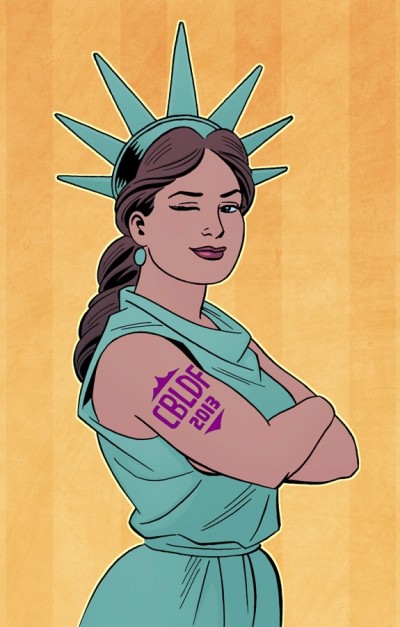 By Tom Spurgeon
By Tom Spurgeon
There are a few comics-related organizations out there that could stand to benefit from any year-end giving you might be planning today. In fact, I'm sure
all the organizations could benefit. Heck, your local comics shop could use a visit and your favorite comics pro wouldn't cry if you bought a page of original art from them. It's not the worst thing in the world on the last day of any calendar year to spend some of your hard-won money in a way you know will do some good.
A few organizations come to mind when I think about my own year-end giving, though. This year, they are:
*
the CBLDF. The Comic Book Legal Defense Fund counts on its end-of-year contribution campaign and membership campaign as key components in its overall funding activities that make possible the admirable work they do on behalf of free speech. They are a long-standing comics operation, and have always put their money to effective use. They're also really good at offering a bunch of stuff in return, if that's the way you want to go.
*
the Cartoon Art Museum. I rarely think of the Cartoon Art Museum early on when I'm making a donations list, even though I've enjoyed their exhibits the last few times I was in the Bay Area. Andrew Farago sent me a note that said in part, "the Cartoon Art Museum's in the midst of its annual fund drive right now, and Jeannie Schulz is matching donations received during our Sparky Challenge" which makes it sound like your money would double its effectiveness if sent over by midnight.
* we are going to be reminded in the next several months what a fine cartoonist Tom Hart can be;
his SAW is seeking some operating funds right now and will certainly put any money raised to use on behalf of the students it teaches.
* it's not a charitable organization, but PictureBox was an admirable company and they are ending their run as a frontlist publisher by selling
a bunch of their books off at half off for just a little more time. Next year will be poorer for that company's absence.
posted 3:35 pm PST |
Permalink
More People Should Love Mort Meskin’s Johnny Quick Stories

 for an expression of a genre built on the physically impossible, there are very few comics that capture the exuberance that must come with having the power to do amazing things; Mort Meskin's Johnny Quick always seemed to have scenes that were just Johnny Quick doing some weird task super-fast, and I loved them very much when I was a kid and saw the occasional reprint
posted 3:33 pm PST
for an expression of a genre built on the physically impossible, there are very few comics that capture the exuberance that must come with having the power to do amazing things; Mort Meskin's Johnny Quick always seemed to have scenes that were just Johnny Quick doing some weird task super-fast, and I loved them very much when I was a kid and saw the occasional reprint
posted 3:33 pm PST |
Permalink
PW: Marvel Has Killed Its Newsstand Periodical Comics Programs

According to
this smart piece by the award-winning dean of comics-industry journalists, Calvin Reid, Marvel Comics recently ended its program of trying to sell periodical comics in chain bookstores and ended its convenience store market sale of same months and months ago to the howling wails of absolutely no one.

This makes sense to me. Those are terrible items to sell in bookstores and convenience stores. They cost a lot for the perceived value, particularly for a casual reader. They're confusingly titled and numbered -- the joke of "When I was a kid there was a comic book named 'Thor' and you knew that it starred a guy named 'Thor'" has as its basis a very confusing public face for comic books. Hell,
I'm all but baffled when I go to a comics shop, and my job is reading comics. There's no reason to think there's a natural audience for these items in convenience and grocery stores from people buying toothpaste and diet strawberry jelly, and the Marvel folks at least have never invested in classic impulse-buying space near the front of such stores nor, at least never for very long, in any format suited for those spaces. Bookstore readers might seem a natural audience for serial comic books but in a bookstore you have other problems: anyone inclined to notice a rack of awesome-looking funnybooks is probably aware of a nearby business that carries more books more effectively for the hardcore consumer, and they are probably physically near a ton of publications with a better perceived value including a fairly active trade paperbacks section right in that store. It's hard to compete with cheaper, better everything.
Also, digital is clearly at this point a better place for a less risky return in trying to capitalize on any sort of easy-availability impulse that might still exist for these books. If someone sees a movie starring that nice man Captain America and has never considered buying a comic book before and is struck by intense feelings that they must buy modern comics adventures of this patriotic fellow, it's more likely their first impulse will be to hit their computer rather than the 7-11. A similar desire for beer, you hit the convenience store.
I've never thought that superhero comics had a mass appeal that was necessarily best served by this kind of a widespread availability, or at least not in my lifetime, and I've long thought that a mindset that millions of copies of these comics could be sold has frequently helped keep companies from selling 10,000 more of a bunch of different series. I will not miss the occasional throwback calls for old-timey mass distribution, nor the years of beating up on the people that suggest this as if they were ever a sizable, serious group. The astonishing thing five years from now is that it will have only been five to seven years since Marvel's program was dismantled.
posted 3:32 pm PST |
Permalink
Go, Look: Jesse Marsh Could Draw Some Tarzan

 posted 3:30 pm PST
posted 3:30 pm PST |
Permalink
Bundled, Tossed, Untied And Stacked: Publishing News

 By Tom Spurgeon
By Tom Spurgeon
* Brandon Graham
discusses his forthcoming
Empowered one-shot with creator Adam Warren.
* in that bizarre run of comics-industry news that came December 17-24
was word that we could see up to two entire volumes of
Umbrella Academy in the months ahead.
*
a George Danby collection!
* the artist and educator Steve Bissette
seems to be teasing some sort of publication of
Tyrant material, which would be nice.
* finally, wow, read the description to
this, miss Kim Thompson for being the kind of guy that routinely brought stuff this odd and cool to North American audiences, and hope that we'll see it in 2014.
posted 3:25 pm PST |
Permalink
If I Were In Tokyo, I’d Go To This

 posted 3:20 pm PST
posted 3:20 pm PST |
Permalink
Go, Look: Joe Quesada Mini-Gallery

 posted 3:10 pm PST
posted 3:10 pm PST |
Permalink
Random Comics News Story Round-Up

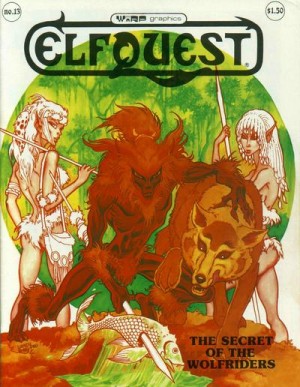
* my brother that reads comics with some devotion is four years older than me, so he got first choice as to "his" comics. This meant that I accrued some significant affection for comics that outpace my appraisal of how good they were. I enjoyed a lot of what
Elfquest did. I liked that her characters were good, broad actors; I liked the very tiny world that it offered up just in terms of numbers of civilizations on hand; I enjoyed how much of its initial fantasy story had nothing to do with spiritual evil or war. I started to lose interest right around the issue depicted here, but that's a good pretty run considering it only came out a few times a year. The wait between issues seemed like forever.
* Michael Buntag on
Pretty Guardian Sailor Moon Vol. 5. Paul O'Brien on
Longshot Saves The Marvel Universe. Richard Bruton on
Pimo And Rex,
Time To Shine,
Boo and
Megazine #343.
*
Happy Jessmas.
* Kelly Thompson picks
25 Favorite Female Characters. I have a hard time wrapping my mind around favorite characters as its own distinct thing, so this was a fun list for me to read.
Here's a similar piece focusing on new characters.
* not comics:
this Copra t-shirt looks nice.
* not comics: R. Kikuo Johnson draws
Stephen Hawking.
* finally, I'm not sure that Johanna Draper Carlson's
reason why Mark Waid isn't working for DC is the real reason Mark Waid isn't working for DC, but it's an interesting post as a critic making a strong distinction between the DC and Marvel lines as currently constituted.
posted 3:05 pm PST |
Permalink
Happy 57th Birthday, Steve Rude!

 posted 3:00 pm PST
posted 3:00 pm PST |
Permalink
Happy 57th Birthday, Lela Dowling!

 posted 3:00 pm PST
posted 3:00 pm PST |
Permalink
Happy 51st Birthday, Fabian Nicieza!

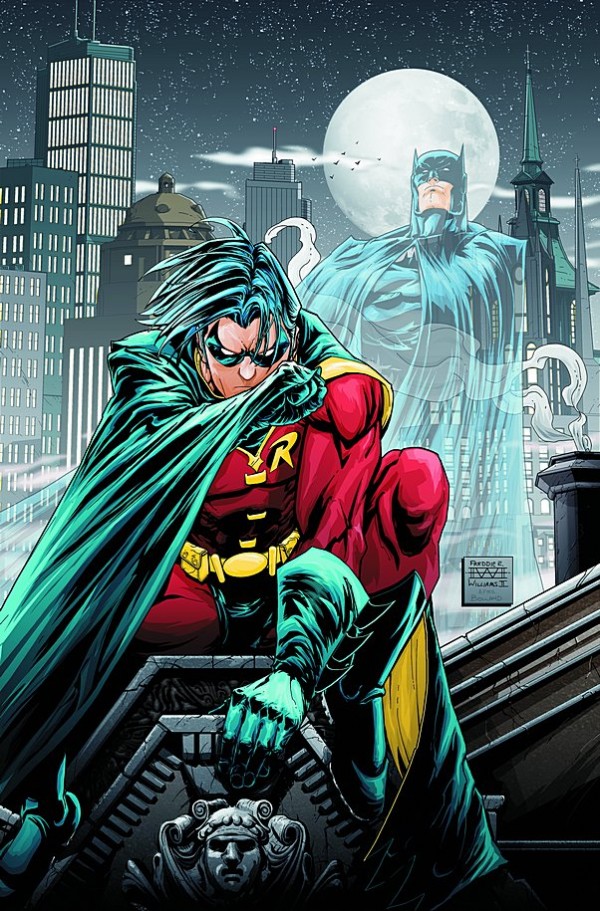 posted 3:00 pm PST
posted 3:00 pm PST |
Permalink
Happy 48th Birthday, Julie Doucet!

 posted 3:00 pm PST
posted 3:00 pm PST |
Permalink
Happy 46th Birthday, Joe Gordon!

 posted 3:00 pm PST
posted 3:00 pm PST |
Permalink
December 29, 2013
 CR Holiday Interview #12—Nate Powell
CR Holiday Interview #12—Nate Powell

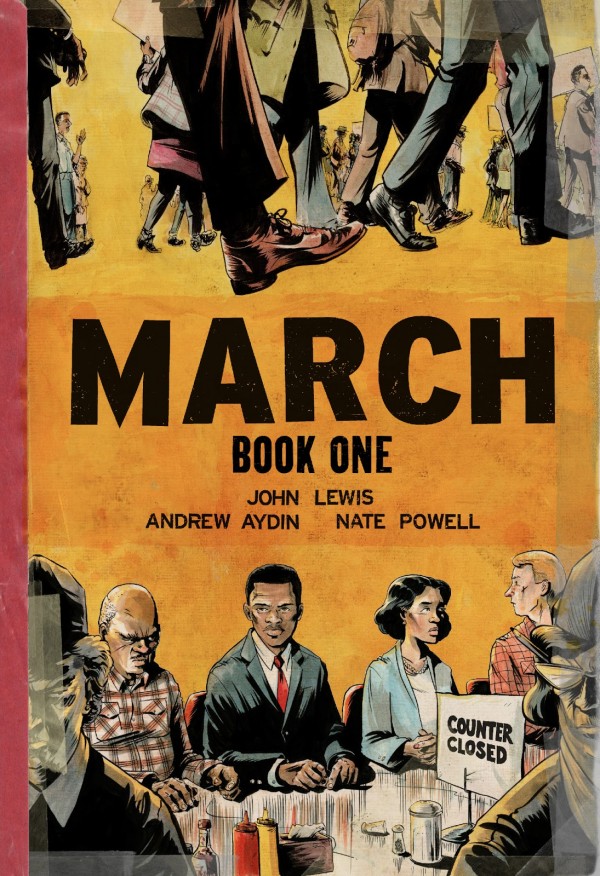
*****

As
Comic Arts Brooklyn this year, two different people cornered me to talk about
Nate Powell. Powell is the Little Rock-born musician/artist whose art on the
John Lewis history of the Civil Rights movement through his personal story
March Book One has driven more attention his way than at any point during his career. Both of the people at CAB who wanted to talk all things Powell wanted to make sure I was paying proper attention to what they thought was a potential major indy/alt career in the making. Powell is prolific, and because of his background in DIY music-making seems to take care of the small-b business end of comics-making in a way that may frustrate many similarly talented comics-makers; given the tight margins of being able to make comics of any kind, this is a supremely valuable skill set. I always enjoy running into the Bloomington, Indiana-based Powell at shows, and he was the first person I contacted this year about doing one of these year-ending talks. Our interview involved Powell moving around the house trying to find the best place for cell-phone reception, and I appreciate that extra effort. -- Tom Spurgeon
*****
TOM SPURGEON: This is one of the books of this year. This is something that will be prominent in your career, no matter what direction it takes from here, for however long you continue to make comics.
NATE POWELL: Yep.
SPURGEON: Has it performed ahead of how you thought it might? Was there a moment when you kind of figured out that it might hit with people as hard as it has hit with some people?
POWELL: Oh, yes. For the most part, when I signed on to the project, I was aware of who John Lewis was. But it wasn't until I read his memoir and was moving through the script doing my own reference that I realized exactly what I was dealing with here in terms of the initial level the scope and scale of the project. Really that was just in terms of the book that would wind up being made. It wasn't until I'd been done drawing it... I live in the middle of Indiana, I spend 23 hours a day in my house doing stuff [laughter]... really, I was in a serious vacuum while drawing
March. I finished maybe last February for
Book One. It wasn't until June rolled around when we started doing some engagements and touring and stuff, doing some events for
March about a month before it came out, that I realized that I had not really given any serious thought to the actual scope and scale of the finished product.
Ever since the book was released, there's been several months where maybe twice a week I would have a reality check that was surprising and encouraging?
SPURGEON: What kind of thing are you talking about? Are you talking about a personal encounter?
POWELL: On the immediate and personal levels, number one the enthusiastic presence and support from teachers and librarians that show up. Also from parents that brings their kids -- sometimes prepubescent kids -- to meet Congressman Lewis and to get the book. The gravity that a lot of folks -- the parents, professionals and baby boomers -- would lend to us in terms of the project. That's one thing. Another thing was the part in which
March was going places my own comics work could never anticipate going. So whether it was Rachel Maddow having us on TV, or kicking it with Al Gore [Spurgeon laughs], a variety of these things would never have happened.
The major part here is being a person that doesn't really look very much at the marketing side of comics or exactly where book are being sold, I've worked with
First Second before and
Mark Siegel was always very serious about this trifecta of marketing comics where you're hitting bookstores, the
Direct Market and libraries and schools' institutional sales. I'd heard that before, and it was very interesting, but it was something I never really worked through. With
March, I saw it fully applied and taking off, so that the bulk of the sales in years to come, a decade down the line, are consistently going to be from this institutional sector, as the book shows more and more potential to integrated into schools and libraries. That's something I had never considered, even for a second.
SPURGEON: What was brought to you? I know Andrew Aydin and the Congressman are considered co-authors are the script, or at least that's my understanding, but I'm interested in what was brought to you.
POWELL: What was actually given to me was a completely finished script, done in a very standard
Marvel/
DC comics-script type way. It was divided up into pages and panels; everything was clearly delineated. When I cracked it open, though, originally this was a single-volume book somewhere between 150 and 200 pages. I've worked with writers in varying capacities and there are different levels of leeway that the artist is given creatively. For this I was sort of taking a bit of narrative liberty, and taking control of the layout of the pages. Once I started chopping up the script and re-pacing it, that's when I realized in a couple of days that we were dealing with a 500-page book instead of a 180-page book. So then kind of everything was thrown out of the window there. The script kind of remained intact; we did a little reworking. I'd say that on terms of a narrative level, I definitely stepped in and looked for elements that were between the lines of the script that needed to be explored or fleshed out more. A lot of that had to do with intense objective or emotional experiences that John Lewis' character was going through as a young person, or whether it was looking for the emotional weight that might be happening.
For example in book two, one of the things it covers is
the Freedom Rides. There might be a five- or ten-second section where the Freedom Riders are entering the Montgomery Greyhound station. It's very quiet and dead there and they know this is a very bad sign, that there's no one there at all. They know they're about to get attacked or brutalized in some way. They don't know when, or where or what direction, or who these people might be. What the extent of the damage will be. They might have occupied a line in the script, a line that was intended to be one panel. I realized that really the dread, the anticipation, the fear, that's something that is more at the core of the storytelling than a lot of the acts of violence. So that one panel might be turned into three pages.
Since we are working this out as three books, by the end of working together on the first book the three of us had worked out a more even creative, collaborative style. Even going into
Book Two, they did a lot of rewrites on it. But a lot of that had to do with bearing in mind what I was going to be focused on as a visual storyteller. Even though the script for the story was done before I started work, it continues to sort of evolve and grow as we become sort of one narrative entity for the course of the book.
 SPURGEON: I don't know that you hear from the Congressman in a way that you know what you're getting from the Congressman and what you're getting from Andrew, but I'm interested in the fact that 1) this is the Congressman's story, 2) he may not be as immersed in comics as you and Andrew seem to be. So I wondered after his priorities: what his notes were like, and what his concerns were.
SPURGEON: I don't know that you hear from the Congressman in a way that you know what you're getting from the Congressman and what you're getting from Andrew, but I'm interested in the fact that 1) this is the Congressman's story, 2) he may not be as immersed in comics as you and Andrew seem to be. So I wondered after his priorities: what his notes were like, and what his concerns were.
POWELL: That's a very good question. One of the things that I really took for granted until I finished his memoir,
Walking With The Wind is that John Lewis is primarily an oral storyteller, and a lot of these tales he's been telling for 45 or 50 years. So I read the script to the book and immediately after that I read the memoir before jumping in to really start work on breaking down the script. There's a little bit of a speed bump where I realized that so much of the script was verbatim from
Walking With The Wind. Number one, it's coming from the same place in the same voice because it's the same writer, so I had to check myself on that. But then... I'd never had the experience of working visually with someone who is primarily an oral storyteller. There were a lot of script considerations where I would step in and do some minor edits, or all of us including
Chris Staros and
Leigh [Walton] would work on some things together. You want to keep a lot of his dialogue and voiceovers, a true to his voice as possible, but almost all of it is stuff that he's been speaking out loud primarily. So some of that simply doesn't translated. I'd never really had a scripting experience quite like it. I'd never thought about the applications of it. I'm not sure that covers exactly what you were asking.
SPURGEON: If if it didn't, I prefer your answer to my question. [Powell laughs] You talked about some of the research that you did. You live in southern Indiana, and there's a line that the South starts about 20 minutes south of Indianapolis. You're from Little Rock, which has a history in terms of the Civil Rights movement and the issues related to that struggle. You're maybe not from the deep south, although I'm not all the way sure about that, come to think of it: you might have spent several years there for all I know. Something about your book I think worth noting is its immediacy, and I think that's something you grapple with through the framing sequence. This is history about that person right over there, interacting with that person next to them. It's the Congressman's life. Dealing with that as history -- was there anything for you in revisiting this as history given you're someone who lives in the world these experiences helped create.
POWELL: That is a constant, daily presence of my mental life and process since most of my brain is
March these days. I would say that... for one, until I was in my late 20s it took until then before I was able to really integrate my own thoughts and reflections and questions growing up as a moderate liberal turned radical left generation-X kid whose parents were MIssissippian, white, baby-boomers. Most of my life was spent with a working knowledge of all of this stuff. When I was in elementary school I lived in Montgomery.
SPURGEON: Now that I didn't know. Okay.
POWELL: My parents are from northern Mississippi. I would learn all of this stuff, but it was always peppered with the statement of "That was a different time." This never gave me a lot of answers or clarity. A lot of southern kids go through that same thing. There's a lot of push-back in your twenties against that statement, against baby-boomers and political moderates -- white political moderates that are boomers -- and finally, thank God, you're able to get past that and have a real conversation about the place and time your parents came from. You can appreciate that they arrived at a better place.
With
March and with
The Silence Of Our Friends, really the work on
Silence Of Our Friends worked as a proving ground for the storytelling methods I would employ on
March. A lot of that is because it allowed me to acknowledge that there's an historical component to remain as faithful to as possible, and to maintain a certain level of responsibility. It illuminated how much had changed in the 20 or 30 years between my lifetime and John Lewis' lifetime, or in Mark Long's lifetime as a kid in Texas in
Silence Of Our Friends. Not only how much had changed, but the instances in which absolutely nothing had changed in 30 years.
It also allowed me to finally get over a degree of southern guilt I guess in terms of being able to acknowledge the wonderful things about the American South. I've lived in Indiana for ten years now. I love the town where I live but I've never felt like Indiana is my home. I don't ever think it will be. It's made me more appreciate of the culture the South has fostered in its wake. I feel like there have been a number of profound eternal changes as a result of building this relationship with John Lewis while working on this book. A lot of that I guess alongside a lot of people in my generation and my parents' generation doing a massive wave of processing of what this means 30, 40, 50 years later.
SPURGEON: I wanted to ask a few formal questions about the book. Your page layouts are fairly fascinating to me because you don't settle into any specific framework, which is a pretty standard way of dealing with material that is intended for a wider, not-necessarily-comics-reading audience. In actuality, though, your solutions on the page are all over the place. Does that indicate perhaps you were going moment to moment, story to story in terms of figuring out how you wanted the structure of the story to work on their page. Or are there general principles there I'm just not seeing, connections I'm not making. It seems like such a wide variance in how you approach structure.
POWELL: I would say that a lot of this... especially because the script was given to me in a highly structured way, that one of my necessities in working on it is to find the cracks in the structure where my weirdo self-published comics storytelling style can creep its way into it. Really stylistically for me, a lot of the moment to moment, aspect to aspect transitions that occur, and a lot of the weird flow changes are still being heavily influenced by '70s and '80s superhero comics and '80s to '90s Japanese comics that I was into when I was a teenager. I feel like... I do try to take each scene on its own. Once I threw out the page count that was given to me on the book, I realized that the door was wide open. I try to keep each scene self-contained unless there's a device or a cross-cut that means it has to end at a certain point. Once I get in there, it's liberating knowing that adding a whole extra page, or two pages, for whatever purpose, is totally okay.
 SPURGEON: There's a significant use of blacks -- something you don't see a ton of in comics for a more general audience I think because of the effect on eye flow. It encourages an abandonment of the story by novices in favor of becoming absorbed in a specific image. There had to be moments where you wanted to nail the power of a certain visual, or the effectiveness and importance of a specific moment. Was it hard to find that specific balance between flow and hitting these specific points you wanted to hit? Was pushing certain moments into black a solution for that, a way to slow the eye down without capsizing the progression of the story?
SPURGEON: There's a significant use of blacks -- something you don't see a ton of in comics for a more general audience I think because of the effect on eye flow. It encourages an abandonment of the story by novices in favor of becoming absorbed in a specific image. There had to be moments where you wanted to nail the power of a certain visual, or the effectiveness and importance of a specific moment. Was it hard to find that specific balance between flow and hitting these specific points you wanted to hit? Was pushing certain moments into black a solution for that, a way to slow the eye down without capsizing the progression of the story?
There's a page with a phone ringing that'd done with a dark background that seems particularly power for that visual choice. A lot of pages like that, really. There's a jail scene that ends with an open cell done in a kind of silhouette.
POWELL: Right. I think that a lot of that comes from
Chester Brown. When I read
I Never Liked You around 1997 or so, that changed the way I saw the page forever. It wasn't even until a couple of years later that I discovered he drew panels individually and then taped them onto a master page, and that controlled the jogging of his panels. There are some "splash pages" in
I Never Liked You that are surrounded by black in early printings of the book. All black. The use of really heavy blacks has become more pronounced in my books really with
Silence Of Our Friends and
March because I'm also incorporating grays... so instead of having --
Swallow Me Whole is an
extremely literally dark book. The art work is so stark because there's no tone in the book. I feel that we as comics readers read that a certain way. It takes on a certain quality once the grays are brought in and the highlights are brought out, where they never existed in the first place.
It does slow down the reader. It's true. There are a lot of moments in the book like that. The original script was brought to me with six panels per page throughout the entire trilogy. Once I was looking for the correct punctuation, if it was left to me I'm more apt to include a sparse splash page as punctuation as opposed to ending on a larger but traditional panel at the end of one page or in the first panel of the next page. I appreciate the breathing room very much. When I read comics... it's a little different now that I have a kid. I like to sit down and read the entire book in one sitting. It helps a lot to have breathing space in the form of hyper-minimal splash pages. I don't have the luxury to read comics in one sitting anymore, but it actually makes me more thankful to have these moments of punctuation.
 SPURGEON: Another thing that's striking about this work is the cumulative effect of the lettering. You use everything from hidden word balloons to changing size to illegibility. I wonder how instinctive that's become for you. A couple of things you do: one is the way you portray secondary dialogue almost as ambient noise, dialogue that takes place when other dialogue is foregrounded. That's a really interesting effect: you see that up top in the framing sequence in the Congressman's office but maybe more dramatically in some of the counter scenes about 100 pages in. You see the insults, for instance, via a kind of lettering that's smaller, and not as distinct. I wonder if you could talk about that as a strategy.
SPURGEON: Another thing that's striking about this work is the cumulative effect of the lettering. You use everything from hidden word balloons to changing size to illegibility. I wonder how instinctive that's become for you. A couple of things you do: one is the way you portray secondary dialogue almost as ambient noise, dialogue that takes place when other dialogue is foregrounded. That's a really interesting effect: you see that up top in the framing sequence in the Congressman's office but maybe more dramatically in some of the counter scenes about 100 pages in. You see the insults, for instance, via a kind of lettering that's smaller, and not as distinct. I wonder if you could talk about that as a strategy.
POWELL: In
March, almost all of those secondary lettering additions are my interjections. Where this really started is when I was a kid reading
X-Men and I'd maybe just started drawing comics. There'd always be these moments where
Jean Grey or
Psylocke or whoever is a telepath where they have this cliched moment where the thoughts of the people around them threaten to overtake them. "I can't handled it anymore!" [laughter] I remember in the [writer
Chris] Claremont X-men run that I was really into those sequences but that the lettering, the random thoughts, were perfectly legible. They were overlapping, a lot of the time. But everything was at the same visual volume. The lettering was the same size and was readable as everything else.
When I was working on
Swallow Me Whole, that was the first time I experimented with this. So much of that book has to do with sensory information and patterns. In the comic book visual language we are very much used to and take for granted information being out of focus. Things drawn further away are drawn more sketchily, or hastily. We have no problems with this. There are very few ways to explore this as written information. Near the beginning of
Swallow Me Whole there's a scene right when the two kids get to school, in the cafeteria -- that's when I first stepped into the foray of trying find a visual representation of this kind of auditory information. The crowded cafeteria and hallways are full of chatter. Not only can you not hear most of it clearly, in real life, but most of it doesn't matter at all in real life. A lot of it was understanding that scribbling instead of writing words was perfectly fine. Making it half-audible is fine.
All my books since then I've gotten complaints I'll occasionally see on Amazon comment that are like, "Well, I think they printed the book too small because it gave me a headache trying to read all the tiny, tiny word balloon. They didn't even make sense. One star!" [laughter] I enjoy catching those reviews. Especially with
March and
Silence Of Our Friends when you're talking about massive public retaliation and riots and anger, I think the auditory confusion makes it... when you just have the necessary dialogue inserted in there, it's like who cares. You become aware you're reading a scene of a mass protest somewhere, or a riot, if you just have one or two word balloons somewhere from the pertinent characters saying what they need to say. To me it seems like a no-brainer that if you have 150 people in a scene, 60-70 of those people are going to be yelling some bullshit and that this should be considered.
SPURGEON: I thought it actually made the cafeteria scene more frightening, in that you couldn't quite understand what these folks were saying.
Let me ask you question just as a representative of Team March. It's a broad question, so my apologies. Do you guys conceive of the book in terms of contributing something to our knowledge of that story. Not just the notion that more people -- or different people -- might read this, but in terms of the content itself, are there specific stories, a point of view, an outlook that the collective you behind this book thinks is a unique contribution to our understanding of this history? How do you look on it as an historical text? Does comics play into that at all? Is the fact that this is comics make it unique in terms of the content and impact of what you're getting across?
POWELL: There are a couple of things. One of them is relevant to this as a story. Strangely, I'd have to evoke the framing device, in that the trilogy is framed with
President Obama's first inauguration day in 2009. On a narrative level, one of the things that surprised me is that it's a true story -- so certainly everything you've said applies here -- and it's the author's life. But in a literary/structural way it comments on a fairly recent part of our lives. The framing device of Obama's first inaugural day, there was a part of me that headed into that with a little bit of hesitation. Some of that is still anxiety that hasn't been worked through yet, which is sort of that the right wing controls political discussion of the Obama administration in a way that makes it so that the Left isn't even allowed... they don't even accept that many elements of the Left are disappointed with President Obama and this administration. I'm one of these people. It took me a while to remember and embrace the fact that I cried on election night in 2008 when he won; I cried watching his inauguration on TV that day. There was something that slipped away back into the mediocrity of politics as usual soon thereafter. The narrative requires you respect that there was this window, this thing in the air for a couple of months, in our society. The framing sequence and structure of the 2009 scenes demands you respect that you were a part of that, too. No matter where you stand on the political spectrum, this whole symbolism of Congressman Lewis's struggle and where we wound up on January 20, 2009. It's so easy to discard that in 2013. It sort of makes you shut up and listen and respect where you were late in 2008 or early in 2009.

In terms of the book in general... like I said before I was too close to the drawing board and working too furiously to really appreciate a lot of the implications. One of the things that really struck me was being a southerner born in the '70s, there is so much about the historical movement that I took for granted in terms of names, faces and places. When I was doing my own micro-editing breaking down this story from the script, I had to check myself a lot of the time. Even massive figures like
Dr. King or
Rosa Parks,
Emmett Till, at first I thought there was too much entry-level information on these people. I soon realized there's too little. Even when the book was done.
I'm 35 now. The thing that has struck me the hardest not just in the reality of these activists but in the way it's brought forward in this book is the fact that John Lewis was half my age when he jumped into this. It made me think of what I was doing when I was 20. He was getting his skull split open. He was speaking on the steps of the Lincoln Memorial when he was 23. I think that that's one of the most shocking things now that book one is done, and I think that's something that may resonate with a lot of readers and people as time goes on. I think that's one of the most essential parts of the narrative: how damn young so many of these people were at the time. Asking the question of I guess the privilege of whether or not to involved yourself with social change or to work hard at anything. For some people it's not a matter of deciding to do these things. That's at the core of the privilege of "Oh, what should I do with my life?" A lot of times that's not a question that needs to be answered.
SPURGEON: We had a conversation back in the Spring about the non-traditional, non-mainstream expressions of comics. "There used to be I think more of a secondary industry that served those kinds of comics. People either caught on or they didn't, and if they didn't for most of those people they would tend to not do comics after a while. Now I think you and I would both agree that we're seeing more people charting careers despite the fact that there might not be an industry of any kind to support them, and that many of them are counting on DIY tools to support them in sustaining their artistic output. I know you come from a music background and a scene that's struggled with a lot of these issues in a different way. I wonder if you could speak from that perspective as comics' ability to sustain the number of voice we see getting into the medium. What might you suggest to people who want to maximize their chances and their return due to actions they might take on their own behalf?
POWELL: I think the most important thing related to that is that I feel in general my peers in the comics world have embraced that all of comics from Marvel and DC down to
Sparkplug... that's one industry. That's not completely true, but when you find yourself in your little pocket at
San Diego Comic-Con, and it's about a fifth of the whole showroom floor, and you realize that DC and Marvel are about 100 feet from
Fantagraphics and
Top Shelf. Getting over a lot of the context that brought you to the point where you're a very serious, independent creator -- for a lot of of people in the 30s and their 40 a lot of that has to do with reckoning with or parting ways with mainstream comics, or with corporate comics -- whatever. A lot of those stories are very different. But I've found... and Chris Staros has been adamant, that the success of a
Jeff Lemire or
Matt Kindt and everybody that's been able to make a living from more than on one end of the spectrum, that success anywhere in the comics spectrum is all good for all points along the spectrum.
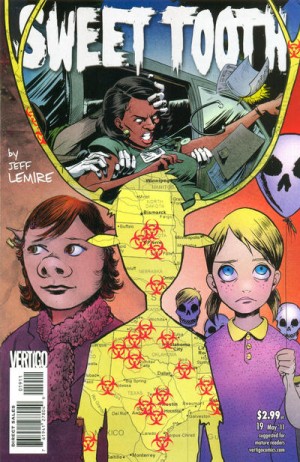
In terms of my reality, the only way I'm able to make a living doing comics is by doing work for hire that someone else wrote. I've always been able to work with material I like. I love all of my collaborators. If I'm lucky, I'm able to do something with some awesome DC Comics money attached to it. That grants me enough time to spend two and a half years writing and drawing my own book that maybe sells 5000 copies. Or 10,000 copies.
I feel like once you really dive in there, I don't necessarily say you have to see it from a career standpoint, but in terms of passion and focus, you're already in with both feet -- there's no getting out of it. If I'm not able to make a living drawing comics, I have so much work lined up over the next three years that I literally cannot get a job. [laughter] So many of these books have deadlines. There is no escape. Not that there needs to be an escape. [laughter] There's a certain level of conviction here that has to be addressed. It is a very good period right now for indy publishers that are underwritten by big corporate booksellers that do well in the bookstore and library markets. Major comics companies and very successful indies... all of these things bring up the independent cartoonists that are in it for the long haul. A lot of this has to do with recognizing that you are truly on a speeding train, and that you're mostly just going to be treading water. You can get over it -- constant work, a breakneck pace and planning ahead a year, two years ahead of time. I think that's the new shape of things for cartoonists of my ilk or my way of thinking.
 SPURGEON: Speaking of speeding trains, you have to be knee deep into
SPURGEON: Speaking of speeding trains, you have to be knee deep into March Book Two
. I don't usually do this, but I think a snapshot of everything you have on your plate might be fairly fascinating. What's next, Nate?
POWELL: Right now I'm almost done penciling
March Book Two. I'm a couple of months behind starting to ink it. Also, like two years ago I signed on to draw a graphic novel adaptation of a
Percy Jackson And The Olympians spin-off called
The Heroes Of Olympus: The Lost Hero.
Hyperion is putting that out and
Rob Venditti wrote the adaptation. It's really because of that book project that I'm not homeless. I"m almost done with that. I'll be done with that in two months and then I can focus on the rest of the
March trilogy. I'm also finishing up a short-story collection for Top Shelf called
You Don't Say. That's everything I've done from from 2004 to now. Hopefully that will be out in 2014. Hopefully in the next two weeks I will be finished and that will be off to them to integrate into their schedules. For years now I've had a solo graphic novel called
Cover that I've had written and that I've the first half penciled -- three times now. I've had to put it on the back burner until
March is almost done as a trilogy. With being a dad, and all of these other books, a little fire in me has gone out in terms of existence knowing that I'm not writing and drawing my own comics right now. But the longer I've waited the better the story has gotten. I feel like it's become something much more worthwhile reading -- and drawing -- when the time comes around. It's an exercise in patience. So I have four books lined up over the next couple of years.
SPURGEON: We'll talk again, then.
POWELL: Of course!
*****
*
Nate Powell
*
March Book One
*****
* cover to
March's first volume
* photo of Powell by me
* a borderless panel from
March that I liked, emphasizing the oral storytelling involved
* a page dominated by the use of black ink
* one of the 18 billion lettering effects employed by Powell
* they were very, very young
* a cover collaboration for DC
* from "Bets Are Off," one of the Powell efforts out there to be collected
* a two-panel progression I liked (below)
*****

*****
*****
posted 4:00 pm PST |
Permalink
Go, Look: All Of Kate Beaton’s Holiday Comics In One Place

 posted 3:40 pm PST
posted 3:40 pm PST |
Permalink
Go, Read: Something Everyone In Comics Already Knew

The portentous nature of an article a) declaring something as obvious as the attention to physical, art-directed craft on certain books as its own thing in late 2013; b) slapping a year on when this became The Year It Happened, well that really is sort of hilarious, but it's always a point worth making, and the angle
here is a pretty good one. While some books have been embracing their physicality as objects, the author notes that many e-book strategies have involved stripping things down to their bare minimum. You've seen something similar in comics with serial comics versus trades versus deluxe editions, and the e-book part of the equation adds to that overall landscape. The implications are obvious in terms of which forms might serve which kinds of consumption.
Put another way: I am in no way a natural consumer of electronic books and magazines and even I have started to prefer getting things like books-about comics, superhero comics and periodical-style industry news concerning comics in electronic form. It's the superhero part of that that may be most surprising but certainly shouldn't be in terms of how such books operate. So much of what superhero comics do these days are less about the experience of reading them and more about their insight into the incremental changes to the overall storyline -- finding the most convenient way to do that seems like it's going to be a thing. After all, some folks eschew the works entirely and "keep track" in reflected form on-line, so an approximation of the actual form is going to have some appeal if cheap enough and easy to access. I have friends that were totally out of buying superhero comics now back in via binge-buying through sales at comiXology and Marvel's "unlimited" approach of getting dozens to hundreds for a flat price. As far as I know, none of them are looking for an enhanced experience.
posted 3:35 pm PST |
Permalink
Go, Look: Wally Wood Wizard King Original Art Flats

 posted 3:30 pm PST
posted 3:30 pm PST |
Permalink
Comics By Request: People, Projects In Need Of Funding

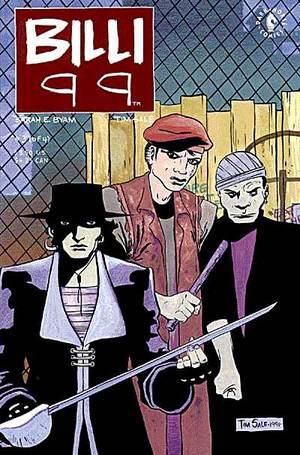 By Tom Spurgeon
By Tom Spurgeon
*
this is one of the odder donation request pages I've ever seen as it's
so specific with the options for donation but relatively vague as to exactly what ails the writer Sarah Byam. I have no doubt the need is real, though, and I remember her being very nice. There is a non-subscription option at the bottom of the page.
* I'm going to repeat a bunch of these in the hopes that it will wear down or two people that are tired of seeing whichever cause listed here. My apologies for those that come to
CR for new reading.
* first up:
please consider including the CBLDF in your year-end giving. They are good people, and freedom of speech is a fine cause.
* the Sparkplug Comic Books recent posting about pre-orders and support included an on-line, art-auction component:
here are those art auctions. I don't know exactly what that Dan Clowes is, but color me interested.
* the cartoonist and writer
Ted Rall would like your support through a service called Beacon.
* efforts to help Stan Sakai as he attempts to make up a home healthcare insurance gap
remain ongoing. Please note the CAPS paypal button is working again. Sakai is one of the best people in comics and I hope you'll considering lending him a hand or seeing your way to one of the things being offered on his behalf from well-meaning peers. It would also be nice if someone at CAPS would cash checks that were sent to the PO Box before the year is out, if any of them are reading this.
* speaking of Mr. Sakai, all thought and prayers to him, and to his family,
for this loss.
* the Sequential Artists Workshop
is seeking a few thousand dollars in support of its 2014 programs. Tom Hart and his fellow SAW folks are good people and that money will be well-spent.
* finally, don't forget that Dan Nadel
continues his 50 percent off sale at PictureBox as that company winds down the front-list part of its admirable life. Get the Frank Santoro stuff.
posted 3:25 pm PST |
Permalink
If I Were In Tokyo, I’d Go To This

 posted 3:20 pm PST
posted 3:20 pm PST |
Permalink
Go, Look: Space Hunting

 via
posted 3:10 pm PST
via
posted 3:10 pm PST |
Permalink
Random Comics News Story Round-Up

*
who is Tomoyuki Takenaka?

* I think I'm increasingly alone in this, but I still like reading the mainstream comic books Steve Gerber did in the 1970s, and chief among them is the first dozen or so issues of
Howard The Duck. It's hard to imagine the confluences of forces that made
Howard briefly popular coming together in the same way ever again, although you can still see echoes of it when something catches the public's attention in a way you know can't last. At this late date I think I appreciate most how the alienation of the comic series on the stands reinforced the alienation felt by Howard in the comics, but even that modest observation may be too much weight on Howard's very narrow shoulders. They were clever, amusing comics. As for the character, I suppose he'll show up in one of these Marvel event series with a gun at some point, if he hasn't already.
*
today is apparently Stephen Wacker's last official day on the editorial side at Marvel; as mentioned in a stand-alone post a few days back, he'll be moving into Marvel's operations on the West Coast and away from comics-publishing proper. Wacker is very well-liked in that world and well-liked in comics generally; I have to imagine that's a huge blow for Marvel on that side of things if you want to measure things that way -- he was on the perpetual short list for future opportunities up the ladder, although there's no reason that has to have changed. I would say, though, in terms of the0 loss of it that Marvel seems to have a reasonable amount of institutional strength these days; I didn't get the sense that people were
only there to work with Wacker or any construction like that. Wacker has always been very nice to me as much as our paths crossed and always struck me as aware of good comics generally. I wish him the best of luck in his new gig and in as much of a new life that comes with an opportunity like that one.
* not comics:
a run-down of the final issues of Hermanaut.

* Rob Clough on
Hip-Hop Family Tree. John Kane on
a bunch of different stuff. Matt Derman on
various comics from 1987. Sean Gaffney on
Dorohedoro Vol. 11. Grant Goggans on
Walt Disney's Mickey Mouse: Race To Death Valley. J. Caleb Mozzocco on
All New X-Men Vol. 1.
*
Bob Temuka writes about comics as presents.
* not all comics: Abhay Khosla
on a year of media consumption is exactly as fun as you'd imagine. I thought interesting the section on the critical reaction to
Arrested Development being shaped by their decision to make it available all at once to replicate the experience of people gorging on entire seasons of television shows. I'm not sure I agree with it, but it's not an angle I'd considered before.
* not comics: Sean Kleefeld
writes about his year. Good year.
* finally, I have one more little stack of ten sheets of
Wildwood Xeroxes that I enveloped up for someone that did not mail back with their address.
.(JavaScript must be enabled to view this email address) Update: It's been claimed! Thanks.
posted 3:05 pm PST |
Permalink
Happy 32nd Birthday, TJ Kirsch!

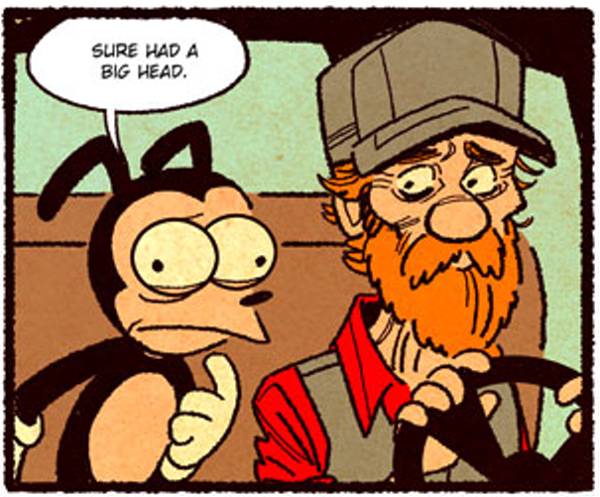 posted 3:00 pm PST
posted 3:00 pm PST |
Permalink
December 28, 2013
 CR Holiday Interview #11—Colleen Doran
CR Holiday Interview #11—Colleen Doran


*****
Like many in her generation of comics-makers, the artist and cartoonist
Colleen Doran is probably best known for a single, signature work:
A Distant Soil, which in 2013 celebrated its return 30 years after its major indy-comic debut with a continuation of the long-running series and new collections program made possible by a lengthy and expensive restoration process. Its re-entry into the marketplace was one of a number of high-profile projects for Doran over the last few years. This included art duties on
the 2011 Barry Lyga-written work Mangaman, the
much-praised 2012 DC/Vertigo project Gone To Amerikay (written by Derek McCulloch), an assignment
working on on-line Vampire Diaries comics as a writer, and the announcement
of art duties on a project at Dark Horse with the writer Neil Gaiman. I enjoy Doran's perspective on creators rights issued pitched more broadly and humanely than issues of editorial control over corporate comic book characters, into sometimes-uncomfortable topics regarding how cartoonists take care of business and, hopefully, themselves. I've long wanted to have a conversation with her and an on-line encounter on an unrelated matter afforded that opportunity. -- Tom Spurgeon
*****
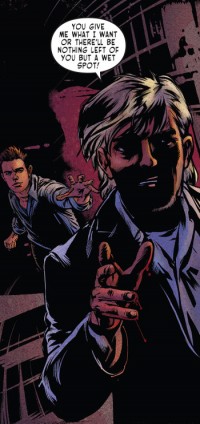 TOM SPURGEON: How does your work break down these days, Colleen? I have only a cursory grasp of what you're up to and where comics fits in.
TOM SPURGEON: How does your work break down these days, Colleen? I have only a cursory grasp of what you're up to and where comics fits in.
COLLEEN DORAN: Well... [laughs] I'm doing some writing, of course. I doing the
The Vampire Diaries for DC Comics. But that doesn't take up the whole month. I'm only doing about one issue a month so far. I'm doing book covers -- I will actually be finished with some romance novel book covers in about two hours. And then I'll go back and work on this Neil Gamain graphic novel that I've been putting off forever. I'll be working on that full-time. When I say I'm working on something full time, I mean something probably four days a week. And I'll probably work on something else one or two days a week. Then I'll switch them off. A comic book script doesn't take a whole month to do. You percolate, you let it sit, and then you come back to it a few days later. The book covers are something that I've had sitting on the pot for a while. It's four of them. So I'll work on those for a couple of days, set them aside, and go work on something else. I pick things up and put them down. I like have it to sit there to look at for a while. So I can come back to it, see what's wrong with it, and fix it. I try to be as objective as possible. If it doesn't look right, I do it over again. Which is what I'm doing today. I wrote the client last night and said, "What you requested in this piece does not work." Since it's a digital painting, I sent them what they asked for. And I said, "This doesn't work." I sent them a completely different background and said, "This works." They said, "You're right. Do version two." So I'm finishing up version two sometime in the next two hours.
SPURGEON: I know when I talk to friends of mine that work in a variety of creative fields, and I think this maybe especially true for the artists I know, it does take a while to find that work schedule that best suits them. There's also the fact that your schedule is frequently dictated to you. You don't get to choose what you're work on and when. Do you you feel like you're in a good place with how you work? Does it reflect how you'd ideally like to work? Is it close?
DORAN: I'm in a good place now. But I know that next year is going to be really rough. A lot of stuff got put off this year. Pushed back. Next year is not going to be funny. I'm going to work as much as I can over Christmas and through January to build a little inventory [laughs] -- yeah, like that can happen. And then starting around February shit is going to hit the fan and I'm not going to have a very nice year. But I have to say, when it comes to the freelancer life, I get great support from my family. They practically shove food under the door. [laughs] When I'm in work mode, they know "take care of her." When I'm not in super work mode, I"m out at the house, I'm cleaning the kitchen, I'm gardening, I'm baking. I've been baking all week because my schedule is not that tight at the moment. When I'm in work mode, people just take care of me. They clean my room, for God's sake. They make my bed. [laughter] They make food for me. Then when I have time, I try to take care of them the best I can. It just depend.
 SPURGEON: Is the baking therapeutic? I know a lot of my friends have turned to baking over the years, and they like that there are hands-on and hands-off elements to it. They get a lot of pleasure out of that act.
SPURGEON: Is the baking therapeutic? I know a lot of my friends have turned to baking over the years, and they like that there are hands-on and hands-off elements to it. They get a lot of pleasure out of that act.
DORAN: I am disturbingly maternal. [laughs] I love to take care of people. My family is really touchy-feelie, and lovey-dovey. Nobody goes upstairs... "Can I have a kiss? Can I have a hug?" [laughs] You go upstairs to get a soda and come back, "Is there anything I can get you? Can I have a kiss?" [laughs] People would probably be horrified. [laughter] It's really cutesy-poo. [laughs] That's the way it is around here. I love to bake. I bake things for my clients, and I bake things for my friends. I pack 'em up and ship 'em. I love doing it.
SPURGEON: You mention that 2014 is going to be jammed up in a work way. It seems like, and I don't know if this is a fair statement, but it seems like the last few years you've been incredibly prolific. It seems like there's been a lot of work from you.
DORAN: There is now... I went through a really bad period where I wasn't able to work and I wasn't getting very much work. That was just not funny. I'm sitting there going, "Woe is me... my career is over, blah, blah." When I got up and I got back on my feet and said, "Okay, I'm available." Then I was really happy the doors were open. I was very relieved. That's been quite nice. Now I've got all the work I can possibly handle. I'm happy about it. I do not like not to be busy. It makes me very upset.
SPURGEON: Do you have any perspective on why the work dried up? Was it just that you weren't presenting yourself as being available to work?
DORAN: I wasn't... I wasn't well. I was very sickly there for several years. And I was quitting jobs. "I can't finish this. I'm not functioning. You need to find somebody else." [laughs] You don't want to walk around being the perpetual industry invalid, telling everybody your every problem. You just want to deal with it and get it over with. When you're able to work, you come back and go, "I'm available." This is a real out of sight, out of mind business, and if you're ever out of the loop for a while, people forget about you, or they assume that you're not interested. So I wasn't entirely certain when I said, "Okay, I'm looking for jobs" that they would say, "Yeah, we'll hire you." You never know. They could be moving on to other people. But there's plenty of work out there right now.
SPURGEON: Do you think your skill set is well-suited to the way publishing has shifted. Do you feel there's a bigger place for you now than maybe 15-20 years ago?
DORAN: Yeah. Absolutely. Absolutely. The kind of work I do -- well, maybe I just sucked -- but the kind of work I do wasn't well-received 15 or 20 years ago. It still stings a little bit. [laughs] And for all I know they still feel the same way, but they hire me so I don't give a rat's ass.
SPURGEON: Do you think it's like an aesthetic catching-up? A reconsideration of certain artistic values that includes the kind of art that you do?
DORAN: I would like to think so. I would certainly like to think so. I don't like to think that my work was always that bad. [laughs] I look back on some of my earlier work and think, "Well, some of it really sucks, but some of it was really solid." I was in an odd position. Well, I wasn't in an
odd position, that's not a good thing to say... When you start out in this business, they pretty much decided whether you're going to be a star or a journeyman. And if you get put on the journeyman track, ow. You're going to be the poor son of a bitch who gets a two-week deadline for the full issue. The fill-in artist. You're going to be one of those... you're going to spend a lot of your time getting the jobs that need to be done in a short period of time, and you get the crap anchor. You can either decide to suck it up and take those jobs in the hopes that something better will come along and realize that's how people are going to see you: you're the crap artist that got the job while they were waiting for the good person.

I started out getting star treatment right out of the gate. Then I got put on the journeyman track pretty quick. That wasn't pretty. I spent probably 10 years on the journeyman track. I was getting the worst jobs, the worst anchors. It's self-perpetuating because people go, "Oh, they weren't a good artist anyway." It's very hard to get out of that, to say, "I will not work with that anchor. I will not work on that deadline schedule. I would rather
not work than work under those circumstances." I'd say it wasn't until... I'd say Warren Ellis probably changed the perception of my work when he started working with me around the year 2000. I would get time to do a good job, and better, more visible assignments. People started hiring me for other things. But until then it was really touch and go. I'd do a really good job on one thing, and people would go, "Yay! Let's hire her for another one." And then I'd get 14 days to do 26 pages. And then I'd get...
various inkers.
SPURGEON: [laughs] Right. [laughter]
DORAN: It's not a nice place to be.
SPURGEON: I've always wondered something about you in terms of your artistic development.
DORAN: You have? [laughter] I haven't thought about it at all.
SPURGEON: You were capable of professional-level work really, really early on. You were very young. And I wonder if that's ever something that retards artistic development. I wonder if it reduces the desire to improve at a time in your life when that might come in significant stages. And it sounds like when you were working you had the further thing that maybe you were put in a position to improve. But when you've shown you can do it early on, does that make it more difficult to become the artist you see yourself becoming?
DORAN: It can give... there are two ways you can go. You can get unwarranted validation too soon. Which tells you that, "Hey, you're already there." But I don't think I did. I don't think there was ever a time in my career that people weren't saying, "Her work is girly, and she gets work because she's little and cute." I don't think I was ever there. If anything, getting hired early meant that before I was ready to face... adult pressure... I had to deal with the adult pressures of contracts and money and inappropriate attention from adults. Pressure from fans. All of these things. Starting when I was teen, when I don't think I was ready for any of that. I don't think anybody is. It's a very unnatural environment. I think if that were to happen now, with the Internet? I think I probably would have cracked. Fortunately, I didn't have to read the mail when it came in. Now it's probably... it's horrible what people say on-line. What gets bandied about. At least I could turn that off.
 SPURGEON: Do you look back on a specific moment from back then that was particularly tough, where you came close to walking away?
SPURGEON: Do you look back on a specific moment from back then that was particularly tough, where you came close to walking away?
DORAN: Oh, of course. I almost quit... about 1986. I remember sitting down and having a conversation with my family. I said, "I think this business is horrible. I don't want to do this." And in 1999... I went looking for a day job. I said, "This is vile. I don't want to do this anymore." I actually got a dayjob. I applied for a job at UPS. I said, "I'm tired of not having health insurance, I'm tired of not having benefits. I'm tired of all this stuff. I'm tired of this uncertainty. I can't take it anymore. I need stability." In 1999 I applied for a job and two days before I got the phone call saying, "You got the job" I got a job at Marvel. I told my agent I didn't want to work in comics anymore. He said, "Look. Let's give it one more shot." My agent was a gentleman named Spencer Beck. He took me on the rounds with my portfolio, and Marvel started hiring me again. I hadn't worked at Marvel in a while. I was ready to chuck it. He said, "I think people just don't know you're available." Because I don't go to New York that much... which is not the brightest thing in the world. I'm just not like that. So he said, "You need to be more visible. You need to get up here more often." We went in, and I got hired for several good jobs. One of them I almost got the regular gig but they decided to hire somebody more popular, so they gave me
Power Pack instead. I didn't do a very good job on it, but then Warren started working with me and I started doing stuff I really liked. We did that webcomic together [
Superidol], god I can't believe it's almost 14 years ago now. And
Orbiter...
SPURGEON: My memory is that Oribiter got an additional boost when Diamond made its initial push into the book market and needed material to rep at BEA. So in a way I think that was the right book at the right time.
DORAN: It was a strange book at a strange time. I was literally finishing the last page when the space shuttle was destroyed on re-entry.
SPURGEON: Oh, my goodness. That's right.
DORAN: Oh. Oh, yeah. [laughs] It was horrible. We thought they were going to shelve it. It's a terrible thing to even think about a book in light of a tragedy but we were... we were very concerned. I was at a convention that weekend with an enormous poster of the shuttle burning up on re-entry. [Spurgeon groans] It was like, "Oh my God." That was uncomfortable.
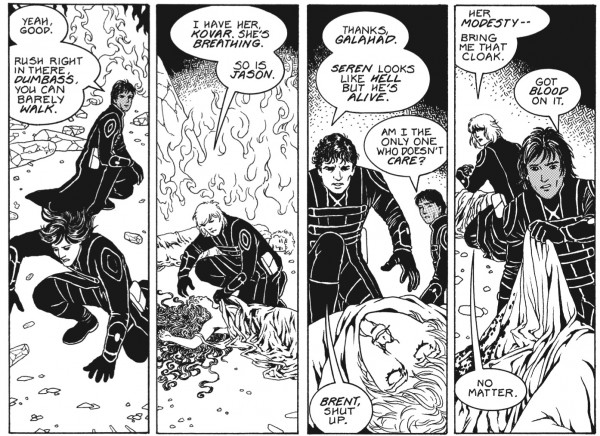 SPURGEON: With your schedule working out the way it is right now, is
SPURGEON: With your schedule working out the way it is right now, is A Distant Soil
the one that gets put aside? Is that one more flexible because it's all you?
DORAN: Oh, yeah. And it's so expensive to do, especially now that we're having to pay for all of that restoration. Even though technically I raised all of the money to pay for the restoration, I've also had to have money to live on while working on new material. I have to have more money, which kind of sucks. I do it when there's cash in the bank. And I'll probably be working on it January and February and getting as much done as I possibly can and then push it aside for a while, and then work on it again and then push it aside for a while. My restoration guy needs to be paid, and now he's getting other work. People have seen what a good job he's doing and they're trying to hire him away from me, damn it. [laughs] I'm really happy for him; he's always wanted to work in comics.
SPURGEON: You posted about the restoration process, how involved it is... I remember someone telling me they were glad you talked about it in public because it wasn't usually talked about how difficult those things can be and as a result there's an assumption that bringing something back is super-easy. Did you hear back from people who were grateful for how transparent you were about the costs of doing this?
DORAN: Yeah. Absolutely. I wasn't expecting to get such positive response. I thought people would say, "Oh, what a whiner. Always complaining." [laughter] I hadn't heard that this was a) a problem, b) a really
common problem, and c) really difficult. What a lot of people don't know and I did not know until last summer is that this printer nailed almost everybody. It's not just my book, it's not just a few books at Image, it's almost all of the publishers who worked with this printer have lost negatives. I had... I won't which say publisher -- but it's a big one! -- and they were telling me they had to get the negatives for the
Spanish edition of one of their big, painted books because the American edition no longer exists and they have had to pay all of that money to go in and re-letter the thing and re-do the sound effects.
SPURGEON: That is... that is slightly terrifying.
DORAN: It is the comics industry art archives holocaust, I'm just the first pig to squeal. [laughs] A lot of people don't want to talk about in part because they are not going to the time and the expense that I'm going to -- because they can't afford it. There are a lot of fully-painted books out there that are no longer being reprinted from the original negatives; they're being reprinted from scans of the book. The original edition doesn't exist anymore, and there's nowhere to get them: they just don't exist. So all of these beautifully painted books, you're seeing muddy new editions? That's because the books are gone. You're never going to see them again.
A lot of black and white books out there are being scanned directly and not being restored. They're just scanned and no one is trying to fix the tone sheets or doing whatever. Most people don't want to talk about that, and I understand that. The fact of the matter is the kind of restoration we're doing on this book is prohibitively expensive unless you're some crazy little woman living on a mountain like me who's willing to put your life savings into redoing the book on the off chance it eventually earns its money back. That's what I'm looking at. Most comic books are not going to earn that money back. They're just not.
SPURGEON: When I encountered the whole idea of what you had to do, it's another reminder that as much as we think of comics' disposability and institutional cheapness as things of the past, that there is lack of infrastructure, a basic lack of continuity and thus a lot of reinventing the wheel that still goes on in comics. I think this still happens in part because of those kinds of choices -- bad choices... or bad actors -- along the way. Is there anything we can learn from this? Are things getting better in terms of people realizing there's a benefit to thinking 20 years down the line and not taking short cuts and ensuring that other people don't? Or is that always going to be part of DNA.
DORAN: Well, there's several things going on here. First, our printer was paid to archive these items for us.
SPURGEON: Oh... oh, no. Okay.
DORAN: They have an archival system. They were supposed to be keeping those things. Printers in a foreign country. These negatives are not little photo negative, they're four feet by four feet flats. That's another thing that people don't understand when we say, "They lost our negatives." They think they're losing little strips of film. They're not losing little strips of film, they're losing their enormous flats. They cannot be going back and forth across international lines every time you need to print something. And you sure as hell don't want customs running their grubby hands over your material. [Spurgeon laughs] So they've got to be archived in a place where they're supposed to be safe. We paid these people to do this. They declare bankruptcy, get rid of our material, and we're all standing there with our ass hanging in the wind. [laughs] So we're like, "What are we going to do?" People are like, "Why don't you sue them?" The company that no longer exists? What are we going to sue them for, and even if we do we're still not going to have our negatives. Why don't I take the money that would have gone into a lawsuit, suck it up and work the problem. That's what we chose to do.
Oddly enough, we did get some negatives back. All of my books were shot from clean negatives for each new edition of the book... we did the comic, but we find mistakes in the comics so we'd shoot new negatives. What we'd end up getting is maybe a half-dozen issues of comic-book negatives back. But we also found out [laughs] that they never shot negatives for some of our books in the first place, while charging us for them, which is more expensive -- I found that very amusing. This explains why some of our printing was dubious in the first place.
I'm still using the old Japanese tone-sheet material for all of my tones. Which by the way, nobody uses anymore, for a
good reason and I'm not going to use them again when I'm done with this book. In order to keep the look of the series absolutely consistent we've been using Japanese tone sheets for decades now -- oh God, I can't believe I said that out loud. [laughter] Yeah, really. Oh, how sad. [laughs] These sheets were never meant to be used with a computer. Because what you're basically doing is creating gray artificially. By pre-screening the image. When you put that tone sheet onto a scanner, what the scanner does is screen it again. You get all these problems with moiré... it picks up artifacts... my cat has been dead since 2006. I could clone him; he's all over these tone sheets. [laughter] I've actually cried while working on these. "Oh my God, my cat..." We have to take it out because the printer shooting photographic negatives won't find these artifacts but the digital scanner will. So they have to be removed.
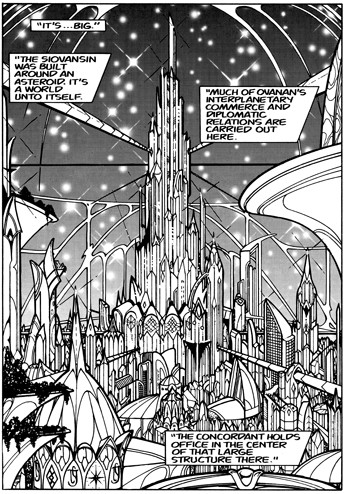
It's a fucking nightmare. I've got a thousand pages of this. Fortunately I have someone doing it for me but that costs a small fortune. I don't have any money. Another charity comes to me I'm just going to laugh in their face. [laughs] Yeah... I laugh. Any kind of little dust spec or even the peeling where the adhesive on the back of the tone has rolled a little bit will show. Just to clean up even an original page can take up to four hours a page. Now the result is pristine. The printing we got on volume one was just kick ass/take names. It's some of the best black and white printing I've seen in years. It was so nice to have some picky dude like
Bob Chapman come up and looking at it through a jeweler's loop going, "This is great." [laughter] We got just a little bit of moray, which is not even... I mean, who cares? Just a little bit on some of the pages shot from originals. Nothing we can do about it. Maybe ten places in a 240 page book. You cannot get better than what we got. So, so clean. So good. Crispest black and white. Better than we had before! If we had the negatives, the book would not look this good. It just wouldn't, because the original material is not this clean. So all of the clean up and everything has given us a better result that we could have gotten had we done with what we originally had.
Unfortunately, it's costing me more money per page than I got to do most of this material in the first place. We're talking as much as 50 dollars or more a page for restoration... some are $15 but some are over $50. You do that over enough pages it's like doing a new book. It's really, really, really, really expensive. And like I said, only a crazy woman living on a mountain would go to this trouble. The chances are I will earn this money back. But chances are very good I will not see a profit for a considerable amount of time. Thank God for digital, because that's free money.
It is just so, so, so expensive. You see these crappy editions like
Checker Publishing puts out, the
Winsor McCay stuff, you just shake your head and go, "Well, what are you going to do?" Because they're not going to put in that time and money and effort.
SPURGEON: How do you even work on a story that you've been working on as long as you've been working on A Distant Soil? [Doran laughs] I know writer friends of mine that have abandoned rewrites on plays because they can't access the writer they were even one or two years ago. Is it difficult in that way, to return to this material, to make the newer stuff work in the same voice as the older material?
DORAN: It does mess with your head a little bit. I don't feel like it's any different than going back and reading a book I used to enjoy. If the book really sucked... well, here I am complimenting myself. There are some things about my earlier volumes that make my hair go the wrong way. [laughs] But having read them and read them years later -- I can go years between having read them -- I still go, "You know, that was kind of fun." And if I can do that with stuff that makes my hair go the wrong way I guess I did all right. I don't know any other way to put it. [laughter]
SPURGEON: You have a reputation as an image-maker. That's probably due to the illustration work you do, but even when I think of your public reputation as a cartoonist I think of picture-making: attractive, stand-alone visuals. So I re-read a bunch of A Distant Soil
and what struck me wasn't the visual aspect but how dense the storytelling was. I don't mean to reduce it to the cliche of "There's a lot going on," but there's certainly a commitment to a multi-faceted narrative there; it's not about setting up the next image. The pages themselves are tightly structured, and you have this large cast... The plot is much more focused than I remember from my first reading some years ago. Is it compulsive in that way for you, to make sure the intricacies of your plot gets onto the page?
DORAN: That is very nice of you to say and it's very satisfying to hear you say it, because I don't think I have a reputation as a writer. I remember having a conversation... I was often put down for my writing when I started. I would have editors go in and say, "You don't know how to write" or "How dare you call yourself a writer" or "Let me re-do this for you." I was talking to
Steve Bissette the other day, and I said, "I swear to God, one editor said to me, 'My brother can help you write this.'"
SPURGEON: Ugh.
DORAN: [laughs] We were talking about the strange imposition of other people on our stuff. Years ago I remember having a conversation with
Scott McCloud and he said, "I think you're a better writer than you are an artist" which I guess is a backhanded compliment. I said that to a writer and the writer blew up. "You are not a writer. You don't know what you are doing." [laughter] You know, I probably just take negative comments to heart too much and assume they're always right. I like to think my work is careful and considered, and just as careful and considered as the art. I put almost as much time into writing a single issue as I do drawing it.
SPURGEON: That's interesting.
DORAN: I don't know if everybody notices, but I do. Because it's such a long story and because it was so complex for the very beginning, and I suppose it could be fairly argued that I substituted substance for complexity, but what can I say. I'm getting to the end, and it better be solid. That's what I think every time I sit down to write it. I have to make sure that all of this is what was meant from the very beginning. It needs to get from point A to point Z and it needs to be tight. I do not want all of these people that have put all that faith into me all of these years get to the end and go, "What the fuck?" [laughs]
So yeah, I am very very very careful. I will rewrite while I'm drawing it.
SPURGEON: I was talking to a mutual acquaintance of ours, and we were looking at some of your work, and we both wondered if there were things that you like to draw more than other things.
DORAN: Oh, shit yeah.
SPURGEON: So what is a good page for you? What is it about a page that makes you go, "Yeah, that's the one I want to do"?
DORAN: That depends on the book. There are things in some books. For me,
A Distant Soil is the book where I get to indulge everything I want to draw. But on other books, if I'm drawing car chases, I'll tell you straight up I hate drawing cars. I hate drawing cars with a passion. But if I have to draw a car, I'll draw a car. If you look at
Orbiter, it doesn't look a damn thing like
A Distant Soil.
SPURGEON: No, it does not. It struck us both that there were maybe pages in the book with Derek McCulloch, Gone To Amerikay, where you really went to town.
DORAN: That doesn't look like
A Distant Soil, either.
 SPURGEON: No, it does not. The scenes set squarely in the past, it looks like you may have particularly enjoyed those.
SPURGEON: No, it does not. The scenes set squarely in the past, it looks like you may have particularly enjoyed those.
DORAN: Hell, yeah. Yeah. That's fun. I love that stuff. Just don't give me a car chase scene. I can draw those things. I like to draw non-panel progressions. I like to draw buildings -- I know that sounds nuts, but I like to draw buildings.
SPURGEON: Is there an architectural impulse there? What is it about buildings?
DORAN: There's something very zen about drawing buildings. I know that sounds nutty. There's something thrilling about making lines on paper and coming up with a structure that seems to have validity. Does that sound nutty?
SPURGEON: Nah, that sounds interesting. We've talked a few times about your ability to get things done, to get past the way you might want things to be and work with what you have: sucking it up. This has been a tough year for a lot of comics people, including people we both know. Things get unraveled and people get in trouble. Does that element to the industry bother you at all, particularly now that a lot of our friends are going to be into their late fifties and then into their sixties and then into their seventies. Is that a special concern for you at all?
DORAN: I don't think... I was concerned about this stuff when I was in my twenties. I was already thinking about what am I going to do at this age, this age and this age. Will I have enough money for retirement? Do I have a home? Is somebody going to take my house away from me?
I remember the first time I bought a home, having a cartoonist who I won't rat out saying, "Don't buy a home. That's a waste of money. You should live very frugally." I'm so glad I didn't take that advice. I sold it for twice what I bought it for and always had a roof over my head that nobody could thow me out of at a moment's notice.
I've always thought about the long-term. In fact, a lot of the assignments that I take are with the eye for the long-term. I look at the back end. Ninety percent of the stuff I take is because of the back end. I don't think a lot of people do that. I'm not sure if it's because they can't do it or don't understand how to do it or don't have the option.
SPURGEON: There's a fear as well, it seems, in just talking about it, giving voice to these worries. There's a puffery that comics people have that sometimes gets in the way, too.
DORAN: Yeah. They're all afraid of being seen as weak or failures or vulnerable -- which I just think is... mmm. The fact of the matter is everybody's walking around with a sense of shame about money and success. I have none. That's why I have my blog. So I can talk about it all the damn time. I have no fear of talking about it. I think it's the biggest load of bullshit not to talk about money -- not to be concerned about money. We are professional artists after all. And the shame about asking what you're worth and expecting to get paid and even talking about money? What are we, landed gentry? What the fuck is this? We are laborers? Get paid for your damn work. What's so genteel about being above money? I don't get it. I don't know who the hell these people are, but I'm not one of them.
SPURGEON: Do you think you've had some influence by talking about it? Have you heard back from younger people or anyone that wants to orient themselves that way. It does seem like more people want to stick around comics, or at least have a foot in and thus a longer career that maybe isn't always going to be enmeshed with the larger companies, which is an interesting way to project 10, 20 years in the future. Are people listening to you, Colleen?
DORAN: Sure. What we've got are people that want to be authors. They want to be lifelong creators and owners or the works they produce instead of workers for product. As somebody who thoroughly enjoys working on licensed product [laughs] and gets a kick out of a lot of it, I certainly understand the appeal, but the likelihood you're going to have a long term career working for some of these companies is very small. Even some of these people that have been working there for decades find it's harder and harder and harder to make that pay off.
There's a huge pool of talent out there. Your competition in 1980s was who could get to New York with a portfolio. Your competition now is worldwide. And that is a really big deal. So what you need now is to have no competition -- be the only voice out there that is your voice, instead of the peg that fits in Superman's hole. [laughter] That sounds dirty. You won't get any shit from me for working on Superman. You won't get any shit from me for working on Wonder Woman. I've thoroughly enjoyed all of that stuff. But I know I can be replaced. If any creator knows what's good for them, they need to be the commodity -- not the product. You need to be the one place to go to get what you do.
*****
*
Colleen Doran
*
A Distant Soil
*
A Distant Soil At Image Comics
*****
* image from
Reign Of The Zodiac
*
Vampire Diaries panel; Doran is writing
* Doran bakes (photo supplied by Doran and not really intended for publication; I hope she'll forgive me)
* working with Warren Ellis on
Orbiter and
Superidol
* from
A Distant Soil; one page of many broken down into specific beats
* a restored page from
ADS as scanned into Doran's blog
* non-panel progression page from
Gone To Amerikay
* you will not get any grief from Doran for drawing Wonder Woman (below)
*****
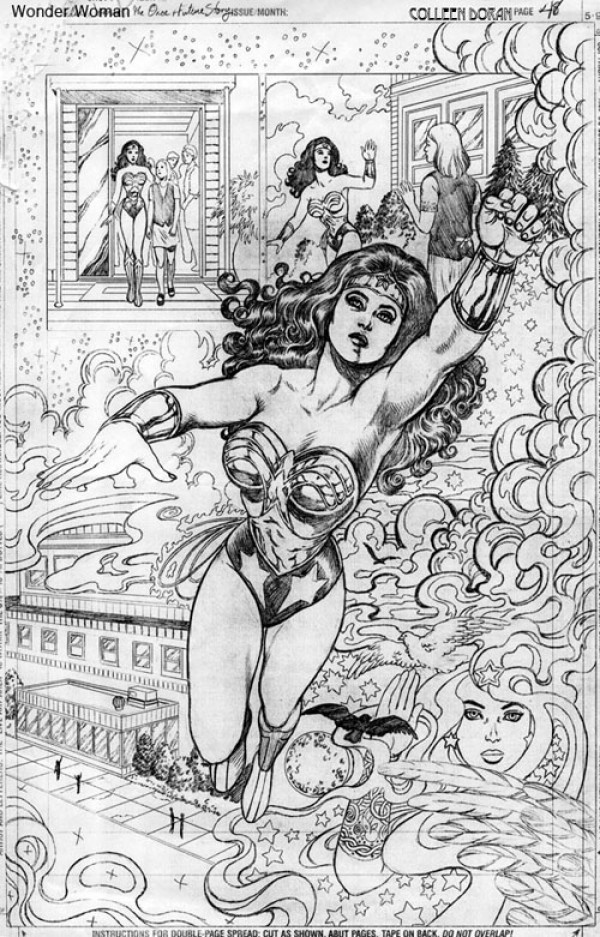
*****
*****
posted 4:00 pm PST |
Permalink
Don’t Forget That PictureBox 50 Percent Off Sale

 posted 3:55 pm PST
posted 3:55 pm PST |
Permalink
Go, Look: Babe, Darling Of The Hills #8

 posted 3:20 pm PST
posted 3:20 pm PST |
Permalink
Random Comics News Story Round-Up


* I consider this white-cover series of mid-1970s
Doonesbury paperback books one of the perfect presentations in comics history. There's something about it that's muted and modest and even classy -- later versions get ugly, weird, dark colors and swell a bit -- while the narrowness of the format means the strip itself is broken up into cascading panels rather than run as strips, which I think is a fine way of reading Trudeau's unique pause-beat endings. This book has maybe the cartoonist's best run: not so much the very funny and still awesome bedroom scene that is featured on the cover but the entire congressional campaign storyline that preceded it. I'm one of those that prefers
Doonesbury when it uses its own characters to dig at truths about politics and life as opposed to employing real-world characters, and this run is one of the better arguments for that strategy. I think it's right up there with the Schulz "Mr. Sack" storyline as one of the great comics of the 1970s, any format.
*
random Alex Toth animation sheets are still some of the best things in the world.
*
Marc Arsenault at WowCool would like to see your Ink on Pixels.
* via David Roel, John David Ebert on
The Killing Joke. David Brothers on
Bleach.
* finally,
this is the most Long Sam I've seen in any one place.
posted 3:15 pm PST |
Permalink
If I Were In Tokyo, I’d Go To This

 posted 3:10 pm PST
posted 3:10 pm PST |
Permalink
Happy 31st Birthday, Julia Wertz!

 posted 3:00 pm PST
posted 3:00 pm PST |
Permalink
Happy 50th Birthday, Dave McKean!

 posted 3:00 pm PST
posted 3:00 pm PST |
Permalink
Happy 53rd Birthday, Jay Geldhof!

 posted 3:00 pm PST
posted 3:00 pm PST |
Permalink
December 27, 2013
 CR Holiday Interview #10—Jeff Lemire
CR Holiday Interview #10—Jeff Lemire


******
Back when
DC Comics announced
its New 52 line overhaul, one of the things that was targeted as a key element for DC to have a chance to make it successful over the long-term was the development of unique writing talent maybe a step below that of the one or two superstar creators that a big publishing push was almost certainly going to yield. I think
the writer and cartoonist Jeff Lemire has stepped into that role in admirable fashion.
Lemire is one of those rare beasts in all of comics: a creator that has found a voice useful in making comics in multiple expressions of the modern conception of what comic books are and who reads them. He has worked with DC superhero-line properties like
Animal Man, the Grant Morrison conception of
Frankenstein's monster and the various mystical characters constituting their "
Justice League Dark." He ended one popular Vertigo title
Sweet Tooth with a 40th issue and launched the science fiction oriented
Trillium with a much-lauded initial burst of issues. He is perhaps just as well known in the wider comics community for the alt/arts work he's done, primarily
The Essex County Trilogy but also 2012's
The Underwater Welder. In 2014 Lemire should continue his recent work with the television series influenced conception of
the Green Arrow character and write the adventures of
a Justice League set in his native Canada.
I'm grateful for the time Jeff Lemire spent talking to me mid-month about juggling all of these things, and to
Alex Segura and
Pamela Horvath at DC for putting me in touch. Lemire is a busy man. -- Tom Spurgeon
******
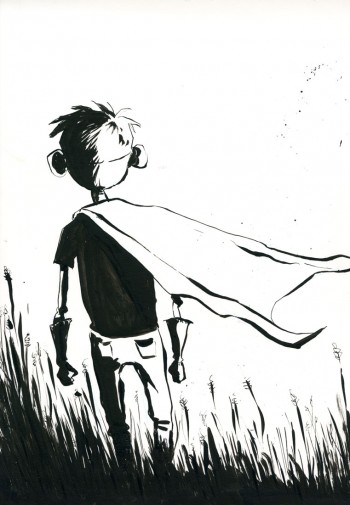 TOM SPURGEON: When I mentioned I was interviewing you for the holiday series this year, Jeff, what came back to me was variations of "Oh, that guy has really figured out how to do alt-comics work and mainstream work." I wondered if you ever conceive of how things are going in your writing career in those terms? Do you see yourself as bridging that gap or in those terms at all? Has working in multiple comics arenas been purposeful at all?
TOM SPURGEON: When I mentioned I was interviewing you for the holiday series this year, Jeff, what came back to me was variations of "Oh, that guy has really figured out how to do alt-comics work and mainstream work." I wondered if you ever conceive of how things are going in your writing career in those terms? Do you see yourself as bridging that gap or in those terms at all? Has working in multiple comics arenas been purposeful at all?
JEFF LEMIRE: I don't know if it's purposeful. I'm pretty aware that I come from independent comics. I bring that sensibility with me. I've never really lost it. I'm still working for
Top Shelf, and doing my own very personal stuff. I'm also doing stuff for
Vertigo that's a little more genre-based. The superhero stuff... I seem to have always have foot in all of that stuff; it just sort of blends together. Certainly I love superhero comics and I grew up reading them and I have a real affection for them and those characters. But certainly I come at it trying to bring a little bit more of a personal voice to it. I guess my natural sensibilities tend to lean towards the independent and alternative stuff.
It's trying to bring that to those books, those elements of my personality.
SPURGEON: When you say it wasn't purposeful, do you mean that you didn't pursue it, or do you mean that it wasn't something you even wanted?
LEMIRE: [laughs] I really just kind of stumbled into it. I loved it growing up but I never, ever, ever anticipated or pursued working for
DC or
Marvel. That stuff... it was always, I look back -- it hasn't even been that long. In 2007 and 2008, I was still working a day job and doing
Essex County. My real goal was to just make enough money doing stuff for Top Shelf or whatever to maybe have a part-time income in comics, and then maybe only have to work a part-time day job. [laughs] I never anticipated being able to do comics full time. I was never pursuing working for DC. I never thought my stuff -- well, certainly my drawing style but also my sensibility as a storyteller -- I never thought it was something that fit at DC. I didn't even bother trying. I did my own thing. Ironically, by doing my own thing and developing a voice as a cartoonist and a storyteller, I think that served me in a way that I can bring something new to superhero comics, or at least that must be what people like
Dan DiDio and
Geoff Johns saw in me and tapped me to start writing some of that stuff. Then it all kind of happened. Once I had the opportunity I figured why not go ahead and try it. I discovered it is fun to do both.
SPURGEON: You said that you read this material as a kid, or growing up. Were the comics of this type that interested you similarly idiosyncratic? Were you attracted to the off-beat approaches to doing superheroes that preceded you? What were some works that were meaningful to you in that genre?
LEMIRE: Even when I was reading that stuff I tended to seek out the comics that had a bit more edge to it. I was reading stuff by
Howard Chaykin and
Frank Miller -- people like that -- when I was too young to be reading it. Like when I was eight or nine. [laughter] Everyone else was reading
Chris Claremont's X-Men and I was reading
American Flagg! [laughs] so I was always a bit drawn to that -- and not just in comics. Movies and everything. I went to stuff that had a unique author's voice for sure. That's something that's always attracted me.
David Lynch films.
Stanley Kubrick films. Stuff like that at a young age. You could see the authorship behind them. You could hear someone's voice. That always attracted me. I was always seeking that stuff out.
I was the right age when the first wave of Vertigo hit. I was probably like 13, 14 when that first wave of Vertigo hit. It kept me interested in comics. In my late teens I dropped out of comics, stopped paying attention. I was from a small town so there weren't any comic shops. The only stuff I had access to was on the newsstand. I became disenchanted with superhero comics. Got more into movies and music. It wasn't until I moved into the city in my early 20s -- places like
The Beguiling were here -- where I discovered all these other cartoonists, independent and alternative cartoonists. European stuff. That [laughs] that really got me interested in the medium and drawing again.
SPURGEON: Were there one or two cartoonists more significant for you than others? Were there any where you had that scales-fall-from-eyes moments, or were you more generally drinking it all in?
LEMIRE: Yeah, you know, there was. I remember distinctly I hadn't read comics in a few years. I was in film school here in Toronto. I walked into a comic store just passing by one to see what was going on.
Paul Pope's
Heavy Liquid was coming out from Vertigo. And I was like, "What is this?" That was unlike anything I had seen from Vertigo before, from DC. His drawing style is so energetic and bold that it's hard not to want to draw after looking at his stuff. I started finding all his
THB stuff. That kinetic drawing style of his really made me want to draw, pick up a brush for the first time and draw.
Then I started to see what else was going on. Guys like
Dan Clowes and
Seth. Coming to Toronto there was this weird brotherhood of Canadian cartoonists that all hung around at the time. Seth,
Chester Brown and Joe Matt... you would see them at The Beguiling and that was cool. I got into that stuff. I opened my eyes to all the stuff that was out there. You get into Paul Pope and you start to see all of his influences, the European stuff like
Hugo Pratt -- all those guys he was into.
One door opened another. I started to see how big comics was. It wasn't just stuff I'd grown up with.
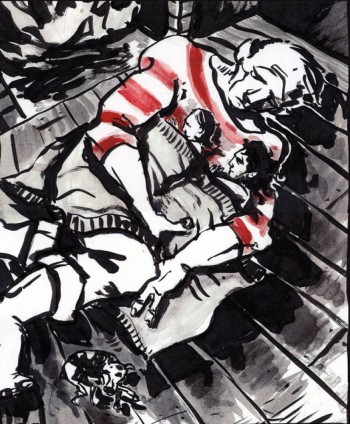 SPURGEON: You were a Xeric winner, am I right? For Lost Dogs.
SPURGEON: You were a Xeric winner, am I right? For Lost Dogs.
LEMIRE: Yeah. Yeah, I was.
SPURGEON: You would have been one of the later ones, I'm guessing.
LEMIRE: 2005.
SPURGEON: What do you remember about that experience now? I'm always interested in the Xeric winners because part of the original mandate was very much about instructing you in the way the industry worked.
LEMIRE: Yeah, yeah, it really was.
SPURGEON: Was the Xeric helpful for you in terms of simply understanding this industry in which you wanted to find work?
LEMIRE: It was great. I had been drawing comics at that point... that was 2005, and I had been taking it seriously since 2001. Working every day on stuff and trying to get my stuff together. Even though there were a few guys here drawing comics I didn't really socialize with them. I was pretty much in a vacuum; I had no idea how the industry worked: just distributing your stuff in the
Diamond catalog, I had no idea how that worked. No concept at that. Doing the Xeric Grant really made research that, and figure that side of things out.
I was working as a cook then. I would draw all day and then work all night as a cook. I had no money. I could barely pay rent. [laughs] So the thought of having money to print a comic or distribute it was impossible unless I had some help. When I found out Canadians could apply to the Xeric, it became the thing. I applied three or four times before I actually got it. I would never have been able to afford printing thing or getting something together without it. That was a really huge step for me.
SPURGEON: So are you one of those pros that keeps track on how the industry works, does that interest you? Or are you at a stage -- and this happens, too -- where you've kind of removed yourself from that kind of close attention?
LEMIRE: I don't know. When I first started doing stuff for DC, I was a lot more interested than I am now in trying to keep track of sales... just out of curiosity and if they were going to keep giving me work. [laughter] Now that I feel a little more secure in my position and in what I'm doing, I don't have time. I'm kind of detached from that side of things a bit. I don't go on-line as much, or engage with fans or keep track of the business side. I find it's more of a distraction than a help. It starts to influence the way you think about the jobs you take, and that's not a good thing. Those decisions should come from creative places not from thoughts of career and business.
 SPURGEON: I have an
SPURGEON: I have an Essex County
question. It was named an "Essential Canadian Read" at one point. I guess while elements of the subject matter are clearly Canadian, I wondered if you thought about in terms of it being a work in the tradition of Canadian literature more generally.
LEMIRE: It is very much in the tradition of Canadian literature, I think, people like
Margaret Laurence. It's firmly set in my Canadian experience. I take a lot of pride in being Canadian and being a Canadian storyteller. I try to explore that in as much of my work as I can. Certainly the indy stuff, but even now in some of the DC books they're letting me set some of that stuff here and explore the Canadian landscape. It's very important to me.
SPURGEON: Your pacing is very distinctive, Jeff, particularly in the comics that you draw as well as write. So when you say the work is in this Canadian tradition, do you meant that it also encompasses a kind of formal approach in addition to the subject matter with which it engages?
LEMIRE: I don't know if my style or my formal approach to comics would be Canadian in any way. I really think that if you look at Canadian cartoonists that preceded me, there's not a strong connection there. Guys like Seth and Chester Brown... there's not a lot of common ground in what they do and what I do. Even if you look at contemporaries of mine like
Bryan Lee O'Malley or
Darwyn Cooke, I guess -- he's been around a lot longer but he emerged right before me -- we're very different than on another. I don't think there's a "Canadian style." [laughter] I think it's more in the subject matter and how the stories have a connection to the landscape -- the land itself is almost a character in my work. It's more that than a formal approach.
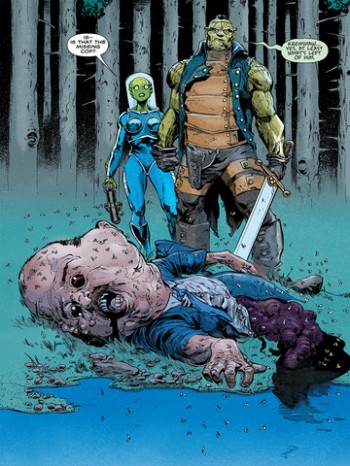 SPURGEON: You mentioned you didn't really expect a progression into Vertigo work and now mainstream superhero work... but you also said that you're comfortable knowing you have a place. How long did it take for you to feel comfortable. Was there a point at which you remember feeling more comfortable with that kind of storytelling? How long did it take you to find your creative feet in the commercial comics you're doing?
SPURGEON: You mentioned you didn't really expect a progression into Vertigo work and now mainstream superhero work... but you also said that you're comfortable knowing you have a place. How long did it take for you to feel comfortable. Was there a point at which you remember feeling more comfortable with that kind of storytelling? How long did it take you to find your creative feet in the commercial comics you're doing?
LEMIRE: I think it took a few projects. It really hasn't been that long. It feels longer than it really has been. My first project for DC was 2010, so we're going on four years. I did
The Atom and
Superboy; those projects brought with them a lot of stress in terms of how much of my own style I could fit into them. Also, how I would do it, how I would work with another artist. There was a lot of learning going on there. It wasn't until the New 52 launch when I got
Animal Man and
Frankenstein that I really felt... I'd made a lot of mistakes on those first two projects and kind of figured it out. When I hit those two projects and started from the ground running, I felt like that's when I found my voice as a writer of mainstream stuff. I found the right balance of injecting my own personality into the comics but also working with artists and allowing them some freedom, not giving them too much direction in terms of layout and that kind of thing. Letting them be themselves. It was
Animal Man, really, that I think I found myself as something distinct from when I write and draw my own stuff. But there was still enough in there that it felt like me.
SPURGEON: One thing I'm curious about in terms of your being one of the writers that launched with New 52... how much were you guys encouraged to contribute to the overall tapestry of what they were doing? How much were you encouraged to come up with bridging concepts, say, that other writers could make use of? How much were you accessing the work of your fellow launch writers to see if there was material you could use in your books?
LEMIRE: We were given quite a bit of freedom. I think part of that is they were launching so much stuff at once that they were... they were looking to us to really take the point on our own books. For instance,
Scott Snyder had been good friends at that point for a couple of years. He was doing
Swamp Thing and I was doing
Animal Man. So with us pitching books at the same time there was a lot of back and forth and thus connections between the two books. We really built our own corner there. Something like
Frankenstein wasn't even part of their plans for their relaunch, but I had a vision for that book and plans and they liked them. So that one came more directly from me, just as a fan of what
Grant Morrison had done there. I felt like there was potential to just keep adding onto that mythology. I had a lot of chance to add to the mythology. The books were both successful so I got to keep adding onto them.
SPURGEON: I talked to Scott Snyder last year, and he was like this, too: that you're kind of mindful of other writers and their strengths and weaknesses and are pretty helpful and solicitous towards one another. That might be via a direct relationship but also might take place indirectly, just in terms of being aware what other folks are up to. Is that a fair assessment?
LEMIRE: Yeah, I think my circle of friends at least are all supportive of one another. A lot of my Top Shelf friends have ended up working at DC:
Matt Kindt,
Rob Venditti. So there's a friendship there that goes back, and we're all very supportive of one another, and bounce ideas off of one another. Share scripts. Give each other advice. It's very helpful.
One thing when you're doing your own stuff, like with my indy stuff, and I'm writing and drawing it myself -- that's a very isolated activity. Which I enjoy. But it's also nice to enter this shared universe where you can call up another writer and start bouncing ideas of of them. That sort of collaboration you miss when you're doing your own stuff. It's nice.
SPURGEON: Do you still have a solid relationship with Top Shelf? Are you at the point where you have an opportunity to pursue whatever it is you'd like to pursue with them given the success of Essex County
and the arc of your mainstream comics writing career? Or is there some dark secret...
LEMIRE: [laughs] There are no dark secrets with Top Shelf. No, I'm very friendly with them. I mean, I owe those guys so much. They gave me my first shot with the
Essex County stuff. I love working them. They feel more like a family than a publisher at this point. I'll continue to work with them for as long as I can. My next book I'm doing with Simon and Schuster just because that opportunity was there, but those guys were cool -- Chris [Staros] and Brett [Warnock] and I have this understanding that whenever I want to do something with them the door is open. It's important to me to keep that relationship that way. I'm hoping every three or four years I can do a project with them as well.
 SPURGEON: I was looking at a bunch of your
SPURGEON: I was looking at a bunch of your Animal Man
comics, and the really basic thing that struck me about that character, and maybe even in the context of all of DC's characters at this point, is that he's a family man. So that would seem to me to play into some of your interests in family dynamics, and the way that conception of family plays against its day-to-day reality: the father-son issues, the responsibility of being a father. I'm guessing that was a big entry point for you and that character.
LEMIRE: Absolutely. It was the perfect character for me at the right time. There was so much inherent to that character I was already familiar with: if you take the family aspect away from that character, what is he, really? He's some guy that can run as fast as a cheetah; it's not really that interesting. [laughs]
SPURGEON: He'd be fun at parties.
LEMIRE: Yeah! But as a superhero comic, there'd be nothing to make him special or distinctive. Or really to give the book a chance to survive. The fact that he's a father and a husband makes him different, so that's something I latched onto right away. I expanded that as far as I could. It was a perfect book for me to infuse my indy-kind of themes into.
SPURGEON: You do a lot of work with those themes in your comics: parenting themes outright, like in Underwater Welder
, or maybe something that could be more broadly defined as protective relationships like in Sweet Tooth
. What is it about that subject that keeps you coming back? Is it the richness of that topic? Is it the concern you personally have for those matters? Is this an opportunity for you to work through some of your fears?
LEMIRE: Probably, yeah. The same time I started working at DC, literally the same time I started to do
Sweet Tooth and
Underwater Welder is when I became a father. It's hard for that not to become a big part of your work. My son is five now. I've been at DC for four years... it's a big part of my life. It's hard to take a step back and analyze where and why you explore certain things. [laughs] The work itself... I don't think too much about it outside of the work. The father/son thing is something I've always -- for whatever reason -- kept coming back to. [laughs] I'm sure it's something deep in my psyche I don't want to get to into on the phone. [laughter]
SPURGEON: Let me make that broader, then. One thing that interests me about writers that work in mainstream comics having done work before that in other modes of expression for comics is how they come to use the fantasy element of comics, the metaphorical richness that you get when you suddenly have fantasy elements that you're compelled to use in many cases. I wonder how hard it is for writers to find ways to make that serve story, to make it serve your particularly interest in specific themes or narrative outcomes. Has that come naturally to you?
LEMIRE: It comes naturally to me because I've always been draw to that stuff. Even though
Essex County is quite grounded in a way, there are fantasy elements or at least dream-like elements in there. There's a magical realism to it; with
Underwater Welder as well. I've always used genre -- horror, sci-fi or superhero stuff -- and it's something which I'm very comfortable. Almost all of my work has used it in some way, even my personal stuff. I think... it's not a struggle for me. I see the superhero elements or with
Animal Man the horror... they are really just metaphors for what it is you're exploring. If you're looking at the forces that might pull a family apart, it's easy for you to create metaphors for that.
SPURGEON: Do you end up enjoying the operatic, larger-than-life opportunities with those genre tools, working on this grand stage in primary colors at least part of the time?
LEMIRE: Absolutely. The superhero stuff is fun when you can cut loose. The project I'm tinkering with for Simon and Schuster and which I'll start in earnest in the New Year, that is very grounded. That is probably my book without any kind of fantastic element at all. To be able to work on that intensely for two weeks and then spend a few days working a Justice League script, that's [laughs] that's almost a relief after working with that tight control of the indy world. I do enjoy it.
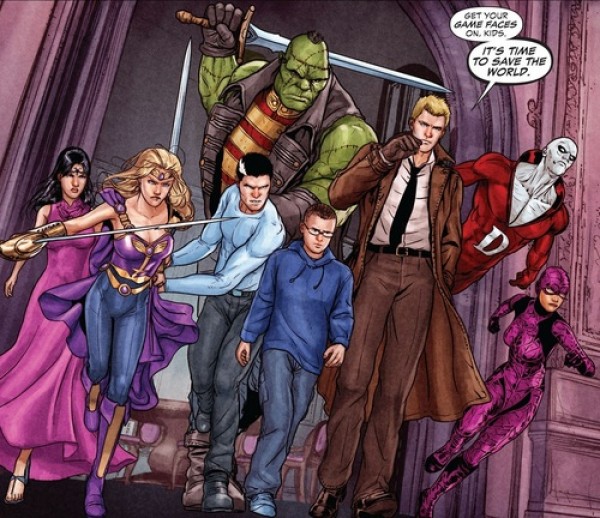 SPURGEON: The
SPURGEON: The Justice League Dark
material seems to me to represent the cleanest break with your ongoing sets of concerns and your basic approaches to form, Jeff. For example, it struck me that just having that many characters to deal with, the fact that you have like five to seven lead characters, that would have to make it difficult for you to employ the kind of pacing you're able to use with a smaller cast. Comic books like that one are these rampaging plot-point vehicles -- story point, story point, story point. Was that a struggle for you, to juggle those concerns? There's a tentative quality to that book.
LEMIRE: That one
was tough.
Justice League: Dark was my first team book, and like you said there are so many different things to juggle. With
Animal Man, it's still essentially the story of this one character. There may be a family, but it's
his family. It's much easier for me to infuse my sensibility into that.
Justice League: Dark was a real eye-opener in how hard certain books are to write, and how difficult it is to do certain things with such a big cast of characters and so much going on. I don't know that all of
Justice League: Dark was entirely successful for my figuring that out.
I'm doing this new
Justice League book next year, and I learned a lot from
Justice League: Dark just as I had initially learned with
Superboy and
The Atom before doing
Animal Man. So this one should be a lot more
me, if that makes sense. At least I hope it will be.
SPURGEON: You spoke of that first transition partly in terms of learning to deal with your writers, giving them more leeway to be creative. Is there something similar you learned this time, with your transition between the two team books? Is there something you're glad not to experience again?
LEMIRE: I think in
Justice League: Dark it wasn't so much of an artist thing as a writer thing; I was worried juggling all of the different characters and giving them "screen time" that I never had the opportunity to take a step back and approach the material the way I would otherwise approach it. I've been very conscious of taking each character in the new team book -- and this sounds very simple now, but when you're dealing with so many things it's hard to see the forest for the trees -- and giving them a personal arc and then working it so they each have an emotional hook and a journey. It's about making sure there's an emotional and a character point of view in addition to the plot point of view -- to boil it all down in a more articulate fashion.
SPURGEON: I think your art is interesting. I wondered if working with a variety of different artists as a writer is helpful in how you approach your own art when you get back to it? You're drawing the last Animal Man
. Is there something you're looking forward to in terms of getting to collaborate with Jeff Lemire the artist? What do you think your strengths are?
LEMIRE: It's hard. Much more than with my writing I'm critical of my art. Nothing's ever good enough. As soon as I finish a page I hate it immediately. [laughter] I'm very hard on my art, so most days I see the misses.
SPURGEON: What is something you latch onto in terms of wanting to see it improve, then, Jeff?
LEMIRE: I know I'm a strong storyteller. I know I can create mood and motion. It's really about trying to refine the style while keeping the looseness and the expressiveness of it. Make it tighter in terms of anatomy: technical things, pushing myself to get a bit better. Then there a days when I just have fun drawing. Those are usually the best days. [laughter]
SPURGEON: Do you draw outside of your comics work?
LEMIRE: Yeah, I force myself to sketch at least a half-hour every day before I start my other work. Otherwise I'd never do it.
SPURGEON: Is drawing a part of your writing process at all?
LEMIRE: Yeah, that's funny. I'm working on
Trillium right now, so when I sketch all I'll sketch is scenes or characters from the Simon and Schuster thing, laying the groundwork. Turning over ideas, some of which will never make the final book. I come up with stuff sketching I never would have if I sat down at a keyboard. I definitely approach stories like that visually first.
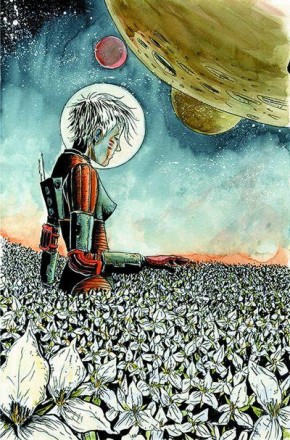 SPURGEON: The designs in
SPURGEON: The designs in Trillium
are very striking. Does that come mostly out of your sketchwork in organic fashion, or is that something you have to explicitly work on.
LEMIRE: I spent a lot of time working on the design for that one, especially in terms of the world-building there. With
Sweet Tooth, despite the science-fiction element it was still set in our world. With Trillium I design whole worlds and the look of the tech... with this new book now, I remember the last six months of
Sweet Tooth my sketchbook was full of sci-fi stuff, prepping and trying things out for
Trillium. So overall that was like six to eight months of designing before I ever started to work on the comics themselves. That was a lot of fun, actually. I also got to look at a bunch of sci-fi stuff I loved as a kid that I'd forgotten about. A lot of Moebius, a lot of stuff like that.
SPURGEON: That's kind of the zeitgeist, that kind of science fiction.
LEMIRE: Yeah, it's weird. The last convention I did was last June... I think it was June, I can't remember. Oslo. I was checking out these Norwegian cartoonists and even all of them were doing sci-fi, space stuff. [laughs] Or fantasy stuff. There's a real thing right now with genre stuff. I remember 10 or 12 years ago all of the indy stuff was autobio, slice of life stuff. It's a real shift. [laughs] Then there seems to be more sci-fi books coming out, stuff like
Saga; there's a real boom right now.
SPURGEON: Now, you're in your late 30s.
LEMIRE: Yeah.
SPURGEON: It seems like comics-makers in their late 30s and early 40s, their orientation towards the vocational aspects of comics changes. They just kind of want to get to it; they want to make significant progress on the work they feel they're meant to do.
LEMIRE: Right.
SPURGEON: You seem comfortable where you are and you're certainly prolific. Is that just reflective of a general work ethic, or have you thought in terms of starting to build a professional legacy? Is this prolific period part of a specific orientation you have to this time in you professional life, or is it just about maximizing your opportunities as they come to you?
LEMIRE: I'm definitely right there.
About three or four years everything in my personal life felt figured out. [laughs] I had a kid. I had a happy marriage. We had a house. All of that stuff was taken care of, now it was time to get serious producing -- not as
much work as I can, but trying to get all of these stories I want to tell told while I still can. There's definitely that sense of work now. I'm approaching mid-life; there's certain things I want to accomplish, certain things I want to do and I still feel like I haven't really told my best story yet. I want to keep going until I find it. Make sure I get to tell it before I get too old to hold a pencil anymore.
*****
*
Jeff Lemire
*
Jeff Lemire At DC
*
Jeff Lemire At Top Shelf
*****
* from
Trillium
* an iconic Lemire image, from
Essex County
* from the Xeric-winning
Lost Dogs
* page
Essex County
* image from
Frankenstein
* image from
Animal Man
* Image from
Justice League: Dark
* another
Trillium image
* from
Sweet Tooth #40 (below)
*****

*****
*****
posted 4:00 pm PST |
Permalink
Go, Look: Vanishing Twin

 posted 3:30 pm PST
posted 3:30 pm PST |
Permalink
CR Week In Review


The top comics-related news stories from December 21 to December 27, 2013:
1. Weird flurry of convention-related news stories flash to surface the pair of days before Christmas, from
PIX,
TCAF and
SPX. This ranged from PIX just basically saying, "Hi" to TCAF making some reasonably routine but still important to note "here they come" style announcements only a little curious for the date they were being made to SPX announcing its solution to last year's big-in-that-world story of applications for tables overwhelming their inclusive-ethos all-comers method of accepting such applications.
2. Image
integrates its digital offerings with Dropbox. I'm not all the way sure how significant that is, but it definitely has the "Thing I've Heard Of" + "Concept I Feel I Should Know About" + "Other Thing I've Heard Of" construction I look for in a prominent news story.
3. The one element of the Scott Lobdell/MariNaomi panel harassment story that bled into this week was
this Rachel Edidin essay on Lobdell's attempt at an apology. That actually appeared the day before the period described, but many folks didn't discover it or the conversation about it until the last seven days.
Winner Of The Week
Let's say Image. Every time they announce something ahead of their Expo next month it's like saying, "We have so much stuff to announce at our Expo that we need to announce stuff now."
Loser Of The Week
The idea that nothing gets announced in the week preceding and the week after Christmas. I prefer a bit of dead time -- both selfishly in that I've been pre-arranging feature content for years now with the holiday interviews but also in that I think an industry like comics can a) use some time off, particularly in that a lot of the participation in comics is supported by enthusiasm rather than money, b) a lot of eyeballs just aren't on-line in the same way right around Christmas. But you do get some of that real estate to yourself, so I guess that's part of the gamble.
Quote Of The Week
"This will sound harsh but you're probably not a writer." --
Brian Michael Bendis
*****
today's cover is from the all-time series Classics Illustrated
*****
*****
posted 3:25 pm PST |
Permalink
Not Comics: John Held Jr.

 posted 3:20 pm PST
posted 3:20 pm PST |
Permalink
Go, Look: Chris Schweizer Draws The Lonesome Dove Characters

 posted 3:10 pm PST
posted 3:10 pm PST |
Permalink
Random Comics News Story Round-Up


* this book had a huge presence in our house when I was a kid. It was a favorite of my parents, both of whom were comics fans but also fans of the slightly hip corner of mainstream culture of the kind represented by Jules Feiffer, Jacques Brel and John Updike books. I still don't know that the alt-comics tradition has all the way processed Jules Feiffer yet, although he's much beloved by a lot of cultural gatekeepers interested in comics. But he was basically crushing it in a very specific way in such an odd context that you can almost understand why entire versions of comics history don't seem to acknowledge his existence.
* Hannah Means-Shannon
walks us through Asheville, North Carolina -- a southern arts and culture hub for about two decades now, really, or at least that's when I saw the place starting to show up in magazine profiles. I think Jason Lutes lived there for a while. Nice 'zine rack.
* Dana Jennings on
Society Is Nix.
*
been there. Both sides.
*
I enjoyed this Jim Zub piece on making lemonade out of early 2013 lemons.
* finally,
Daniel Levin Becker chose Barrel Of Monkeys as his #1 book for 2013.
posted 3:05 pm PST |
Permalink
Happy 32nd Birthday, Richard Short!

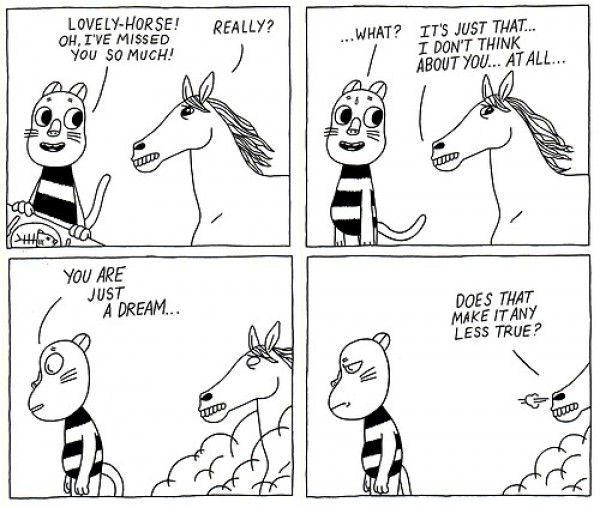 posted 3:00 pm PST
posted 3:00 pm PST |
Permalink
Happy 91st Birthday, Stan Lee!

 posted 3:00 pm PST
posted 3:00 pm PST |
Permalink
Happy 46th Birthday, Chris Ware!

 posted 3:00 pm PST
posted 3:00 pm PST |
Permalink
The Comics Reporter Video Parade
 Trailer for Edmond Baudoin Documentary
Osamu Tezuka Documentary
via
Charles Kuralt And Bill Geist On Charles Addams
Profile Of Dan Goldman
Hey, What's Going On With Aseem Trivedi?
Stan Lee With Conan O'Brien Nearly 20 Years Ago Now
RO Blechman Holiday Thingamabob
posted 2:00 pm PST
Trailer for Edmond Baudoin Documentary
Osamu Tezuka Documentary
via
Charles Kuralt And Bill Geist On Charles Addams
Profile Of Dan Goldman
Hey, What's Going On With Aseem Trivedi?
Stan Lee With Conan O'Brien Nearly 20 Years Ago Now
RO Blechman Holiday Thingamabob
posted 2:00 pm PST |
Permalink
December 26, 2013
 CR Holiday Interview #09—Sam Alden
CR Holiday Interview #09—Sam Alden


*****
Sam Alden had a very good 2013. He won
this year's Ignatz Award for Promising New Talent for his work on "
Hawaii 1997" and "
Haunter" -- both of which were nominated in that same program in separate categories. Those works were part of
a mini-onslaught of significant on-line publication for Alden that included "
The Man That Dances In The Meadow," "
Household," "
Backyard," "Patron Saint" and "The Worm Troll." This followed a 2012 that was similarly productive, marking the 24-year-old as a cartoonist on which one should keep a very close eye. An excerpt from "Haunter" was chosen for publication in
the Jeff Smith-edited edition of Best American Comics.
In 2014 he will publish in a variety of locations perhaps most importantly
a short collection of works with Tom Kaczynski at Uncivilized Books. Alden's work is already visually accomplished and you can feel him negotiating various narrative effects from project to project in a way that should serve him very well in the years ahead. I caught up to him on the phone; he was in Montreal. -- Tom Spurgeon
*****
 TOM SPURGEON: Sam, what's going on in Montreal that you're in Montreal right now?
TOM SPURGEON: Sam, what's going on in Montreal that you're in Montreal right now?
SAM ALDEN: One of the things that's going on in Montreal is
crazy cheap rent. The other thing that's going on is that I'm in this thing, this comics residency:
La Maison de la Bande Dessinée de Montreal. It's basically free studio space.
SPURGEON: I get the sense -- and I don't know how accurate this is -- that you've traveled a bit. You've spent the first part of your twenties in different locations.
ALDEN: Yeah, totally. What I'm making up for is that I stayed in the same city for a really long time leading up to my 20s. When I was 23, I lived in New Orleans a little bit. I did a residency in Alaska. I had a desk job that let me travel a little bit more for festivals -- I could stay the week in the city. I'm trying to move around as much as I can, while I still have that kind of mobility.
SPURGEON: What do you enjoy about that? Does it change the way you work?
ALDEN: Totally. Completely. In the same way I feel more productive if I just change desks [Spurgeon laughs] or where I work at my desk for three hours and then need to go to a coffee shop or something, I feel like you can do that on a massive scale by moving to a new city. The first month I'm in a new place is always the most productive month of my time there.
SPURGEON: You said you wanted to travel while you still had that kind of mobility, as if you're about to be beset by old age. Whenever I talk to people about you, your relative youth comes up. I know when I was in my mid-twenties, I did not feel particularly young. So I have to imagine it's weird to be constantly told you're young when you maybe don't feel that way. How do you process that view of you as this emerging cartoonist -- do you get sick of being kidded about your age?
ALDEN: I totally get that 99 percent of it is a compliment, and I try to take it as such. It is nice that I'm finally starting to get reviews where people say, "This is a good comic." Not "This is a good comic for someone his age." I think also that spending enough time on Twitter... I'm young to be at the stage of publication that I am, but there's a whole generation of 21-year-olds that I feel I'm the old guard to.
SPURGEON: Do you feel of
a generation at all? Do you relate specifically to your same-age peers, perhaps in terms of shared influences or outlook? Or do you perhaps feel slightly out of touch with people in comics near your age? How much common cause do you have, Sam, with those making comics in their mid-twenties? Do you feel a connection to them?
ALDEN: Yeah, I totally do.
SPURGEON: Who would you consider a peer? Who's your crowd?
ALDEN: You know who I think is my age? Exactly my age, or at least I think she is?
Maddy Flores. In Portland. She's one of my best friends back there. I guess... who else is 25?
Sloane [Leong] is like 22; I think
Michael DeForge is 26. These aren't all people I go drinking with all the time. But there is definitely a certain... a certain character to a generation that grew up imbibing the Internet so heavily. [laughs] I think a lot of that is healthy and maybe some of it in some ways -- say, attention span -- we're really suffering. Yeah, I don't know. I relate to a generation or whatever so much more than I did when I was a little younger. That felt like something I wanted to rebel against.
SPURGEON: I can't dig too deeply into your past this time out given our limited opportunity to speak, but I'm interested if there was a moment you felt you flipped a switch in terms of comics. It seems like you're all in now, Sam, that you're devoted -- at least in the right now -- to making comics a significant part of what you do. You've made a lot of pages this year, and made a similar number of them last year. You aren't dabbling. Was there a point at which you made a commitment, where you decided, "Okay... it looks like it's going to be comics" even if only for a while?
ALDEN: I flipped it a long time ago.
I've always been drawing comics. I think maybe until college, until I was 19 or so, I was like, "Well, maybe I'll write. Maybe I'll draw comics." I had these different things I've been juggling. But since I've been 20... I started this big, unfinishable graphic novel thing. Since then I've been all-in for comics.
SPURGEON: Wait, tell me about the abandoned graphic novel. This is something I've seen, right? At what point did you abandon it?
ALDEN: I still get people asking me what happened to it, so maybe I can say something for the record here.
 SPURGEON: Are you talking about Eighth Grade?
SPURGEON: Are you talking about Eighth Grade?
ALDEN: Yeah.
Eighth Grade. If you haven't read it, it's about middle-school kids and it's done in this kind of Nate Powell-y super brushy style. I worked on it for like four years or something. About seven months ago, I hadn't really updated it or anything, but I was still telling people, "Oh yeah, I'm working on it. Gotta finish that thing." [Spurgeon laughs] I got this text message from
Dash Shaw. We're friendly, but we're not text-message buds or anything. We hadn't seen each other for months, since
Stumptown. He said, "Hey, man. I don't think you should finish
Eighth Grade. You've gotten a lot better since then." And as soon as I got that, I felt this huge weight lift off of my shoulders. [laughter] I'd been given permission by an artist I really admire to like fucking cut the albatross from around my neck. Devote myself to short stories. So yeah, that's the story to that.
SPURGEON: So was having the time to devote to shorter stories as you've done since, was that the idea of moving away from a longer form work, or is there something about that particular mode of presentation that you weren't into anymore?
ALDEN: I think that comic was drawn when I was still figuring out what I wanted to do. And one of the characteristics of being in that stage where you're figuring out your own style or something, you're really concerned with making a comic that
looks like a real comic. So it looks like
somebody else's comic. Mine looked like
Nate Powell's.
What the shorter stuff allowed me to do in addition to learning a little more about storytelling is just to experiment and remind myself that it was fun to draw comics. Now I'm heading back to the curve. Now I feel like I want to settle down and do a more meat-and-potatoes, longer-form comic with some of the stuff I've learned.
SPURGEON: How self-conscious are you in terms of your artistic development, Sam? Do you spend time thinking about what you're good at doing, what you're not as good at doing, what you might need to work on? Is there a development track in your head, or are you just doing one work after another and letting that stuff take care of itself? It sounds like you're slightly more analytical than some when it comes to building your skill set. Is that fair?
ALDEN: Yeah. Yeah, it is. That makes it seem like I'm more in control than I am. But it is true that with each story... if there's not something that challenging about it, or new, I quickly get bored -- even if it's good. So yeah, it's honestly [laughs] about keeping a comic of interest to myself and motivating myself to finish it.
SPURGEON: You said you wanted to remind yourself that it was fun to make comics. Where do you take pleasure in the act of making comics, Sam? When a comic works for you that way, what's going on? Is it the problem-solving aspect? Is it the pleasure of drawing? How much is process, how much is result?
ALDEN: The drawing is fun, now that I'm working physically smaller. I've been doing a lot of these little graphite things. There's definitely pleasure in making a compelling image. But for me the main pleasure in it comes -- I used to do animation, and the cool thing about animation was slowing your mind down to see the motion that you're drawing at an incredibly slow frame rate and visualizing it in your head. I feel like I get some of the same sense of that from drawing a story and then from reading back over what I've read and getting the pacing of it and seeing how the elements work and then choosing what's going to happen in the next panel. Knowing, "Okay, that's where this motion has to go." There's something about that... the concentration that that takes, that's really pleasurable for me.
 SPURGEON: Are you talking about physical motion in comics specifically at all when you say that? Because things like "Haunter," those are maybe best understood as comics depicting motion through a specific landscape. It comes up in your other comics, too: "Hawaii 1997" has a few isolated depictions of physical activity. Or do you mean more generally and broadly the pacing?
SPURGEON: Are you talking about physical motion in comics specifically at all when you say that? Because things like "Haunter," those are maybe best understood as comics depicting motion through a specific landscape. It comes up in your other comics, too: "Hawaii 1997" has a few isolated depictions of physical activity. Or do you mean more generally and broadly the pacing?
ALDEN: I was thinking even more broadly. Definitely there's an element of that. You can just get into this rhythm when things feel right. Making your choices more by instinct than by mathematics: The story elements you need to bring in. There should be this much dialogue in that much panel. We should see this character again.
SPURGEON: Is that instinctive type of creation something that's difficult for you? I've read you talking about applying theoretical constructs to comics. Is that a dichotomy for you: problem-solving versus working through a story more naturally?
ALDEN: Yeah... well... yeah. [laughter] I'm going to answer that question intuitively instead of according to a method.
I was thinking the other day about Frank Santoro's grid. I don't know that my pages look much better when I try to draw according to those. But I get them done so much faster because I don't have to make every decision by intuition. So maybe on that level... yeah. I like to use systems when I find myself over-thinking stuff.
I don't know if that's a straight answer.
SPURGEON: That's a fine answer.
You said something interesting recently, sort of randomly, via your tumblr. The work you've done in the last year seems pretty evenly split, to be as broad as possible about it. You have these comics that have these literary qualities, where there's a specific effect and a cohesion between theme and plot. You've also been doing these kind of landscape-y comics, comics where you see a character explore their surroundings, where you see someone kind of moving through a space. There are combinations of the two as well.
To talk about those where you're just exploring a space: it seems like that this is a kind of comics-making I think of when I think of young cartoonists, but you've said you don't maybe naturally live in the world of science fiction or fantasy comics -- two common genre vehicles for such comics. You said those genres are not as natural a source for making comics of your own as they may be for other cartoonists.
ALDEN: Yeah. Totally. I guess because... and this is going back to the idea that I'm trying to make comics that look like real comics in some sense. I do kind of feel more comfortable in that talking-head zone of literary comics. I don't know. Trying to do the fantasy stuff, the genre stuff, has been really liberating for me when I've made myself do it. It's really... fun. It's like admitting that video games are fun and they're not something where you have to feel guilty or adolescent about.
SPURGEON: So how does that manifest itself in your comics? [slight pause] Does "Haunter" count as that kind of comics for you?
ALDEN: Yeah.
SPURGEON: So how was doing "Haunter" good for you? How are you a different cartoonist coming out the other side of that one? Is it you have more skills in your toolkit? Is there just a comfort with a specific mode of expression? General confidence?
ALDEN: One thing I learned is that that "Haunter" feels like a comic book to me. It's not trying to be a short story or a movie. It feels like a comic book. I gained some amount of respect for the form that I didn't have before. A wordless sci-fi comic is unique to the medium. It's hard to do something of that scope in literature.
I learned a lot about the animation of bodies in space. I learned how to draw so much from doing that comic that I wouldn't have learned drawing people lying in bed and crying. [laughter]
 SPURGEON: You do play around with the human form a bit. Your figures don't seem 100 percent the same project to project. Is that you trying different things out? Is that you establishing how you want to people to look during a story? I see similarities between figures of yours but I'm not sure it's coalesced into a recognizable kind of figure drawing
SPURGEON: You do play around with the human form a bit. Your figures don't seem 100 percent the same project to project. Is that you trying different things out? Is that you establishing how you want to people to look during a story? I see similarities between figures of yours but I'm not sure it's coalesced into a recognizable kind of figure drawing apart
from each story, if that makes sense. That's usually one of the first signifiers I get from a younger cartoonist and I don't have that from you yet. Is this something you're working through?
ALDEN: I guess I am working through that project to project. Maybe a part of that is that when I think of a panel I tend to draw the background at the same time as the characters. So I tend to approach each -- this isn't quite the question you're asking -- but I feel I'm better at composition and so address each pose. I'm like, "I want it to feel like he's going up the stairs" or "I want to convey the contours of the face there." I
I never did much in the way of anatomy training. I think there are a lot of kids that fill their notebooks with character drawings, over and over. My sketchbooks for whatever reason didn't have the same kind of... yeah, I never did that.
SPURGEON: What's in there, Sam? Is it all liquor bottles and motorcycles?
ALDEN: I sketch the ceiling. I convey the texture of the ceiling. I don't know; I don't keep a sketchbook anymore. But back in the day, I would just do field drawings, go out in the woods and do something.
I feel like my character all look
so similar to one another. I think they all have big noses, and the same kind of hunchy body. They all have my posture. Heavy eyebrows. I've been training myself not to do the eyebrows that way.
SPURGEON: [laughs] How much does your own sense of physicality inform your comics? Do your limitations physically restrict how you choose to portray action on the page?
ALDEN: Yeah. I'm always having to act stuff out: either literally, where I'm in front of my camera and trying to nail a pose; or in my head, where I'm like, "How would I do that?" I just did a scene where a woman has to set a glass down on the ground and then sit down herself. I'm drawing her as much heavier than I am. It doesn't work to convey that motion with the sort of gangly, skinny-guy motion -- the weight shifts differently. So that's hard.
SPURGEON: I want to ask you about "Household."
ALDEN: Sure.
SPURGEON: The use of the page is interesting there. There are several different narrative arcs in "Household," and the pages themselves play off of those multiple through-lines in terms of how they're composed. When you're jumping from these narrative points, what is going on in the different workplaces: it seems like you were really bold about making those shifts within a page rather than settling for the more natural break that comes between pages. How much are you still working through how to use a page? Was that an important project for you in figuring out a structural component that has to be different for people that have done so much on-line?
ALDEN: Yeah, it was. Something like "Hawaii 1997," which looks somewhat similar in style, was drawn more for the Internet. It was drawn to be read in a long scroll. I never paid attention, for example, to how the spreads would work. The spreads in "Household" I drew in a sketchbook so I could see each spread as I was drawing. You're right in that in that one thing I was trying to do was set up mirroring page layouts so you'd see the same thing twice and get a sense of
deja vu. In one panel the sister would be hammering in a nail and in the other she'd be sleeping with her brother. I had forgotten about that, but at the time I was trying to do that, work with the individual pages.
 SPURGEON: When you work with a story that offers up that kind of undeniably powerful, that loaded of a subject matter, how intimidating is that for you as an author? Do you worry about doing justice to a topic, and is that different from you in a telling way from working a story that's cognizant of motion or a story that turns on a theme of vocational difficulties or an encounter on a beach.
SPURGEON: When you work with a story that offers up that kind of undeniably powerful, that loaded of a subject matter, how intimidating is that for you as an author? Do you worry about doing justice to a topic, and is that different from you in a telling way from working a story that's cognizant of motion or a story that turns on a theme of vocational difficulties or an encounter on a beach.
ALDEN: It was terrifying, actually. I think what I had going for me is that I based a lot of it on my own experiences of sexual victimization and incest. So in that sense I didn't feel like I was appropriating someone else's story. Even though the circumstances were different, and I don't have a sister -- this is fiction, it's a work of fiction. Every time I post something that deals with something sensitive like that... even the last comic: I just did this horror comic, "The Dancer In The Meadow." I have all of this implied sexual violence... these kinds of creepy sexual vibes throughout the whole thing. I was really concerned with trying to get that right, to portray that stuff respectfully. Respectfully is a weird way to say it because it is a horror comic. I guess I wanted to use something like that in a way that doesn't feel exploitative. I know some people have -- and I don't know how much they know about my own experiences or whatever -- but I know some people have responded poorly to "Household" and said that it's using this thing for shock value.
Sean T. Collins said that he didn't like how the sister was vilified even though it was suggested she had her own kind of victimized past. I think those are both fair points. But yeah, I do try. [laughs] I try very hard. It's dumb to think you're always going to succeed with everybody.
 SPURGEON: Without getting too deeply into your own story, can you identify the kind of thing that is helpful to you in having this experience when it comes to making this kind of story? Is it that you are aware of details? Is it that you have greater access to a specific emotional truth you can use? What do you mean when you say there's an advantage that you can use an experience like your in a work of art like this one?
SPURGEON: Without getting too deeply into your own story, can you identify the kind of thing that is helpful to you in having this experience when it comes to making this kind of story? Is it that you are aware of details? Is it that you have greater access to a specific emotional truth you can use? What do you mean when you say there's an advantage that you can use an experience like your in a work of art like this one?
ALDEN: Like you said, in terms of making it a more effective work of art I'm more familiar with the dynamics of how abuse works, and how it made me feel. I could try to bring that out. I think also in having the work out for a wider audience, I felt more comfortable defending that work knowing that it wasn't about somebody else's problems. I was making it about my own. I think even on a personal level I don't usually make art to work out my own feelings, even on a conscious level, but I was doing it in that comic. It really helped in this really sort of cheesy "art heals way. [laughs] I learned a lot during that comic and helped myself a lot.
SPURGEON: You mentioned this a couple of times and I want to address it directly. I was talking to an older cartoonist about his 'zine days, and he spoke very positively of having the ability to do work that maybe wasn't ready for publication in the established parameters for that, but that still had value in terms of his necessary development as an artist. I would have to imagine that posting your stuff on the Internet is your way of doing that, Sam, but the difference... the difference is that the audience is very active. You're not making work for an empty room or a play workshop or whoever might pick it up at Quimby's. You're making a work that might be seen by thousands of people a day after you post it. They're looking at it, and they're responding to it. How do you negotiate that intense feedback? Does that add a layer of difficulty when it comes to developing as an artist?
ALDEN: Sure. Not to make into too much of a scavenger hunt, but I do comics privately, too. [laughter] They're on the Internet but they don't have my name on them. They don't look like my other comics. But that's... that's hard in that I feel like I have standards to live up to now. Standards I've hopefully created. I don't want to disappoint people.
The positive reactions... in addition to that little shot of self-esteem cocaine gives you, if enough people like your little doodle on twitter than you draw your next panel, that whole thing with "Household"... when I was drawing it it was pretty analytical for me. I wasn't that invested. It wasn't really until -- this sounds so dumb -- it wasn't until I put it on the Internet and got people's feedback that I was able to emotionally process a lot of that stuff. I was at my desk job in Wilsonville, Oregon [laughs] when I put that up and I started getting all these people saying, "Oh my God, this is really intense. This is dealing with some heavy stuff." This was the first time... I was like, "Oh my God, you're right. This is some really heavy shit." [Spurgeon laughs] I had to go up into the attic of this shitty corporate building [laughs] and weep and check twitter. It was intense, but very good. I don't know. Having a supportive community rallying around your art, that has been a big deal for me.
SPURGEON: One thing I think connects your stories for the last couple of years is that it seems like -- seems like
-- you're paying close attention to the considered effect of your stories. It seems like there's a real desire by you to stick your landings with the short stories, to have everything summarized and hit the hardest with that final scene. Things come together in a way that feels controlled -- not quite mannered, but with a clear intention that they hit at once. A blending of effects, even. Is that something doing so many short stories has allowed you to do, nail down in a literary sense how you want your stories to hit with readers? Do you have an expectation for how short stories should
hit?
 ALDEN:
ALDEN: That's definitely something I'm consciously trying to do. Maybe sometimes I hit it over the hard. In that same review by Sean T. Collins -- and I'm on good terms with him, I'm not trying to call him out [laughs] -- he said that I end a lot of my comics with a big, unearned emotional panel. I think that's pretty fair. I tend to want people to know that "Here it is. This is the riding into the sunset shot." Thematically it's important to me to wrap stuff up. A lot of people have complained to me on the Internet that I have too many open-ended ending, so it's good that to you it seems like I'm wrapping stuff up.
SPURGEON: It feels like the effort is there -- Sean's comment would be the negative of that. A further criticism might be that you're sacrificing a greater effect by making sure everything hits hardest in these summary finales. The impulse is more interesting to me than the effect, really. Why do you want
your stories to work that way? Is that just your background, what you value from literary fiction? Is there a compulsion on your part to make these grand statements.
ALDEN: I think there's a certain amount of insecurity there. I think it takes guts to let stories drift off. Some of my favorite cartoonists and authors are able to do it beautifully. I don't know. At the moment I'm into tying that knot at the end. I guess because it justifies the work the reader put into getting through the whole thing. That's how I'd put it.
SPURGEON: You have a bunch of opportunities ahead of you and you're publishing in a variety of places in 2014. Are you satisfied with your options, Sam. Do you think you're served by the industry in terms of its ability to get your work out where it can be seen? Or are there frustrations for you, things you wish that you got from the business side that you're not getting, or at least not getting yet?
ALDEN: What's important for me to say right off of the bat is that I feel really, really lucky that I get to work with as many publishers as I do. Anything I have to complain about needs to be tempered by that. It would be nice if there was more money in this industry. [laughs] Like, that's pretty obvious. I can't speak to that right now because I've signed up for more stuff than I'm engaged in right now. I'm barely making low rent with comics. I'm not... yeah. I feel lucky to be able to do that!
SPURGEON: One of the humbling things about working in the arts, Sam, is that no matter how frustrating you might your find your present gig there are a hundred people looking at you and thinking, "That should have been mine."
ALDEN: Totally. That was me. That was me until a month ago. [laughter] I swear. I hear that. Even artists.
I believe in the arts. People should be able to support themselves doing art. I think when people complain a lot of the time about making a living as a cartoonist they should maybe be remind that it's hard to do anything. [laughs] There are a lot worse professions to be making minimum wage on. Maybe I'm just focusing on money... you question was broader was that.
SPURGEON: It was a little broader than that. It struck me that 25 years ago where cartoonists would immediately settle into relationships with publishers. If not the first time out, then maybe the second. And that these relationships are the kind that are pretty secure and prolific... to the point that when a cartoonist works with someone else it's seen as weird or even as an implied criticism of the primary publishing relationship. Your work seems spread out with a variety of publishers, and I wonder if there's something about that you like: is there something to be said about relishing the opportunity to work with Tom Kaczynski on a specific project?
ALDEN: I think it's... one thing is that I'm really interested in doing a lot of different kinds of comics. I don't want to have too much of a... I don't want to be locked into one kind of style or story. It suits that need to work with a variety of publishers with their own aesthetics. Tom K. is an actual book designer, and he can tell me how to make a book look a jillion times better than I'm able to. It looks like a Tom K. book and that's about as comfortable as I could ever get in terms of collaboration. But it's really fun. [laughter] I'm doing one for
Retrofit right now and I'm trying to make it fit into the kind of books they're interested in doing; I want it to feel like a Retrofit book more than a Sam Alden book.
Another reason I maybe haven't attached myself to a larger publisher is because I don't have a larger book. I've just got a bunch of little tiny guys floating around.
*****
*
Sam Alden
*
List Of Comics Available On-LIne
*****
* from "Household"
* magazine cover illustration as posted to Alden's blog
* from
Eighth Grade
* from "Hawaii 1997"
* some of Alden's figure drawing
* jarring image from "The Dancer In The Meadow"
* a quiet moment from "Household"
* a big ending moment from "Backyard"
* from "Haunter" (below)
*****

*****
*****
posted 4:00 pm PST |
Permalink
Go, Bookmark: The Jack Davis Foundation

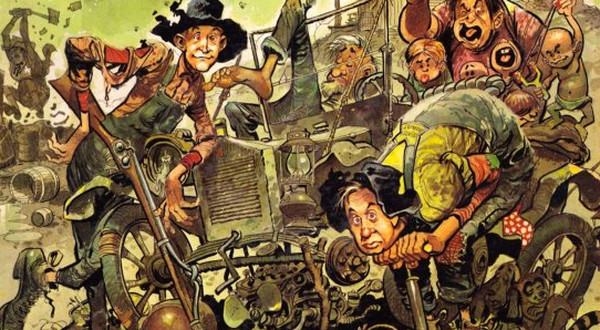 posted 3:30 pm PST
posted 3:30 pm PST |
Permalink
Assembled, Zipped, Transferred and Downloaded: Digital News
 By Tom Spurgeon
By Tom Spurgeon
* I wasn't aware that GoComics.
was running Mo Willems' sketches from Paris on its site as its own feature. That's fascinating in its implications, although something makes me think they've made it pretty clear already that they'll be doing a variety of material there.
* it's hard for me to judge which of
these kinds of announcements are important and which ones aren't, but I figure if you're offering DRM-free content like Image Comics is doing it would help to have as many platforms and avenues going as is possible to have.
* finally,
Gary Tyrrell makes some recommendations.
posted 3:25 pm PST |
Permalink
Go, Look: Esad Ribic Draws Wolverine

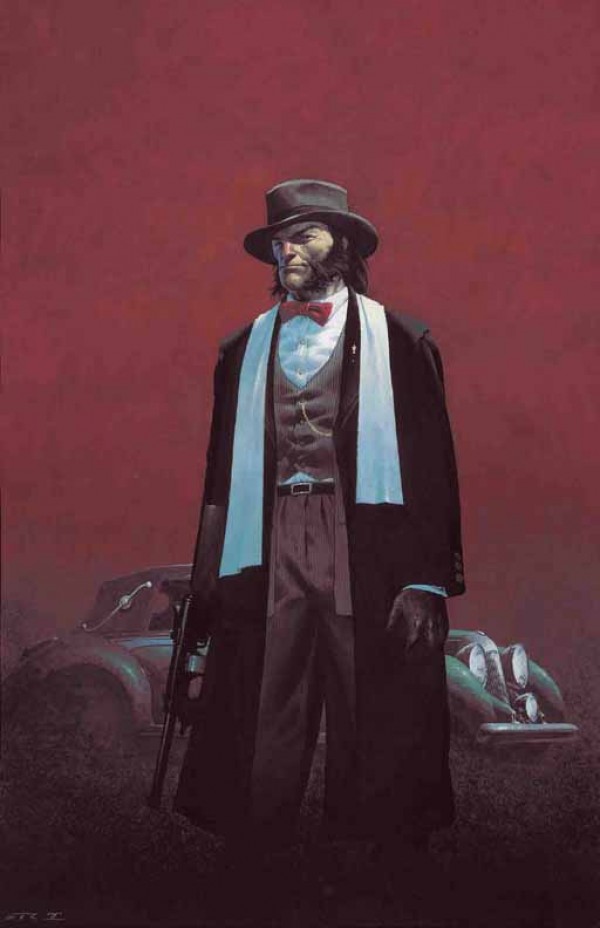 posted 3:20 pm PST
posted 3:20 pm PST |
Permalink
Not Comics: Moebius Concept Art For The Movie Willow

 posted 3:10 pm PST
posted 3:10 pm PST |
Permalink
Random Comics News Story Round-Up

*
TCJ reviews 2013. They have some really great writers over there.

* it's funny how fandom works, because on the one hand I was one of those snobby little kids that thought Jack Kirby's stuff was too unsophisticated and childish to make for the kind of comics I wanted to read and on the other hand I was totally reading everything that Jack Kirby did I could get my hands on. This run of primetime Kirby
Fantastic Four reprints provided me with some of my favorite comics from the decade after the decade in which they initially appeared. There's a panel of an elephant made of sound smashing things with a tree trunk that is as bonkers a throwaway panel as any that ever existed. I also liked that Klaw villain, and the idea of sound as the extreme danger offered a bad guy -- that was something around which to wrap your little-kid head, and the robotic hand was super-creepy. Thanks, Mr. Kirby.
*
Alan Moore is up to something here.
*
just because I sort of understand how modern variants work doesn't mean I understand the variants.
* Matt Bors, he of the "I had a very good year" statement three or four years in a row now,
remembers the year 2013 via editorial cartoons.
*
wow. Also, that was more than 20 years ago.
* I don't know if Shawn Cheng does a lot of
this kind of thing, but I figure it's worth following his twitter account to find out.
* finally,
Roger Langridge draws with a pencil.
posted 3:05 pm PST |
Permalink
Happy 39th Birthday, Nina Bunjevac!

 posted 3:00 pm PST
posted 3:00 pm PST |
Permalink
Happy 58th Birthday, MD Bright!

 posted 3:00 pm PST
posted 3:00 pm PST |
Permalink
Happy 39th Birthday, Keith Pille!

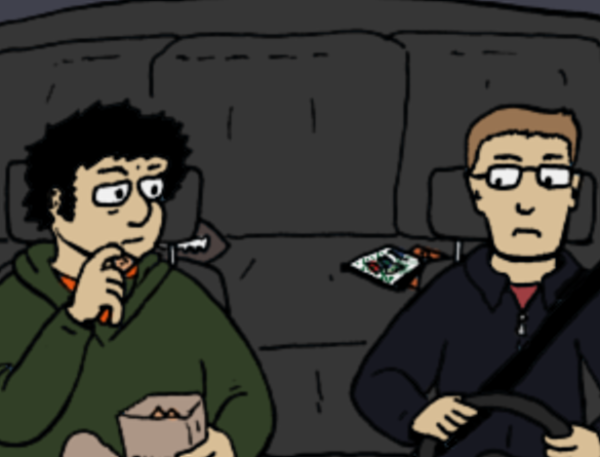 posted 3:00 pm PST
posted 3:00 pm PST |
Permalink
Happy 47th Birthday, Joan Hilty!

 posted 3:00 pm PST
posted 3:00 pm PST |
Permalink
December 25, 2013
 CR Holiday Interview #08—Gary Tyrrell
CR Holiday Interview #08—Gary Tyrrell


*****
Gary Tyrrell is one of the foundational comics bloggers, by which I mean one of the seven or eight bloggers currently working that I believe has an authoritative perspective on a significant aspect of comics making. Tyrrell covers webcomics-making and its supporting sub-culture as that kind of comic became understood around the middle of the last decade: the comics world of folks like
Kate Beaton,
David Malki,
Chris Onstad and
Meredith Gran.
Fleen is a daily stop for me.
I've been dying to meet and/or interview Tyrrell for years; I still have yet to meet him. I thought it was an interesting year for comics of the type he covers, and his conception of a milieu where creators are building on their relationships with their audience in these sorts of specifically targeted ways is an intriguing one to me. I am additionally grateful that Tyrrell gave me so much time for me to ask my old-man questions. I edited what follows a little bit more than usual because we quickly grew so comfortable talking to one another that the conversation became a bit ragged on my end. This is particularly true of the last couple of subjects introduced. That was all me; Tyrrell stayed mostly on point. In typical
Fleen fashion, we end on a super-enthusiastic note, in this case for the forthcoming documentary
Stripped.
I am super grateful for the time spent by Tyrrell in helping this interview see publication, for his trust in this edit, and for his daily attention to this crucial element of today's comics. -- Tom Spurgeon
*****
TOM SPURGEON: So I thought I would go back and look at some of the earliest posts on Fleen
, or at least what you still had up.
GARY TYRRELL: Eight years now.
SPURGEON: Going back was no help at all. It's the same blog, Gary. It's almost like you started mid-sentence your voice has changed so little in that time. You're completely baffling to me. [Tyrrell laughs] Where the hell did you come from?
 TYRRELL:
TYRRELL: Where did I come from? [pause] I came from meeting
Jon Rosenberg and
Phillip Karlsson of
Goats one year at
MoCCA. Thanks to our shared love of beer, they invited me to their regular Thursday night drink up at the Peculiar Pub in New York. Things just sort of cascaded from there. Once you meet one cartoonist, they have friends, and they have friends, and they have friends...
SPURGEON: So when did you make the choice to write about these people you were meeting? What was involved with making that decision?
TYRRELL: It was actually something Jon prompted me to do, something he wrote back on the
Goats site back late 2004, early 2005. There were a number of sites that were purporting to do discussion about webcomics but were written by the people who were doing webcomics. He was railing that if you were doing this you shouldn't just be writing about what you were doing and what the people in your studio are doing. There should be somebody else who's not creating stuff who's doing this.
If you repeat something often enough, with enough beer, it becomes a good idea.
SPURGEON: [laughs] Are there people you consider predecessors? The only one close to you I can think of is Eric Burns-White.
TYRRELL: Eric Burns and
Xaviar Xerexes were doing stuff around the same time -- everyone else has dropped out. Eric writes much more in-depth than I do. He does things from a half-fannish perspective, half lit-crit perspective. I don't have any of that training, or that background or that patience. I try to bang things out during the workday. It's more of a... it's a world that fascinates me because I know I could never do it. I enjoy the end product because the mechanics and the business workings and the rest fascinate me.
SPURGEON: Do you have some sort of writing background? You have a very distinctive voice.
TYRRELL: No, I'm an engineer by training.
SPURGEON: Okay. [laughs] Is this the first time you'd written in a sustained fashion?
TYRRELL: I'd contributed to various things, like writing humor through college and grad school. I've written a couple of technical books. But first of this nature.
SPURGEON: Was there a role-model, maybe outside of comics? Was there someone who covered a scene in a similar fashion with a similar voice?
TYRRELL: Not
a person, but a lot of the approach where it's not overly fawning but occasionally a bit derisive, that comes out of the British tech newsletter scene. There are some tech newsletters where the tone is somewhat similar, but it's mostly my voice.
SPURGEON: You've been around eight years, which is a billion years of Internet time. But by 2005 it wasn't like it was a brand-new scene. Some people that are around now were already around in some fashion; you also had people who had been doing digital comics for multiple years. So had you been following this material from the 1990s? I'm assuming you hadn't stumbled into that MoCCA Festival out of love for old buildings, but I'm not sure where your comics interests lie.
TYRRELL: I stumbled into MoCCA because I was volunteering with the
CBLDF. Which started from... oh... '98 or so. So I'd been to every MoCCA and a bunch of
SPXes working their table. I started to find that the people doing things on-line were much more interesting... their work was much more interesting to me than the people coming out of the older print and minis scene.
I probably started... there used to be a British tech newsletter called
NTK. Doesn't exist any longer. "Need To Know." A lot of the people from that went on to found one called
The Register. They had a writer -- who still does things for them occasionally, but at the time he was doing things for them weekly -- called
Simon Travaglia, who is a systems administrator from New Zealand and invented this character called
The Bastard Operator From Hell, which is every stereotype of the evil, manipulative, murderous even tech guy at a company. Don't cross him. Don't ever cross him unless you want to get stuck in the elevators for a long weekend. When the first collections of his writings came out, I think it was from -- I don't think they're still around -- the old
Plan Nine imprint out of North Carolina. They were at that time starting to print a lot of the first-generation webcomics. So
Jeff Darlington's GPF and
Pete Abrams' Sluggy and
Kevin & Kell and things like that were in their stable. They got people from that end of the world to do illustration. That is where I took the leap over and found
Keenspot, and found
Brad Guigar and a bunch of things like that. I spread out pretty quickly. The original Big Panda Era stuff.
I didn't realize it, but the original Fleen the name was owned by Rosenberg, which was the fairly large electronic entertainment network where
Goats and
PvP and
Wigu and
Waiting For Bob and a bunch of other early webcomics --
Bobbins -- were all portaled. I leaped into reading from there.
 SPURGEON: Did you have any idea you'd stick with it this long? I know that's a standard question, but I'm fascinated by the continuity of what you've done.
SPURGEON: Did you have any idea you'd stick with it this long? I know that's a standard question, but I'm fascinated by the continuity of what you've done.
TYRRELL: It's sort of half-habit and half-"I'll Show Them All" vengeance seeking at this point. [Spurgeon laughs] Back in my undergraduate days I was on the radio: one of those really tiny college stations with an effective radius of about eight miles. The big, big, cabinet party speakers that we would rent out actually had a higher power draw than our transmitter. One of my friends said the best thing about being on this radio station is you can inflict your musical tastes on people for an hour at a time. If they happen to be listening! That's kind of how I look at what I'm doing. One of the occasional references I make to myself is as a vicious opinion-monger. This is a place where whatever is on my mind, whatever I can construct, whatever I think might be clever -- a gag I want to pound into the pavement -- this is the place where I can do that.
I went to a technical school -- I've mentioned this a couple of times -- with a stringent set of humanities assignments. [Spurgeon laughs] It was very popular. I'm thinking back one day my senior year, a friend of mine and I took a history class. The regular history professor there, and there was just one, was on
a Fulbright fellowship, so we had a substitute for that year. He was spending time on our campus but also at the
University of Illinois Urbana-Champaign. He said about halfway through the term, "I just realized something, guys. I'm teaching you the same curriculum I'm teaching at Urbana, and you guys are on the quarter system so you have ten weeks to a term, they're on the semester system so they have 15 weeks, you're doing as much reading as they are in less time, you're cranking out papers as good as they are... they're history majors, you're engineers, what the hell?' [Spurgeon laughs]
We had to explain that this was the only class we were taking this term that doesn't have math. This is the break.
This was not "History: It's Good!" This was a specific 200-year look at war and revolution from the French Revolution forward. You're reading things like
On Crimes And Punishments and
The Social History Of The Machine Gun and
Homage To Catalonia -- some fairly in-depth stuff. It was
the break. It was where you didn't have to think; it was, quite frankly, a really relaxing time. In engineering the answer is either correct or it's wrong. The math adds up or it doesn't. But if I'm writing about
Macchiavelli, there's room there for argument or even artful bullshit that you can get past someone even if it's a bit weak. So it's creative in a different way.
SPURGEON: So why aren't there more of you?
TYRRELL: I came in at a time when there wasn't anyone else. Then at some point, the comments became the place where the community sort of spoke to itself. If there was something about
micropayments, or something about Keenspot, or somebody trying to set up a syndicate model, I could pull a hundred comments on a thread and let people argue back and forth. That's dropped off tremendously. You ask why nobody else is doing this. Since about 2008, as you got twitter showing up, that's where the community talks to itself now. Perhaps that why nobody else has bothered to come in. Not that there's nobody else writing about this, it's just usually in the context of something else.
Lauren Davis writes good stuff, although it's frequently at
ComicsAlliance or
io9.
Brigid Alverson writes really nice stuff on webcomics, and so does
Johanna Draper Carlson, through their usual outlets. There's a woman named named
Robynne [Blume] that launched a weekly thing -- a much more in-depth column that runs once a week called
Webcomics Worth Wreading. With a "w" on "reading."
SPURGEON: Uh...?
TYRRELL: WWW.
SPURGEON: Okay. [laughs]
TYRRELL: So there are people doing this, in a more formalist context in a lot of cases. I'm either burying myself for a week looking at numbers in a kickstarter, or it's whatever I can bang out over 90 minutes at lunch time.
 SPURGEON: From what I understand talking to you informally, you think the core Fleen readership, your few thousand regular readers, you think this is a well-connected group... very much at the core of people making the webcomics and/or making a profit from them or sustaining a business in service to them. You also get a number of people who want to be those people.
SPURGEON: From what I understand talking to you informally, you think the core Fleen readership, your few thousand regular readers, you think this is a well-connected group... very much at the core of people making the webcomics and/or making a profit from them or sustaining a business in service to them. You also get a number of people who want to be those people.
TYRRELL: Or even if it's not the people who are making the profit from the webcomics, the webcomics are there along with where they're making their profit. A perfect example would be almost anybody out of
Periscope Studio, or
Karl Kerschl who has established a career at the big comic book companies but
Charles Christopher is his.
SPURGEON: So you don't have to explain things. There's not a webcomics 101 voice that you feel need to use. Are you comfortable talking with your audience in a kind of assured, "we're all in the know here" way or do you wonder after every post being potentially someone's first post?
TYRRELL: It's interesting you ask that. As soon as you asked that, I went right to Stan Lee who always admonished that every issue was going to be somebody's first issue. I'm thinking I'm probably don't have continuity crud: "but in issue #27, Spider-Man's girlfriend clearly said..." [Spurgeon laughs] I think I write things at an apparent-enough level, it's possibly the engineer in me, that if somebody reading me can't get through what I've written and follow the links I've provided and figure out what's going on then I have failed at my job. But I don't sit back and define all my terms each time. There's been times where there's been complaining about something has been a little "inside baseball," where I was opaque enough that somebody said, "Huh?" And okay: I'll do better next time.
SPURGEON: You don't have continuity crud, but now that you've been doing it for several years do you ever think of your coverage in terms of recurring stories? Or repeating beats within your coverage -- like crowd-funding, or platform issues, do you think about it ever in terms of stories that repeat?
TYRRELL: It's honestly whatever comes to me on the day. I've usually got within Wordpress a post or two of one-line things and then rearrange them according to some kind of theme I can hang a title on. Yesterday for example, suggested naturally doing some vaguely-related follow-ups on various things I've talked about recently. Hasn't gone up yet, but today's will probably be on the theme of holiday gifts. "Here are holiday gifts that are interesting to us."
SPURGEON: Let's talk about this year. Or if a year isn't a proper way to look at these things, let's talk about the recent past as it relates to right now. I thought Joey Manley passing away might be a place for us to start because certainly someone's passing is a thing we all recognize in the classic sense as being a story. It's as old-fashioned a story as you can get.
TYRRELL: I didn't know Joey well. What struck me so much about Joey, was after he first hooked up with
E-Line, I spoke to him at
New York Comic-Con in I want to say '08. He was full of enthusiasm about what he'd be doing over the next six to 12 months... and it didn't show up. I'd ping him and say, "When is that coming?" He'd say, "I can't talk about that right now." And eventually those intervals between my pinging him became longer, and it became a ritualized once-a-year: "Still can't talk yet. Nope." I wonder what he didn't get to build because of his partners and where their focus was going to be or what they were willing to fund or their priorities and where they might have shifted.
SPURGEON: He was known for that kind of initial enthusiasm, though, enough so that it's a big part his legacy, I would imagine: this kind of overwhelming optimism about the possibility of of a structure or a plan or an element of organization brought to this world.
TYRRELL: A lot of his really most influential stuff was a bit before I came on the scene, which I experienced as a removed consumer. Looking back at the number of people that cite him as having been influential on their having careers and then how long ago that was, he was very prescient in that respect. I wonder if he could have had a different kind of partner or someone that was willing to treat his work as an angel investment -- "Look, we think you're onto something here and we're going to write you a check and stay back" -- as opposed to bringing him in to run a division.
SPURGEON: I asked a bit earlier why we didn't have a few more figures like you, but is there a reason we haven't seen more figures like Manley? There aren't a whole lot of non-creators of significant import in that world. Robert Khoo, maybe. Yourself.
TYRRELL: I think you'd have to put several levels of magnitude between me and Joey.
SPURGEON: I'm just saying there's a dearth of such figures on any level, which I don't even mean as a criticism but as something worth noting about the culture.
TYRRELL: From my reading of the history, Joey got to be Joey because he got a good cash-out from his tech endeavors and then decided, "What am I going to do with this money?" And that's a rare enough thing... I'm surprised that we got one Joey Manley.
 SPURGEON: I flashed on creator-producers -- you have creators that have been around a while now. They're lifers, or at least seem to be. And I think they're taking on those terms now more than ever. There's a shift away from looking at what people like that might do and as shift towards paying closer attention to what they're doing right now. People that you routinely cover -- like David Malki, for instance -- seem to be uniquely interesting creator-businessmen, and I have almost no grasp what the market they're working in is like. Is there a primer for those of us that behind the times there, an introduction you can give us as to what you're seeing right now?
SPURGEON: I flashed on creator-producers -- you have creators that have been around a while now. They're lifers, or at least seem to be. And I think they're taking on those terms now more than ever. There's a shift away from looking at what people like that might do and as shift towards paying closer attention to what they're doing right now. People that you routinely cover -- like David Malki, for instance -- seem to be uniquely interesting creator-businessmen, and I have almost no grasp what the market they're working in is like. Is there a primer for those of us that behind the times there, an introduction you can give us as to what you're seeing right now?
TYRRELL: When you said you wanted to talk about stuff that was going on this year, I jotted down a couple of notes. A theme that keeps coming up is that I think that 2013 -- I might even go back as far as 2012 -- has seen the flowering of, the end result of, the long-game. Malki is able to pull down a half-million on a kickstarter. Or
Ryan North is able to. Or
Aaron Diaz is able to. They have spent the last who-knows-how-long priming that field and establishing that audience.
Take Malki as an example. He spent a couple of years putting together that f
irst Machine Of Death anthology in addition to doing his own stuff. He spread things out. He started working on the second one, still spreading things out. Here's the card game that's coming along: $542,000 was I think the number on Kickstarter. In large part it's because he has this audience, but also in large part because he has this well-spring of "If only I had the right vehicle, I could do something this wacky." Did you see the video released this week of one of his kickstarter pledges, I think it was at the $299 level, in that they would take your particular order and show it to a goat before mailing it to you.
SPURGEON: No. No, I did not see that.
TYRRELL: Six people bought into that, so he had to go find some goats. He went out to a university-run research zoo, and they had a herd of goats. The goats were not all that interested, but he had to make sure they stared at the box and were told which one it was.
He had some dumb idea probably five years ago: "Some day I should offer someone the opportunity where I will sell them something at a huge mark-up by showing it to an animal first." He had the opportunity to do something like that. Everything Ryan North has been doing for the past year with the
Choose Your Own Hamlet project: he says, "I will literally explode" and then he has to figure out how to do that. He says, "I will write a sequel" and he has to figure out a way to do that. He says he'll do this and that the other, and it's all a matter of these incredibly creative people that have this wellspring of incredibly creative ideas. "Well, I already had this project going; I can hang another incremental thing onto that."
The story I like to use to explain how this works as a case study: it's a year ago now, when Ryan North launched his kickstarter where for $25 you would get a print copy of
To Be OR Not To Be with I think 25 black and white illustrations. By the time that Kickstarter wrapped, 30 days later, that same 25 bucks got you that book, the prequel book about Yorick,
To Be Or Not To Be was going to have 110 full-color illustrations, a bookmark, stickers, an electronic copy of
To Be Or Not To Be and
Poor Yorick, electronic copies of all
the Dinosaur books and something else I forget. The value of what you got went larger in there.
SPURGEON: It seems to me like you're talking about two different things, basically. One is encouraging the audience to participate in the building of a cultural event around the making of something related to a creative personality, and the other is the act of ensuring that the thing received increases in value.
TYRRELL: But the way I see it, all these things are possible because they spent so many years fertilizing that ground by saying, "Okay, I only have the mechanism, I only have the structure to do one thing at a time right now," and for Ryan that may be six panels of the same art with different language. Over five or six years people come to understand that nobody uses language like Ryan North. Now that we've seen him do these incredible things with those six panels, what might he do with this other thing that everybody knows?
With Malki... he always has something on the backburner. It's been a couple of years now that he's been going out to shows with a little Machine Of Death. You put your finger in, he hits it with a red marker, he gives you a band-aid, and out comes a card that tells you how you're going to die. He's been priming that audience with something they're becoming more familiar with. And of course I want to see more of that, because it was those stories, and the interaction and experience. Along the way he decides to make this stuff and take a class in machining and make little films about it. It's different bits of expression. It sets this expectation in the audience that these are people that are creative, and if you give them a project with lots of branching off points from it, they'll branch off in different directions.
SPURGEON: So what you're saying is that this all comes out of compact between artist and audience based on their art.
TYRRELL: It comes out of the art and the expectations they've set. Ryan might not have gotten the enormous take-up on his book if by that time he hadn't been producing
Adventure Time books for about a year. He's just terrific on that, so people get to see what he would do with a longer format.
SPURGEON: That's not too far awat from the classic idea of using the way a cartoonist may corner a set of ideas or a certain area and then sell their expertise and access to that thing, like Penny Arcade
and their access to and expertise with gaming culture. It's just creating one's own, very specific area of expertise.
TYRRELL: With
Penny Arcade, they got there earlier than anyone else, and they're better than anyone else for that five to eight year head start.
SPURGEON: Right. So this is more like... [laughs] You know, Gary, I'm not even asking questions anymore; I'm just expressing befuddlement in your general proximity. This is stuff I should probably have figured out from your columns. [laughter] Here's an old-man question. Is this a model you think is available to the entire artistic community, or is this unique to a few people?
TYRRELL: It's absolutely available to everyone. This is a bunch of people that have in their own ways been establishing themselves and building their networks. The other huge thing that hit this year is these projects that spring up and it seems like half of webcomics is working on in one way or another. One of the Cartoon Network affiliated comics from BOOM!: between all the people that have done main stories, back-up stories covers for
Adventure Time and the spin-off mini-series, and working with
The Regular Show and its mini-series and
Bravest Warriors... half of webcomics is working on those in one form or another. Or you get everything that's coming out from
ShiftyLook -- half of webcomics is either working on their regular properties or
the Namco High game coming out next week. The creators know each other now. "
Andrew Hussie is going to be working with ShiftyLook. Because he knows
Ananth Panagariya he's going to get made head writer, and because Ananth knows
Magnolia Porter she's going to be writing with him and because they know all these different people they'll be the character designers."
SPURGEON: So it is different now that for someone that shows up, say, next week? Is that an easy community to enter, given those community ties may be so overwhelmingly important?
TYRRELL: If your work is good enough, absolutely. Some of the people that are showing up were known for other things and boom, they're in their right away. I'm thinking of
Ryan Estrada -- he thankfully funded out his kickstarter for his next
Whole Story yesterday. Have you seen
Broken Telephone and its pitch? Eighteen interlocking stories, and the first name that jumped out at me on that list is
Amy T. Falcone who started this year. I don't think would have been on that list but she made her name in the first season of
Strip Search and she's done work since and it's good. Now is an eight- to 12-page story in an electronic anthology going to make a career? No. But it's a job. And it's a job she wouldn't have had if she hadn't made that impression in the last year. Ryan is living in South Korea; he's never met Amy. That has to be a matter of "I saw your work and it was good."
SPURGEON: And I imagine it's the comics themselves that keep people from bum rushing the scene. You can't really fake comics. So in that sense, there's a greater
chance for it to be a scene based on merit.
TYRRELL: It's a scene based on merit, but I think it's more than merit there; I think there's also authenticity. I think it was Dave Kellett that pointed out four or five years ago when Kate Beaton just exploded onto the scene, she was drawing in ballpoint pen on copy paper these autobiographical stories talking to her younger self and putting it up on livejournal with not great scans. Everything that should have been wrong. But there was something authentic in the voice, a point of view that hadn't been done before, a thing that is fulfilling a need and she came out of nowhere. Absolutely out of nowhere.
I would argue that the most successful of the
Strip Search contestants,
Abby Howard, she was living in Montreal doing a fairly scribbly journal comic that almost nobody read called
Junior Scientist Power Hour. I hadn't heard of her before she was on the show. I went and looked at the work, and by no means was it the most sophisticated work out there but there's a voice out there and it's hilarious. Seeing her on the show she has a big personality. Her kickstarter comes along to do her big project and I think she cleared $100K on it. Literally unknown; just a matter of getting the right work in front of the right eyes. If it didn't resonate the right way, that wouldn't have happened.
SPURGEON: Now a television show seems different to me. If this mechanism exists, why wasn't she discovered solely on the merits of her webcomics themselves? Why did it take the TV show for you to go find them?
TYRRELL: Well, web TV show. It's still a matter of the right person sharing with the right people sharing it with the right people. Kate Beaton through luck was roomies -- if I remember the story correctly -- with
Emily [Horne} from A Softer World who showed it to Ryan North who shared it on
Dinosaur Comics and boom that was it. The end of the week she's everywhere.
SPURGEON: So everyone's Nick Frost now.
TYRRELL: Kind of like, yeah. Or Simon Pegg.
SPURGEON: One more old-man question. You've mentioned the size of these projects, these crowd-funding projects. You've talked about the aggregate total. How much of that goes to sustaining the living of the cartoonist?
TYRRELL: Depends on the project. If it's an anthology from Ryan Estrada, everything that he makes aside from mailing out some of his rewards goes to the artist. If it's one of
Spike's anthologies, the more she makes on it the more she pays the artists. She lays out the schedule: "They've already been this amount; we hit this figure they get another $50. They hit this dollar figures they get another $50 per page." With
Smut Puddler #1, I think she hit somewhere in the range of the $400 to $450 per artist per page range above what she already paid them because the kickstarter took off. In other cases, I don't follow every kickstarter out there because there are so damn many of them, but in the ones I'm most familiar with it's supporting the work in question. "We've made x-amount of money, so we improve the project this way" rather than supporting the creator because that's where you end up with busted kickstarters and howling, angry mobs.
SPURGEON: Sure. [laughs]
TYRRELL: There's a famous case recently where someone raised $125,000 and blew it all moving to Portland and establishing a company and not actually producing the project and saying, "Sorry, money's all gone!"
SPURGEON: The community that you cover is not prone to do that, I'm guessing.
TYRRELL: The ones that are successful aren't prone to doing things like that. I'm still remembering at
SDCC last year, 2012, there was a kickstarter panel and people like
Vijaya Iyer and
Batton Lash and
Jimmy Palmiotti were up on the panel and it was clear that 97 percent of the people in that room were those that wanted to get in on the magic money machine and they haven't actually produced a comic before but they're certain if someone gave them $50,000 they'd make the best comic ever. There's a huge
Dunning-Kruger effect there. It tends to self-select out moreso in comics than a lot of other environments on kickstarter.
Howard Tayler set me up with an interview with a guy that follows kickstarters primarily in the boardgame community. That community is so desperate for new stuff that might only exist in Europe that anybody that comes up with a pitch for a Euro-style boardgame, they'll throw in 20 or 30 bucks knowing that a third or more will never produce, because it's cheaper than trying to import new product and the ones they get that are gems will have been cheaper than getting them that way. But in the comics community, it's a case of this wealth of material that can be read for free. Unless it's someone showing you something that's already given you a wealth of material you've enjoyed and you want to support them, or you've established a track record where you can deliver, you're not getting my ten bucks.
I won't name it, but there's a kickstarter with the most incomprehensible pitch ever and it went 30 days and garnered exactly zero dollars. And a month later the exact same pitch launched again, not a word was changed, and it garnered zero dollars. And then a month later it was up again and it garnered to bucks from a creator of my acquaintance who was so enjoying the insanity he wanted to encourage it. [laughter] "I want to keep this guy going forever." There's a lot of self-delusion out there. Even for people that have good support structures behind them.

I shudder to think what David Malki's sanity or Aaron Diaz's sanity might be like if not for the launching of
Make That Thing, which is the
TopatoCo subsidiary to fulfill kickstarters. It's broader than that -- they'll help manage the campaign and they're involved in it from the get go. Things that would have these great big huge outcomes without that, or without a Breadpig behind it, or one of the other support structures that have really come into their own this year -- TopatoCo, Make That Thing,
Breadpig -- I don't know what their magic ad manipulating, ad-wrangling formula but the Hiveworks collective identity has been picking up comics left and right and the creators I've been talking to say, "Yeah, I get nice big checks out of them." They've figured out how to run the ad brokering game that's tremendous for their people.
To that aspect as a support structure, you might argue that
Strip Search was that. It shined a spotlight. I don't know what the audience demographics were, and I don't know if Robert Khoo could tell me -- I don't know if they have that ability. I would wage that a good 80 percent of the viewership of
Strip Search came from PA's established audience. Which in a lot of cases their pop culture thing is entirely the videogames and not the comics aspect of it at all --
Penny Arcade is as far as they go into comics, and now they've been exposed a bunch of different types of comics. And the creators that went through that are establishing points of interaction and passing jobs back and forth and a bunch of them have been hired onto various things and have found ways to organize their careers since. So that's kind of like a support structure.
SPURGEON: Dave Kellett also mentioned this to me: these companies that spring up to serve cartoonists, to serve self-starting cartooning crowd-funded or not, is what may take the place of a more standard industry infrastructure. It's a structure based on service.
TYRRELL: They work for the creators rather than the other way around.
SPURGEON: Right.
TYRRELL: When
Zuda launched, I went through their contract line by line. I said, "This is probably better than we've ever seen before coming out of the publishers, and kudos to them for making it public, but what we really need is an anti-Zuda." I called it "Aduz." And that's what these companies are.
SPURGEON: Do you have any advice for traditional publishers that want to move into this space, any general words of wisdom? Because while the orientation is very different, these companies have almost no choice but to try and move into this space. They have to deal with it, anyway. Is there anything you would have them learn from the world that you cover? For instance, it seems to me that the Fantagraphics kickstarter was the younger people at the company, and that they were able to mirror the excitement that people bring to these webcomics-culture crowd-funders.
TYRRELL: Right.
SPURGEON: Is there anything you would recommend, or maybe anyone you would recommend, companies pay attention to?
TYRRELL: It maybe less a person or a trend or a mechanism, or more that... I brought up TopatoCo.
The biggest analogy to webcomics I find among the print publishers is
First Second. The reason for that is they have the sense of restraint and curation and they'd rather deal with a number of high-quality clients than grow unbounded. The smartest thing that Jeff [Rowland] and Holly [Rowland] at TopatoCo ever did was say, "We are not going to accept clients beyond our ability to make good things." They could be I'm guessing five to ten times their present size if they took on everybody that had an interest in working with them. But they can't do that well. So they don't. They say, "Look. You can send us your stuff and we'll look at it, we promise, but if we wanted to work with you chances are we've already talked to you. And we have to keep this controlled." They grew at a controlled pace for a bunch of years and then they tapered that off even though they've hired people in a way that you get a good, quality experience there. Same thing with Make That Thing. They could have sustained a lot more projects this year if they had been willing to half-ass a couple of them, if they had been willing to work outside of some of their comfort areas. They're not ever going to work on a technology project because they don't have expertise there. They can't say, "We can make this as bulletproof as possible."
Hiveworks has grown explosively this year. I hope that it doesn't get away from them. Because if they continue on that path there may be too many clients to serve all of their needs, which will not all perfectly align with each other simultaneously. I don't know if that will happen. I don't know that won't happen. I don't know the people that run it. I've been impressed with what they've built so far, as long as they keep in mind what they can accomplish.
I started thinking along these lines more than anything after talking to
Howard Tayler about his kickstarter earlier this year for the Challenge Coins. Did you follow that one?
SPURGEON: I remember that one, sure.
TYRRELL: $1800 goal and he cleared over $100K. He stopped adding stretch goals with a couple of weeks to go, even though they were really driving up his totals. He said to himself, "It's not the manufacturing that's going to be the critical chokepoint here; it's me coming up with designs. If I keep committing to more, something will have to slip. I won't get a book out this year, or I'm going to have to do something with the strip I'm not happy with..." -- maybe some of these other writing things he was trying to do he wouldn't be to complete. Not might have done as many of
the Excuses podcast and he's got that rocket ship statue at home on his mantlepiece so what a good job that was.
That was the most visible indication to me. I'll admit, it snapped me out of the kickstarter, "another stretch goal, it's bigger; another stretch goal, it's bigger! something more! something more!" fever. Where someone said, "Nah, I've got to rein this back in." And have some sense of
limit.
It's the quality approach rather than a sheer quantity approach. Whether it's the number of clients you've got, whether it's what you're doing with your project, whether it's how many books you're putting out a year.
I think that last year I toted up that six separate First Second books were up for Eisner or equivalent level awards. They only put out 18 books that year, so that's fairly astonishing. If I got my count right this year it's 20, if you count Boxers & Saints as one project. Which is a sense of restraint you don't normally see. I think it's all done by four people there.
SPURGEON: Gina [Gagliano], Mark [Siegel], Calista [Brill] and Colleen [Venable]. They share and have resources, but that's essentially true, yeah.
TYRRELL: If nothing else, First Second showed me something I didn't know that I could have: it showed me that I could have a favorite book designer. I love the stuff that Colleen Venable does. It's gorgeous.
 SPURGEON: It seems strange that I just this interview's first aesthetic response from you, and it's directed at a print publisher. A designer at a print publisher! I'm not sure there's a good way to get into the art of webcomics, so let's just plunge in. One major talent that came back and started doing comics again in the webcomics world was Chris Onstad, although I don't detect as much excitement as I thought there might be for him doing regular comics. What do you like? How do your tastes run? What do you think was good, whether or not people noticed it?
SPURGEON: It seems strange that I just this interview's first aesthetic response from you, and it's directed at a print publisher. A designer at a print publisher! I'm not sure there's a good way to get into the art of webcomics, so let's just plunge in. One major talent that came back and started doing comics again in the webcomics world was Chris Onstad, although I don't detect as much excitement as I thought there might be for him doing regular comics. What do you like? How do your tastes run? What do you think was good, whether or not people noticed it?
TYRRELL: My tastes are fairly... fairly broad. A lot of stuff that I love unabashedly is not necessarily the biggest market stuff. People come to me over the last five years and ask, "What is the best stuff out there?" and I don't think I've ever produced the same list twice.
I was very excited about Onstad coming back. He's shown a nice consistency, and he may be getting into one of his really weird story arcs right now -- and a
long callback, going back to the very beginnings of the strip, if he carries through on this penny bit. I would love to see that.
Just for people that are doing good, quirky, individual-voice, not-like-anything-else-out-there work, week after week, I love
Magnolia Porter's Monster Pulse. If Pokémon were real, and there was a little pinch of body horror mixed in with teenaged adolescence... she's not writing 'tweens and teens as little, wisecracking adults. She's writing them as kids. They're fumbling and they're bumbling and they doing they're best and they're got on each others' nerves and they're best friends and, and, and... all the things that people are at that age when they are trying to figure out who they are. And then you have the additional, "You've got a monster replacing one of your body parts." Really bizarre premise, but she makes it work.
I am unapologetic that K. Brooke Spangler -- she's largely dropped her nom-de-Internet of "Otter" -- does a terrific strip called
A Girl And Her Fed. It's about the surveillance state, and it's about technology and it's about how we interact with those things, and liberty and dick jokes. Absolutely wonderful, wonderful dick jokes, that are subtle and there's a long build-up to them. She's terrific and her art has come miles and miles and miles. This year she's started doing novelizations set in her world and they are legitimately really, really good.
I am really impressed by everything
Jim Zub does. Talk about the long game: the time he's spent establishing himself, and putting together skills, and if he's not doing something that's specifically web-comicky, it's close enough. The stuff that he obviously loves is the stuff he owns. And he's finding a way to work all that out. Similarly, the aesthetic you get out of Ryan Estrada and wanting to work with as many creators as he can and come up with as much good comics as he can... almost everything that comes out of
Erika Moen and
Dylan Meconis makes me smile, because they each have these wonderful, wonderful voices of their own. They're just awesome, hilarious people.
SPURGEON: That is
a very diverse group.
TYRRELL: I don't have a type.
SPURGEON: There's no implicit criticism in my pointing out that, I swear. Is there any way to figure out what is going on in a broader sense in terms of what we're seeing or what we're experiencing in terms of development? It seems at one point that webcomics was driven a lot more by formal issues, for instance, and that you had guys like Drew Weing and Cat Garza making things you couldn't necessarily do with print comics. More to the point, it's what we talked about when we talked about webcomics. And then, for while, it seemed like the rhetoric regarding the best of webcomics was dominated by the low entry point and the way this facilitated greater diversity in creative voices, and that you could experience these artists that for whatever reason were not going to come to you through the traditional gatekeepers. Do you see similar shifts?
 TYRRELL:
TYRRELL: I think we may be on to a third or a third and a half wave. Whereas your first wave was McCloud and the formalists, and your second wave was people who were doing things that couldn't get syndicated because of their content or their topic matter but were recognizably newspaper strip type things -- the children of reading the newspaper in the '80s. The ones that grew up on
Calvin and Hobbes and
Bloom County. Then you got to your third wave who were just starting out, 13 or 14 when that second wave started to get popular. So they decide, "Oh, I can do that." And a lot of them went off to art school and did that. You're onto kind of a third and a half wave where we're into a world where you didn't ever not see these possibilities. You end up with these -- I'll call them "kids" -- who are in their early- or mid-twenties and doing interesting stuff, but a lot of what's coming up newest right now are people who kept their artistic careers quieter and just exploded. In some cases...
Emily Carroll exploring what you can do with the McCloudian infinite canvas.
SPURGEON: It's not like those kinds of comics ever go away, it's just that this isn't the dominant mode of discussion. Because you're right: Emily Carroll would have fit in perfectly with the people over whom Scott McCloud became enthusiastic. But we don't tend to think of Carroll in terms of those formal flourishes first.
TYRRELL: It's not about structure, it's about who these people are and where they've been and why we haven't noticed them before. You think about Boulet... okay, we didn't notice him before because it was all in French. But then... "Darkness" was the first thing that hit on this side of the Atlantic translated, and he's brilliant and he's got what, an 18-month delay on his daily comics except for his tour. Again, he's creating these things that couldn't be done anyplace other than digital. But it's still just a case of a creator having a vision and may as well go and do it himself. "No one is going to pay me to do an enlightenment tale of werewolves." "No one's going to pay me to do
Girls before it was
Girls set in Brooklyn, twenty-somethings figuring out their lives." "No one's going to pay me to do comics about literature and history."
SPURGEON: Is there anything you worry about?
TYRRELL: Five years ago I was worried about co-option. When
DC and
Marvel were talking about, "Oh, we're going to do webcomics." And it was like, "Okay, you're talking about traditional publishing that just happens to go on the web and because you have corporate backing with too much it happens to be a horrible interface. I don't worry about that so much anymore.
When "We scanned a bunch of stuff here but the eyes blink." I can see things like that coming from major corporate interests, Functionally, to me, it's not any different than when in, oh, '65 or '66, they just photographed a bunch of static panels from early Marvel comics and made occasionally whooshing sounds and turned them into cartoons. It's not much more interesting than that.
There's an understanding from people that came up with digital that doesn't come naturally to other people no matter how well intentioned they may be. I'm going to be very careful about how I word this and I'll ask you to pay extra attention that I don't sound like a jerk.
SPURGEON: [laughs]
TYRRELL: I adore Vijaya Iyer. I adore
Jeff Smith. I will buy anything that Cartoon Books puts out. Absolutely anything. The approach they took to the reading experience of
Tuki Save The Humans is kind of terrible. The RSS feed leads to a static image of one panel, and you have to click on that to make it bigger. To navigate the archive, you get placeholder image which you then have to click to make that one page come up, then you have to go back in your browser to navigate through. It's a clumsy reading experience, which I attribute to the fact that Jeff and Vijaya are a couple of years older than I am.
Yesterday Meredith Gran tweeted a photo. She was grading papers for her webcomics class. Something had caught her fancy, and she had written in traditional professor's red pencil "LOL" next to something. She's dealing with kids that are not yet 20, for whom an immersive or at least a non-interrupted navigational experience is baked right into their DNA. It would never have occurred to them to a reading experience like
Tuki -- which I'm really enjoying the hell out of.
 SPURGEON: It's super good-looking, and I think it's a storyline that plays to all of Jeff's strengths. I read it in an earlier form off of Jeff's computer, so I haven't seen their interface yet.
SPURGEON: It's super good-looking, and I think it's a storyline that plays to all of Jeff's strengths. I read it in an earlier form off of Jeff's computer, so I haven't seen their interface yet.
TYRRELL: I was happy when Vijaya was asking after people that were really good at web design to put some names to her, because it needs to be re-done. They could not have conceived of that reading experience, where the structure and material are working at cross-purposes.
SPURGEON: So your worry is that there are some excellent cartoonists and virtuous businesspeople -- people like Jeff and Vijaya -- may have missteps along the way just because they come from a different perspective.
TYRRELL: It doesn't have to last very long. They'll recognize it's a problem and fix it. Which means there will be a better experience than with a big corporation where everything's looked at from a very different perspective. Not that it always works badly. Thinking back, I don't think
Girl Genius had this experience when it launched as a web exclusive.
SPURGEON: So you sound pretty positive. You sound like you think things are in a good place, and it's something that I think comes out of your blog right now even more so than usual. You sound enthused for the successes people are having and the ability for people to build on these successes.
TYRRELL: Webcomics can't implode barring a major shift to the structure and nature of the Internet, which would cause uprisings beyond comics on the Internet. If people can't get their cat gifs, there will be rioting in the streets. [Spurgeon laughs]
What may happen is that there may be a new delivery protocol or new delivery method out there that comes along and people are too slow to adapt much like the syndicates were too slow to adapt to the Internet. Or the music labels were too slow to adapt to the Internet or the movie companies were too slow to adapt to the Internet. But in the past couple of years, let's say, there's been recognition by the first generation of come up on the Internet and professionalize it creators to say, "The only thing that scares me is missing the next thing." They're constantly on the lookout for that. There have been incremental structural changes in terms of how they relate to an audience. Twitter for example. Tumblr for example. But nothing revolutionary like the Internet as a new technology. That would be the only thing that would cause the disruption. And even then that would be, "Okay, I've already figured out how to make things work here and maybe the new medium doesn't have an ad network the same way and I have to start up..." there's an adaptability there.
I think that that's most demonstrated by the fact that Brad Guigar is going to be teaching a class on the entrepreneurial end of art careers at art school. It's determined by things like I mentioned earlier this week: If you've got someone with ideas and the "well, let's just try it and see if it works" attitude as opposed to the "we must study it" attitude, you end up sometimes with a runaway success.
Rich Stevens has one of those every six months. I don't want to speculate what percentage of his income is built out of products with the word "fuck" on them. [laughter] That coffee mug is now a line of coffee mugs. The ice scraper he had to fight to get made is now so popular he's selling them in ten packs. He had an idea, said, "Let's try this. We'll do a run and see if it works." And boom. It worked.
SPURGEON: So to be clear, you don't see Tumblr as a game-changer.
TYRRELL: I don't see Tumblr as a distribution platform because Tumblr's entire mechanism is built around re-sharing but in a way that doesn't lead back to the original. I don't know if Kate Beaton is the reigning queen or Zack Weiner is the reigning king of having attribution stripped off of their stuff and tumbl'd around and getting far more re-shares. "Look at what I found and now give me the credit" as opposed to even the original person putting it on tumblr themselves.
SPURGEON: Okay, I'm a bit confused, because when you describe it like that, it sounds horrible.
TYRRELL: It sounds horrible if your model depended upon putting your stuff on tumblr exclusively and hoping that the eyes came to you.
There's no attribution culture on tumblr, although one could develop. The other thing about that is -- I have no presence on tumblr. I spend almost no time there, and go there if someone puts out a link and I end up there not realizing it's tumblr. My
impression is that it's tough to brand yourself there. "Oh, look at this thing I found on Tumblr" as opposed to "Look at this thing I found on Kate Beaton's tumblr." The most important thing for these creators to have is they are identified as the creator and the attention goes to them than the particular creation. As long as that share model sits on tumblr I don't think it can be an effective means of keeping the brand on yourself.
SPURGEON: So it's not an impediment to building an audience? If things primarily take off on tumblr, that isn't a worry to someone who would prefer it take off from a devoted site?
TYRRELL: I really don't think so. Tumblr will die on the vine if there's not original content coming from someplace. The tagging aspects of tumblr make it easy to find a lot of stuff from a lot of people that you wouldn't have found otherwise. There may be a serendipity factor in there. It's almost an ideal infrastructure for things going
widely viral from community to community. Apart from that, the creators I know that maintain tumblrs, they do so in terms of having art tumblrs, or stuff that is not tied to the key property.
SPURGEON: You said you made a list, Gary. Did I hit everything?
TYRRELL: You talked to Dave Kellett so I'm guessing you talked about
Stripped.
SPURGEON: We did. That interview will have run by the time this interview appears on the blog, but of course the movie roll-out is ongoing, and starts in earnest in 2014.
TYRRELL: I'm so excited to see that. I cannot wait to see -- if people are going crazy over
Dear Mr. Watterson -- I can't wait to see what happens when people hear, "Oh, we happen to have [Bill] Watterson's voice speaking in his own words about what all this means." I cannot wait to see this movie. I am so thrilled for what it is going to do for Fred [Schroeder] and Dave and their crew Jen [Troy] and Ben [Waters] -- I know I'm forgetting some people -- and the praise it should bring them as creators -- even if it's just in very specialized communities. That they're invited to animation studios up and down the coast is very encouraging to me. I am perhaps more thrilled that this is going to become part of the canon, if you will, for future people inte0rested in comics, comic strips, animation -- seeing how these people that came before them thought and how they approached things. What they looked like, what they sounded like, what their passions were, how they approached this key point of inflection.
I'm also salivating at the thought that they're still in the process of figuring out what they're going to do with the 300 hours of material that didn't make it into the film. That they have two hours of McCloud talking... I'm eating this stuff up. I hope Dave and Fred get really, really drunk after they press that master and get it out into the world and take a deep breath before deciding what to do next. I know Dave's just itching to draw more.
*****
*
Fleen
*****
* logo image from the
Fleen site
* from
Goats
* from
Waiting For Bob, which I went looking for because I had never heard of it
* from
The Abominable Charles Christopher
* David Malki at ECCC 2013
* logo from Make That Thing
* images from
Achewood
* image from Emily Carroll
* image from
Tuki
*
Stripped trailer (below)
*****
*****
*****
posted 4:00 pm PST |
Permalink
Go, Look: Valentina Mini-Gallery

 posted 3:40 pm PST
posted 3:40 pm PST |
Permalink
This Isn’t A Library: Notable Releases To The Comics Direct Market

Here are the books that make an impression on me staring at this week's no-doubt largely accurate list of books shipping from Diamond Comic Distributors, Inc. to comic book and hobby shops across North America.
I might not buy all of the works listed here. I might not buy any. You never know. I'd sure look at the following, though.
*****
It looks like it's some sort of bizarre non-shipping week because of Christmas. Or maybe it's not bizarre, maybe that's how they do things Christmas week. Anyway, there's not a single comic book that interests me of the 11 new ones released, although the ones coming out seem to all have their fans. For instance, you get a double-shot of the "Forever Evil" DC storyline with the mini-series' fourth issue and the latest in the
Justice League major tie-in. You also have the first issue to a sequel for Marvel's
Origin series, the original of which I only know from making fun of it.
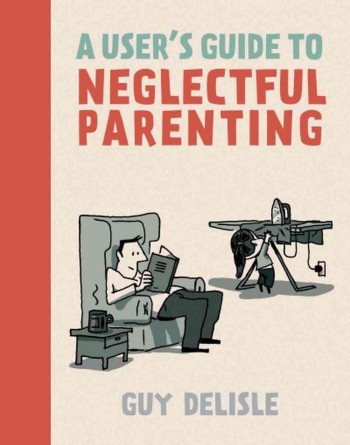
So it might be a good week to dig around in the back issue bins or buy something that came out that no one paid much attention to the first time. My brother's in town and he super-enjoyed
the Guy Delisle book at left; that's a funny book. He was pleased to see
a new Cathy Malkasian book came out this year although he hadn't noticed when it had. My brother had me pull the various Marvel mini-series that Steve Rude did ten years ago, like
this one with Captain America and
this one with Thor. Have to imagine those are super-cheap in any back-issues store not super-delusional, as are
these two JSA series involving the late, great Mike Parobeck. Comic book stores are great.
Speaking of Thor, I enjoyed
a few Esad Ribic-drawn issues of the latest series that I read about ten days ago. I have to imagine most stores will have some of those.
Something comic-book sized from the alternative realm that came out this year is
a second issue of Mardou's fine Sky In Stereo. You might ask the person behind the desk.
Or you can just
watch Dave Chappelle riffing on superheroes. I don't know. It's a holiday week, you should do what you want.
*****
The full list of this week's releases, including some titles with multiple cover variations and a long, impressive list of toys and other stuff that isn't comics,
can be found here. Despite this official list there's no guarantee a comic will show up in the stores as promised, or in all of the stores as opposed to just a few. Also, stores choose what they carry and don't carry so your shop may not carry a specific publication. There are a lot of comics out there.
To find your local comic book store,
check this list; and for one I can personally recommend because I've shopped there, albeit a while back,
try this.
The above titles are listed with their Diamond order code in the first field, which may assist you in finding comics at your shop or having them order something for you they don't have in-stock. Ordering through a direct market shop can be a frustrating experience, so if you have a direct line to something -- you know another shop has it, you know a bookstore has it -- I'd urge you to consider all of your options.
If I failed to list your comic, that's because I hate you.
*****
*****
posted 3:35 pm PST |
Permalink
Go, Look: Jeff Zenick

 posted 3:30 pm PST
posted 3:30 pm PST |
Permalink
The Never-Ending, Four-Color Festival: Cons, Shows, Events
 By Tom Spurgeon
By Tom Spurgeon
*
Comiket, Comiket, Comiket.
* I thought I had run
this Leeds Festival report in comics form, but a note from the cartoonist suggesting maybe I should run it makes me think maybe I haven't.
*
in this interview Eric Stephenson gets into some of their thinking about the Image Expo. It's sound strategy: there is enough of a press infrastructure there and enough of a comics fanbase there and enough of an attentive on-line press corps that having an early January convention and time all to themselves makes a lot of sense. I don't think I'll ever be able to travel to an event that close to the holiday, but they don't need me there. I assume that within about three years we will see four or five similarly company-driven shows.
* Pittsburgh Indie Comix Expo
will be held March 22 and the great Trina Robbins is their first announced special guest. You can follow them on twitter
here. Jim Rugg and Theo Ellsworth will also be there.
* finally,
let's all go here if there's another one.
posted 3:25 pm PST |
Permalink
Go, Look: Curved Lines

 posted 3:23 pm PST
posted 3:23 pm PST |
Permalink
CR Holiday Interview Series Moves Into Week Two, But Let’s Not All-The-Way Forget Week One


I want to list the first week of
CR Holiday Interviews because I'm not sure how well my archives work right now.
#7 --
Dean Mullaney
#6 --
Kate Deneveu And David Murray
#5 --
Dave Kellett
#4 --
Brian Cremins
#3 --
Genevieve Castrée
#2 --
Joe McCulloch And Sean T. Collins
#1 --
Paul Pope
Those should start back up in a few hours.
I also thought there was a lot of really good
focused Christmas Day material this year, and I was very fond of
the holiday card image CR commissioned.
another view of Charlottesville's Telegraph Gallery owned by Kate Deneveu and David Murray
posted 3:22 pm PST |
Permalink
Go, Look: Four Questions

 posted 3:20 pm PST
posted 3:20 pm PST |
Permalink
Go, Look: A Winter Dream

 posted 3:10 pm PST
posted 3:10 pm PST |
Permalink
Random Comics News Story Round-Up

* there was very little of
this this year, and almost none of
this. We're only about five years removed from the entire Internet PR machine shutting down on the holidays. I prefer a slowdown around Christmas -- or at least a shift in modes -- because I think breaks are necessary and I believe that a lot of the eyeballs for which people clamor are elsewhere during the holidays. I suspect a general comics industry burnout will set in pretty early next year, and this will be one reason why.

*
Epic Illustrated was the comics magazine we bought during the summer: back issues at the local used bookstore and current issues at the drugstore next to Klink's grocery. I was a perfect audience for its mainstream-comics version of
Heavy Metal, a publication that intrigued me but was also a bit scary. We underplay at times how much for a lot of readers, myself included, comics of the late 1970s and early 1980s were a sideways extension of our appetite for fantasy literature rather than its own thing. I don't think I've ever read this publication as an adult, although a few things have come into my home in collected form. I preferred the earlier issues to the later ones, and the appearance of Marvel-owned character Galactus significantly dampened my interest in the magazine and provided an opportunity to break with regular purchases. I can still remember the bedroom cabinet in which they were kept, a cabinet that didn't shut all the way without curling these publications the slightest amount.
* I couldn't figure out why anyone would send me a link to
this cartoon of Keith Knight's and then I saw the first comment and realized that some people really do think this way. I can't even imagine conceiving of this kind of thing as some sort of sneak-attack in the culture wars, although I imagine there will also be folks that delight in this kind of thing that way in a positive fashion.
*
that's really one of Spider-Woman's powers? Huh.
* Sean Gaffney on
Pink. J. Caleb Mozzocco on
Avengers Arena Vols. 1-2. Henry Chamberlain on
Black Paths. Johanna Draper Carlson on
Bad Houses. Kelly Thompson on
A Boy And A Girl.
* it may be a couple of days before this site does a "By Request" update so I will let Rob Clough -- a recent recipient of comics' largesse --
remind you that Sparkplug and La Mano are both seeking some extra support this holiday season.
* finally:
make a list, check it twice, lose it, despair.
posted 3:05 pm PST |
Permalink
Happy 56th Birthday, Kenny Penman!

 posted 3:00 pm PST
posted 3:00 pm PST |
Permalink
Happy 57th Birthday, Steve Saffel!

 posted 3:00 pm PST
posted 3:00 pm PST |
Permalink
Happy 43rd Birthday, Ray Cornwall!

 posted 3:00 pm PST
posted 3:00 pm PST |
Permalink
December 24, 2013
 May God Bless Us Every One
May God Bless Us Every One

 Merry Christmas; 2013 CR holiday card by Katie Skelly; thanks, Katie
posted 7:05 pm PST
Merry Christmas; 2013 CR holiday card by Katie Skelly; thanks, Katie
posted 7:05 pm PST |
Permalink
Go, Look: A Michael DeForge Christmas

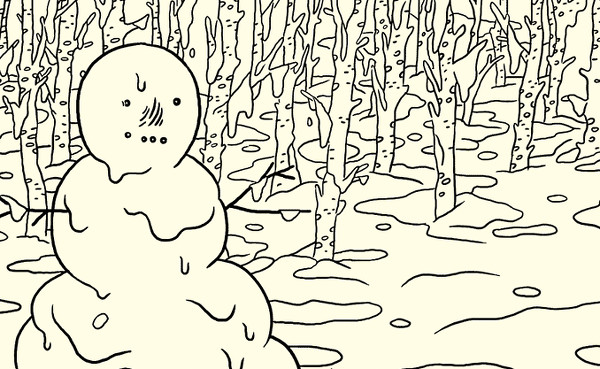 posted 3:03 pm PST
posted 3:03 pm PST |
Permalink
CR Video Parade: Octopus Pie Christmas Special
 posted 3:02 pm PST
posted 3:02 pm PST |
Permalink
Go, Look: The Big Four From The Golden Age Site




 posted 3:01 pm PST
posted 3:01 pm PST |
Permalink
Happy 55th Birthday, Rick Stromoski!

 posted 3:00 pm PST
posted 3:00 pm PST |
Permalink
December 23, 2013
 CR Holiday Interview #07—Dean Mullaney
CR Holiday Interview #07—Dean Mullaney


*****
Dean Mullaney is a key figure in comics publishing's greatest generation, a group of devoted fans born after World War 2 that helped reshape an industry devoted to profitable junk to favor the best art in its midst and to encourage the creation and inclusion of more. The
Library Of American Comics, his venture with
Bruce Canwell,
Lorraine Turner and
IDW Publishing, is one of the agreed-upon good things in modern comics, providing high-end reprints of the best of the classic comic strips while at the same time facilitating a greater critical and biographical understanding of strip creators. He is also known to comics people of my generation and older as co-founder and co-owner of
Eclipse Enterprises (later Eclipse Comics), one of the key publishers of the independent comics movement of the 1970s and 1980s. A lot of what adult readers enjoy about comics now had an antecedent or early example at Eclipse. Mullaney has taken the "I can live anywhere" opportunities of self-directed employment more seriously than some, making a home in
Key West. Like many discussion between two older men, we started out talking about the weather. I tweaked what follows for flow. -- Tom Spurgeon
*****
 TOM SPURGEON: One way to enter into our conversation: you announced a Bobby London-era
TOM SPURGEON: One way to enter into our conversation: you announced a Bobby London-era Popeye
book the week we're talking. I wonder if that might provide us with a snapshot as to how you guys select and then orient yourself to a new project. How does that work? Did someone bring that work to you? Did the notion enter your head at some point? Is this something you always wanted to pursue? How do you progress from concept to announcement?
DEAN MULLANEY: There are more books that I want to do than I'll ever have time to do. My main interest is 1930s and 1940s strips, but I'm interested in good strips from every era. I've always liked Bobby's work. At the time, King Features' choice of using him on
Popeye seemed odd to me. But it was fantastic. I didn't see it all the time. It wasn't in my local newspaper. It's one of those runs that everyone wants to see but nobody has seen except for that one small collection.
One nice thing about running the imprint is that I can basically do what I want.
SPURGEON: [laughs] So at what point does a project become a priority, does it start to progress towards publication? Are there ease-of-production issues? Do you move forward once you know you can get a hold of something?
MULLANEY: Obviously you can't publish a book if you can't find the material, but the biggest factor I have now is trying to find room in the schedule to add books. On average, we have two books a month on the schedule. I'm looking at next June -- we're going to hit release #100. That's a lot of titles. I have a piece of paper in front of me, since I still like to keep my schedule on a piece of paper rather than a computer... I'm filling in holes up to the end of 2016.
SPURGEON: My goodness.
MULLANEY: At the bottom of my sheet I have 12-16 one-shots that I'd love to do, and I'm trying like hell to find a hole for them.
 SPURGEON: So the LOAC Essentials series, like the book of strips from The Gumps you did this year, people have always talked about that line to me in terms of you guys hedging your bets over something that may or may not sell. But am I to take it it's also a factor that there's value for you in having a line where you don't have to make a full commitment to all of a strip because that means you can actually put out more works?
SPURGEON: So the LOAC Essentials series, like the book of strips from The Gumps you did this year, people have always talked about that line to me in terms of you guys hedging your bets over something that may or may not sell. But am I to take it it's also a factor that there's value for you in having a line where you don't have to make a full commitment to all of a strip because that means you can actually put out more works?
MULLANEY: It's not a matter of something not selling in another format. There's some strips that I think you don't need to see 40 years of it. To me, 40 years of
The Gumps is like I'd be snoring after the top five years. The same with
Bringing Up Father. I
love [George] McManus' work. We've done two books so far, and we'll probably do a third one. But do I want to read 50 years of it? No. To me... some strips you just want to present the best years of the strip. With something like
The Gumps, what I'm hoping is we'll be able to do two more volumes of
The Gumps, and pick two years: maybe the one where Andy runs for President, or something like that.
The concept behind the Essentials for me is exactly what Bill Blackbeard was doing with the Hyperion Line. That was the late '70s, so I was in my 20s when those books were released. Bill's concept was that if you were going to have a comics library, and if you're not going to have an expensive comics library but you still want to have one, then these are the books that you need to have in your library to understand the full breadth of the history of comics.
SPURGEON: You talked in an interview with Tom Mason a few years back of wanting to do collections of Terry And The Pirates as long ago as the early 1980s. I wonder how much of what you get to do now is based on your experiences of seeing what other publishers have done with similar material, what the other attempts have been. I wonder if there's been some sorting out of what you've liked and what you haven't liked -- for instance, if you liked a quality of a book Bill did, or if you didn't like someone else's approach in a certain way. Do you have the benefit of picking and choosing what you thought worked and didn't over the preceding quarter-century?
MULLANEY: That's not really a consideration for me. The reason that Bill's efforts were influential on me is that he introduced me to all this material. So obviously, any of the other publishers that release work, like the early Frank King
Gasoline Alleys, I never knew how great that stuff was. I think most of us didn't. So obviously certain series will introduce and allow us to re-evaluate certain creators. I hope to be doing that with Sidney Smith; I hope we're doing that with Cliff Sterrett. What I choose is what I've seen and what I like and what I think other people will like, too.
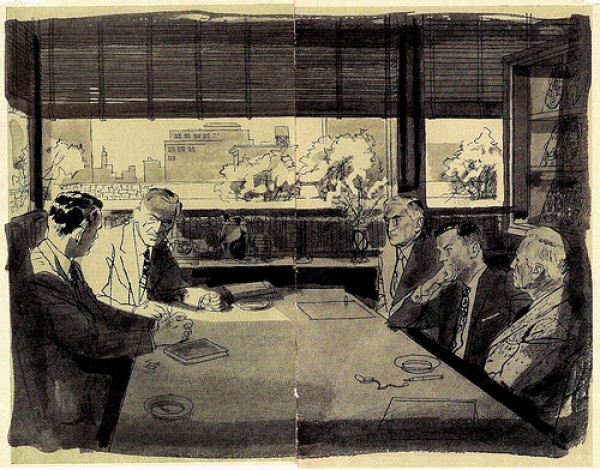 SPURGEON: Correct my memory here. A moment I remember encountering you early on in the imprint's days was when you had a mock of the Noel Sickles book. It was a San Diego, and IDW had secured a little room for meetings and you and I went through the Sickles book. The Caniff work... did the Caniff work you've, the reprints, did they come before the stand-alone Sickles? Because the dates says it did, but I always remember the Sickles book as
SPURGEON: Correct my memory here. A moment I remember encountering you early on in the imprint's days was when you had a mock of the Noel Sickles book. It was a San Diego, and IDW had secured a little room for meetings and you and I went through the Sickles book. The Caniff work... did the Caniff work you've, the reprints, did they come before the stand-alone Sickles? Because the dates says it did, but I always remember the Sickles book as the
early book for you. I wonder if I'm just fudging the dates because the Sickles book was so interesting to me.
MULLANEY: Terry was the first, and I decided that because it was my coming back into comics... over the years we've all seen people publish series that stop after the second one, or after the third one. So with
Terry, it was important to me not to just do it and do it the way I wanted it to be done, but release it on a quarterly schedule so that people would think, "Yes. This is definitely coming out." You don't want to buy a series if you don't know it's going to be completed.
The second series we started was
Little Orphan Annie and the Sickles book was released shortly thereafter. So it would have been the third different strip we added to the line.
SPURGEON: The Sickles book was a remarkable book, I think, in great part because of the sheer publishing chutzpah involved in putting a $50 Noel Sickles book out into that market.
MULLANEY: When Bruce Canwell and I went to Ohio State to look at the Sickles papers, it became immediately apparent to us that no one had really researched the Sickles papers since his widow had deposited all the materials. Everything was in the same boxes and in the same order as it had been deposited in. There might be something related to the
Saturday Evening Post in this box or in that box; nothing was collated or organized. We had virgin territory; it was fantastic.

The original idea was to reprint the complete
Scorchy Smith for the first time, and maybe have a 40 page introduction about Sickles. We ended up finding so much unbelievable material it turned into 140 pages and the binding of the book was falling apart. [laughter] It's essentially two books in one.
Would I do it another way? No, because I think it belongs together. We could do it as two books and put it in a slipcase... we just found so much material to add in. That's what we do with the entire line. If we need to add 24 pages or 32 pages to a book, even 100 pages, because it needs it, we do it. You don't get a second chance at doing this.
SPURGEON: The Sickles story I wanted to know about... I heard that you tracked down original Scorchy Smith
material right up to date of publication. That is like a little-kid version of how I think strip collections should work. Did you really find vital material at a small-town newspaper very close to press?
MULLANEY: Yeah. We were down to... I think two strips we were missing. We had really crappy microfilm for them. We were going to go with it. We were going to go with the microfilm rather than have a hole in the book. We had maybe two weeks to print. The same thing happened with the first
Blondie book... we were missing a couple from the first few weeks of
Blondie. Either it's my luck or my tenacity but so far we haven't published a book with any holes in it. We've come right down to the deadline on probably half a dozen books including the first Superman Silver Age dailies. Those we just found just a couple of weeks before publication. I'm always optimistic. I'm always optimistic we'll find the strips if we just contact enough people.
It's not like the old days. I remember years ago at Eclipse I reprinted the
Johnny Comet strips. We would send letters -- this was obviously before the Internet -- so we would send letters to a collector in Austria... You'd have to wait a few weeks for the letter to get there. [laughs] Then the guy sends you a letter back. Maybe he has access to a stat camera, and maybe he doesn't. It's a lot easier to find material now.
Some strips are still almost impossible to find. We're going to add a volume in the Essentials of
The Bungle Family. That's a really hard to get a complete set of. I have about ten or twelve years since I've been collecting it. Some strips are very hard to find.
SPURGEON: What makes that one to find? Was it the number of papers it was in? The kinds
of papers it was in?
MULLANEY: I think because of the syndicate it wasn't in major papers, but that didn't stop people from clipping other strips. I just don't know. I don't know why certain strips are harder to find than others.
SPURGEON: Do you encounter the post-war difficulty of shaving strips? I edited the paperback series of Pogo strips that Fantagraphics did, and Bill Blackbeard's strips were unavailable. We had a good collection of clipped strips, but into the early '50s the newspapers themselves would crop the strips. Like cut off an 1/16 of an inch strip on the bottom to make it fit on the page. That seemed like a post-War thing... at least with that feature.

MULLANEY: That actually started in 1941, I think, or 1942. I encountered it with
Terry And The Pirates with our
Complete Terry. I'm always going for the full version of it, but there's about I would say three months worth where the strips have the bottom -- I'd say the bottom quarter-inch or so -- cut off. That was for newsprint considerations because newsprint was hard to come by and rationed during the War. The syndicates and the newspaper used that as an excuse after the War to keep the comics small so they could fit more comics in there. That's a perennial problem in trying to assemble complete sets of strips.
In the
Steve Canyon set we're doing now we're using full versions. But what Denis Kitchen had access to years ago was the cropped versions. Caniff particularly... it changes the entire composition and look of the strip when the bottom is cropped. Granted, all these artists knew their work was going out in two formats. They didn't want to put anything important down at the bottom. Somebody like Chester Gould would put a lot of black and dead space in there. But Caniff would add interesting information, interesting artwork. It also makes the balloons wordier -- it changes the look of each daily, it changes the look when the balloon takes up more room relative to the rest of the strip.
SPURGEON: I know with the Walt Kelly strip a lot of dead information was down there, but the cropped versions just looked awful.
MULLANEY: You can only print what you can find. Whenever we can find the full versions, we use them. If we can't, we have to use the cropped version. It's still a real version, a legitimate version; it's just a different version.
SPURGEON: How much institutional support do you get, Dean? Are the syndicates helpful? Are the collectors? What about the universities? I know that Billy Ireland makes their work as available as they can as an explicit part of their overall mission. But I also know that all academic institutions haven't always had that reputation. Have you had good support from schools, collectors or the syndicates themselves?
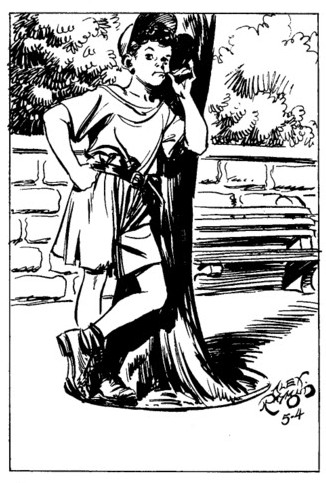 MULLANEY:
MULLANEY: The syndicates don't keep much. We've gotten a few things from King Features. A few years ago King Features digitized what they had. The quality of the digitization -- I"ve seen some of it that's fantastic and some of it leaves a lot to be desired. I think it's more for reference for them than anything else. Do they really need every strip from a feature from the 1930s for licensing purposes? I doubt it. They donated the original syndicate proofs to both Ohio State and Michigan State. When I need
Rip Kirby strips, I go to Michigan State and make copies of the strips at Michigan State.
The Tribune Syndicate had some proofs, but not many. They've moved so many times over the years. From New York to Orlando and now in Chicago... some things have disappeared over the years. We have access to most of the
Little Orphan Annie proofs and
some of the
Dick Tracy proofs, but not much more.
SPURGEON: Another basic question I have is I wonder if the time passed is starting to become an issue now. With families, you're starting to get into subsequent generations for whom a strip the patriarch might have done wouldn't loom as large in their lives, so they might have a different attitude towards taking care of this material. Even collectors might not be as naturally inclined to collect a lot of the older stuff as they used to.
 MULLANEY:
MULLANEY: We're still close enough in terms of generations... like
King Aroo, Jack Kent. Jack Kent Jr.... his father saved all the art -- for the most part, except for the later stuff -- and it was all in a pole barn in back of the house. It was sitting in this outside pole barn in San Antonio, Texas. Surprisingly, the art was still in fantastic shape. Luckily, he had it. He knew was it was. He didn't know necessarily what to do with it, even how to sell it. It's made available to us.
In terms of collectors, it's amazing how many people would clip a strip for an entire year back in the '30s and '40s. I remember a story that Steve Ditko's brother told us when we were researching a Steve Ditko bio many, many years ago. He said that his father worked -- I think it was in a mill -- in Johnstown, Pennsylvania. And he was so busy he didn't have time to read the Sunday comics. So the family would cut the Sunday comics out and for Christmas each year the mother would sew them up into a bound volume so that over Christmas vacation the father could read a year's worth of Sunday comics.
SPURGEON: Wow.
MULLANEY: That's fantastic. That's an amazing story. That's where my
Bungle Familys come from. I've got a set of
Bungles from the
Kansas City Star. Somebody clipped them out. Somebody clipped them out, and either saved them for themselves or for somebody in their family. They keep popping up.
SPURGEON: Maybe The Bungle Family
is a way to get into something that interests me... it seems that The Bungle Family
might be more
relevant now that it was even 20 or 30 years ago. There's something about the acerbic nature of the strip and the cantankerous relationships on display that might work better now than it might have a generation previous. There might be an audience for the type of material just for its tone and approach. And there are strips that seem harder to process at certain times... I think we may be going through that with Pogo
right now, which is a strip that is very much a confluence of various aspects of 1950s American culture. It's not that it's so far behind in the rear view mirror as it is that a number of factors put us out of touch with the context in which that strip hit so hard with its audience.
 MULLANEY:
MULLANEY: I agree with you on both counts.
The Bungle Family, because of the acerbic nature of it, it's more quote/unquote modern in 2013 than it would have been 25 years ago.
Pogo was more hip 25 years ago than it is today. That in-between period of the past. It's not
really in the past, which makes it fascinating, it's not yesterday but in-between time. That's always a consideration. We all... whether it's me, or Fantagraphics or Drawn and Quarterly or Charles Pelto with Classic Comics, we're all looking at the long picture. We're not looking at what might be popular in 2013. We're doing this not for the money but because we love strips and want to preserve them and we have this fantastic window right now. It's truly, truly a golden age for strip reprints. There's more stuff reprinted now than any of us ever hoped to imagine would be. So we take the long term.
I'm doing the same thing with the Essentials. Is
The Gumps going to be the best-selling thing that we ever did? No. Will it lose money? It will probably break even over time. Will
The Bungle Family be a best-seller? No. But they're important strips to do. We can afford to do them.
SPURGEON: Is it different at all doing later volumes of a work? Little Orphan Annie
and I'd say even Dick Tracy
, too, they seem far enough long in their respective series that the feature itself might have changed. Are there unique challenges to doing later volumes in a series that you don't have with a one- or two-shot or even the initial volumes of a longer series?
MULLANEY: Oh, sure. It depends on the strip, too. With
Annie, I just read ahead until the end of the '40s. During World War 2, when she gets into the Junior Commandos, it's not necessarily as interesting to me as it was before the War. Then after the War, it's fantastic again. He does this really biting story about a cartoonist named Tik Tok. It's basically after Joseph Patterson at the
New York Daily News died, and it's really ramming it at his bosses. Some strips have low periods. Can you imagine trying to create work over a 40-year period and have every month...? It's not going to happen. [Spurgeon laughs] It's not! I mean, I don't care... but Chester Gould and Harold Gray really have strong periods almost all the way through their strips. I know with Gould some people don't like -- well, hate -- the Moon Maid stuff, but that's what I read as a kid. I read that in the early '60s in the New York Daily News and it was fascinating. If I had started reading Dick Tracy in the early 30s I probably would have been horrified. [Spurgeon laughs] But to me, it's a fascinating period. That period also his art is so iconographic, it's fantastic.
SPURGEON: How much of working with these strips continues to be an education for you? Is there a strip you've come around on maybe in the last few years, that you didn't like as much before?
MULLANEY: Gasoline Alley I've always liked. I read Dick Moores' version when I was a kid. I appreciated Frank King's work, especially the Sundays, which was basically what was available for us to see. It wasn't until Drawn and Quarterly's editions that I got see what a masterful, incredible storyteller he was. I just think so much more of him now. Twenty years ago you would have asked people to name the 10 or 12 top cartoonist of all time, Frank King would not be on most people's lists, but I think he would be now.
SPURGEON: One way to look at the work you do that maybe doesn't always get taken into consideration is as biography, or as a benefit to biography. There's a real focus on curating the supporting materials, and presenting even within a strip reprint a portrait of the person and their times. I don't know if there's an angle there for a question even, Dean, but I wonder if that was a priority for you...
MULLANEY: It was absolutely a priority for me and for Bruce Canwell when were planning the line at the beginning. That was... we didn't want to just reprint the strips. We wanted to place them in context for a modern audience. Without placing the strips in context, it's... I'm not sure how to say this. It make the reading experience easier. It allows you to get right into the strip. If we can present an introduction that brings you up to speed. If it gives you background on the cartoonist, background on the era, and what the strip is about, then you can start and start enjoying it. The people that read it at the time understood the context. It was 1935 and they were living in 1935. They know what society is like. They know what's going on in the world around them. A person now doesn't necessarily know what it was like living in 1935. So it's our responsibility to provide that context.
SPURGEON: Is there a benefit to just feeling like we know the cartoonist, Dean? That's something we do now, and I think at the very least by virtue of the celebrity that many of them had was a part of the reading experience back then. You knew these cartoonists by default, almost, and knew that this work was the extension of that person. Seeing the man behind the strips... I know I feel I'm relating to Charles Schulz when I read his strips, that I'm relating not just to the strip but to this person.
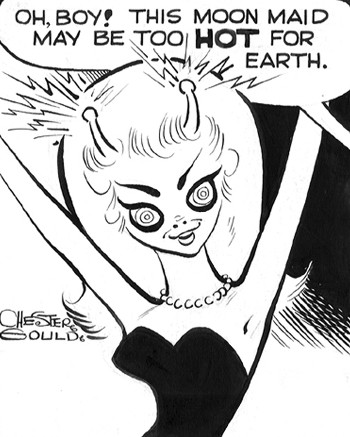 MULLANEY:
MULLANEY: Absolutely. You're dead on with that. Getting to know the cartoonist and their background, and if they have political beliefs or a social issue they want to get across. That doesn't influence everybody's work, but it influences most of their work. Some more overtly than others. If you look at Chester Gould, for instance, people always talk about Harold Gray being an arch-conservative, but Chester Gould outflanks him easily. Here's a guy that was so upset by what he felt was the liberalization of society, the Miranda decision and things like that in the '60s, that he has to take Dick Tracy off of the planet because he can't figure out how a guy do law and order in this country given that things have become so liberal. He has to take him off the freaking planet. [laughter] That's the background to the story. You can still enjoy the stories without the background, but it gives you more to grab onto. Another level on which to enjoy them.
SPURGEON: You finish up your Alex Toth trilogy next year, right?
MULLANEY: Bruce just turned in his manuscript for the third and final book. I have all the art assembled. Now comes what for me is the fun part of it, which is to lay the whole book out. It should be 300-350 pages of Toth art; we have so much fantastic stuff.
SPURGEON: Am I right in thinking that went from two to three books?
MULLANEY: [laughs] It went from one... it started off as one book, then it became two books, and we kept finding so much material. Fans have been so generous in loaning things. Like I said before, you don't get a second chance at these things. I'm going to be 60 years old next year. I don't know how many years have left, or how many any of us have left. I want to do as many books as I can, while I still can.
SPURGEON: With Toth, I wonder if there aren't some intriguing contexts specific to him. One is that within cartooning circles Toth is so universally admired that I wonder if that wasn't oppressive in some ways, if that kept you from developing a critical view of elements of his work. I also wonder if the fact that he is not known for specific works had an effect in terms of how you approach him. We point to Toth more generally as an artist than to a half dozen significant works in which he played a creative part... even those works we do point to we usually do so as representative
works rather than as formidable, stand-alone, achievement in comics. We might even point to whole periods of his work, or changes in his general approach more than discrete assignments.
MULLANEY: I don't know who it was, but I read someone recently that said, "Alex Toth is the master without a masterpiece." It could be argued that
Bravo For Adventure was his masterpiece, but while it's a good story, a fun story, I don't think the writing is up to the same level as the art in that book.
SPURGEON: So how cognizant are you when you present a book like these Toth books? Because it seems to me that a book series like this one was a good solution on how to present Toth -- maybe the only way to present him -- as respectfully as possible.
MULLANEY: The thing that's interesting, is the fact that he's a master without a masterpiece, that he couldn't write by his own admission, that he was constantly changing stories from writers -- that's the story. The story is the guy's artwork is absolutely incredible. His sense of design. He brought modernity to post-War comics in a way that no one else in comic books did, in a way that Alex Raymond did with Rip Kirby. Toth did this in comic books in a different way, totally above everyone else. Nobody was doing anything close. He influenced everybody working in the medium in the early 1950s.
The other question is why he didn't work on a series for a long time, why didn't he create something, a story, that he could keep doing over and over again. It's because he wasn't able to. That's part of the story. Part of the story is his personality: being friends with someone for 30 years and then deciding one day that because he pissed him off for whatever reason he's never talking to this person again. I remember years ago Julie Schwartz said to me, "You know, an artist can be three things. They can be a great artist, always on time, or a hell of a nice guy. All they need is two out of the three to get work." [laughter] I never forgot that. Alex always had trouble. He had trouble with the editors. He had trouble with the writers.
 SPURGEON: He had a strong sense of self. Do you have any idea what he might object to in your books?
SPURGEON: He had a strong sense of self. Do you have any idea what he might object to in your books?
MULLANEY: You never know depending on what day it would be. [Spurgeon laugh] I mean, seriously. I'm not putting him down. The main reason I wanted to do these books is I got to know Alex. I worked with him on the
Zorro books and I admired the hell out of him. He's one of my great artistic heroes. As a person, I think his children say it best in the book. He was a difficult person. That doesn't take away from his art. Whatever was torturing him internally affected how much work he did and the kind of work he did, obviously. That again is part of the story.
SPURGEON: You mentioned turning 60. I think of you as part of the generation as people that rewrote the North American comic book industry. That came up with a bunch of new models for doing business, and expanding what could be published and how, and expanded the breadth of themes that could be engaged. Do you have a sense of your generation's accomplishments? This is a year we lost Kim Thompson, a friend of yours and a prominent member of that generation. Do you have a sense of the graying of your peer group?
MULLANEY: Oh, sure. Kim Thompson's death affected so many of us. Personally, it affected me greatly. Professionally it certainly had an influence. It's made me look at the line and ask, "Can we do more than two books a month? Can we do four books a month?" No one knows how much time we have. If you look at people doing strip reprint books, almost everyone is around the same age, or the same generation at least. Ted Adams at IDW is allowing all this stuff to happen, and he just turned 40. He's younger. But the rest of us. Gary Groth... Charles Pelto... I'm not seeing people 20 years old self-publishing strip reprints. [laughter] They may. But they may say eventually, "What's a newspaper?" I think our generation just like very generation in comics has a profound influence on the medium. Collectively. Some individuals have more of an influence, but I think collectively we all grew up... I think Eclipse started at the same time the Direct Market did. So there were no rules. We were making up the rules as we went along. It was a hell of a lot of fun.
SPURGEON: I mentioned to someone that I was interviewing you, and they mentioned that it struck them that there was a hobbit movie out, and Rocketeer
comics out, and two-three things that reminded him of Eclipse. There is still currency for the kind of publishing you were doing. And of course you guys were a creator-friendly house in a lot of ways, and worked with book distribution, and struggled with earlier forms of many of the same issues that publishers like IDW might now. Are you pretty secure in the legacy from that part of your life? Is there anything that stands out to you now in terms of what you might have been trying to do then? It's 20 years now... and in some ways this whole period of publishing began just as you guys slipped from view.
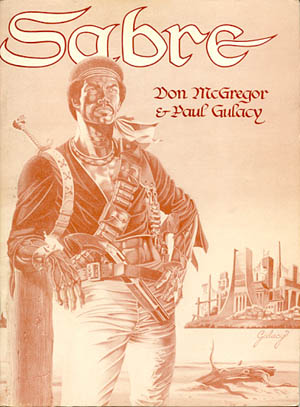 MULLANEY:
MULLANEY: I'm very proud of everything we accomplished at Eclipse. We published the first graphic novel specifically for the comic-shop market. Phil Seuling was the only distributor, and he looked at me, and he said, "Five dollars for a comic book!? Are you crazy?" So things change. In some respects I was ahead of my time; I did things too soon. We co-published the first line of manga. They sold okay. But manga was just starting to get attention in the US, and it was too soon. That Hobbit book on the other hand, that sold phenomenally. I don't know the sales figures on other books, but we sold a few hundred thousand copies of that one, between the Eclipse edition, the Ballantine Edition an the Harper Collins/Eclipse edition in the UK. The thing sold phenomenally well.
SPURGEON: Ted Adams was an intern of yours, am I right?
MULLANEY: No, he wasn't an intern. I needed an assistant for Beau Smith, our sales manager. I don't know if we advertised in the
Comic Buyer's Guide or
The Comics Reader, but it was somewhere Ted saw the ad. Ted reminded me of this story when he was moderating a tribute to me at San Diego when I got the inkpot. He said it was the most exciting day of his life. He saw the ad, and he called up and I said, "Hey, come on down." He was in Portland, Oregon. He came down for an interview. He drove seven hours -- I don't know how many hours -- down, did the interview, and he went back to the hotel and he was so excited. He said he knew he nailed it. I called him up and said, "The job is yours." I hired him straight out of college. He was never an intern. He was an assistant sales manager to Beau Smith.
SPURGEON: The way that companies are structured now, what they're doing, is there any wistfulness on your part of the opportunities they have now as opposed to what you had back then?
MULLANEY: I have no interest in being in the new comics market in 2013. [laughter] I like to do things my own way. Things are more tightly structured, and more... limited in some ways. More expansive in others. At the beginning of the Direct Market, and with Eclipse, we were writing the rules. Every month we would sit down and figure out what we were going to publish next month. And just do it. There was nobody to stop it. The comic shop market was expanding so retailers were looking for product. They were looking for material. I was in the right place and the right thing. With Ted and IDW now, I can say that Ted is so much more of a better businessman than I was. He's a guy with good taste that likes good comics and wants support them, but he also has good business sense. I would get some money and go, "What cool stuff can we lose $25,000 on?"
*****
*
The Library Of American Comics
*
Mullaney Bio On A Library Of American Comics Page
*****
* one of the Library Of American Comics books
* a Bobby London
Popeye
* book from the LOAC Essentials series
* a Noel Sickles illustration
* a
Scorchy Smith image
* look how busy Milton Caniff's dailies could be in the bottom 1/16th inch
* from
King Aroo
* from
Rip Kirby
* from
The Bungle Family
* Gould's Moon Maid
* a bit of Alex Toth
* the
Sabre graphic novel
* Toth (below)
*****
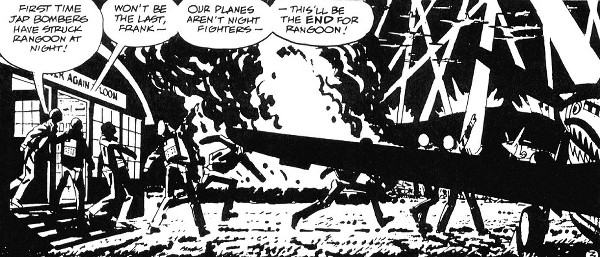
*****
*****
posted 4:00 pm PST |
Permalink
José Ortiz, RIP

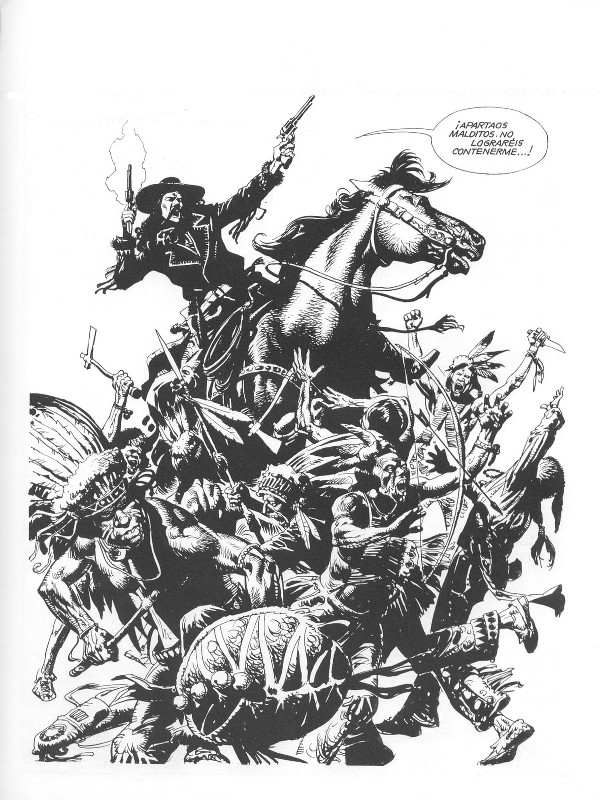 posted 3:55 pm PST
posted 3:55 pm PST |
Permalink
Go, Look: The Comic Strip Characters’ Christmas Party

 posted 3:50 pm PST
posted 3:50 pm PST |
Permalink
Small Press Expo Moves To Lottery System For Registration

 Here
Here. This is a copy of a massive mailing they've done. Basically what's going on is that they've grown in terms of demand for tables so much over the last couple of years that any attempt to do something other than a lottery with a lengthy registration period is almost certainly going to end in anger and disappointment. Curating the show stands counter to that show's longstanding ethos regarding such things: they basically can't go that direction now, having
not done that 10 years ago when that kind of thing was still up in there. I think it works better for them not to, and this all sounds like a fair solution.
It looks like the show will stay at much the same size as last year: some criticized the number of exhibitors as being out of balance to the point that some did less effective business than they feel they might have with a smaller room. As it stands, they were
still turning people away. Comics is like that now.
Why this went out the evening of December 23, I have no idea, but I guess that's comics now, too. No breaks!
posted 3:45 pm PST |
Permalink
Go, Look: Sing With King At Christmas

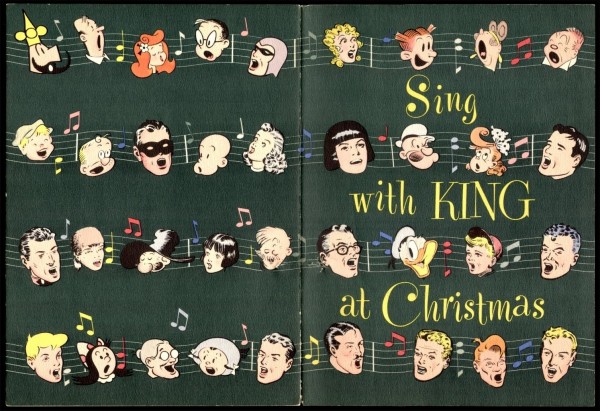 posted 3:40 pm PST
posted 3:40 pm PST |
Permalink
Your When Worlds Collide Top 25 Of 2013


Timothy Callahan of the "When Worlds Collide" feature at
Comic Book Resources has weighed in with a top 25 in
two parts.
Honorable mentions went to
Prison Pit Book 5,
Hellboy: The Midnight Circus,
Catalyst Comix,
Boxers & Saints,
New School,
Strange Tale of Panorama Island,
Godland Finale,
FF and
Tom Strong and the Planet of Peril.
His top 25 choices are:
25.
The Mysterious Strangers, Chris Roberson, Scott Kowalchuk, and Dan Jackson (Oni)
24.
Dream Thief, Jai Nitz and Greg Smallwood (Dark Horse)
23.
Cartoonshow, Derek M. Ballard (Drippybone Books)
22.
Habit, Josh Simmons, Wendy Chin, Karn Piana, and Various (Oily)
21.
Young Avengers, Kieron Gillen, Jamie McKelvie, Mike Norton, and Matt Wilson (Marvel)
20.
3 New Stories, Dash Shaw (Fantagraphics)
19.
Fury MAX: My War Gone By, Garth Ennis and Goran Parlov (Marvel)
18.
World Map Room, Yuichi Yokoyama (PictureBox Inc.)
17.
Batman, Incorporated, Grant Morrison, Chris Burnham and Nathan Fairbairn (DC)
16.
Hip Hop Family Tree, Ed Piskor (Fantagraphics)
15.
Celebrated Summer, Charles Forsman (Fantagraphics)
14.
Blades & Lazers, Ben Marra (Traditional Comics)
13.
Prophet, Brandon Graham, Simon Roy, Giannis Milonogiannis, and Others (Image)
12.
Battling Boy, Paul Pope and Hilary Sycamore (First Second)
11.
Gamma, Ulises Farinas and Erick Freitas (Dark Horse)
10.
Wonder Woman, Brian Azzarello, Cliff Chiang, Goran Sudzuka and Matt Wilson (DC)
9.
Fatale, Ed Brubaker, Sean Phillips and Elizabeth Breitweiser (Image)
8.
Adventure Time, Ryan North, Shelli Paroline and Braden Lamb (BOOM!)
7.
Jupiter's Legacy, Mark Millar, Frank Quitely and Peter Doherty (Image)
6.
TEOTFW, Charles Forsman (Fantagraphics)
5.
Final Frontier, Tom Scioli (Self-Published)
4.
Lose, Michael DeForge (Koyama)
3.
Nemo: Heart of Ice, Alan Moore, Kevin O'Neill and Ben Dimagmaliw (Top Shelf/Knockabout)
2.
Very Casual, Michael DeForge (Koyama)
1.
Copra, Michel Fiffe (Self-Published)
*****
*****
posted 3:35 pm PST |
Permalink
Go, Look: A Michael DeForge Christmas Comic

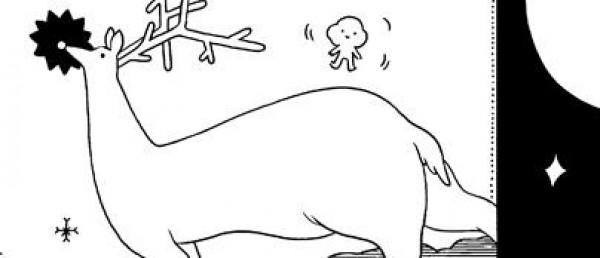 posted 3:30 pm PST
posted 3:30 pm PST |
Permalink
Bundled, Tossed, Untied And Stacked: Publishing News

 By Tom Spurgeon
By Tom Spurgeon
* there are a few publishing news stories this week, despite the "Black Hole" reputation belonging to the time right before and after Christmas.
*
Bobby London's Popeye run in what I"m guess is to be a pair of those giant IDW Library of American Comics volumes? That is good news. I think at one point London was actually using two-panel dailies.
* Bryan Lee O'Malley
has released a cover and another image to his Seconds, due in July. That's a massive stand-alone project and will surely be an event given how well-received and much-beloved his
Scott Pilgrim book series turned out to be.
*
this cover for a fourth printing of the successful series Sex Criminals made me laugh.
* finally,
it looks like a lot of the Free Comic Book Day stuff is up; weirdly, the DM may have more stuff I like to read for free on FCBD than they have for me to buy with money on other days of the year.
posted 3:25 pm PST |
Permalink
Go, Look: Multiple Mike Mignola-Related Mini-Galleries

 1
1,
2,
3,
4,
5
posted 3:22 pm PST |
Permalink
Festivals Extra: TCAF Releases Poster, Kids Programming


TCAF
has released its second cover image, this time from Isabelle Arsenault, along with the outline of their kids programming and who will be involved. This will be their 3rd year for the devoted track.
Creators named are:
Arsenault,
Fanny Britt,
Kazu Kibuishi,
Jimmy Gownley,
Ben Hatke,
Darren Rawlings,
Jason Caffoe,
Raina Telgemeier,
Dave Roman.
posted 3:21 pm PST |
Permalink
Go, Look: Arthur Rackham Does The Night Before Christmas

 posted 3:20 pm PST
posted 3:20 pm PST |
Permalink
Go, Look: December 1972 Marvel Comics Splash Pages

 posted 3:10 pm PST
posted 3:10 pm PST |
Permalink
Random Comics News Story Round-Up

* Betsy Gomez
writes on a troubling plea from Japan.

* my brother and I spent some time three days ago while driving back from the airport talking about serial comic books, and at one point he said, "Every day an
American Flagg! showed up at the shop, that was a good day." And it was! I'm not sure how long those good feelings lasted, particularly if you weren't fond of the Howard Chaykin return to the original series at its conclusion of the subsequent follow-up series. But for a time there, it kind of hinted at a world of slightly trashy but assuredly crafted fun comic books for adults that didn't exist in too many other comics, even arguably. My brother also said it was the only comic book he would have bought just for the lettering.
* Kevin Cortez on
Pecos #1-2 and
Chicken Outfit #1. Michael Robbins on
Christmas On Bear Mountain. A bunch of folks at the
Portland Mercury on
a bunch of different comics.
* Michael A. Johnson
asks how we should read the Christmas-themed episodes of
Krazy Kat.
* two people whose names I can't figure out although one is apparently called "Pam" talk to
Ralph Bakshi. Albert Ching talks to a very ambitious
Eric Stephenson. That's not a criticism: more people in comics should be ambitious.
*
Sean Kleefeld on the networking aspects of fandom.
* finally,
here's the original art to Robert Crumb's cover for Motor City Comics.
posted 3:05 pm PST |
Permalink
Happy 65th Birthday, Joost Swarte!

 posted 3:00 pm PST
posted 3:00 pm PST |
Permalink
December 22, 2013
 CR Holiday Interview #06—David Murray And Kate Deneveu
CR Holiday Interview #06—David Murray And Kate Deneveu


*****

One of the big comics stories of the last couple of years which will remain key to understanding the next few years has been and will be the move of talented non-creatives into businesses that serve the comics community. At this year's
Small Press Expo, I was struck anew by the posters displayed by
Telegraph Gallery from Charlottesville, Virginia -- a retailer I'd seen at one or two other shows during the lengthy convention year. I made a mental note to track them down for an interview at the end of the year.
David Murray and Kate Deneveu took inspiration from the
Telegraph Avenue-located businesses they enjoyed in the Bay Area to open their bookstore and gallery space in
Charlottesville, home to two presidents and
the best-looking classic American college campus. One intriguing element to arts businesses right now is that for the most part we recognize their temporary nature: we don't think of them as lifetime commitments that fail to live up to that near-impossible status but living activities that may find a way to last five years, a dozen years, a quarter-century. None of that is a concern right now from Team Telegraph, in the heady early days surrounded by the collective good will of multiple arts communities that would like to see them succeed. If the last couple of years have taught us through festivals and conventions the value of events in comics, businesses like Telegraph stand to reintroduce us to place. Plus if we talked I knew we'd get to run multiple images of from their art shows. I'm dying to visit. -- Tom Spurgeon
*****
TOM SPURGEON: David, Kate, I suppose this is impossibly broad, but I can't figure out a better way to get into the subject matter at hand: you're very early on in what you're doing. How has it gone so far? Is there anything that's surprised you in this first period of having the gallery open? Should we be worried about you at all?
KATE DENEVEU: Telegraph is kicking ass. We're not millionaires yet, but as far as first years go, David and I couldn't have asked for anything more -- we've taken some risks, made some big decisions, and so far -- fingers crossed -- it's working. That sounds so weirdly corporate and business-y, but true. We're still going to be figuring out some things in 2014, but that's half the fun.
Big surprises of the year: David and I were too ambitious with the first few shows. The goal was to work with 12 new artists every month. Twelve new prints every month. 144 prints a year. We must have been insane. The first three collections are phenomenal, but it almost killed us. At some point we realized, "This is madness. We can't do this every month." I'm happy working with smaller tighter collections like
Botanivore, but I think David still likes the drama factor of big shows with a lot of artists. This month's
Face Value show is his baby, and I think that's why we have over 30 different artists participating.
SPURGEON: It looks like the current show -- and tell me if "show" is even the right thing to call it -- is the portraits show that's on your web site. Can you walk through something like that from conception to execution? I assume there's an initial idea... do you then recruit artists? Are there contracts? At what point do you schedule the opening? Is there an opening night there at the gallery? How do you then try to sell the work?
DENEVEU: Our process is pretty simple; David and I curate shows based on what we as fans want to see. We bounce themes and shows back and forth for a month or so -- basically every time we're alone together we're talking about the next few shows. It's become a huge part of our daily married life, just feeling out ideas, texting each other links to artists web sites with messages in all caps ("CHECK OUT THIS AWESOME GUY"), talking about new comics we've found, or recent work by old favorites. When we select the roster of who to invite to each show, it's a balance between who artists who are comfortable with the material and artists for whom the theme will be a challenge for. For instance, asking Michael DeForge to be in a monster-themed show is not a huge stretch; we knew he would knock it out of the park. But we asked
James Harvey to participate in
a show about dinosaurs, just because
we wanted to see how he would draw a dinosaur.
Truthfully we started pretty timidly with recruiting. Our concept was new and untested; we didn't want to pass too much risk onto our artists. So we started with friends and people that wouldn't hate us too much if we crashed and burned. And we pay our artists for the commissions up front just like any other graphic design job -- Illustrators work hard and deserve to be paid for their work. We prepare the art for the printers, and we pay for the printing costs. That also puts the burden on us to sell the pieces. If any gallerists are reading this interview, they're probably horrified. The risk is worth it so far. David and I made a choice a long time ago that ethics and our relationships with our artists is worth more than money.

But we've become braver over the last eight months.
The Arcana show came about because we'd created a list of artists who we wanted to present with a dramatic theme. As a result, Arcana was our most focused print collection of our first year.
Ben [Marra] and
Simon [Hanselmann] were definitely the cornerstones of the show. They aren't afraid of reinterpretation, confiscating the symbolism of the traditional card, subverting the message. Ben's design literally inverted the meaning of the Death card, and these "tarot cards" are now artifacts in their own richly developed worlds.
The openings schedule is determined by our local arts scene. We're located in a downtown area that has a First Fridays art opening tradition going back 20 years. All year long, the first Friday of the month is punctuated with gallery openings, performance art, and interactive events. Telegraph is fortunate to be a part of a community that has welcomed us. Our openings are fun and casual, there's always cold beer and good crowd that's enthusiastic. We're getting a reputation around town as the place to go to discover something new every month.
David and I have approached Telegraph from a different angle than your traditional gallery, so we have the added challenge of educating our customers about what it is that we do. Telegraph's focus is the quality of the prints and the work itself; most of the time I think of us as "producers" more than "gallerists." We bridge the gap between illustrator and physical art. If we do our job right, the prints sell themselves.
DAVID MURRAY: Our latest show, Face Value, is a nice break from our usual routine of print collections, and it's been a fun, new challenge to sell original pieces. I've always admired Giant Robot's annual Post-It shows, and organizing a 5x7 portrait show is my attempt at doing an affordable small format original show without just swiping the Post-It idea. This was also a great opportunity to work with a lot of artists we hadn't worked with yet but had admired for some time, and some old favorites from our first year.
SPURGEON: Are you trying to build a relationship with artists you will then use over and over, or is that something you see changing show to show in dramatic fashion?
MURRAY: Though I'm certainly tempted to strain my friendship with
Michael DeForge and use him in every show, we made a point in our first year to use different artists for every show -- the one exception being the most recent portrait show -- but this only scratches the surface of the amazing artists out there.
 DENEVEU:
DENEVEU: As far as relationships with artists is concerned,
Warren Craghead is the hero of our story. When we opened the gallery, we had no idea that he lived in Charlottesville - Now he and his little girls are fixtures at our monthly Sunday Comic Craft Days. He was a guest speaker at the July SCCD, and it was phenomenal to have him guiding the workshop, working one on one with adults and kids, talking about zine folds, experimental formats, and encouraging a joyous approach to creation. He's been the biggest cheerleader of Telegraph, and has probably done a better job of marketing us than we do. Oh -- and there's a "seed toss" conversation happening on our bathroom door, between Warren and
Billy Glick, another local illustrator we work with.
SPURGEON: Are there areas of comics art in which you have little to no interest? Do you see yourself having a specific focus, and do you think that people will see what you do in a certain way that may be different than your self-conception?
MURRAY: Charlottesville is a big enough town, I think, to support one
Big Two comics shop and one comics shop that tries its best to cover everything else, with a bit of overlap here and there. I don't think we can realistically afford to limit ourselves beyond that. I have my personal tastes and that's reflected in the books I'll personally recommend to people; we have to stock beyond our own personal tastes. Kate is the person who taught me this; she definitely has her eyes on the big picture and is better at seeing things from an objective business standpoint when she needs to. In the big picture, it doesn't matter a damn bit if I don't personally like steampunk things, for instance.
DENEVEU: He has a blind, seething hatred for all things steampunk. I think it personally offends him every time he has to ring up steampunk titles. In all seriousness, though, we're a weird shop, which requires open mindedness from our customers, so it's only fair to be accepting in return. Just because we don't like something doesn't mean it isn't worthy of respect.
SPURGEON: How much of a background in comics and comics art do each of you have? Can you each talk about how you've come around to having a relationship with that kind of art, what was meaningful to you to experience and when?
MURRAY: I was a huge Marvel head as a kid -- I had every
Spider-Man title on my pull sheet and read a lot of trades of older stuff, and wanted to be a comic artist when I grew up. I spent a lot of time drawing little gags to make my friends laugh when I should've been studying, but school work was pretty much a breeze for me until college. In high school, I was filled with
so many emotions and found solace in stuff like
Optic Nerve,
Eightball, and
Milk & Cheese. In college, I started off as an Architecture major, because I was good at math and liked art and design and had no idea what to do with myself, but I ended up with a degree in Japanese Lit. Proudly, I used my language skills to read a lot of manga, my final paper for my penultimate Modern Japanese Lit course had a three-page comic strip intro, and I spent a good deal of time at a library in Yokohama poring over the first French language comics that were published in the country in the late 19th century and are credited with introducing the idea of speech bubbles to Japanese artists.
I'd studied wood block printing while living in Kyoto for a year, and when I got back, I decided to give screen printing a go because putting my jokes on t-shirts seemed like a fun and easy way to make money -- which, of course, it isn't, but it was fun at least, so I stuck with it. I'm actually more known by my artist pseudonym,
Seibei, taken from the name of the character in a Japanese short story that stuck with me in college,
Shiga Naoya's "Seibei and his gourds."
As Seibei I've made t-shirts for the past seven years, and I've collaborated with comics artists on tees from time to time, like
Jason Fischer,
Derek Ballard,
Zack Soto,
Hellen Jo,
Mia Schwartz,
Kris Mukai, and
Bryan Lee O'Malley. It was also through my t-shirt work that I met
Ryan Sands, now of Youth In Decline. We've been friends for a long time, and he first introduced me to a lot of the artists I'm friends with today, opened my eyes to the works of so many awesome publishers, and let me borrow a lot of good books. Fun bit of trivia -- I gave Ryan the
Risograph that he's printed a lot of his books on.
I'm now trying to put together some comics in time for
TCAF.
DENEVEU: I have a degree in Art History from the University of Virginia, but my origin-story in the art world is from my god-father,
Gerhard Wurzer. He was an art dealer for over 30 years, specializing in works on paper from contemporary artists and some masters like
Lautrec,
Cassat, even
Rembrandt. When I was a teenager, I spent summers with him at his gallery in Houston watching him hang pieces and sneaking off to flip through folios that I probably shouldn't have been touching. He was one of the people that taught me the importance of ethics and reputation in this business. While what we're doing is not the same as the secondary fine art market, the principle is the same. These people trust you with their work, their name, their reputation -- and that's not to be taken lightly.
 SPURGEON: You've told the story that initial impulse for the show, and in fact its name, was derived from the kinds of galleries that you found on Telegraph Avenue in San Francisco. I was wondering as specifically as possible what it was that you thought that was worth transferring into a different context, and if as a result your gallery is different than the others in Charlottesville. In fact, if you could just talk about your place in that communities of galleries, I'd love to hear about that, too.
SPURGEON: You've told the story that initial impulse for the show, and in fact its name, was derived from the kinds of galleries that you found on Telegraph Avenue in San Francisco. I was wondering as specifically as possible what it was that you thought that was worth transferring into a different context, and if as a result your gallery is different than the others in Charlottesville. In fact, if you could just talk about your place in that communities of galleries, I'd love to hear about that, too.
MURRAY: The half-gallery/half-shop business model seems to be way more prevalent on the West Coast than it is out here --
Giant Robot magazine was a
huge influence on me in college, so their galleries were like holy ground for me -- and we thought we could give it a go back home. When I was in school here, I was just getting into some of the artists that first started to carry me to where I am today, like
Deth P. Sun and
kozyndan, and I felt like there was nothing for me in the Charlottesville art scene. I wanted to make the kind of place that I'd always wanted.
DENEVEU: David's always been an entrepreneur, and I wanted to work with him on this gallery/shop idea we'd been toying with for the last couple years. Charlottesville was always the plan. We met here. Selfishly it's a town we want to live in, and it's where we could afford to open the shop on our budget. Initially the concept for the shop was closer to something like
Park Life in San Francisco. We were both working at a screen printing shop at the time. David was the head of the art department, and I was the head of sales. We were walking down Telegraph Avenue after brunch at
Aunt Mary's Cafe in Oakland, talking about the shop. I don't know whose idea it was first to have us actually produce the pieces, but that became the cornerstone of the gallery concept. "We know screen printing from the printer's side; we know the process, the costs, what to spend money on, what not to waste money on. That's our edge." That was the moment that I knew we could actually do this, and maybe not starve to death in the process.
SPURGEON: [laughs] Can you talk about the bookstore part of Telegraph in isolation a bit? I have to admit, I'm pretty unclear how extensive that part of your business is. How do you conceive of that part of your business, how much are you trying to carry, and what audience is there for those books? Is it art books? Comics? Both?
MURRAY: Comics are the bulk of what we carry -- a solid selection of
Fantagraphics,
Drawn & Quarterly,
Koyama Press,
Retrofit,
Last Gasp,
Nobrow,
Youth In Decline,
et al, and lots of self-published stuff bought directly from the artists, but we also carry art books, in part because it helps provide context for what we're doing and bridge the gap between the gallery and comic artists. The bookstore component was always part of the plan -- it made sense to sell the books of the artists we worked with, to try and present a curated vision of comics culture rather than showing these prints and pieces on their own -- but it's grown significantly over the last nine months.
DENEVEU: We opened with only three dozen titles from Koyama and Last Gasp. Now we carry about 500 titles. Comics, art books, art instructional books, zines, art theory books, papercraft, children's art books, -- but mostly comics. We're working on getting that inventory onto our website. Our target audience is young professionals who may already be familiar with comics in some form. Very few of our customers are entrenched in the indie comics scene, but most have picked up a
Batman or a
Calvin & Hobbes at some point in their lives. So part of our daily running of the shop is actual one-on-one education, talking to people about small press, recommending titles based on their favorite movie and books.
 SPURGEON: Do you have a surprise best-seller -- or very good seller -- either art or books?
SPURGEON: Do you have a surprise best-seller -- or very good seller -- either art or books?
MURRAY: I'm surprised we haven't sold any of our
Tom of Finland books yet.
DENEVEU: Bicycle by Ugo Gattoni for Nobrow. It's such a gorgeous book, all we have to do is put one out for display and it sells itself. We can't seem to keep it in stock. The best part is it's a great "in" book for people unfamiliar with comics. It doesn't look like a comic. Older ladies love it. And then we've got 'em hooked. As far as posters go, Simon Hanselmann's High Priestess Print sold a lot faster than we anticipated. It is a phenomenal design that fits well into his body of work, but it's also the first poster we've had sell out within just a couple weeks. It's satisfying that Simon's work is in so many more homes now, but there are times when I yell at myself, "Dammit, we should have made a larger edition!"
 SPURGEON: Is there a difference between exhibiting successful and unsuccessfully for you? Is there a risk in that kind of expenditure? Do you find something does particularly well for you at shows?
SPURGEON: Is there a difference between exhibiting successful and unsuccessfully for you? Is there a risk in that kind of expenditure? Do you find something does particularly well for you at shows?
DENEVEU: We've had a couple stinkers. Successful means we make enough money to do the next collection, plus a bit on top for rent. It doesn't always work. We've lost money on some shows in the short term, but luckily art prints don't go bad. And we make it up with the next show. But I do the books, so that's how I see things -- Truthfully I think David thinks of a show as successful when the prints are up to our quality demands.
MURRAY: Smaller prints are definitely an easier sell. There's only so much wall space in this town, and no matter how nice some of our larger prints are, it's sometimes too much of a commitment. We have loads of framed prints in our house -- admittedly, half of them are sitting in a stack and I've been meaning to hang them for a few weeks -- but I imagine this isn't the norm.
DENEVEU: Our best shows are smaller in other ways, too. Tarot Cards and botanical prints have attracted more attention than larger clumsy themes like "space" or "monsters." We initially wanted big themes with lots of artists to allow for more conceptual freedom, but a small tight shows with focused subjects are outselling the big shows.
 SPURGEON: The vibe from your part of this interview is overwhelmingly positive. There's a notion in small business right now -- and something that comics has entertained as well -- that we're starting to see more people engaging with the difficulty of small business by embracing the lifestyle-choice aspects in addition to the hard realities of doing a business. How do you like being small business people, how do you like being comics merchants? Are there specific joys you can point to about doing Telegraph?
SPURGEON: The vibe from your part of this interview is overwhelmingly positive. There's a notion in small business right now -- and something that comics has entertained as well -- that we're starting to see more people engaging with the difficulty of small business by embracing the lifestyle-choice aspects in addition to the hard realities of doing a business. How do you like being small business people, how do you like being comics merchants? Are there specific joys you can point to about doing Telegraph?
MURRAY: Kate's stuck by me through a lot of stressful times with me running my own business as Seibei, so we're certainly no strangers to this lifestyle. I get listless and depressed if I'm not working enough, honestly, so having two jobs where there is always something to work on is ideal for me. Working with Kate is great because she's far more focused than I am and knows how to differentiate between which things need to get done now, later, and eventually.
DENEVEU: They just did an article in
The Onion about how as the economy improves, more people are becoming
Delusional Enough To Start Their Own Business. I read it this morning and couldn't stop laughing- oh my god it's us. But I don't think we're that delusional. Definitely risk takers. We knew the economy was terrible when we started, but weirdly it became a part of our strategy. We're not going to make any significant money in the first couple years no matter what the economy looks like, but why don't we use that time to build our company? Tighten the belt, put out a great product, build a good reputation, and then then the economy recovers -- we'll already be established.
As far as the day to day goes -- I love selling comics. I get to talk to people about comics all day long, and I love arranging/rearranging our displays like a crazy small press Martha Stewart. No matter what the stereotype is, comics shops aren't the dark little places I remember as a kid with warehouse shelves and bad lighting. Our shop has a tin ceiling, bright lights, custom woodwork, and way too many pine display crates. My two great joys are coming up with new ways to prettify, and putting a copy of
Big Team Society League into someone's hands.
MURRAY: I feel like I've hit a really good rhythm as a salesperson, and am getting better every day at finding at least two or three books to recommend to any person based on a short description -- a vital skill during the holidays for sure. People are actually starting to trust my tastes, which is great. It's so gratifying to be able to introduce people to something that we love, and, even better, I get to spend a significant portion of each day talking about how talented my friends are and how great their work is. That's a damn privilege.
 SPURGEON: Do you think have a role in comics? Your internet presence give you at least the beginnings of a presence not fettered by geographical concerns, but I wondered about your conception. Do you see yourself in service to a regional or local comics scene? As a player nationally or even internationally for what it is you specifically do? And do you feel obligated at all to do comics shows or pay attention to that industry in that way for how you see your gallery growing moving forward?
SPURGEON: Do you think have a role in comics? Your internet presence give you at least the beginnings of a presence not fettered by geographical concerns, but I wondered about your conception. Do you see yourself in service to a regional or local comics scene? As a player nationally or even internationally for what it is you specifically do? And do you feel obligated at all to do comics shows or pay attention to that industry in that way for how you see your gallery growing moving forward?
MURRAY: We do have a role in comics, and I think we'll get out of it whatever we put into it. We were in the trenches at New York Comic Con and SPX this year, and honeymooned at TCAF, and I see comic shows as a huge part of our business. We opened a bookstore in a time when the convenience and ubiquity of
Amazon has hurt a lot of small businesses. We have to give Telegraph a face and a personality. Conventions and shows are how we do that, and how I met you at SPX. We've got to pay attention, and we've got to fight. It's still early days yet, but we're ambitious and just dumb enough to not know what we can't do.
DENEVEU: We love reading and talking about comics, but we didn't have to start an art gallery to do that. Comics, particularly small press pieces, are worthy of greater attention in the fine art world. It is one thing to look at Lichtenstein and talk about comics as a part of greater pop culture. It's another thing to look at contemporary illustration and say -- "This is not just a part of pop culture. This is not just about comics." Taking illustration out of its current context of comics and graphical representations of greater texts, and creating new unique original pieces of art. While what we produced is not part of the fine art world, deep down I know that what we are doing is significant -- that's what gets me out of bed every morning.
*****
* photo of store provided by Telegraph
* from Jeremy Taylor
* from Benjamin Marra
* from Rebecca Tobin
* the seed toss conversation
* from
Bicycle
* from Allyson Mellberg Taylor
* from Niv Bavarsky
* from Hannah K. Lee
* three more photos provided by Telegraph (below)
*****



*****
*****
posted 4:00 pm PST |
Permalink
Go, Look: Bully’s Four-Color Christmas

 posted 3:50 pm PST
posted 3:50 pm PST |
Permalink
Your Broken Frontier Awards 2013 Nominees

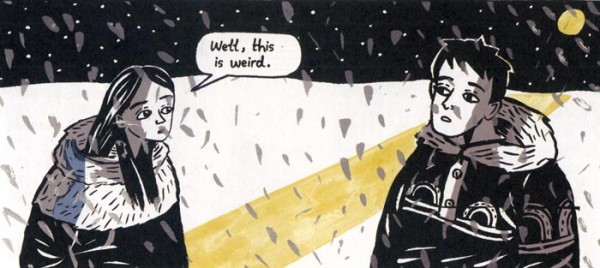
The site
Broken Frontier has announced nominations for its tenth annual awards. You can vote via information presented
here. Their nominees are:
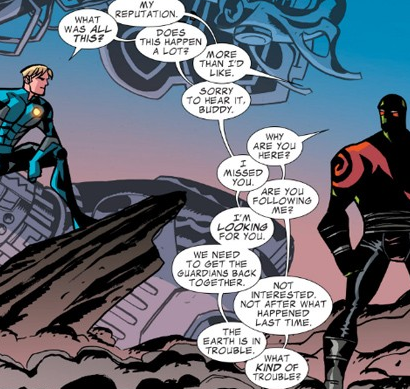 Best Writer -- Mainstream
Best Writer -- Mainstream
*
Brian Michael Bendis (All-New X-Men, Guardians of the Galaxy, Uncanny X-Men)
*
Matt Fraction (Hawkeye)
*
Jonathan Hickman (Avengers, New Avengers)
*
Mark Waid (Daredevil)
*
Scott Snyder (Batman, The Wake)
Best Writer -- Independent
*
Charles Forsman (Celebrated Summer, TEOTFW)
*
Nicole Georges (Calling Dr. Laura)
*
Matt Kindt (Mind MGMT, Red Handed: The Fine Art of Strange Crimes)
*
Greg Rucka (Lazarus, Lady Sabre & The Pirates of the Ineffable Aether)
*
Brian K. Vaughan (Saga, The Private Eye)
Best Artist -- Mainstream
*
David Aja (Hawkeye)
*
Chris Burnham (Batman Incorporated)
*
Jamie McKelvie (Young Avengers)
*
Esad Ribic (Thor: God of Thunder)
*
Stuart Immonen (All-New X-Men)
Best Artist -- Independent
*
Becky Cloonan (Demeter)
*
Michael DeForge (Very Casual)
*
Marcos Martin (The Private Eye)
*
Gary Northfield (Teenytinysaurs)
*
Fiona Staples (Saga)
Breakout Talent
*
Gareth Brookes (The Black Project)
*
Hannah Eaton (Naming Monsters)
*
Charles Forsman (Celebrated Summer, TEOTFW)
*
Katie Green (Lighter Than My Shadow)
*
Isabel Greenberg (The Encyclopedia of Early Earth, Tall Tales and Outrageous Adventures)
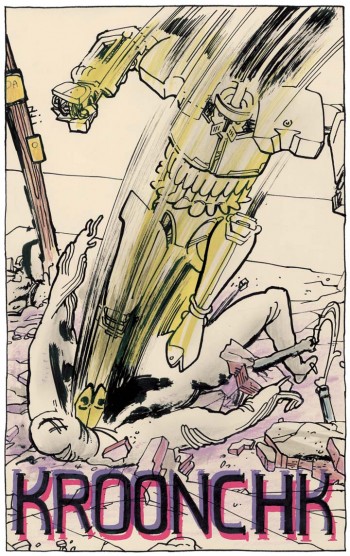 Best Ongoing Series
Best Ongoing Series
*
Copra (Michel Fiffe)
*
Hawkeye (Matt Fraction & David Aja, Marvel)
*
Mind MGMT (Matt Kindt, Dark Horse)
*
Saga (Brian K. Vaughan & Fiona Staples, Image)
*
Young Avengers (Kieron Gillen & Jamie McKelvie, Marvel)
Best Limited Series
*
Dream Thief (Jai Nitz & Greg Smallwood, Dark Horse)
*
Mouse Guard: Legends of the Guard 2 (David Petersen et al, BOOM! Studios/Archaia)
*
Numbercruncher (Si Spurrier & PJ Holden, Titan)
*
Storm Dogs (David Hin & Doug Braithwaite, Image)
*
Trillium (Jeff Lemire, DC/Vertigo)
Best New Series
*
Lazarus (Greg Rucka & Michael Lark, Image)
*
Kinski (Gabriel Hardman, Monkeybrain)
*
Pretty Deadly (Kelly Sue DeConnick & Emma Rios, Image)
*
Sex Criminals (Matt Fraction & Chip Zdarsky, Image)
*
The Private Eye (Brian K. Vaughan & Marcos Martin, Panel Syndicate)
Best Original Graphic Novel
*
Boxers/Saints (Gene Yang, First Second)
*
March: Book One (John Lewis, Andrew Aydin & Nate Powell, Top Shelf)
*
Swear Down (Oliver East, Blank Slate)
*
The Black Project (Gareth Brookes, Myriad)
*
The Encyclopedia of Early Earth (Isabel Greenberg, Jonathan Cape)
Best Book on Comics
*
Al Capp: A Life to the Contrary (Denis Kitchen & Michael Schumacher, Bloomsbury USA)
*
Bazooka Joe and his Gang (Jeff Shepherd & The Topps Company, Abrams ComicArts)
*
Comics Art (Paul Gravett, Tate Gallery)
*
Curing the Postmodern Blues: Reading Grant Morrison and Chris Weston’s The Filth in the 21st Century (Tom Shapira, Sequart)
*
Magic Words: The Extraordinary Life of Alan Moore (Lance Parkin, Aurum Press)
Best Publisher
*
Blank Slate Books
*
First Second
*
Image Comics
*
Nobrow Press
*
Oily Comics
Voting ends tomorrow at midnight!
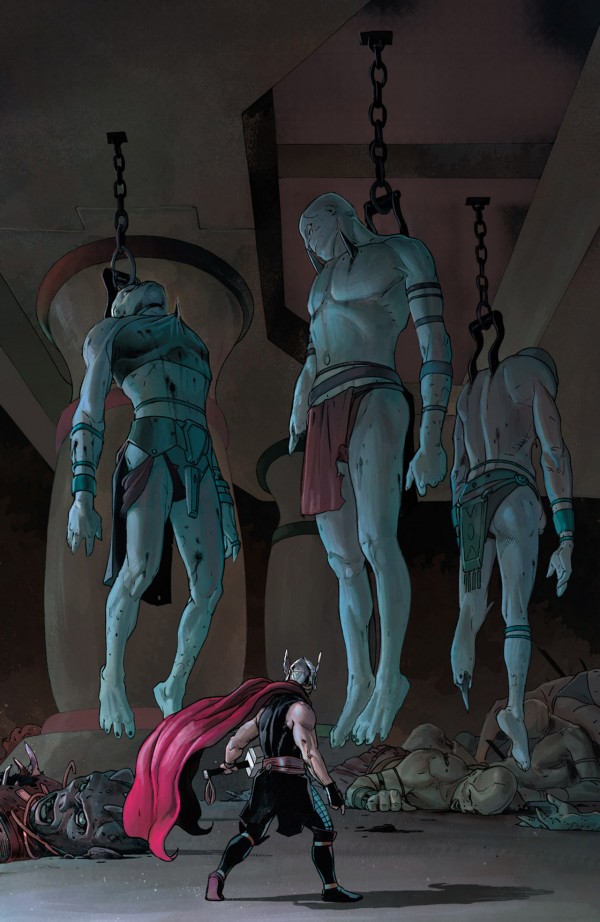 posted 3:45 pm PST
posted 3:45 pm PST |
Permalink
Go, Look: Christmas Imagery At The Golden Age Site

 posted 3:40 pm PST
posted 3:40 pm PST |
Permalink
Go, Read: Rachel Edidin on Scott Lobdell’s Apology
 Here
Here. I get a little lost as to how tumblr provides URLs to instances of re-blogging but if you go to
Edidin's tumblr site more generally you can see additional commentary in at least one subsequent post.
posted 3:35 pm PST |
Permalink
Go, Look: Deck Us All With Boston Charlie

 posted 3:30 pm PST
posted 3:30 pm PST |
Permalink
Comics By Request: People, Projects In Need Of Funding

 By Tom Spurgeon
By Tom Spurgeon
*
please consider including the CBLDF in your year-end giving. There are a lot of people clamoring for cash over the last six weeks, and I hope no one forgets a charity with the CBLDF's pedigree.
You could also do a membership. Or both.
* I'm not sure I was aware that the Sparkplug Comic Books recent posting about pre-orders and support included an on-line, art-auction component:
here are those art auctions.
*
Ted Rall would like your support through a service called Beacon.
* various publishing projects continue to look for your support right through the holidays,
like this one from Montreal whose artist was nice enough to contact me asking me to ask you to take a look.
* Mark Evanier
details the happy outcome for Bob Kahan in keeping his apartment
via asking for help, and I join with him in hoping that the one-time editor at DC is able to secure long-term employment. I'm not sure I'm exactly where Mark is on the broader point of people criticizing those that turn to crowd-funding as a way to make it over a rough spot in their lives. I agree with Mark that the spiteful certainty of some of those sentiments as expressed are demeaning, and I'll never question anyone that says they're in need, but I think at some point having a conversation about those issues of need and charity more generally can be useful in deciding how best to spend the limited resources we have to help each other out.
* efforts to help Stan Sakai as he attempts to make up a home healthcare insurance gap
remain ongoing. Please note the CAPS paypal button is working again. Sakai is one of the best people in comics and I hope you'll considering lending him a hand or seeing your way to one of the things being offered on his behalf for well-meaning peers.
* the Sequential Artists Workshop
is seeking a few thousand dollars in support of its 2014 programs. Tom Hart and his fellow SAW folks are good people and that money will be well-spent.
* finally, don't forget that Dan Nadel
continues his 50 percent off sale at PictureBox as that company winds down the front-list part of its admirable life. If you can't think of anything for yourself, get me something.
posted 3:25 pm PST |
Permalink
Go, Look: The Return Of A Christmas Carol

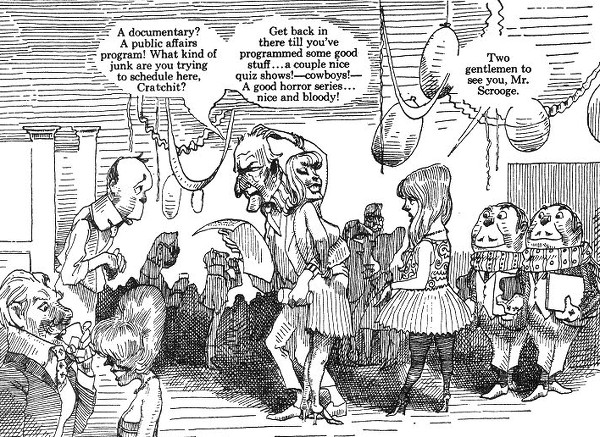 posted 3:20 pm PST
posted 3:20 pm PST |
Permalink
Go, Look: Longbox Graveyard’s Thing Pinterest Gallery

 posted 3:10 pm PST
posted 3:10 pm PST |
Permalink
Random Comics News Story Round-Up

* all the images are disconnected which I take as a sign he really, really doesn't want the imagery being used, even to direct traffic there, but
the Lewis Trondheim Advent Calendar is a lot of fun. I mean, it's a commercial promotion, but some of the images are lovely.
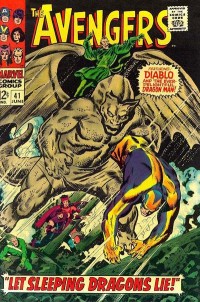
* I collected comics in the obsessive back-issues sense at a remove from just wanting to read the comics themselves for only a brief period, but even that's a stretch as I like most kinds of comics and certainly read the ones I bagged and boarded and crossed off checklists. I did enjoy the idea of the having these books for the sake of having them, though, and I loved them as cultural objects. The two comics I liked most for collecting were Marvel's
Avengers and
X-Men series, I think because they went through multiple recognizable periods that could be enjoyed distinct from the others. It's hard to read the Roy Thomas-era
Avengers now in a way that allows me to become absorbed in the work, but I still love looking at how brutish John Buscema's figure-drawing was at the time. Everyone was a giant thug. Reading those comics was like being in a hotel elevator with members of a professional football team.
* not comics:
hard not to love the story of Herbert and Dorothy Vogel.
*
how one column celebrated the 50th anniversary of the Avengers and X-Men concepts created by Jack Kirby and Stan Lee.
*
yes.
*
this looks potentially nice. The English-language comics how-to market remains as puzzling to me as early New York state politics. I mean, I get a ton of stuff -- or at least I did at one point -- but most of it seemed pretty useless. I guess there's good stuff with the Matt Madden/Jessica Abel and the James Sturm involved books.
* go, look:
Calvin's snowmen.
* finally,
the good folks at the Billy wish you a Merry Christmas via Arnold Roth. When are we going to have that year where every week we marvel at Arnold Roth's career?
posted 3:05 pm PST |
Permalink
Happy 56th Birthday, Tony Caputo!

 posted 3:00 pm PST
posted 3:00 pm PST |
Permalink
December 21, 2013
 CR Holiday Interview #05—Dave Kellett
CR Holiday Interview #05—Dave Kellett

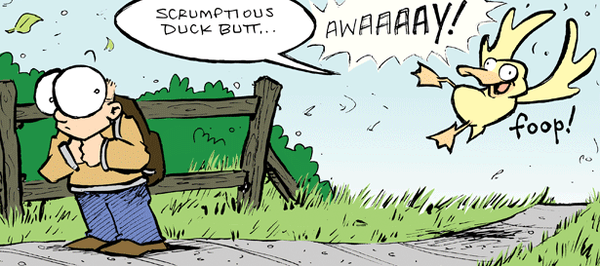
*****
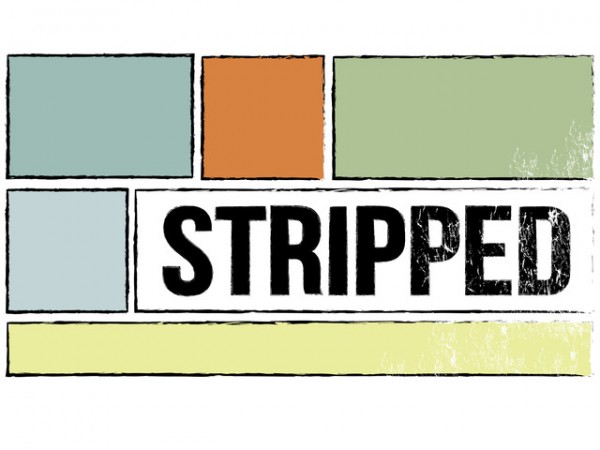 Dave Kellett
Dave Kellett is the cartoonist behind the humor strip
Sheldon and the humorous science fiction comics
Drive. Both of these creative effort have their primary home on-line, where Kellett has forged a career as a cartoonist. He started out wanting to do a syndicated newspaper strip, and as he'll point out below, comes to that world of comics as an appreciative professional on a variety of levels. With
Fred Schroeder, Kellett has made
the documentary Stripped, about the intersection of those two worlds as webcomics have surged into viability and newspaper comics have weathered a rough period relative to their long and glorious history. The movie was crowd-funded not
once but
twice. The film may get a publicity boost from the fact that it features audio from
Bill Watterson, and I think it stands to connect with audiences for its genial and hopeful tone. One nice thing about the film is it simply gets a lot of people on camera in a way that provides a snapshot of this unique moment in comics history; the resources represented by its raw interviews and research materials will be a boon to comics for years to come. The following conversation is shaped in large part by the movie. It was nice of Dave to take time from his various projects during such a busy period to talk with me, and I'm very appreciative of the additional work he did on this interview. -- Tom Spurgeon
*****
TOM SPURGEON: Where are you exactly with the movie, Dave? What do you have to do that's left? What stuff has to be done with the movie itself?
DAVE KELLETT: The good news is that all the creative stuff at this point is locked. In the terminology of film-making, the sound was locked a few months ago -- that means it got re-recorded, leveled and mastered. That included all the music, the dialogue, the
ADR, all of that stuff. So that was locked a few months ago and the last two or three months was spent trying to lock the picture. That's everything from color timing the interviews so that so-and-so doesn't look too pink or too blue, and then also getting final approval for all of the comic images and illustrations and caricatures that appear in the film. There are 627 different ones in the film, so it took a while. The good news is if we're not picture-locking this week, we'll be locking in 7 to 10 days.
SPURGEON: So then you have to get it out there so people will see it, or it goes into some sort of alternative distribution system, I assume. How does that track of it work?
KELLETT: This is the part of it I'm actively learning about now. The interesting thing from a comics perspective is that independent film, or smaller film -- depending on how you want to say it -- is sort of going through a similar thing to comics in that there's a breakdown in traditional models in how you get your product to people. The traditional way you would do it if you were an independent filmmaker is you would hook up with an agent and/or distributor, you would get it out to a very short theatrical run, and then you would have sold it on DVD and streaming, that sort of thing. But there's been some really successful and landmark films, like
Indie Game: The Movie -- I don't know if you're familiar with that one --
SPURGEON: Sure.
KELLETT: -- that have really completely sidestepped that. They won at
Sundance, had offers at Sundance, and really said "No, thank you" to all three of them. And they proceeded to self-distribute, removing all sorts of middle-men. They've done absolutely fantastic for themselves. I'm personally kind of leaning that way. I like the idea. Unfortunately -- not unfortunately;
fortunately -- the side effect of making a living in webcomics is that I like that whole model.
SPURGEON: The fact that you cut out the middleman, is that an implied critique of the money involved? Or is the control involved? Do you feel like you can simply do a better job in helping this movie find its market because of your personal experience with its subject matter? What exactly makes that model more appealing to you?
KELLETT: It's definitely not a question of ultra-confidence that I can do a better job of it. [Spurgeon laughs] I'm absolutely sure there are pros that can do a better job of distributing the film than I could. It is a statement on the money aspect of things and the control aspect of things. Just as a web cartoonist, I love that I don't have an editor; I love that I don't have anyone telling me what I can or can't do in the way the business is done. From a film standpoint, it's kind of a dirty little secret that the money has never been great in independent film. So you could sell your film to a distributor or to
HBO or
PBS and -- this is true for many people -- still be in debt in how much money you spent to make the film. It was never a great proposition. So even some films you or I might consider a high visibility independent film might still be in debt or might not have made more than a Midwest teacher's salary off of the net profits.Â
I think the potential and the joy of holding onto control is a wonderful thing.
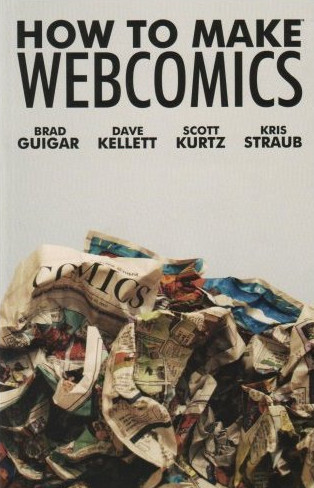 SPURGEON: When you did the book [How To Make Webcomics], did you do the book the same way? I actually don't recall this off the top of my head, if that was self-published by the four of you that did that book. Did you work on that distribution yourself?
SPURGEON: When you did the book [How To Make Webcomics], did you do the book the same way? I actually don't recall this off the top of my head, if that was self-published by the four of you that did that book. Did you work on that distribution yourself?
KELLETT: Oh, no. None of us wanted to be the main -- what's the best way to say it? -- the main protagonist in getting that published and out to the world, so we decided none of us would spearhead it, and we'd do it through Image, instead. Which I don't think we would do again. I think one of us would spearhead it and do it on our own. It's unfortunate, but I think because they handle so many titles I found Image's accounting to be really wonky at best. I think they made some... well, it doesn't matter. I think we would do it ourselves at this point.
SPURGEON: I can't let that go, Dave, without asking -- you think the number of titles they handled means they didn't pay attention to the sales that you had?
KELLETT: They did fine as far as launching the book. And overall I think they're best-of-breed at what they do. But I do think they made some easy-to-catch administrative mistakes in printing up the third edition, which had us scratching our heads big time. I think looking back on it, and hindsight is always 20/20, that we would have done it ourselves if we could do it again. A successful webcartoonist always sticks with what is working for them, especially because our careers not reliant on any distribution system or publisher. So it's telling that all four authors on that
How To Make Webcomics book haven't used them again.
But I think at this point, there's a maximum profitability point for any book, and this book has passed it. So it's not worth it for us to take that book back over, to handle it now. There's only a few thousand dollars left in the arc of that book's life at this point.
SPURGEON: So you have that experience and the webcomics experience generally -- do you think you're just more attuned to the possibility of self-direction with a lot of these business decisions? Is DIY in your DNA? That would be the cheesy way to put it. Do you feel more comfortable and actualized as a cartoonist to at least have self-direction as an option? It would seem to me likely to become an orientation.
KELLETT: Oh yeah, absolutely. The joy about retaining ownership and doing it all yourself is that even if you screw it up the first time around, provided you make manageable-sized mistakes, you've learned enough to rock it the second or third or fourth time you do it. I may well make a huge error with this or that print run, or this or that book, or the way that I handle this or that thing, but overall, cumulatively, my career is so much better for having done it myself.
SPURGEON: You've been around a while now. Do you count on that as a resource, this core of people that are interested in what you're doing? Are you that analytical about it -- do you have a mailing list, do you have transferable knowledge about the more passionate fans of your comic? Do you think about it in those terms? Are you that kind of businessman, even if it's just the business of being Dave Kellett?
KELLETT: Absolutely. I think it's really to the detriment of the artist's career who doesn't think about it that way. In my way of thinking about it, it's akin to health insurance. You can be an asshole and say, "Oh, I don't need health insurance. I'm fine." But then you're the moron that gets stuck with the kidney operation that damn near kills you and bankrupts you. That's probably a stretch as a metaphor, but I think it's similar in that nobody wants to deal with the numbers, no one enjoys sitting down and poring over your cost-per-goods-sold or how your books are doing or this or that. But it has single-handedly insured that I will have had a career for at least a decade now, and into a second decade. You and I both know far, far better artists than I who don't have a full-time art career because they can't keep a grip on the numbers.
So I think it's critical to being a functioning artist.
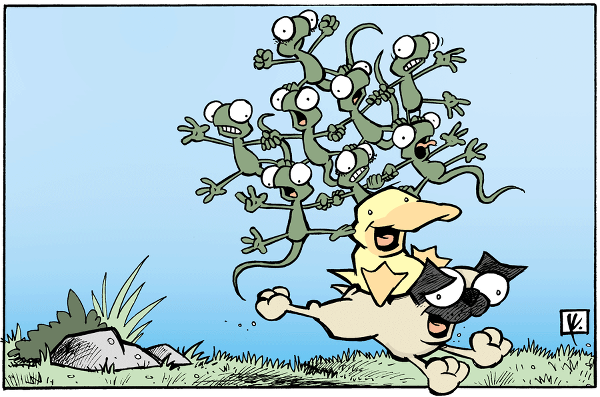 SPURGEON: Was there a point in the learning curve for you, where you had to make that decision? Or did that always come naturally?
SPURGEON: Was there a point in the learning curve for you, where you had to make that decision? Or did that always come naturally?
KELLETT: It's a story worth telling. I grew up wanting to be a syndicated cartoonist. That's where the audience was. That's where the money was. That's where the prestige was. A few years after the turn of the century -- god, that sounds stupid -- but a few years after the turn of the century, I had done a series of labels for a barbecue sauce company in Kansas City. They flew me out to do a signing, and I was next to
Andrews McMeel/Universal. And so I was at this point where all of my friends in syndication were like, "Oh my gosh, this is far less money than I thought it would be." And all my friends in webcomics were saying, "Wow, I'm hiring an assistant, and a second assistant for the Christmas shipping season." That kind of thing. The money was getting better and better in webcomics. So I realized I kind of needed to make a decision about which way to go. I don't know if he even remembers this, but I e-mailed
John Glynn at Universal Press and said, "Hey, can I take 15 minutes of your time. I'm going to be in Kansas City." And I sat down with him. I said, "Hey, is this ever going to happen for me? Am I ever going to be syndicated? Do you guys have any interest?" And he said, "You know, just not at the time. I don't know that we could launch it. I don't know if we could make it a success for you or for us."
I needed that, because it was like, "Okay, fine. Now that makes that decision super-easy, to step away from the childhood dream of syndication and make a career in webcomics." So that's what I did. It sounds kind of silly to say that I needed that one last confirmation, but from there, I've been 100 percent towards building a career in webcomics.
SPURGEON: So when you do this film, that's your background. One of the things I thought was interesting about the movie is that during the period the movie was in production, there was a shift in the discussion of webcomics vs. print comics. It seems to me that the germ of the movie might have come in that newspaper collapse period, but then things stabilized. It seems like if things had continued to decline rapidly, the movie might have been much different than it turned out. Did the movie change according to events?
Â
KELLETT: It changed for two reasons. For an audience, watching a disaster movie of "Oh, everything's falling apart" is really sad after an hour and a half. You walk away bummed about it. Where's the joy in saying "Hey, guess what, everybody? Vaudeville's dead" for an hour-and-a-half? That's not a fun movie to watch. So that had an impact.
More importantly, the newspaper market went form "Oh my God, it's all falling apart" to "Oh my God, it's just really bad." Which was a step down in terms of their dire financial status. Sure, editorial cartoonists kept getting laid off left and right, and syndicated strips went from two a year being launched to one every two years. It's still not good by any stretch, but it's not, "Oh my God, it's all falling apart." So I think the attitudes shifted a little bit.
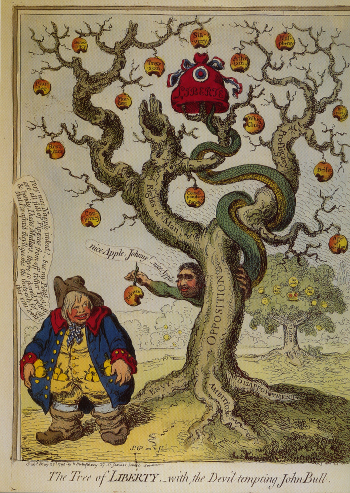
And what happened is we also realized in the process of making this film that this has happened three or four time in print comics, where
[William] Hogarth and
[James] Gillray figured out a completely different way to do comics in the 18th Century,
Punch figured out a different way from there, the first generation of newspaper guys figured out it one way, then syndication came along and figured it out another way. One of the central themes, and I don't know if you remember this from the film, is that comics find a way to survive. That I think is the most hopeful note in the movie. Comics always find a way to survive.
SPURGEON: Maybe I'm just old and bitter, but I'm not sure that I was convinced by the hopeful ending to your movie. And I'm further suspicious in that there's such a pressure on people when doing art to be positive, to hit that positive note if only because the negative note is so hard to take. Did you feel compelled at all to end on that positive note? Or do you really think comics will be okay? And if you think comics will be okay, I'd like to know why you think that.
KELLETT: Good question. So, a couple of answers. First: You are old and embittered. [Spurgeon laughs] I'm kidding. Ultimately, I'm an optimistic person. And that's probably a fault. But I do think that the number of careers that I'm seeing -- and I think that's as good a measure as any -- the number of careers I'm seeing where people are paying rent or their mortgage or their kids' schools from comics is going up. It's just that you and I don't see it because they're not water cooler comics. They're these smaller, almost micro-audiences that have huge support for their creator. It's just that you and I don't have them on our radar.
I imagine your average reader doesn't know me from Adam, or my work from Adam. Which is fine, I don't need them to. I just need the few 10,000s, or however many there are, readers to keep supporting me. If that make sense.
SPURGEON: It does. Now who are some of these people that I wouldn't have heard of, or just that comics fans might not have heard of -- who are examples of that kind of cartoonist?
KELLETT: I think a good measure is that your parents and my parents would know
Pogo. They would know
Peanuts. They would know
For Better Or For Worse. Those were water cooler comic strips. Compare that to
The Oatmeal, or
Diesel Sweeties, or my strips -- anyone you want to name. Even
Penny Arcade -- outside of their core audience, nobody knows who they are. So we no longer have water cooler comics, but that's fine, because there's atomization in comics. Provided the fan base is there, it doesn't matter that everyone in your average accounting office isn't able to talk about me in the office kitchen. The only thing that matters is these artists have careers, and their tens of thousands, hundreds of thousands, millions of fans are supporting them.
SPURGEON: It seems like you're comparing what we have now to top of the line syndicated people, but the syndicates had pretty deep catalogs back in the day. There were guys making a living not as well known as a Walt Kelly or Milton Caniff. The water cooler comics doesn't seem to me an entire set of how people made a living, but a subset of those making a living through syndication back then. So I'm not sure there's a direct correlation. Do you think there are more webcartoonists making a living right now than the entire roster of one of the old syndicates in 1948, say?
KELLETT: I should couch my optimism in context. My context is the '90s and early 2000s, where I was losing hope that comic strips would even survive. And largely, aside from the recent Dutch or Swedish comic strip that Universal launched a few weeks ago [
WuMo], nothing has really taken off in the last few years in comics syndication. You can point to
Lio, and there are another few probably, but for me the context was, "Oh hell, the entire syndication model doesn't seem to be launching careers anymore. But wait... there seems to be a lot of webcomics where there are careers. So there's not a cause for absolute despair; there's a cause for hope.†So my optimism in the movie, that you were asking about before, comes from comparing it to, "Oh God, it's all going to end."
SPURGEON: So it's really a critique of the last 20 years.
KELLETT: Remember that before anyone figured out how to make a living on-line, there was real hand-wringing going on about the death of print, or the death of the print syndication model at least. It's not unlike -- and I know far less about this -- when the market in comic books started to dry up, when all these shops closed. It's like, "God, what do you replace this with." For syndicated comic strips, when you start losing two-newspaper towns, and you start having entire pages cut from newspapers, the genuine question is, "Oh God; how do you replace this." The answer seems to be you replace it with digital distribution and it seems to be working for a few dozen creators around the world.
SPURGEON: So the creative aspect of those strips that are making it work... they do seem to be specifically targeted, for instance, which indicates a creative outcome to this model. Something like Penny Arcade
has a specific creative mission that's not the same as a lot of strips that attempt print syndication. Many of those strips are asked to play to the broadest possible audience, or at least as much as content and approach allow. Do you feel like the strips that are making it according to this newer model are strong for that specific focus? Or is only difference access to a business model through specificity, a model that allows them to survive?
KELLETT: I think a good way to start that answer is to say that form follows function. So for a newspaper comic strip, the function was that you had to appeal to a five year old and an 85 year old, you had to appeal to all sorts of social and religious backgrounds, and above all else you had to not piss off the publishers so that you could continue to sell newspapers. The common critique, now, is that it's 1950s humor: You can't say the word "sucks" in the newspaper --
Stephan Pastis often jokes about that, what he can't say in the newspaper. What syndication did was create a comic strip that everybody in America could relate to and understand. What happens when you get to the on-line world is that you don't have to do that. To make a living, to make the art you want to make, you don't have to appeal to a lowest common denominator. You can make a super specific math joke, if you're
xkcd, or a super specific video game joke if you're
Penny Arcade or a super specific joke about the nuances of running if you're
The Oatmeal. That may not appeal to the lowest common denominator, but it will be a much more passionate resonance for a very specific kind of reader. So yeah, you get a new subset, a core readership, that's much more passionate. Whether or not that's better or worse is a subjective call. I happen to think that it's better in the sense that a certain... not malaise, but a certain retreading had started to happen in syndication. So it's nice to have new blood, new energy in it. It's a completely subjective call, so I wouldn't claim if it's better or worse.
SPURGEON: So are there people you think might be suited to one or the other realm creatively? You mentioned Pastis, is that someone that might be better served by a direct model? Are there strips in the webcomics world that are broadly pitched that might be better served by traditional syndication?
KELLETT: Again, it goes back to form follows function.
[Robert] Crumb never would have worked as a syndicated cartoonist. That wouldn't have worked for him. Thank god there was a model that worked for him, and a living to be made, that established his career. Different cartoonists rise to different occasions and the webcartooning model brings about a generation of artists that are better at wearing 20 hats than a
Mort Walker -- well, actually, Mort's a bad example. It's a different kind of cartoonist than someone who would draw their cartoon, send it in, and then golf. It's a different kind of cartoonist that rises to the occasion. That absolutely means that some cartoonists will fail that would have succeeded in a syndication model, but the opposite is true -- there are fantastic cartoonists that never would've made it into the syndication model because they couldn't create for an audience in the way that syndication required.
So yeah, absolutely. Different artists succeed in different syndication models. If you look at this generation of cartoonists that are succeeding and hiring staff, they have almost a different make-up as people than syndication artists or the black and white -- although no, actually, the black and white artists are very similar. I'll take that back. People that work for
Marvel and
DC. It's a different sort of genetic code for this generation. But it definitely means some people aren't succeeding that are fantastic artists because they can't handle the business end of all this stuff.
SPURGEON: Have you given any thought as to why there hasn't been a model that's bridged that gap? I guess there have been some attempts at publishers and packagers within the webcomics world distinct from the artists themselves, but it's not usually the model you hear about working. Why hasn't there been someone to solve that riddle? Is it that there's a limit to the audience? Does the audience not want that person involved? Is it the money?
KELLETT: I think generally in culture there's not only an atomization of comics, there's an atomization in all types of popular culture. So there's absolutely less money than would have been the case when Hearst and Pulitzer were setting up the syndication models to tap into that. What you're finding is, in individual cases, there are business people that step in like
Robert Khoo at Penny Arcade, and say, "Oh, there is money to be made here, enough to pay four, five, 20 different salaries." And then you find businesses like
TopatoCo that say, "Wait a minute. We can absolutely provide, if not business management, then services that allow the artist to focus more on the art." And then there are companies that focus on ads. So as opposed to the all-inclusive, all-your-needs-are-met model with syndication, cartoonists are finding individual companies that provide this and that. So TopatoCo for my books and t-shirts. Another company for my ad services. Still another company to handle any animation I have to do. And this is a better model for the DIY mindset.
SPURGEON: The section you did on Robert Khoo in the movie was interesting because what he did seemed a bit like magic -- you presented him as a guy who came in and helped them make money but didn't in any way get into how. One thing I wonder is why someone like Khoo seems unique, why there hasn't been more than one person that people can name that have that relationship with a webcomics effort. Why hasn't that become a model as opposed to more of a unique, one-time thing? Why has his achievement remained singular?
KELLETT: There's a many-faceted answer to that.
So, in the same way that I think in the 1920s and 30s and 40s all the talent in comic art got drawn to comic strips because that's where the money is, now they get pulled to
Pixar. Or they get pulled to
DreamWorks, because that's where the money is. A similar thing happens to people of business orientation. They look at comics or webcomics, and the average business person says, "If I can sell it on to Sony, then great, I'll get involved. Otherwise, this is a pittance compared to other business I could be in." So for the most part I think your average businessperson looks at comics from the outside and says, "Nah, not enough money there." But
Penny Arcade, even more than anything having to do with their comics, have tapped into one of the biggest media movements in the modern age. The videogame market is I believe bigger than film. Yet how many well-produced comics are commenting to a broad audience about videogames? It's pretty much just them. So there's a lot of money to be made with that company. Really, any good MBA grad could've executed on it... but Robert was the one that saw the opportunity. So that's why I believe he's somewhat unique. And I don't know, but I'd be surprised if Matt Inman doesn't have someone like that with
The Oatmeal. I'd be surprised if he doesn't have a business manager. And there are a few artists for whom a business manager would be better. But yeah, from the outside looking in, most people just don't see a return on the day to day drudgery of working with comics.
SPURGEON: Do you ever get sick and tired that we're that focused on the monetary aspects of the webcomics world? [laughs] I mean, your film kind of invites discussion of some of these issues, so I can't all-the-way apologize for this interview going there, but the discussion in general... The last six or seven years, no matter what the reason webcomics might come up, it seems like you guys are pressed to justify your existence as business entities or something. There's a massive curiosity there, but that has to be exhausting.
 KELLETT:
KELLETT: Yes. Absolutely. No one every talks about how
Karl Kerschl's art on
The Abominable Charles Christopher is some of the best that's ever been produced or how
Oglaf's writing is genius, none of that stuff ever comes up. It's always the business model. And that's fine. What I recognize is that for most people these questions are coming from a place of fear. Most people are terrified about where their own careers are going and where comics are going. They're desperately trying to make sure that "Wait a minute, is it true that these people are hiring in webcomics, and how are they making a career on this and how is this happening?" I'm sure you get this even with what you do: how the hell do you make a living?
SPURGEON: Sure. I do, quite a bit.
KELLETT: What that is is that's grown men and women terrified about their own career. They're trying to figure out if this is legitimate, and how they know it's legitimate. It's hard for them to know because there's no third-party confirmation. It used to be when you heard somebody was syndicated, and you heard they were in 400 newspapers, you knew they were making a living. For all you know, on the other end of this line I'm in an RV and barely making do with beans and hot dogs.
SPURGEON: I knew it.
KELLETT: [laughs] What I'm saying is that there's not third-party confirmation, so these questions keep getting asked until some kernel of confirmation can come through that it's working.
SPURGEON: I think the dialogue deteriorated years before webcomics came along, in the last three decades with syndication. There were a lot of people making a modest amount of money that never really let on they weren't making Jim Davis money. So the dialogue was already pretty lousy on those issues.
KELLETT: Because webcomics cartoonists are DIY, they don't mind so much talking and being honest about what works and what doesn't. "That didn't work, but I made a lot of money doing this. I sure didn't doing that." If you wanted to go down that rabbit hole, I could take you through what works and what doesn't with my business. I wouldn't necessarily mind. But if you did the same with a syndicated cartoonist, or even more accurately a syndicate, there's no way in hell they'd tell you what's working and what's not working.
SPURGEON: Was there any desire with the movie to shy away from business -- to purely talk about the art of it, and not talk about Robert Khoo or the newspaper industry collapse, just generally not bring up these issues? How would you prefer the conversation go past the conversation you host in your film?
KELLETT: I think the ideal situation is ten more films get made by ten more people about comics. There's no way that this single film, even though we try to touch on the art, the history, the business and the personalities of comics -- which I hope you see we at least tried to do -- it's really hard even in a feature to pack in as much as you want to about comics in one movie. So we tried to basically crack the door on a lot of these topics and handle them as thoroughly as we could in a feature. So we talk about the passion and the joy that cartoonists had when they started cartooning the first time, we talked about the greats and the lives they led in comics, and we talked about the newspaper crisis and the rise of digital, and we talk about where things are going. I think from all of that, different people will take different inspiration from the film. It probably says as much about you or I that this is what we ended up talking about, the business stuff. But different people have asked completely different questions coming out of viewing the film. In that sense it's good, because it's a litmus test for what you find interesting in comics right now.
SPURGEON: Do you think there's an under-appreciation -- you mentioned Karl's work -- but do you think webcomics are consistently under-appreciated?
KELLETT: No. I guess what I was trying to say about that is that this is where the conversation naturally ended up going: To business instead of the art side of things.
SPURGEON: Let's take it to the art side of things. What is it about the world that excites you right now? I think there was a point at which with webcomics 10 years ago, maybe even 15 years ago where going on-line meant discovering new people, just this endless parade of new voices. Now you still have that, but you also have artists who have developed on-line, who can mark the majority of their creative progress in various on-line projects. What do you enjoy amongst the people that do what you do?
KELLETT: Not to sound wide-eyed or naive about it, but I'm excited about the possibilities that digital presentation presents. We see it in format. We see it in the footprint of a panel or a page. We see it in the materials being used -- the mixed media being used. I think we see it most importantly in the voices, the writing voices that you hear coming out, that you never would have seen in syndication. To me there are more artists writing, more voices for more audiences, than you ever would have had in syndication. It's the equivalent -- and this is a bad summary -- of syndicated comics becoming a version of the desert island joke in
The New Yorker. They were all either a baby strip, or an animal strip, or a white family dealing with white family problems. That is basically what syndication had become. Now there are all sorts of voices. You look at
Meredith Gran, or
Danielle Corsetto, or
Kate Beaton or
Spike, there are so many new female voices, which is exciting. You look to the new audiences being written to, and what's being said. It's an incredibly exciting time for webcomics. Again, that's not mean to sound naive or wide-eyed or "Oh, golly, what a great world we're heading into." It's just that I see a re-emergence of comic strips as something exciting to write for.
SPURGEON: Your specific joy is for that strip... why is that? Do you like the beats there? You've been doing one for years and years and years now, Dave, and asked that question about work in general it's where you went -- for the most part, anyway. Where is your specific joy for Sheldon
right now?
KELLETT: Even different than a comic book or a graphic novel, for me a comic strip is commonly a single person working on a regularly updated basis talking to a vast audience. There's an immense joy in that, that a team working on a comic book that comes out once a month or working by myself or with others on a graphic novel that comes out every three years or so, that's just so joy-filled. It's a great format, it's a great way of communicating. No single idea is a make or break one. If Thursday's is bad, then the next one will be fine. Over time, if you're batting .700 you're going to be doing great. Maybe that number's too high. It's a great way to communicate.
For me, I love being able to switch back and forth between character jokes and situational jokes. And the stand-alone single jokes... so I find great joy in it.
For me with
Sheldon I've been doing it 15 years now, since '98. And in the last five or six years, I started doing a sci-fi strip. That's given me a whole new jolt about comic strips in general. It feels like I'm doing one of the old adventure strips.
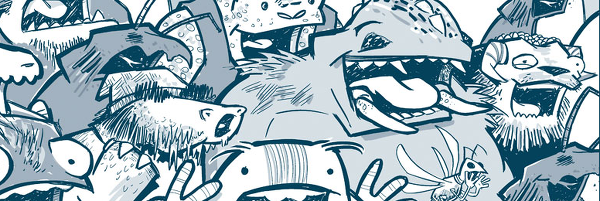 SPURGEON: The fascinating thing to me about
SPURGEON: The fascinating thing to me about Drive
-- and I'm not sure I can articulate this without coming across as insulting -- is that you have a very stylized approach, your strips have a stylized look; they're not rendered in the classic sense. They're not based on figure drawing, and there's a certain amount of arch cartoony-ness to your figures.
KELLETT: Absolutely.
SPURGEON: So it surprises me in Drive
how well you employ that in that milieu. It doesn't seem like that should work.
KELLETT: No, you're right. It's funny that you say this, but I had another cartoonist tell me, with such brass balls... he e-mailed me about six months into the strip and said, "Hey, I'm really enjoying the strip, but you shouldn't be drawing this. Someone else should be drawing this." And I was like, "Wow, that is ballsy." But you're right. You're right. If you look at
Sheldon, you wouldn't think, "Oh, this is a guy that should be drawing sci-fi." But for me, I wanted that
Hitchhiker's-Guide-meets-
Frank-Herbert feel to the strip. You would have these vast science fiction empire kinds of things going on like you would in
Dune, but you have the goofiness of a
Hitchhiker's Guide. I think the style works because of that.
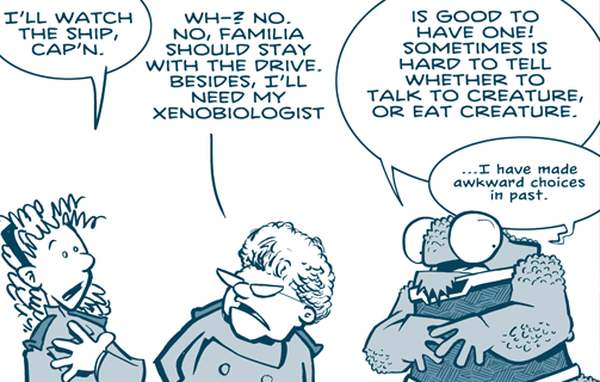 SPURGEON: You mentioned Douglas Adams... I imagine doing humorous science fiction he has to be a colossal, nearly unavoidable figure. How do you deal with a genre where there's a singular, obvious influence like that? It seems like he would be almost the definition of that sub-genre, and I wondered how you negotiated that.
SPURGEON: You mentioned Douglas Adams... I imagine doing humorous science fiction he has to be a colossal, nearly unavoidable figure. How do you deal with a genre where there's a singular, obvious influence like that? It seems like he would be almost the definition of that sub-genre, and I wondered how you negotiated that.
KELLETT: Yeah. That's a really good question. I think the best way to describe it is that for whatever reason that wasn't an overriding fear on my part when I started. I don't know if that's a helpful answer. I was less worried about... I knew from an alchemy sort of way I wanted a little dash of Frank Herbert, and I knew I wanted a little dash of Adams, and I knew I wanted a little dash of this and that. I could never write the scope and power of a Frank Herbert story. I could never write the goofy joy of a
Hitchhiker's, but I knew if I shot in that direction with my own writing and drawing skills that I would find my own story, which is what I really wanted to do. And
Drive is one of those stories where the whole arc of it kind of sprang into my mind, if not complete, then near-complete. So it's not like I was thinking, "Oh, I want to do an android, but I want to do one different than the one in
Hitchhiker's.†For me, the story was whole cloth, and I wanted to present it in a way that reflected those two styles. But I never had an overriding concern. He is so damn good how could I ever come close to that style?
SPURGEON: To tie that back into the film... your film ties print and webcomics together via the strip format, which isn't the primary interest for a lot of people working in print or on-line. There's also an argument that there's an ossification in webcomics, that there's a gentle nudging towards models "that work." That there are a few dominant ways of doing webcomics that are favored over others. And that maybe some kinds of comics have faded a bit. For example, I can't remember the last time I saw someone working in a strip format that was also interested in infinite canvas notions as a way of simply presenting such material, like, say, Drew Weing used to be. Do you wonder if webcomics will end up being like so many other art forms, with a kind of webcomic becoming dominant and the range of expression narrowing a bit? Someone that wants to do work on-line about gaming culture, for example, has PvP and Penny Arcade
to negotiate in a way they would have had those institutions 15 years ago. How does webcomics avoid the rigidity that can come with success?
KELLETT: To go back to the first part of your question, I don't want to keep going back to the phrase of "form follows function," but I think one of the reasons why some aspects of experimentation with webcomics fell by the wayside is that they just weren't able to make a living from it. For me,
Drive is a long-form story where you have to know the characters and the plot to read any individual installment. That can be a killer on-line depending on the type of reader. For me, it was only because
Sheldon was affording me a great living that I could take the time to do
Drive. I couldn't start my career with a
Drive. So I think the same kind of thing happened in webcomics. People got experimental. "Oh, I can do infinite canvas." Or "Oh, I can do lots of things." "... Change the way I update. Change the way a comic appears on the screen." All of that is great, but if you can't figure out a way that contributes to you making a living, then that experimentation or that path withers a little bit. So there's that.
The second part of your question is how does the second or third generation... not fight the existing webcomics?
SPURGEON: How do you not end up repeating the same cycle you're claiming for syndicated strips, where building on tried and true routines because of that desire to make money doing this limits the creativity involved? And is there at point where the kinds of cartoonists that will go to webcomics will start to be more and more the ones for whom some sort of financial success is built-in due to a willingness to chase certain styles? How do you avoid the same cycle. How do we avoid three to five people doing what you're doing, or doing what Scott Kurtz is doing?
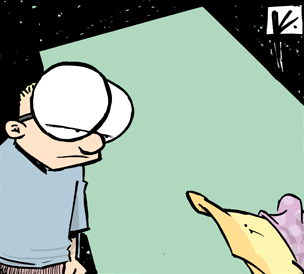 KELLETT:
KELLETT: I take your meaning. First of all, it's worth acknowledging it can happen. It's happened a couple of times in comics. Both in magazine cartooning and newspaper cartooning. It's probably already happening in webcomics. How you avoid it, is that the magic thing about webcomics is that there are no gatekeepers. So you have this constant opportunity for success going to a new voice and a comic that's never been done before. If you had asked me, "Hey, Kate Beaton's history comics. Is that going to go?" I would have gone, "No. No." But she's brilliant and that voice she has is so unique that now you're like, "Of course that work does well and has a massive audience." The same is true for all sorts of different comics. The
Unshelved library comic strip; I never would have guessed before I knew and saw their audience how massive and passionate a library audience could be for a comic strip. So I think what's happening is that sure, a lot of people might go, "Hey,
Penny Arcade is doing video games. That is what I should do." But if you're not writing from where your passions are, it's only going to last for a few years anyway. But, the flip side of that is that the people that truly write from a place of passion and interest, a Kate Beaton or a Meredith Gran or a Karl Kerschl, you might see a format you wouldn't think would work for webcomics, but it's brilliant. So that's the saving grace for webcomics, I think. Because there are no gatekeepers, people are allowed to follow their passions. That means 100 failures to every success, but that one will be new and different.
SPURGEON: We always talk about these things as if they're brand new. You've been around 15 years, which is the length of a standard syndication contract plus a first option period. And in Internet time, that's a billion years. I certainly get my information on-line differently than I did in 1998. What is it about comics that allows you to have a continuity in the way they're distributed and consumed that doesn't apply to other media?
KELLETT: Here's the criticial difference. It's a thing that people with a tradition from print comics never grasp at first. Webcomics is never a zero-sum game. For me to succeed,
Ryan North doesn't have to fail. For me to make a great year of profit,
The Oatmeal doesn't have to fail. What that means is, how I weather the storm, is that because of this I can be absolutely open with my peers and friends as to what is working or not. You would never have the head of DC calling up the head of Marvel and saying, "Let me tell you, these crossovers we're doing are really working. You gotta try it." But in webcomics you have that all the time. You have friends and peers that will say, "Guys, XYZ isn't working as a business model. But I'll tell you what is working. YZX." That helps us collectively weather the storm because none of us are in direct competition in a way that surprises people from a print model.
So you can have a rising tide of information that lifts a lot of careers.
SPURGEON: You have an immediate peer group with whom you share information like that.
KELLETT: Absolutely. It's both at shows and constantly through other ways that peer groups talk to each other: e-mails, forum postings, all sorts of stuff. For example, you'll see a ton of webcomics over the next six to 12 months trying
Patreon. It's a new version of Kickstarter. It has the potential to be a game-changer as to how webcomics work, and because some of the initial reports from some of the webcartoonists is them saying, "Hey, holy crap, this is really working" you'll see more and more cartoonists trying it.
That's what keeps us afloat. Six years ago we would have said, "Self-published books are really working as a business model." Or "Shirts have a tremendous profit margin." Or "Do this kind of advertising." That passing along of information keeps entire careers afloat.
SPURGEON: I'm interested in the creative aspect of that. The strip form has remained sturdy for you.
KELLETT: Look at it in terms of output. If I was producing a page a day, or if I was producing a mini-story a day, it would be untenable. But with the strip format, the beauty of it is that you can produce a strip a day. It's just enough of a snippet of a world that people will keep coming back day after day and finding it satisfying. I tip my hat to the people at the turn of the century that figured that out, because it's a great format for a story on a regular basis.
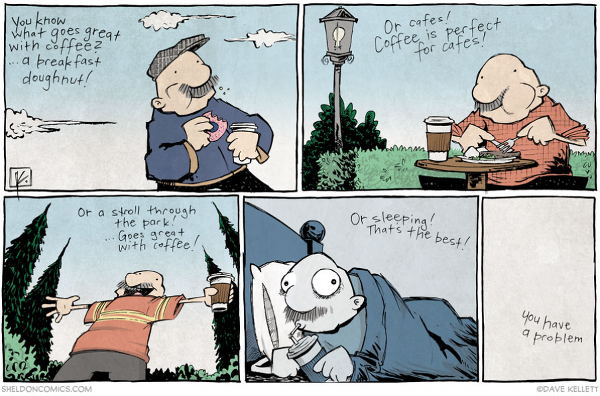 SPURGEON: How are you a different artist now, Dave? It seems like you have more control over your line? How would you describe your own artistic growth?
SPURGEON: How are you a different artist now, Dave? It seems like you have more control over your line? How would you describe your own artistic growth?
KELLETT: I guess that I'm learning. I don't want to be falsely humble and say, "Oh, I'm no good." But I think I'm definitely better than where I was. That's no different than anyone else's career. I often think I'll be really good in about ten years. I think that's a universal for any artists that you'd ask. When the film is done -- I feel like I've been coasting a bit since the film has been going on -- I want to experiment a lot more, especially with
Drive. I think there are different ways I can draw now. I'm excited to get back to it when the film is done.
SPURGEON: You mentioned this earlier. How do you avoid the tyranny of your audience?
KELLETT: That's a great question. That's a really great question. It's hard to do, especially when this becomes your living. That's why ultimately I have to write for myself. If I don't, the spark is gone because I'm writing for somebody else's strip. I'm writing for tens of thousands of people embodied in an imaginary person. I'm not writing for me. That's why I was saying the beauty of the comic strip is that no individual strip is make or break. I can write a strip where the joke is very personal and makes me laugh, and know that five people -- maybe -- will like it. But I don't care, because I needed to write that one on my way to write a strip that will appeal to a broader audience. But it's hard, because who doesn't want to be loved in this world? So of course you want adulation and praise, but you have to be careful to write for your own joy, your own sense of humor.
SPURGEON: What's the difference for you between the 70 percent that work and the 30 that don't, then? When something works, what is that like on the page that makes it different from one that doesn't?
KELLETT: For different styles of jokes, it can be entirely different things. For one, there are times where you think you've written a punch line in your last panel but actually what everybody loved was the physicality you drew in the second panel. And you didn't even know that is where the humor was. Sometimes the joke is accidental, even to the cartoonist. If you're truly good, and this is one of the reasons why [Bill] Watterson was brilliant, and why [Charles] Schulz was brilliant, is that they had many legs under the table. If the writing couldn't support it, then the art could support it. And if the art couldn't support it, there was something structural in the strip that made it more beautiful to look at. I think if you do enough of those, you're doing all right as a cartoonist. Where the 30 percent don't work is usually where you don't have enough legs under the table. You either phoned it in on the art, or the writing needed to or three more passes, or the punchline wasn't strong enough and you didn't realize it. Or it's too inside baseball a joke. There's a billion reasons why, but when it comes down to it, it's that there wasn't enough legs under the table.
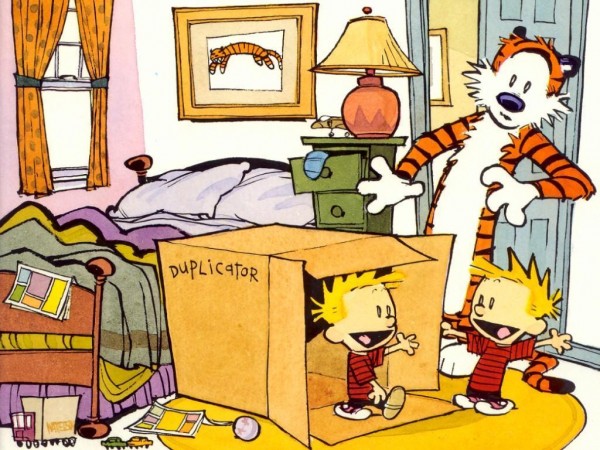 SPURGEON: I wanted to ask you a Watterson question -- not about his involvement with your film, which I think will be a big part of how you roll this film out and will likely be pretty well-covered in feature articles. I thought you used his responses well and that you earned his trust. His statements are interesting, too, but that's not really a surprise since he was always a fine thinker about comics. I'm more interested in the reason why people will be interested in him being in your film, in the fact that he appeals to two entirely different generations of kids that read his work. People my age and people in their 20s seem equally interested in his work, and maybe even more so now that he's been gone for a while. As a fan, and as a fellow cartoonist, and as someone who thought enough of him to try and get him on the record about some things, what do you think the nature of his appeal is? Why so much passion for him?
SPURGEON: I wanted to ask you a Watterson question -- not about his involvement with your film, which I think will be a big part of how you roll this film out and will likely be pretty well-covered in feature articles. I thought you used his responses well and that you earned his trust. His statements are interesting, too, but that's not really a surprise since he was always a fine thinker about comics. I'm more interested in the reason why people will be interested in him being in your film, in the fact that he appeals to two entirely different generations of kids that read his work. People my age and people in their 20s seem equally interested in his work, and maybe even more so now that he's been gone for a while. As a fan, and as a fellow cartoonist, and as someone who thought enough of him to try and get him on the record about some things, what do you think the nature of his appeal is? Why so much passion for him?
KELLETT: Can I back up and take a broader view first?
SPURGEON: Of course.
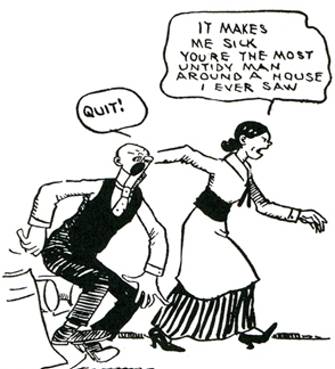 KELLETT:
KELLETT: I was -- for lack of a better phrase -- a student of cartooning. I did two master's degrees in comics history at
UCSD and
University of Kent in England. When I was in England, I was a junior assistant art curator in their archives, whatever my title was. Basically a junior archivist. And it was really helpful to me as a cartoonist to hold forgotten strips' originals in my hands and see how poorly the average comic's writing ages. It's kind of a version of why those 30 percent of strips don't work. If you take a comic out of its age, and try to have it communicate to people 50 years on, so many of them fail. Right?
The Gumps or
Mutt & Jeff were massive hits of their day, blockbusters that made millionaire cartoonists. But if you ask the average person on the street now? Never heard of them. Never read them, never seen them, never even heard the titles.
SPURGEON: I find the one that's happening to now is Pogo
. That's faded from appreciation over the last 20 years, I think in part because it's very specific to its time.
KELLETT: The same thing will happen to
Bloom County. I am aware as a cartoonist that my own work will fade very quickly from history. I'm OK with that. But one of the things that I think Watterson did so brilliantly, and Schulz to a similar extent, is that they wrote for timelessness. Watterson almost never had a reference that couldn't be inferred 30 years from now, 100 years from now. I haven't asked him about it, but I think that was a rational choice from day one, to have a timelessness about what the characters were talking about, the world they inhabited, and what they were doing. Calvin's average playdate was to be up in a tree or making mud pies or playing an imaginary game of football, right? There was never a joke about
Dr. Who or
Star Trek or even a product -- there's never a brand. And so much of today's humor is based on that kind of thing. It's the same as when I would read comics in that archive from 60 to 70 years ago and think, "This doesn't land at all." I think one of the reasons why Watterson will succeed for generation after generation, and maybe for a few hundred years, is that he wrote for a timelessness. Because it's sweet, and because the philosophy is also timeless, I think it will hit for years to come.
SPURGEON: Remind me what the next step is with this movie. You may take the reins yourself, so what does the next six months hold?
KELLETT: Pixar has invited us up to show it to them. We'll show it to the whole studio up there. I'm excited/vomiting thinking about it. Out of nervousness. But that'll be purely for fun. And because it's not set yet we'll be figuring out the best way -- probably digitally -- to get it out to people. Whether that's a service like iTunes or a short theatrical tour we control -- that's called four-walling -- we're going to be nailing that down the next few weeks: a first quarter release to the world.
*****
*
Dave Kellett
*
Sheldon
*
Drive
*
Stripped
*****
*
Sheldon panel I like
* promotional image for
Stripped
* the book in question
* a big panel from
Sheldon
* Gillray
* Kerschl
* two from
Drive
* two from
Sheldon
* Watterson
* from
The Gumps
* a page from
Drive that I love because it's just drawing spaceships (below)
*****
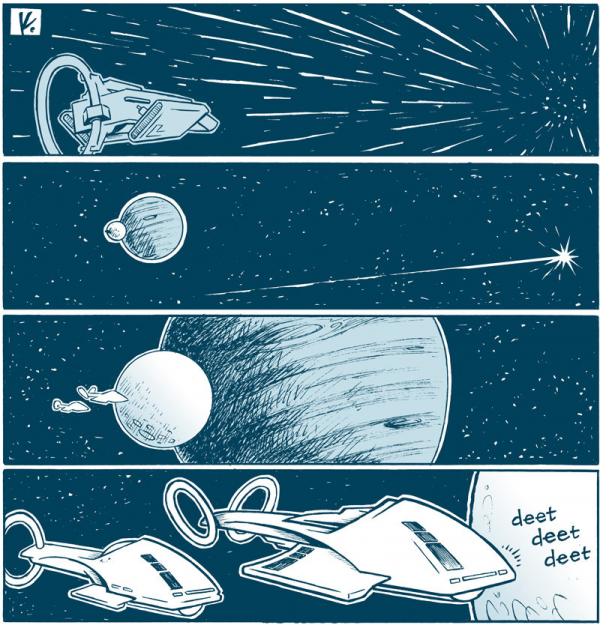
*****
*****
posted 4:00 pm PST |
Permalink
I Love Going To The Comic Book Store
 Fantasy Comics, 2595 N 1st Ave, Tucson, AZ 85719, 12-21-13
Fantasy Comics, 2595 N 1st Ave, Tucson, AZ 85719, 12-21-13






 photos by Whit Spurgeon; I've never seen a copy of that
photos by Whit Spurgeon; I've never seen a copy of that Romita Legacy
book -- long story, all my fault -- so it's funny that I missed it again even as my brother didin't
*****








 cost: somewhere around $34 or so, I can't remember
cost: somewhere around $34 or so, I can't remember
*****
*****
posted 3:55 pm PST |
Permalink
Go, Look: Christmas Beware

 posted 3:30 pm PST
posted 3:30 pm PST |
Permalink
Missed It: Society Of Illustrators Putting Together A Comic And Cartoon Art Annual Via Competition

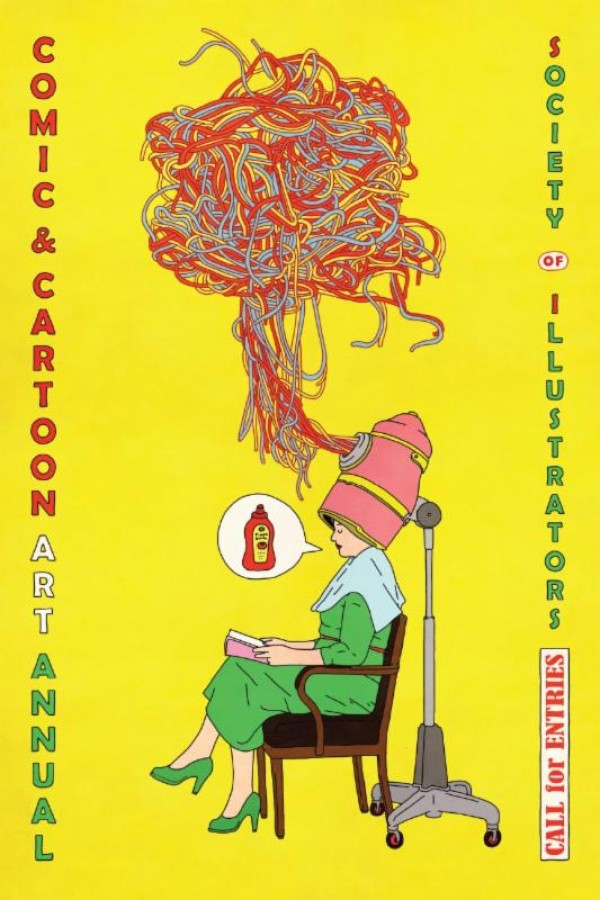
I don't know how these kinds of things work in general, and I sure as heck don't know how well one will work for comics and cartoons, but the Society Of Illustrators has announced they're doing a juried competition for both static and moving cartoon-related art. Plans for what to do with contest entries/winners include a catalog, a summer-showing at the Society, an awards gala where medals and certificates will be given out, and then a tour of 40 works in an educational traveling show.
Here's all the information, including fees for submission:
ABOUT THE COMIC AND CARTOON ART ANNUAL
As we strive to expand our mission of promoting the understanding and appreciation of comic and cartoon art, we are proud to announce the first Annual Comic and Cartoon Art Competition.
This juried competition will result in an exhibition that will showcase the most outstanding works created in this genre throughout each year.
The original works will be exhibited in the MoCCA Gallery at the Society of Illustrators from May 28 through August 16th, 2014.
Opening Award Galas will be scheduled where Medals and Certificates will be presented to the artists whose works are judged best in each category.
All accepted entries will be reproduced in a full color catalog. This catalog will present not only the year's finest works, it will also include commentary by the artists, who explain their creative processes in their own words.
A selection of 40 works from each Exhibition will then tour colleges throughout the country in an educational traveling show, a tradition that we have had at the Society for over 30 years.
CATEGORIES
Long Form: A work that is longer than 40 pages. Includes graphic novels, comic books, etc.
Short Form: A work that is shorter than 40 pages. Includes stand-alone work, zines, comic books and work that has been published in anthologies.
Special Format: Work that is design-driven and created with special attention to production values, including limited edition, small press, hand-made and artist's books.
Digital Media: Work that is native to a digital format. Includes web comics, online comic strips, and other digitally driven works. Up to 20 images accepted per entry.
Comic Strip: A short-form work published in newspapers, magazines, books, online, etc. featuring four or more panels.
Single Image: Work featuring a self-contained narrative image with or without caption. Includes gag cartoons, political cartoons, single-panel cartoons, etc.
Moving Image: Motion graphics and animations (including gifs) intended to be shown on computer screens and tablets and created for apps, ebooks, digital versions of magazines, etc. Must use .mov files to upload through the website. Email links for other formats to .(JavaScript must be enabled to view this email address)
------------------------------------------------------------------------------------------------------
HOW TO ENTER LONG FORM & SHORT FORM BOOK SUBMISSIONS
Eligibility: Any book that was created from January 2013 -- January 2014. Both published or self-published are accepted. International entries are welcome. Each submission will receive consideration by every member of the jury for its category.
How to enter: Mail 6 copies of the publication to the Society of Illustrators: 128 East 63 Street, New York, NY, 10065. Attn: Comic and Cartoon Art Competition. Must include the official entry form with each copy. Download the form here.
DEADLINE: Monday, February 3, 2014.
Entry Fees For Book Submissions:
$30 per entry (includes all six copies) for non-members of the Society of Illustrators.
$20 per entry (includes all six copies) for members of the Society of Illustrators.
Include a check with the entry. Checks made out to Society of Illustrators.
------------------------------------------------------------------------------------------------------
HOW TO ENTER SPECIAL FORMAT SUBMISSIONS
Eligibility: Any work that was created from January 2013 - January 2014. Both published or self-published are accepted. International entries are welcome. Each submission will receive consideration by every member of the jury for its category.
How to enter: Mail 1 copy of the publication to the Society of Illustrators: 128 East 63 Street, New York, NY 10065. Attn: Comic and Cartoon Art Competition. Must include the official entry form with each copy. Download available here.
DEADLINE: Monday, February 24, 2014.
Entry Fees For Book Submissions:
$30 per entry for non-members of the Society of Illustrators.
$20 per entry for members of the Society of Illustrators.
Include a check with the entry. Checks made out to Society of Illustrators.
---------------
HOW TO ENTER ONLINE SUBMISSIONS FOR DIGITAL MEDIA, COMIC STRIP, SINGLE IMAGE SUBMISSIONS
Eligibility: Any work that was created from January 2013 - January 2014. Both published or self-published are accepted. International entries are welcome. Each submission will receive consideration by every member of the jury for its category.
How to enter:
Submissions accepted at www.soicompetitions.org. Images must be 1000 pixels on the longest side, RGB, JPG.
DEADLINE: Monday, February 24, 2014.
Entry Fees:
$30 per entry for non-members of the Society of Illustrators.
$20 for members of the Society of Illustrators.
Pay online or mail a check. Checks made out to Society of Illustrators.
------------------------------------------------------------------------------------------------------
HOW TO ENTER MOVING IMAGE CATEGORY
Eligibility: Any work that was created from January 2013 -- January 2014. Independent projects and international entries accepted. Each submission will receive consideration by every member of the jury for its category.
How to enter:
Submissions accepted at www.societycompetitions.org. Mov files only. For other formats including gifs please email links to .(JavaScript must be enabled to view this email address)
DEADLINE: Monday, February 24, 2014
Entry Fees:
$30 per entry for non-members of the Society of Illustrators.
$20 for members of the Society of Illustrators.
Pay online or mail a check. Checks made out to Society of Illustrators.
I guess there are a few news angles here. One is that this marks the Society Of Illustrators' further commitment to folding comics and cartooning more explicitly into what they do. I have to imagine that scoring a place in such a show -- in addition to just "winning" something, which is still rare enough in art that people seem to super-enjoy it -- could be something that goes on the resume for all sorts of potential auxiliary work. I have very little experience with this kind of thing save for one standard-illustration friend for whom placing in competition was a career boost simply in terms of his work being seen. Coimcs has a more aggressive sorting mentality than that field did at that time, though. It's interesting to think there are things like this now and we should see a mad scramble for this kind of institutional and process recognition over the next three years.
posted 3:25 pm PST |
Permalink
Go, Look: Bucky Ruckus

 posted 3:20 pm PST
posted 3:20 pm PST |
Permalink
If I Were In Charlotte, I’d Go To This

 posted 3:15 pm PST
posted 3:15 pm PST |
Permalink
Not Comics: Franklin Booth Christmas Imagery

 posted 3:10 pm PST
posted 3:10 pm PST |
Permalink
Random Comics News Story Round-Up


* this book was in my family's dining room, on the tea tray, which was never used for tea but instead housed all of the coffee table books because any coffee table book on the coffee table would last about two weeks before becoming pulp and glue. I don't think my parents understood much about Steinberg -- I still don't -- but the drawings were cool and clever and bore repeat viewing as they and I would periodically struggle to figure out what was going on: View Of America From A 1970s Suburban Home Tea Tray.
*
Christmas evil.
*
Noah Van Sciver will draw you.
* James Romberger talks to
Paul Kirchner. Mark Frauenfelder talks to
Ruben Bolling and Vanessa Davis. Robin McConnell talks to
Jesse Reklaw. Alec Berry talks to
Mardou.
*
Chris Schweizer populates HP Lovecraft.
* the cartoonist
Nate Powell is recognized as an Arkansan working in entertainment in a prominent way in 2013.
* Todd Klein on
Astro City #5. Whit Taylor on
Strong Eye Contact and
Mimi and The Wolves Act I: The Dream.
* finally, the great RC Harvey
profiles George Baker and
Sad Sack.
posted 3:05 pm PST |
Permalink
Happy 53rd Birthday, Phoebe Gloeckner!

 posted 3:00 pm PST
posted 3:00 pm PST |
Permalink
Happy 57th Birthday, Bill Willingham!

 posted 3:00 pm PST
posted 3:00 pm PST |
Permalink
Happy 62nd Birthday, Tony Isabella!

 posted 3:00 pm PST
posted 3:00 pm PST |
Permalink
December 20, 2013
 CR Holiday Interview #04—Brian Cremins
CR Holiday Interview #04—Brian Cremins


I met
Brian Cremins this fall in Columbus, Ohio, where it was my honor to introduce his paper on
Pogo. I was intrigued by his thesis that
Walt Kelly was writing as much about his beloved Connecticut home town and its now-lost early 20th Century glory days as he was any more widely-accepted culprit on the map of the United States. I found him engaging in person as well. Cremins is one of a growing group of comics academics between 35 and 50 years old that are as comfortable negotiating the public sphere in which comics exist as they are theory and jargon. I asked him to join me here to talk about elements of his work and the changing world of comics academia, and was happy when he accepted. As much as I've benefited from their work, I know very little about what scholars with a focus on comics actually do. -- Tom Spurgeon
*****
TOM SPURGEON: Brian, before we get into some basic biographical information, I was wondering if you could talk a bit about the academic conference we both attended at the front of the Billy Ireland Cartoon Library & Museum opening weekend. First, could you walk through how you approach a conference like that? Like really basic stuff. You hear that this is going to happen, and you think of presenting why, and how do you determine what that might be, and what do you hope to get out of it?
BRIAN CREMINS: Before I get started, let me thank you again for asking me to do this, Tom. It's been fun to work through these questions with you, and thanks also for sending the follow-ups. Let me apologize in advance for being long-winded, but I figure that, since I tell my students to read the directions and to answer questions as thoroughly as possible, I need to follow my own advice!
SPURGEON: There is no such thing as a long-winded CR
Holiday Interview.
CREMINS: Generally an academic conference will make a very broad call for papers, but the CFP for Columbus made a few specific suggestions -- like papers about
Charles Schulz and Walt Kelly.
Kerry Soper, who just published a great monograph on Kelly and
Pogo, and I had been corresponding over email, so I asked if he'd be interested in putting together a Walt Kelly panel. 2013 would have been Kelly's 100th birthday, so a panel on his life and work seemed like a great idea for the academic conference that opened the Festival.
Once I submit a proposal for a conference, it's usually two months or longer before I get a response. Sometimes I'll submit an abstract based on a paper I've already published, as in the case of the article on Edie Fake's
Gaylord Phoenix I presented at
Michael Chaney's
Dartmouth comics conference in the spring. I was in the process of writing that essay for the
Journal of Medical Humanities when I saw Michael's CFP. I adapted some of the material I already had, added some material on Kane and Spider-Man's adventures in the Savage Land, wrote an abstract, and submitted it.

For the OSU paper, I started with the Kelly essay I'd published in Brannon Costello and Qiana Whitted's collection
Comics and the U.S. South in 2012. I took a look again at that one, which I'd started writing and researching in 2008, and discovered that my ideas had changed significantly.
Since I'm in the middle of writing a book about the Otto Binder and C.C. Beck's run on Captain Marvel, I felt very distant from the Kelly research, until I realized that the issue of nostalgia -- and the theories of nostalgia I've been reading in the work of
Svetlana Boym and
Susan J. Matt -- are also present in Kelly's work.
I still struggled with what I wanted to say until we visited my parents in Connecticut and I had the opportunity to work in the clipping files at the
Bridgeport History Center in Kelly's hometown. As I read the newspaper reports from the
Bridgeport Post, and Kelly's Barnum series from the early 1930s, I had a new idea for my paper. Without that trip, and without that drive from Waterbury to Bridgeport through the Naugatuck River Valley, I don't think I could have written this new essay on Kelly. I needed to be there to understand why he writes so affectionately about his childhood in Bridgeport.

As other academics and artists will tell you, conferences are a good way to see old friends. At its best, a conference is also an introduction to new ideas, or books, or artists, or writers, or theories. I know I've been to a great conference when I get home and I'm still taking notes, still thinking about the people I'd met and considering their ideas. The Billy Ireland Festival this year was one of those conferences. When I got back to Chicago, I bought a copy of March, because I remembered Qiana's paper, and I was reading
The Eternals again because
John Jennings had shown all his Kirby remixes during his talk, and I was looking at Eisner because of James Vance's talk. Those are just a few examples.
 SPURGEON: Until this year, I haven't done one of those since 1997 or so, one of the ICAFs in the room above the Holiday Inn conference room where they had SPX. I assume you've been doing these a while in some form yourself. Two things I noticed is that there seems to be a post-TED talk approach to visuals and dramatic presentation style, but it also seemed to me -- and this just might be that particular event -- more open to independent scholarship and maybe more something that a general audience could understand. Can you talk about how they've changed? Will that continue, do you think?
SPURGEON: Until this year, I haven't done one of those since 1997 or so, one of the ICAFs in the room above the Holiday Inn conference room where they had SPX. I assume you've been doing these a while in some form yourself. Two things I noticed is that there seems to be a post-TED talk approach to visuals and dramatic presentation style, but it also seemed to me -- and this just might be that particular event -- more open to independent scholarship and maybe more something that a general audience could understand. Can you talk about how they've changed? Will that continue, do you think?
CREMINS: Since my Ph.D. research was focused on early African American film, I'm accustomed to the use of technology at academic conferences, although in the late 1990s, when I first started presenting at places like the American Literature Association, we were using VHS tapes and praying that we'd synced them correctly before we got on the plane! My very first comics-oriented conference was the Popular Culture Association in Toronto in the spring of 2002, which, to this day, is still one of the most memorable conferences I've ever attended.
Gene Kannenberg had invited Thierry Groensteen as a keynote speaker on
Martin Vaughn-James' The Cage, and we all did field-trips to The Silver Snail and to The Beguiling. I walked into The Beguiling and there's Joe Matt, Seth, Chester Brown. "They really do hang out together," I remember thinking. It was like stepping into one of their
posted 4:00 pm PST |
Permalink
Go, Look: The Galaxy Magazine Christmas Covers

 posted 3:30 pm PST
posted 3:30 pm PST |
Permalink
CR Week In Review

 The top comics-related news stories from December 14 to December 20, 2013:
The top comics-related news stories from December 14 to December 20, 2013:
1. The deadline
passes for New York based DC Comics employees making the decision whether or not to relocate to Burbank.
2. Two
horrible and
outsized acts of harassment throw an end-of-year spotlight on of the comics community's lingering and egregious problems.
3. Stumptown, one of the original artist-directed small press festivals,
ends its stand-alone event orientation for a partnership with Rose City Comic-Con and a focus on its non-festival programs.
It takes four days for a festival to be announced that same weekend -- a spiritual replacement at best, for the small size of it, but very much its own show with a potentially bright future.
Winner Of The Week
Karen Green
Loser Of The Week
Let's say
Shia LeBeouf and his rampant plagiarizing here because I have no place to put him.
Quote Of The Week
"I had the normal trajectory for my generation: superhero stuff (mostly Marvel), then slowly losing interest in that whole deal. Still loving comics, but not getting what I wanted out of them. I've told this story too many times (that might happen a lot during this), but at the moment I was about to give up, I ventured into the back room "smutty" section of the comic store, and picked up two comics:
Love and Rockets #20 and
Yummy Fur #1, and my life changed. It really was one of those moments -- everything changed, right then and there. Something I thought I knew about comics, but had never really seen with my own two eyes -- that they were real art -- that was now
real. I had proof. You could do anything with them." --
Zak Sally
*****
today's cover is from the all-time series Classics Illustrated
*****
*****
posted 3:25 pm PST |
Permalink
If I Were In Charlotte, I’d Go To This

 posted 3:20 pm PST
posted 3:20 pm PST |
Permalink
If I Were In Minneapolis, I’d Go To This

 posted 3:20 pm PST
posted 3:20 pm PST |
Permalink
Not Comics: Norman Rockwell Christmas Illustration

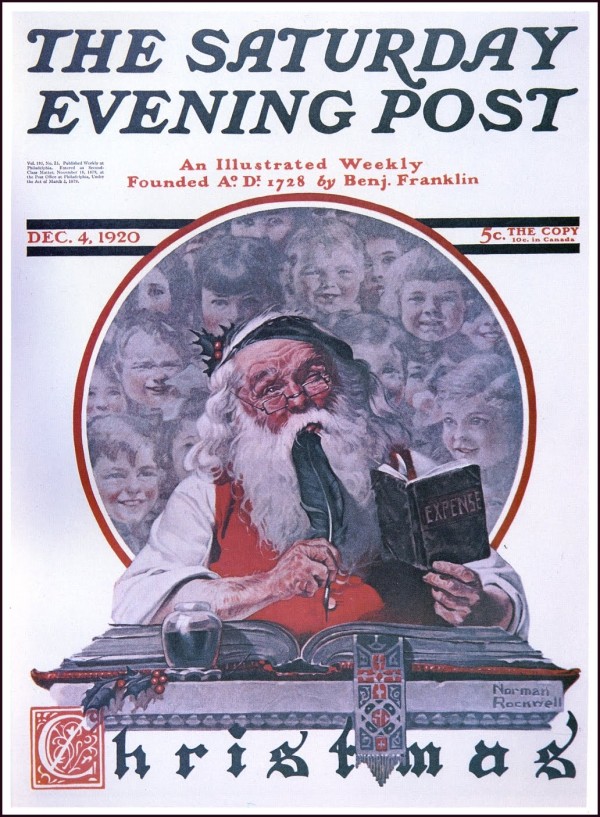 posted 3:10 pm PST
posted 3:10 pm PST |
Permalink
Random Comics News Story Round-Up

*
Gipi, Gipi, Gipi.
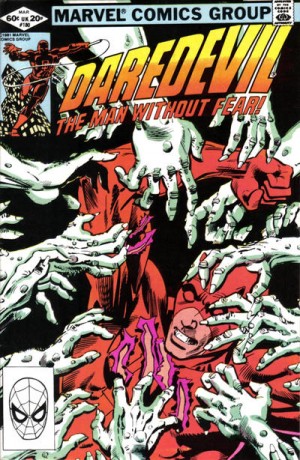
* a big part of my growth as a comics reader in the 1980s was reading the best superhero comics being done.
Daredevil was one of the few titles that my brothers and I did not collect at one time or another. When we heard -- and I have no idea how, exactly -- that the title had become good, we used the local used books stores to dig up the Miller run-to-date. Those comics were a lot fun. They were very much of their time in that a lot of their juice comes from a constant risk of death in a way that provided a strong contrast with the threat level present in other comics.
*
the writer Neil Gaiman went to look at the Sandman art at Cartoon Art Museum, and there was press on hand to cover it.
* I was entertained yesterday afternoon by some art on-line: Matt Kish's
collected portraits of Nazgul, Ethan Rilly's cover for
Taddle Creek, and "
Chief O'Brien At Work."
* Addie on
Fairy Tale Comics. Rob Clough on
Mineshaft #29. John Kane on
a bunch of different comics. Andrew T on
The Furry Trap. Sean Gaffney on
Sunshine Sketch Vol. 7.
*
I'm not sure I'd seen this review of The Massive in comic form.
* finally,
The Seattle Weekly runs a profile of the Intruder cartoonists. It's probably worth noting that the article indicates this is a new feature at the
Weekly.
posted 3:05 pm PST |
Permalink
Go, Look: Classic Comic Book Christmas Covers

 posted 3:00 pm PST
posted 3:00 pm PST |
Permalink
The Comics Reporter Video Parade
 James Romberger At The Kirby Pop-Up Museum
Michael Ramirez Speaks
The Bartoonist
Lynda Barry At The National Book Festival 2013
via
In Conversation With Cartoonists
An Interview With Ann Telnaes
posted 2:00 pm PST
James Romberger At The Kirby Pop-Up Museum
Michael Ramirez Speaks
The Bartoonist
Lynda Barry At The National Book Festival 2013
via
In Conversation With Cartoonists
An Interview With Ann Telnaes
posted 2:00 pm PST |
Permalink
December 19, 2013
 CR Holiday Interview #03—Geneviève Castrée
CR Holiday Interview #03—Geneviève Castrée

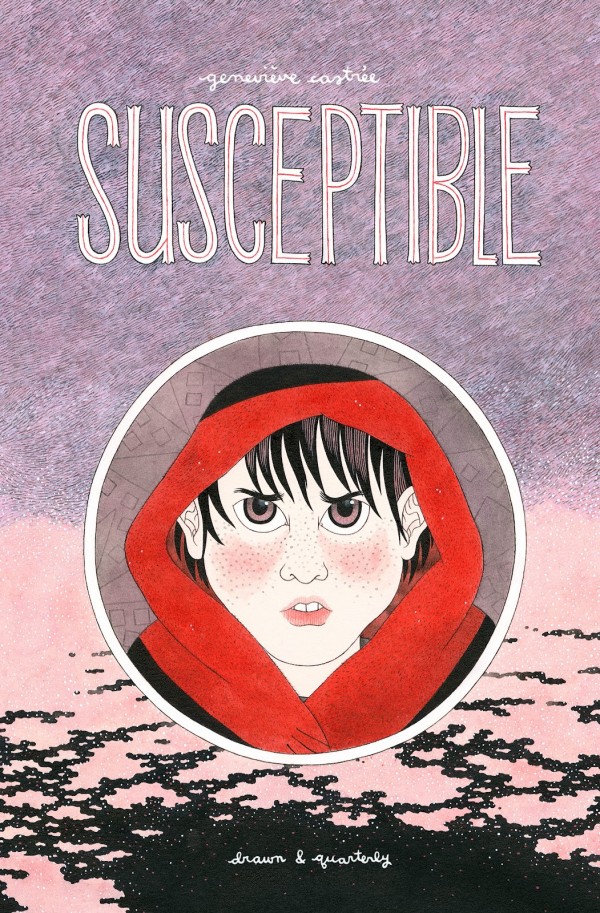
*****

I thought
Geneviève Castrée's book
Susceptible was one of the strongest releases of 2013, and I am delighted that she acquiesced to speak with me about it. I hope after reading what follow that maybe one or two of you that hasn't yet will buy the book or at least make sure it gets on your general comics-reading radar.
Susceptible is the story of Castrée's childhood with a specific focus on her relationship with members of her immediate family. Like many of the best memoirs,
Susceptible offers up wave after wave of specific detail that both distinguishes and universalizes her youthful experiences. It also sports one of the best endings of any book this year. The native Canadian artist, musician and cartoonist lives in
Anacortes, Washington -- a small town north and west of Seattle. I was very excited to talk to her and any small mistakes in the transcript below can be attributed to my nervous interjections over something Castrée said. I also tweaked a few words of my own speech for flow. -- Tom Spurgeon
*****
TOM SPURGEON: You have to be through most of the cycle with Susceptible
at this point, it having come out several months ago. Are you happy with the way the book was received?
GENEVIÈVE CASTRÉE: Yeah! Yeah, I'm happy. I would say that maybe I'm not even at the end of the cycle. Like maybe I'm at the beginning of the next one.
The weird thing I never thought about when I did that book was just like all of a sudden I spent nearly one year of my life talking about it, and that was weird. You finish a book and you think you're done with something and next thing you know... you're done with it but other people are just starting! [laughs] That was just... of course I should have known better, but I never imagined that way into October I would still be talking about it because of the German translation, still be giving the talk I was giving back in February. People still asking me questions like, "How did your family react?" [laughs]
SPURGEON: Did your perspective on the book change for having to talk so much about it?
CASTRÉE: Oh, yeah. Totally. It was this thing that... I used to be haunted by these stories. Then I told them in this book version and got over it pretty quick. I had these stories that just followed me around for... I don't know, almost 15 years of my life if not more. I found myself to be just like, "Oh, man..." To me these stories were so old, but for other people they were new. Then I had other people's insight and I just often felt like, "Well, it was not that bad..." [laughs] People are discovering them and they're like, "Whoa, that's intense!" [laughter]
SPURGEON: You've talked about Susceptible
in terms of the longstanding offer you've had to do something with Drawn And Quarterly, an offer Chris Oliveros extended to you years and years ago. But I'm not really sure that I know the impetus for you turning all of these memories into a book when you did. If there was a triggering incident. You've said you've had all of these memories and stories for all of these years, but what was the impetus that took you to, "I would like to do a book now," where you knew that it was going to be this lengthier work you'd been avoiding and that this is the one that was going to go to Draw and Quarterly.
CASTRÉE: It kind of was a series of events. And also it was this thing that I kind of felt like a bit of a mess of a person. I had this longstanding invitation and I wasn't doing anything with it. It had been really hard for me to make something more concrete and more to the point than anything else I had made before. I was wondering what was up with that. [laughs] I felt like I was always telling the same story over and over. It got to me. I had a series of bad depressions, and I just thought, "Fuck this. I'll just get rid of this story once and for all. And move on." It was good.
It was also the realization... I don't read a lot of autobiographical comics. I think some people are really good at it. I'm a big fan of
Chester Brown's way of telling autobiographical stories, for instance. But I also felt like, "Oh, yeah, I don't want to make another boring book where not much happens and there's a 'poor me' feeling." But then I thought maybe that what happened to me when I was a kid were interesting in a way that didn't necessarily happen to that many people, or again, that happened to some people but no one has made a book about this type of family before.
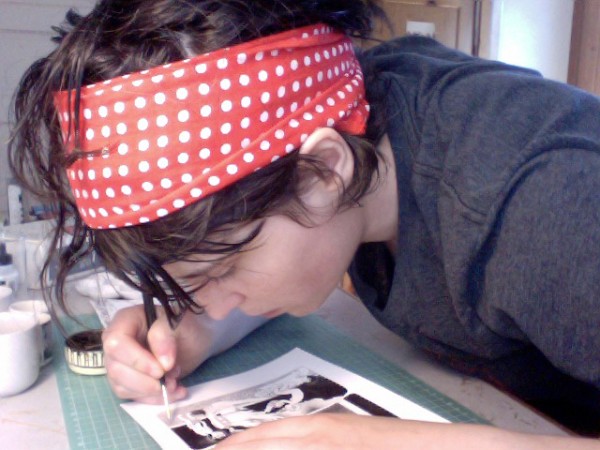 SPURGEON: You're at a very specific place in your life as an artist, too. You've worked in different disciplines. I wonder if there was something about the nature of the work you were doing that made this book easier to do now? For instance, there's the idea that performing makes it easier to do confessional narrative. Do you feel like you maybe you had skills now that you might not have had earlier on that were applicable to doing this kind of work?
SPURGEON: You're at a very specific place in your life as an artist, too. You've worked in different disciplines. I wonder if there was something about the nature of the work you were doing that made this book easier to do now? For instance, there's the idea that performing makes it easier to do confessional narrative. Do you feel like you maybe you had skills now that you might not have had earlier on that were applicable to doing this kind of work?
CASTRÉE: Yeah. Of course. It's this weird... I think I'm the type of person that will be terrified of riding a bicycle -- I'm just using that as an example, this is when I was six or seven or something -- or terrified of learning to do something new and then getting on the bicycle and falling down
because you're terrified. And then one day you figure it out, and then a week later you're really good at riding your bicycle. [laughter] I think it was a little bit like that. I was scared of trying to do this... my other stuff before was more imaginative and not based on reality, so I was scared of actually addressing facts and things that were real, true stories. Then I went ahead and tried it out and once I got the hang of it I felt really comfortable.
SPURGEON: Did you have a support system during the creative process? Were you running events or ideas past anyone? Did you have an editorial process in terms of the making of the book, even, with Chris or anyone at D+Q? Or were you in the classic comic sense kind of left alone... maybe you even preferred to work alone on something like this. What was your support system like?
CASTRÉE: I really prefer to work on my own. I didn't have any input from my publishers that was like, "Maybe you should do it this way." I didn't have any of that. I was working simultaneously with
Jean-Cristophe Menu who was my French publisher and with
Chris Oliveros who was my English publisher. I would wait a really long time and not show them anything [laughs] and then I would send 20 pages or something. Both of them would give me feedback, but didn't give me the type of feedback that would change my way of going about it. They were very supportive, both of them.
I adore my publishers. I adore Jean-Cristophe and I adore Chris. I also have a very good relationship with my publisher in Quebec at
L'Oie de Cravan. I haven't worked with them for a while. For this book I felt supported in a way that I felt trusted.
SPURGEON: Now those guys are... very different. Chris and Jean-Cristophe. At least in my limited experience and by reputation. Were their notes different? Did they pick up on the same things? [Castrée laughs] I'm kind of fascinated you were getting notes from two such very different-seeming people.
CASTRÉE: That's kind of an interesting thing to point out, that they're very different. But actually their notes were quite similar. I mean, maybe [laughs] maybe Jean-Cristophe was being more French about it. [laughter] But yeah, I don't know, that's the thing: now I miss making a book. That's the kind of attention I prefer. It's really sweet -- I'm not saying I expect it to be the same the next time I make something, but it was really a nice way to work. It was very emotional for me to work on this stuff, but my publishers they were really understanding about it. And patient. I've talked to other cartoonists, and I don't think that many people have that kind of working relationship. So I do feel blessed.
I'm not going anywhere. I'm hoping to work with these people some more.
 SPURGEON: Was there any difficulty in the practicalities of doing a longer work? I'm not sure I know the exact size of everything you've done to date, but I think of most of your stuff from earlier as shorter, even much shorter. Were there practical considerations for you in engaging a longer piece for the first time?
SPURGEON: Was there any difficulty in the practicalities of doing a longer work? I'm not sure I know the exact size of everything you've done to date, but I think of most of your stuff from earlier as shorter, even much shorter. Were there practical considerations for you in engaging a longer piece for the first time?
CASTRÉE: I just kind of had to clear my schedule. I had to say, "No." I had to learn to say "no" to a lot of stuff that came up, like opportunities to go traveling. And actually that was nice, because that's the place I felt like I was at in my life. I guess when you -- and I'm changing the words here because I don't remember the exact words that you used -- ask if there was some sort of trigger that made me do this book, you get this existential crisis. People stereotypically get into this existential state when they're about to turn 30. And I had that. New age people around here call it
Saturn Return, and that was very much what was going on. There's a
Kurt Vonnegut quote where he says something like, "There's nothing more nostalgic than a 30-year-old." [laughter] So I was really in this place where I was revisiting... I was prompted to visit my past. That is nice. It's nice to move into adulthood and shed some of those weird, annoying things behind you.
SPURGEON: Thirty is also an age where you begin to question your career. There seem always to be vocational issues, too. Was there any of that, that you felt it was time for you to do a book, to do a longer, more considerable work? Do you even think of your art in those terms?
CASTRÉE: Yeah! Well, it's funny, and it might sound pompous or something, but I started drawing comics when I was really young. I was in my teen years when I started to make self-published comics. Then I met Benoit [Chaput] from L'Oie de Cravan, and he published my book when I was 18. I actually was this young person that had a few adults around me telling me things like, "Oh yeah, you have a bright future ahead of you" and "Oh my God, I can't imagine what you will have done by the time you're 30." And then I was 30, next thing you know. [laughter] And I hadn't done many of the things I wished I could have done.
That was a weird thing. It happens really fast. I realized how scattered I had been, that maybe -- I don't think I was necessarily aimless, but I wasn't supporting myself... I didn't do what was expected. So I felt like, "Okay, maybe this is one step in the direction of becoming more fulfilled as an artist." I already felt pretty confident about my work. The only thing is I wanted to prove to myself and to my publishers that I'm worth publishing. It's a hard time for a lot of people right now. I'm not successful in a way that there's no question whether or not people should publish me. I'm not there yet. Maybe I won't ever be there. You know what I mean. I'm not a highly celebrated and well known author. [laughs]
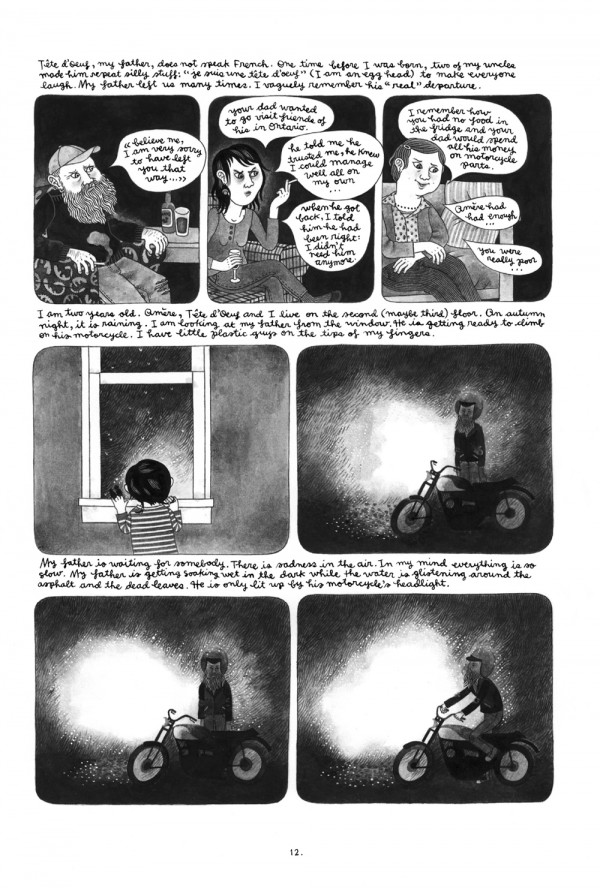
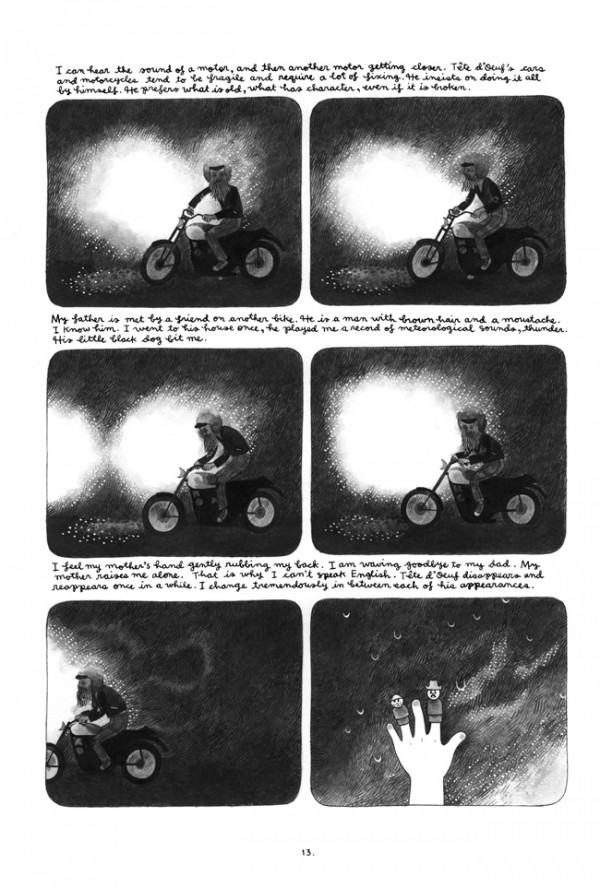 SPURGEON: I actually don't want to ask you a ton of specific questions about the work because I want people to find it on their own, but I had a few questions. Two things I thought were remarkable about the work. One was the nature and quality of the memories you present in your narrative. There's a scene where you're looking at your father on a motorcycle: it's very early on. It's astonishing that you even have a memory from that age, but it's also a really detailed memory: within the memory you remember another memory of the person that your father is meeting outside [Castrée laughs] and you remember sensory elements to where you were when you saw this. Are there flourishes provided to a rougher memory, maybe? Is that the way you remember things -- this kind of multiple-sense memory?
SPURGEON: I actually don't want to ask you a ton of specific questions about the work because I want people to find it on their own, but I had a few questions. Two things I thought were remarkable about the work. One was the nature and quality of the memories you present in your narrative. There's a scene where you're looking at your father on a motorcycle: it's very early on. It's astonishing that you even have a memory from that age, but it's also a really detailed memory: within the memory you remember another memory of the person that your father is meeting outside [Castrée laughs] and you remember sensory elements to where you were when you saw this. Are there flourishes provided to a rougher memory, maybe? Is that the way you remember things -- this kind of multiple-sense memory?
CASTRÉE: It is the way that the memory was in my mind like my whole life. I remember being a ten year old and thinking back on that moment.
I tried as hard as I could not to add flourishes to the book. There are so many things in the book that are kind of sensitive. Sensitive in this way that if I didn't tell them the right way, if I didn't tell them in the way that I remember it, it could give someone involved, one of the characters in the book, some some sort of excuse to deny the events. So I tried to stick to what I remembered and tried not to add onto it. This memory from being a kid, I know that. I know that I was looking out the window and I was like, "Oh, that's this guy. That's the guy with the little black dog." And remembering...I put it into words, but I have a very visual memory. So I remember looking out the window, looking at the motorcycles, looking at the rain. I remember thinking back at my arm that had been punctured by this little black dog that had bit me. And listening to this record with thunderstorms. [laughs] Maybe it's like... it would be so cheesy to say that, but the Proust effect like when he's eating the fucking cookie [laughs] and that thing people always talk about where he's eating the cookie and it brings on all the other stuff.
It's strange, though, because I have a very visual memory, but since I made the book one thing that I know has changed is that my memory is not so -- especially of things that happened, recent events -- my memory is not so sharp. Like I exhausted it or something. [laughter] I went too deep. I went pretty deep.
I would think of something that had happened, and I would try to write it down. Quite a few years ago, almost ten years ago, I wrote down most of these stories in a notebook. I wrote down what I remembered when I was working on the book, a couple of years ago, and I compared it with what I remembered 10 years before. That helped me, because in 10 years you can have this weird monologue with yourself. But the details were not really altered. These are sharp things... a lot of this stuff is pretty sharp in my brain. I had a timeline that I was following, too, because sometimes I wasn't sure if it was like, "Did this happen at Christmas or did this happen on my birthday?" And then being like, "Oh yeah, it happened on my birthday."
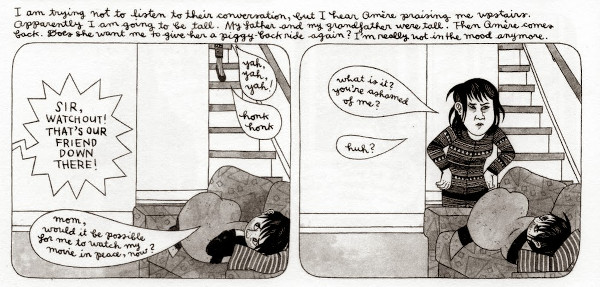 SPURGEON: The other thing I found remarkable about the book -- and this may be its defining characteristic for me -- is how non-traditional you were, at least in terms of comics autobiography, in terms of choosing not to present yourself as the vehicle through which to understand the events that happened to you. It's not "Hey, I'm screwed up... and this is why." You're very straight-forward of presenting what happened without filtering it through your present self. You don't overplay it. [Castré laughs] There's a very evenhanded tone because of that. I trust you as a narrator because you're not constantly making a case for yourself.
SPURGEON: The other thing I found remarkable about the book -- and this may be its defining characteristic for me -- is how non-traditional you were, at least in terms of comics autobiography, in terms of choosing not to present yourself as the vehicle through which to understand the events that happened to you. It's not "Hey, I'm screwed up... and this is why." You're very straight-forward of presenting what happened without filtering it through your present self. You don't overplay it. [Castré laughs] There's a very evenhanded tone because of that. I trust you as a narrator because you're not constantly making a case for yourself.
CASTRÉE: Well, it's just kind of how I feel real life works, is that there are many layers to every event. The thing about my book is that there are some things that I put in there that I didn't realize could have had a negative impact on me until I had drawn them, or written them. There's an example in the book where I go and meet my father in British Columbia for the first time. There's this moment where I go to his house and they put up a blanket to make me a room in one of the corners of his house. And he says, "Sorry -- ha ha -- as you can see, this was a house built for two people." And I just kind of laugh it off. I didn't really have any feelings like that until it was printed and I read it again. I realized that I could have interpreted that many different ways. I could have felt like, "Oh, you just assumed you'd never see me again." [laughs] "This was a house built for two people, but you do have a kid." So I think that one of the things I wanted to make sure of when I was making the book was I wanted to offer up this story of a childhood in a way that you get to choose what you think is right, what you think is wrong, as a reader. The judgment is not done for you.
On the other hand, there was kind of a part of me, and I actually have met people like that, there was a part of me that was kind of hoping I'd encounter parents who think that my parents were really cool. [laughter] Like people who think, "Man, your parents are so open-minded. Great." And it's not that extreme, but I have encountered people that have just said, "I'm so glad you talk about how it's awkward for parents that their parents smoke weed." And then they make the case for how weed should be legalized. They completely miss the point. I'm like, "Yeah, sure. Weed should be legalized." It still does not take away the fact that it's really awkward for a child when your parent is completely different all of the sudden because they went behind the garage and... [laughs] I Just wanted to leave it up to the reader.
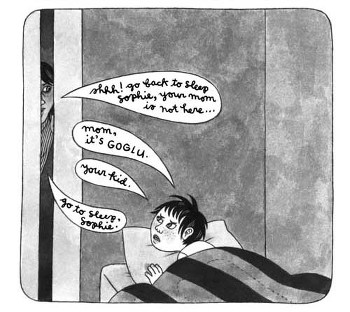 SPURGEON: In one of your interviews, you talked about how you're not sure you can report accurately what happened.
SPURGEON: In one of your interviews, you talked about how you're not sure you can report accurately what happened.
CASTRÉE: Yeah.
SPURGEON: You say that making art of your memories changes it, and then the reader's perception changes it. So you have these two automatic distortions from what happened. I think that's true, but I wonder... accuracy isn't the only purpose in making a book like this.
CASTRÉE: No.
SPURGEON: It's not the only purpose for autobiography. There are all sorts of things you might want to get out of it, all sort of specific truths that don't count on 100 percent fealty to what happened as a kind of progression of events. You must have had more than the worries of reporting things accurately, am I right? There must have been an emotional truth you wanted to convey.
CASTRÉE: I read a lot of novels. I read a lot of comics, too, but I've been reading a lot of novels as of late. And I do find comfort in reading something that I can relate to, that is similar to experiences I've had. Seeing the characters mess it up for me? [laughs] I'm very interested in human psychology. I don't read about human psychology, but I have this little -- and I think this comes from seeing a lot of different specialists when I was younger -- have this weird little psychologist residing in me permanently that has this analytic way of dealing with people.
It was important to me to have a book that painted things in nuances of grays, rather than in blacks and whites. I felt that there needed to be a book out there for people like me. And so I got a lot out of it. And I was hoping that people from my generation -- I think in at least Quebec that's a big thing, that people went from not divorcing each other to all of the sudden divorcing and experimenting in all sorts of different ways. They thought they were free and cool but they didn't really... a lot of my friends' parents didn't sit down and think about their behavior. And perhaps they should have. It seems like it was just a short window of time where people went from having a very traditional family to like the parents wanting to be more like friends [laughter] and now we're back to parents acknowledging that they should be parents. [laughs] I get along with a lot of people that had experimental childhoods.
SPURGEON: This is bad amateur psychology to even suggest this, so I apologize in advance. I know when I started writing, my father said that he'd support whatever writing I did... unless it was about him.
CASTRÉE: Oh, boy.
 SPURGEON: [laughs] So I wondered about this book as a sustained act of disobedience, about it being you telling stories out of turn. Is there that element to it? Is there an exercise of your artistic freedom going on here, or is that way too easy of a summation?
SPURGEON: [laughs] So I wondered about this book as a sustained act of disobedience, about it being you telling stories out of turn. Is there that element to it? Is there an exercise of your artistic freedom going on here, or is that way too easy of a summation?
CASTRÉE: Sometimes when it's easy to make a psychological analysis about something, it's because it's true. [laughter]
I feel like yeah, it was very liberating. It was very liberating and rebellious, and I'm still not sure what the price of this will be, for me to do this. I was scared shitless for years about addressing any of these issues, especially to my mother. Or acknowledging them in interviews or in book form or whatever. I just decided to go for it.
The thing that is scary, going back to the filter of me putting it down on paper and somebody else reading it through their own filter, the thing that's scary is that there have been few comments that people have made, whether it's in reviews or someone sharing that they enjoyed the book on their blog, there have been a few people that have made the assumption my mother was an alcoholic. I'm
very uncomfortable with that term. Whatever, you can put whatever labels on anything, but for me personally I think she had a drinking problem. It kind of freaks me out, because if you're a character in my book and you read a review and someone just jumps to conclusions too fast, they're just like, "I don't want to read this book; they're full of shit." Specifically, I have no idea if my mother read the book. I do think that once these labels are put, it could be disturbing.
SPURGEON: You live in a small town. I do as well. You said in an interview this summer that you wanted to be more involved in your town, be more focused about contributing to your town, be a good citizen of the town.
CASTRÉE: Yes. [laughs]
SPURGEON: What does that mean to you, exactly?
CASTRÉE: I don't know. I'm a hypocrite; I can't really get involved politically in my town because I don't have American citizenship. I have a green card, but I still very much feel like a Canadian. There's not much I can do on that side, either. [laughs]
The place where I live is called Anacortes; it's in Washington state. I have a really good community here. My community is very supportive. Maybe the comments that I made have something to do with how I believe I get a lot out of living in this town, but I don't live in the type of town... I have a good community, but most people in my town don't know what I do. They don't know that that book in the window of the bookstore, that that's mine. Whether it's giving comics-drawing classes to kids here in town, or my friends and I organize this small music festival that also has a book fair portion -- I like doing things like that. Mostly what I feel about my involvement with my community is that once in a while it's important to take a rest from being so focused on my own personal projects and do something with other people for the place where I live to make it -- I mean, to make it my version of nice. [laughs]
SPURGEON: You did Autoptic this year, didn't you?
CASTRÉE: I did.
SPURGEON: Do you have that sense of community in terms of your relationship with other cartoonists? Certainly you lived in a place for a long time that had a scene like that. Was the Autoptic experience a good one? Do you extend that same community feeling to your fellow comics makers?
CASTRÉE: There was Autoptic and there was PFC, the
Pierre Feuille Ciseaux.
SPURGEON: I'm totally conflating them. That's the specific name for the week-long program that happened before Autoptic, where you're staying in dorms with all the other artists.
 CASTRÉE:
CASTRÉE: That was life-changing. That was really incredible. I feel like cartoonists are weird animals. [laughs] I don't have... I don't know if that's true for a lot of other cartoonists, but the vibe I got from them is they do hang out with other cartoonists pretty regularly. Like the New York cartoonists hang out together.
SPURGEON: I think they do.
CASTRÉE: Where I live, I wouldn't say I'm the only cartoonist, but I don't have cartoonists friends in Anacortes. I know some people in Seattle, but I don't go to Seattle that often. I don't even know how to drive. [laughter]
When I was at PFC I felt a very strong sense of kinship. It was
so easy to talk to each other. I was very excited because there was a bunch of cool people there, and a bunch of cool dudes, but it was really nice to hang out with people like
Domitille Collardey and
Lisa Hanawalt and
Eleanor Davis... you don't have to do that basic groundwork where you have a conversation. You don't have to explain what it is you do. You speak the same language; it's really exciting. Also getting to know that other cartoonists feel like shit [laughs] and feel like that they have got to get their act together the same way you do, it's exciting because you look at what they do and you think, "I would never have guessed..."
I don't know how much I would feel inspired -- I do feel it once in a while, to do something comics-related, and try to bring cartoonists to the town where I live. But I don't know if I have the energy to do that.
SPURGEON: How did you find the ending to Susceptible
? I don't want to give it away, but I'm interested in where it came from. Did it just sort of bubble up from the creative process more generally? Did you know you were going to end the book that way all along?
CASTRÉE: I kind of like to know what the end is going to be like when I do something like this. The thing is... it really did happen, it was just a matter of choosing where I wanted to end the book. It's my life, so I know what the story is. [laughter] So I have to be like, "Okay, where do I draw the line?" It's impossible to end something like that, because really there is no end. It just keeps on going.
There is this moment... it is good to realize, to have this epiphany if you're a kid that's moved out of your parents' house and it was hard, to have this epiphany of "Well, I'm grown now. I'm responsible for my own actions." The ending... I got a little more poetic. The book starts on a more poetic note that's metaphorical, so I wanted to end it on a metaphorical note, too. It was really important to me since it's never over to make it very sparse, because I wanted a sense of release.
SPURGEON: I spoke to the cartoonist Gilbert Hernandez earlier today and one of the things we spoke about was his occasional frustration that maybe his work wasn't getting into the hands of everyone that might enjoy it. In one of your interviews you spoke of pressing comics into the hands of friends because you didn't think they were reading them, and this was particularly true of your female friends. Further, you noted that these are comics those friends enjoy when you place them in front of them. Do you worry about the size of the audience, the nature of the audience, for works like yours?
CASTRÉE: It's true; I worry about that. I don't know... sometimes it can be too easy for someone like me... All cartoonists put a ton of work into their thing. I feel like comics themselves are hard work. There aren't a lot of comics out there done very fast. For me, there's often a feeling of, "Okay, I spent two and a half years doing this. I didn't make any money -- with the two versions of my book combined, I've maybe made $4000 this year, which is not enough to live. [laughs] I feel like... you do see people that seem to be having more success that you are out there, so I can get lazy about it and say like, "Put me out there, coach! Put me out there!" [Spurgeon laughs] Because you feel like somebody is being given a chance. It's like, "Put me out there! I'll prove to you that I'm good!"
The hard truth is that this is a depressing book, and it's not for everybody. I think generally there's a lot of people that don't want to hear about other people's problems. That are like, "Uh! I don't want to her about that." They don't see anything past whiny-ness when they look at my book. But then I do feel, I do believe that there are other people out there that may be interested in this kind of work. Sometimes if especially a woman friend of mine is going through something in their life where they need a little pep, I like to hand them a book and be like, "Check this stuff out." It's so much faster to read than actual novel. [laughter] It can be
so inspiring. I have a lot of friends that are good at art, good at drawing, but they never consider reading comics. I don't think people read many books any more, straight up. I have friends that especially when they spend the night, I'll make them a little stack. "Here, read this!"
I hate making comments that are generalizing things, but at least in my immediate surroundings the women that I know that are buying comics, draw comics. I hate to do the gender, to divide it, but I know so many guys that don't draw comics and that will never draw comics but will read them. And do buy them. I wonder why that's the case. Who knows? It's changing. I get really angry when women ask me about being a woman cartoonist because this year I feel like we've arrived at this place where it's like "Let's stop making a fuss about it" because
clearly everybody will agree that many of the best comics put out this year were done by ladies. We're no longer female cartoonists. We're just cartoonists.
*****
*
Susceptible, Geneviève Castrée, Drawn And Quarterly, hardcover, 9781770460881, 2013, $19.95.
*****
* cover to
Susceptible
* one of the countless times the cartoonists drew herself in this work, at all sorts of ages
* photo of the artist
* a bit of writing I've seen multiple reviewers note
* the two-page sequence showing off the depth and breadth of Castrée's memories
* a mother-daughter moment featuring an altered state
* two stand-lone image from the book I just like
* a panel from a collaboration done at PFC
* an illustration, with a lovely use of color (below)
*****
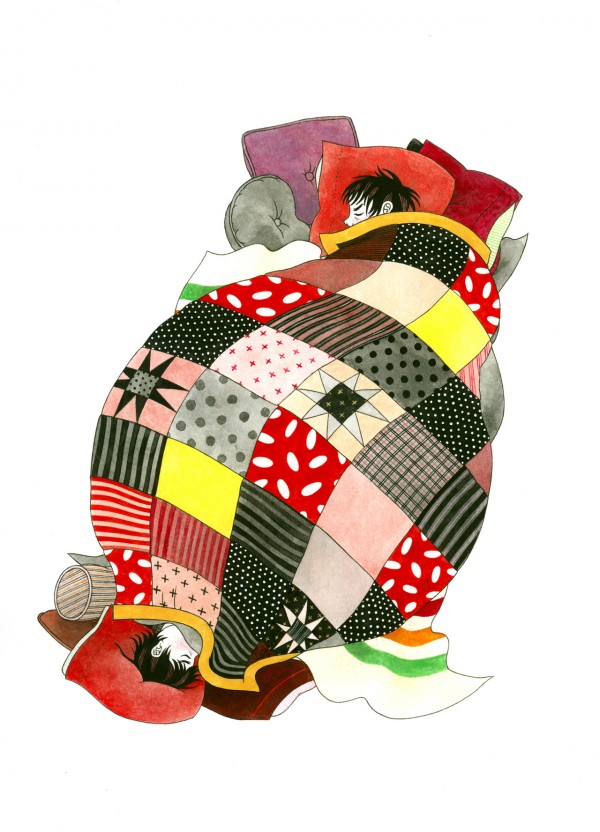
*****
*****
posted 4:30 pm PST |
Permalink
Zack Soto, Francois Vigneault Announce Linework NW, An Art/Alt Comics Show For Portland April 12

 Zack Soto
Zack Soto and
François Vigneault have announced
Linework NW, which they call a "new illustration and comics festival" for April 12, 2014 in Portland's
Norse Hall. It is a one-day, free event.
They have announced
Michael DeForge as their first special guest, marking that cartoonist's first appearance in the Pacific Northwest.
They have already lined up as exhibitors
Fantagraphics,
Koyama Press,
Grass Hut,
I Will Destroy You,
Magnetic North,
Oni Press,
Pony Club,
Press Gang,
Revival House,
Sparkplug,
Top Shelf,
Yam and
Traditional Comics.
Both Vigneault and Soto are cartoonists, well-ensconced in the Portland comics community; both also have organizational backgrounds directly related to comics. Soto edits
Study Group Comics and was a member at Pony Club Gallery; Vigneault ran the San Francisco Zine Fest for several years. Their release says that they planned the event when they could not get a firm commitment from Stumptown Comics Fest as to the state of the 2014 show. Stumptown earlier this week announced their decision to end their stand-alone show and push their non-profit mandate into different directions, including a presence at Rose City Comic-Con. If Stumptown had come off, they would have run their show at an alternative event in much the same way satellite programming has been taking place during
Comic-Con International at the "Trickster" location. With Stumptown out of the way in terms of its festival aspects, Linework NW becomes a spotlight event.
I've talked to three pretty well-connected alt-comics people about the show and they were all ecstatic over the possibility of a more devoted show of this type, and about Soto and Vigneault more generally. Some sort of different show -- whether additional, supplementary or competing -- has been rumored for a couple of years now.
The release also notes that Norse Hall is a small space, they plan to curate the remaining spaces pretty stringently.
They are asking for applications now and will accept them until January 31 with a decision coming as to who got in on February 7.
The event will take place in roughly the same neighborhood as Stumptown. They also plan at least one off-site show featuring the work of guest DeForge.
A twitter account has been established
here.
 posted 4:00 pm PST
posted 4:00 pm PST |
Permalink
Go, Look: Danny Hellman Draws Santa

 posted 3:56 pm PST
posted 3:56 pm PST |
Permalink
MariNaomi Writes About Being Harassed During A Convention Panel; Harasser Scott Lobdell Apologizes

The cartoonist, artist and essayist MariNaomi wrote a first person account of being harassed during a comics convention panel that everyone tangentially involved in comics should read
here. The person doing the harassing was later identified as the mainstream superhero writer Scott Lobdell, who apologized in a statement published
here.
Together with
the letter published at TCJ.com from a cartoonist who received an aggressively solicitous letter from a fellow professional, MariNaomi's piece should signal an end to most attempts to paint comics' failures in this area as simply flashes of bad decision-making in a social sphere from outliers conditioned by quirky comics culture to believe certain behaviors justifiable. The letter is an awful thing in and of itself but it also represents likely hundreds if not thousands of similarly conceived and toned e-mails sent and received. MariNaomi's experience was awful in and of itself but it also represents hundreds of uncomfortable experiences you can see referenced on a lot of cartoonists' twitter feeds and other accounts the week following every sizable show -- and even more that are never referenced at all.
I'm sorry both of these things happened, both for the experiences as described and for the unwanted intrusion that comes about with having to process it. I'm glad these two incidents of many were brought forward in this way, and applaud those that did so.
I hope that rather than dissecting these events or using them as a platform to place ourselves into a fictional construct whereby there was a different outcome or however folks express their anger that we also consider the broader issues in terms of how we all participate in a culture of harassment: from horrifying incidents like these to even mostly benign elements of that culture like the general attention paid young female industry members and cartoonists by older males to all the things in-between, like the reluctance to call into question the behavior of friends and business partners in the moment. We can all do more. As a set of public professional events I hope that all conventions have a harassment policy in place by 2014 and that each one is publicly endorsed by the show-runner; I hope that all companies and entities will revisit their harassment policies to see if they're doing the best they can in that area. I think that's a start, not a solution. There really are no solutions, but a set of reasonable standards backed by a sub-culture's collective will can change things for the better. Because every incident is important, that also means every improvement is a positive.
posted 3:54 pm PST |
Permalink
Go, Look: Guido Crepax Interprets The Peanuts Characters

 posted 3:52 pm PST
posted 3:52 pm PST |
Permalink
By Request/Bundled Extra: Sparkplug Makes Plea For Support In Year-End Letter; Notes 2014 Plans


Virginia Paine of
Sparkplug sent out a year-end letter to the company's supporters and customers that did two things: provided a rough outline of publishing plans for 2014 from the longtime publisher and distributor started by the late Dylan Williams, and folded in a public plea for support.
The plans include:
* a conclusion to
Elijah Brubaker's long-running comic book series
Reich, hopefully by fall.
* a hopeful fall release date for the long-awaited
Orchid 2
* the launch of a "Sparkplug Minis" series with four books planned for the year, including work by
Asher Craw and
Ariyana Suvarnasuddhi in February and May, respectively.
* a collection of
William Cardini's Vortex for summer
Paine also described the company's need for financial support, noting first that she has suspended the modest payments she received to run the company. She suggests direct action in one section of the letter:
To make these books happen, though, we are going to need a lot of support from our fans and friends. As always, you can make a donation directly to us via the Donate button on the right-hand side of our blog. These donations are so greatly appreciated and go directly toward producing our books. I'm also going to offer preorders for our books, which will be the best way for you to help us and add some great comics to your library simultaneously. Reich #11 preorders start today! Please, just look at that cover and tell me it's not one of the most beautiful things you've ever seen. Visit http://sparkplugcomicbooks.com/shop/comic-books/reich-11-pre-order/ to get your issue and contribute to a good cause: keeping us in business so we can continue to publish these amazing independent comics.
I enjoy that
Reich series, and hope it finds its way to completion, and was a great fan of the first
Orchid anthology.
From that letter and from other sources, it looks like the company will exhibit in several places in 2014, including
the LA Zine Fest, the inaugural Linework show in Portland and CAKE.
posted 3:50 pm PST |
Permalink
Go, Look: Midnight Tales #18

 posted 3:48 pm PST
posted 3:48 pm PST |
Permalink
Your Fumettologica Best Of 2013


Andrea Queirolo sent along this slideshow presentation of
best comics of the year that were published in Italy, as selected by Fumettologica. If nothing else, you should maybe go look at a bunch of handsome covers. New Gipi!
Their choices are:
10)
Golem Stories, Sammy Harkham (Coconino Press)
9)
Troppo non è mai abbastanza, Ulli Lust (Coconino Press)
8)
Ogni Maledetto Lunedi su Due, Zerocalcare (Bao Publishing)
7)
Verso una nobile morte, Shigeru Mizuki (Rizzoli Lizard)
6)
Io René Tardi prigioniero di guerra allo Stalag 2B Jacques Tardi (Coconino Press)
5)
Corpicino, Tuono Pettinato (GRRRzetic)
4)
Il Nao di Brown, Glyn Dillon (Bao Publishing)
3)
Opus, Satoshi Kon (Manga Planet)
2)
La proprieta, Rutu Modan (Rizzoli Lizard)
1)
unastoria, Gipi (Coconino Press)
posted 3:46 pm PST |
Permalink
Go, Look: Some Sweet, Sweet Esteban Maroto Art

 posted 3:44 pm PST
posted 3:44 pm PST |
Permalink
Your Uproxx Top Comics For 2013


In trying to spotlight as many of these lists as space and time allows, I'm always happy to put up lists with which I have to little to no connection, which usually means lists where the list-maker is tightly focused on mainstream comics slightly -- or significantly -- ahead of my own interest in those works. I am delighted to hear about works in those genres that might interest me.
This is one such list. Their choices are:
*
Afterlife With Archie, Roberto Sacasa-Aguirre And Francesco Francavilla (Archie)
*
Archer And Armstrong, Fred Van Lente And Clayton Henry And Matt Milla (Valiant)
*
Astro City, Kurt Busiek And Brent Anderson (Vertigo)
*
Batman, Scott Snyder And Greg Capullo And Various (DC)
*
Buzzkill, Donny Cates And Mark Reznicek And Geoff Shaw (Dark Horse)
*
GI Joe: The Cobra Files, Mike Costa And Antonio Fuso (IDW)
*
Harbinger, Josh Dysart And Khari Evans And Ian Hannin (Valiant)
*
Hawkeye, Matt Fraction And (Primarily) David Aja (Marvel)
*
Heck, Zander Cannon (Top Shelf)
*
Nowhere Men, Eric Stephenson, Nate Bellegarde And Jordie Bellaire (Image)
*
Numbercruncher, Si Spurrier And PJ Holden And Jordie Bellaire (Titan)
*
Sex Criminals, Matt Fraction And Chip Zdarsky (Image)
*
Star Wars, Brian Wood And Carlos D'Anda (Dark Horse)
*
The Crow: Curare, James O'Barr And Antoine Dode (IDW)
*
The Mighty Avengers, Al Ewing And Greg Land (Marvel)
Some of those credits were a guess; my apologies if I got a couple of them wrong.
posted 3:42 pm PST |
Permalink
Go, Look: Jock Mini-Gallery

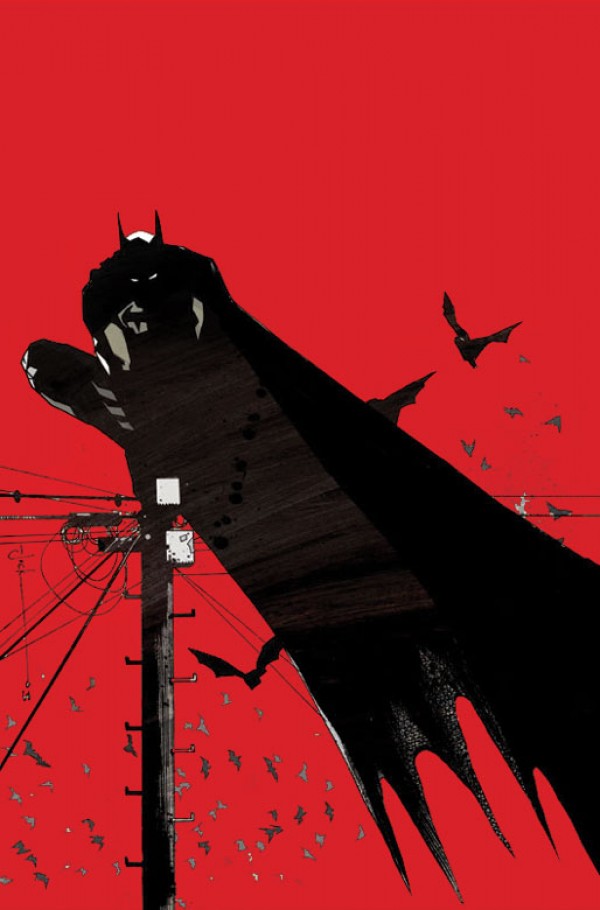 posted 3:40 pm PST
posted 3:40 pm PST |
Permalink
DC Comics Employees Expected To Make Burbank Decision Today

Rich Johnston seems to always have a host of reasonably reliable sources as to what's going on at DC Comics, and is using those connections to report
that employee decisions about moving west to the Burbank offices are due today. One would assume that some sort of decision is due soon if not exactly today, to allow for staff departures before the New Year and to facilitate the Spring transition. Heidi MacDonald, a former DC staffer tied into the local comics community in New York City,
confirms.

That's a super-tough thing to have to decide; my sympathy to those that have struggled with the decision or maybe even continue to do so as day are now hours and will soon become minuters. There are probably --
probably -- more employees at a comics publisher than at most businesses that favor their job in a way that they'd want to move wherever that job went -- that's how I felt when I worked in comics more officially than I do now. That doesn't mean there aren't a ton of folks that have a connection to the city, family, a significant other, a family member or significant other's job situation of the kind that would make a decision like this extremely difficult. I would also imagine that if there are any lingering doubts about the status of one's job once the move is made -- they were promised that all jobs would be held, but that kind of promise is frequently made with a certain rate of attrition in mind, or from a perspective where what that job entails may be different from management's perspective than from the person holding it -- or worries about the general corporate culture in Burbank that will mark this next era of DC Comics, that these would come into play now. Further, I have to think the instability and potential loss of editorial talent is of a direct concern to the freelancers for whom they are the entry point into that particular, likely important, client of theirs. A tough Christmas-season circumstance for many folks today, and I hope everyone negotiates this difficult situation with as much effectiveness as they can muster.
When word of departures gets sorted out -- and that should happen fairly quickly as DC tends to be a sieve even when the people talking are still working there -- my guess is that the next step will be figuring out how DC will fit into their new home, what that means for the company in the short- and long-term, and what that ultimately means for comics. Someone told me this morning that in the broadest industry sense, away from the very real pain that comes with the life decisions being made today, that watching DC move is a bit like watching a TV show they like decamp for a different time slot, and everything that sometimes portends.
posted 3:37 pm PST |
Permalink
Go, Look: LL de Mars’ Comics

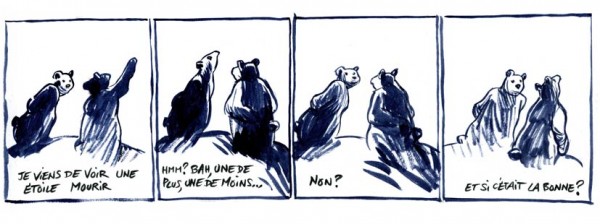 posted 3:30 pm PST
posted 3:30 pm PST |
Permalink
Assembled, Zipped, Transferred And Downloaded: Digital News
 By Tom Spurgeon
By Tom Spurgeon
* longtime comics magazine
Tripwire has made the full transition into digital, launching a bi-monthly publication this month. Their first issue features articles on superhero films, interviews with Ian Rankin and Cory Doctorow, and reviews of various media including comics.
Tripwire is in its 21st year in some form or another, and going back to my days at
The Comics Journal remember it mostly as being the magazine whose coverage area between
Wizard and the
Journal seemed to be something people seemed to openly wish for without knowing that at least one publication was working that territory already. At this point, I'm old enough I'm just glad to see things around with names on them I remember.
Follow this link to buy.
* a bunch of the Delcourt Group material
is now available via comiXology. That's one of those stories where it's a little too big for me to grapple with in terms of the amount of comics now available to me -- I can struggle through reading French -- but I'm happy for the chance to find out.
* finally, Gary Tyrrell
points out a recent webcomics development that made him think how much time has passed with some of these features. I was talking to someone today that talked about doing a digital comic for 15 years, and that was the old standard for doing a syndicated strip: 10 years + 5 years.
posted 3:25 pm PST |
Permalink
Go, Look: Berliac

 posted 3:20 pm PST
posted 3:20 pm PST |
Permalink
Go, Look: Emmi Valve Fan Club

 posted 3:10 pm PST
posted 3:10 pm PST |
Permalink
Random Comics News Story Round-Up


* the Buddy Bradley material dominates a lot of memories of Peter Bagge's fine one-man anthology
Neat Stuff, but nearly all of the features are worth going back and exploring in collected form if not in the magazine itself. In fact, I think the magazine is a great have-around-the-house read, as accessible as name-your-animated-program-of-choice. I've said this a bunch of times and will say it a bunch more, but I'm super-hoping that 2015 being the 25th anniversary of that great comic book
Hate will lead to a greater appreciation of Bagge's career more generally.
* missed
this list of books at Domino Books. Well, maybe I didn't miss it because I don't always run lists like that, but I find this one interesting.
*
that is indeed a very nice splash page.
* word of Free Comic Book Day material has begun to slip out via official and unofficial announcements;
Ed Piskor's work will be featured in a Fantagraphics offering. I like that Free Comic Book Day has some traction, although I'm not sure I could explain to a skeptical person how that event works for everybody involved.
*
here's a fun year-in-review list featuring a lot of random festival photos from your friends and mine, Conundrum Press.
*
Michael DeForge on tour.
*
here's a very, very broad review of DC's New52 initiative, that makes a solid point about its conceptually ramshackle nature:
so much depends on individual creative choices, because there's nothing there otherwise.
* finally, I'm very jealous of those students that
not only get to take comics courses in college but get to take them at that lovely Billy Ireland facility.
posted 3:05 pm PST |
Permalink
Happy 28th Birthday, Ed Kanerva!

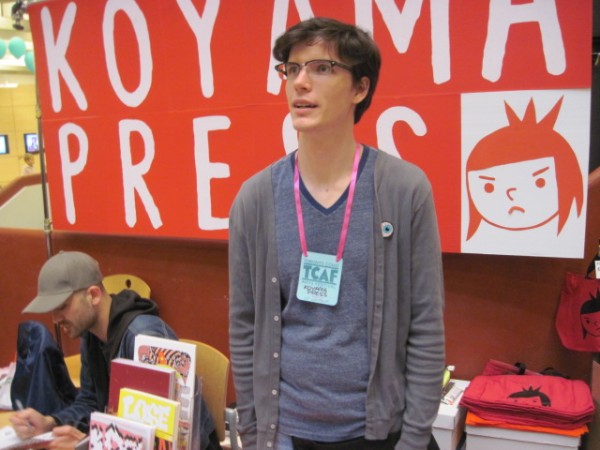 posted 3:00 pm PST
posted 3:00 pm PST |
Permalink
Happy 46th Birthday, Rantz Hoseley!

 posted 3:00 pm PST
posted 3:00 pm PST |
Permalink
Happy 61st Birthday, Mack White!

 I had this at 60 as per past years' wishes, but his Facebook account says 61
posted 3:00 pm PST
I had this at 60 as per past years' wishes, but his Facebook account says 61
posted 3:00 pm PST |
Permalink
Happy 64th Birthday, James Van Hise!

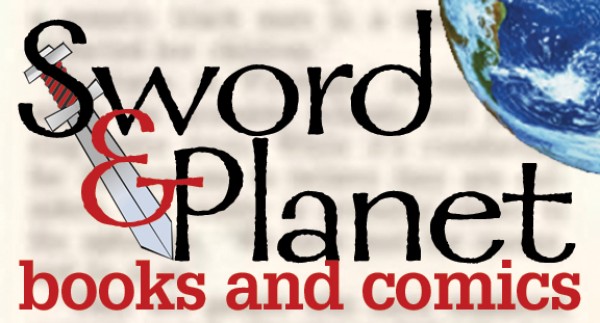 posted 3:00 pm PST
posted 3:00 pm PST |
Permalink
December 18, 2013
 CR Holiday Interview #02—Sean T. Collins and Joe McCulloch
CR Holiday Interview #02—Sean T. Collins and Joe McCulloch

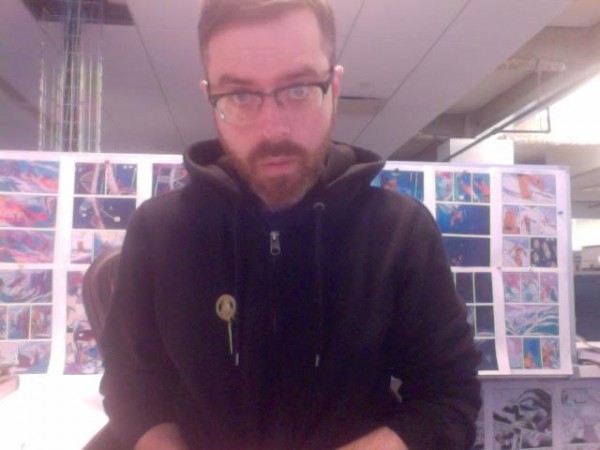
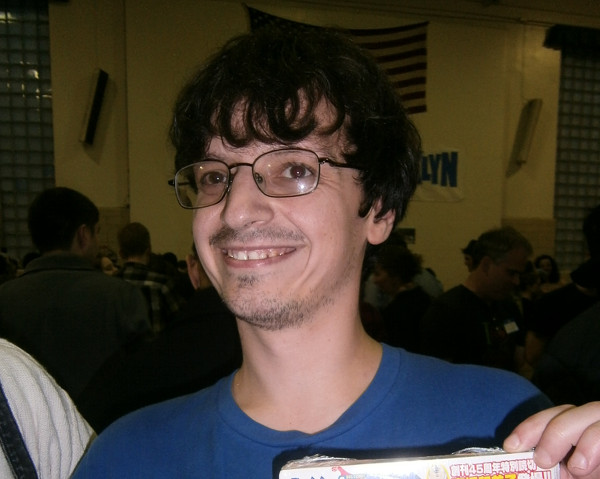
*****
We rarely talk about the alternative and art comics portion of comics as an industry with its own set of concerns. I thought this year might be a good year to do that in the holiday interview series. I chose to have this conversation with
Joe McCulloch and
Sean Collins, both of whom wrote compellingly of the latest important story in that world,
the closing of PictureBox, Inc. I've known both critics -- and Collins is now a writer
of comics -- for years. I respect their observations and insights. I hope that the following has something in here you'll find of interest. I tweaked a bit for flow. -- Tom Spurgeon
*****
TOM SPURGEON: I guess a first question would be how frequently does your conception of alt-/art- comics include an industry component? We seem to maybe blend the business and art in mainstream comics and even in newspaper strips more than we ever conceive of art- and alt- comics that way, and I wonder if you had any thought as to why that is.
JOE McCULLOCH: Well, since you're talking to a pair of critics, my first thought is that there's a big difference between writing about art and writing about industry. Put simply, the former is much easier to do, because in the end it's just you and a book and whatever perspective and experience and theory and wisdom you're gonna bring to the table, and while disagreements are obviously gonna happen -- and I absolutely do think it's possible to write bad criticism -- there's much more in the way of intellectual wiggle room. Writing about industry, though -- you need a very solid grounding in practice, economics, distribution; it's more like math, because you can very easily get a lot of shit obviously, factually wrong, and
nobody likes getting shit wrong, especially when they're not being paid for the pleasure.
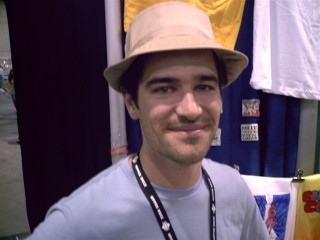 SEAN T. COLLINS:
SEAN T. COLLINS: Good Lord, imagine if
Frank [Santoro] and I had talked about the dearth of alternative-comics reporters instead of
alternative-comics critics. The list would have been, what, two people long tops? "Follow the money" is a solid rule of thumb for this discussion. There's very little money to be made in alternative comics, still less to be made in alternative comics criticism, and, as best as I can tell, zero to be made in alternative comics business journalism. So those habits of thought don't get cultivated, for practical, financial reasons.
McCULLOCH: And, as a result, I think a lot of writers-on-comics today are reluctant to address industry concerns in areas where "industry concerns" aren't already a broad pool of knowledge from which to draw, like with the big superhero publishers. The legwork on them was done years ago, to the point where any random
Bleeding Cool message board poster might find the guts to hold forth on the hard truths of the biz, and not immediately look like a clown. Plus, I think the nature of reading superhero comics -- or reading newspaper comics -- is affected by the fact that they're pretty far removed from the locus of original creation: it's usually hired hands providing maintenance for valuable properties, and while there's obviously an artistic component to that, the observer is nonetheless placed at a certain distance, encouraging speculation as to business practice. That goes triple when superhero movies are involved, because there's just so much fucking money involved -- unreal money! It's like following sports.
With "alternative" comics -- I mean, Jesus! What fucking toad wants to
drop science on "the industry" of what's been whispered into our cradles as the very marrow of the creative urge? Wasn't the whole struggle for comics-as-art about promulgating a theory of 'alternative' or 'art' or 'underground' or [your favorite oppositional term here] comics as separate from readily monetized company craftwork? Let me answer my own question -- it wasn't, not strictly, but this romantic conceptualization probably turned out to be the most immediately appealing of the various arguments for a genus of comics against a status quo, which, 35 years ago, was legally disinclined in the majority of circumstances to even recognize artists as the creators of their own work, per the fictions of authorship that lie at the basis of work-made-for-hire.
COLLINS: This is also true. Though in my experience a lot of makers of, and thinkers about, alternative comics enjoy pulling apart the business practices of any and all industries with which they come in contact, that's only very rarely true of alternative comics as an industry itself. When it comes right down to it I think a lot of people are just kinda bored by the practicalities of funding these things, until a crisis makes it newsworthy.
McCULLOCH: [laughs] Sure -- nobody likes to shit where they eat! But wasn't it
David Foster Wallace who prophesied that the locus of power would reside within "boring" data? Because in the media rush -- we gravitate towards what's the most fun, the tastiest, the most stimulating. So anything that happens in a boring way; you're wearing the One Ring, my friend.
Plus, criticism itself is a field pregnant with theory and ideals, and I think there's a perception that it's anti-intellectual, in some way, to divert one's focus from the object of art itself. I mean, the movement in popular criticism for the last few years has been very much toward a sort of quasi-academic analysis of artistic works as social actors, which reflect or promulgate or repel or inspire resistance to prejudices and inequities in the daily life. In this way, the industrial component, if acknowledged, is often cast in the role of systemic compulsions resulting from some financial interest in maintaining the status quo; declarations tend to go broad. If you mention business too much, I mean -- you feel like one of those movie bloggers who won't shut up about box office. Don't you even like movies, Tom?! Sean and I liked
Only God Forgives.
COLLINS: I even bumped into Nicholas "The Long and" Winding Refn on the street afterwards and told him so. Sensational cinema!
McCULLOCH: But, you know, eventually, if you stick around in comics for long enough: you see people disappear. And not a few people -- enough so that it really hits you in the face with how difficult it is to make a living at this thing. Like, you see one or two or three people vanish, and you think, "Okay, it's like gallery art, it's like screenwriting, it's like music, or anything; few do it forever." But after a while, even if you lack the responsible and/or messianic impulse to want to improve or perfect this scene from which you derive enjoyment and love, you begin to examine your own assumptions about how the field operates, and that pushes you to develop some of the expertise I've mentioned. And, you know, you're growing older, worrying about money, trying to figure yourself out -- it becomes part of the interrogation of your own life. So, yes, I do think about industry, but I imagine really any practicing artist would have developed these opinions long ago; you know this already, but I can assure your readers that every one of these topics are discussed at length, in private, by almost everyone, incessantly.
COLLINS: Ah, there's the other component of it, a phenomenon encapsulated by the cantankerous music and music-industry critic
Chris Ott on twitter the other day with the phrase "Let's take this to e-mail so I can tell you you're right." With the exception of figures who for better or worse, rightly or wrongly, find themselves becoming lightning rods about whom it's okay to opine in public, what you see in print online in terms of discussion regarding the mechanics of publishing alternative comics, or even run-of-the-mill "I don't actually think that book is very good and here's why" criticism, is the tip of an enormous offline, off-the-record iceberg of speculation and shit-talking. For pete's sake
Ryan Cecil Smith saying "I don't much care for
Adrian Tomine's comics" in a series of tweets was forwarded to me by a breathless friend in full "man bites dog" mode. Imagine starting to hold forth publicly about which micropublishers don't pay their contributors, or spilling the open secret that PictureBox was closing down before
Dan [Nadel, Pictur
posted 4:00 pm PST |
Permalink
Al Goldstein, RIP

 Screw
Screw published Wally Wood, Robert Crumb, Peter Bagge, Bob Fingerman and John Holmstrom in addition to any number of mostly NYC-based cartoonists. Without those gigs, some of those artists might have given up on cartooning altogether. Also, some of those covers are pretty great.
Danny Hellman has a bunch of prominent cartoonists'
Screw covers
up at this blog.
posted 3:57 pm PST |
Permalink
Go, Look: Ron Garney Mini-Gallery

 posted 3:42 pm PST
posted 3:42 pm PST |
Permalink
Your 2013 Comics Waiting Room Best Of List


Marc Mason at
Comics Waiting Room -- one of the sturdier survivors of a previous age of the comics Internet -- has piped in with a Best Of list that features his humble
mea culpa as to why it's not grander and more authoritative. He chose five books and then named two comics, one he thought was the best he read and one he thought needed more attention.
The books:
*
Boxers & Saints (First Second)
*
March Vol. 1 (Top Shelf)
*
Red Handed (First Second)
*
The Great War, (WW Norton)
*
The Initiates (NBM)
The comics:
Best Book That Needs A Bigger Audience
*
The Shadow (Dynamite)
Best Single Issue Of 2013
*
Sex Criminals #1 (Image)
posted 3:41 pm PST |
Permalink
OTBP: Show Me The Map To Your Heart And Other Stories…

 posted 3:40 pm PST
posted 3:40 pm PST |
Permalink
Columbia Announces Acquisition Of Kitchen Sink Press Archives
 According to a release yesterday
According to a release yesterday, the Rare Book and Manuscript Library at Columbia University acquired the papers related to Kitchen Sink Press. I guess this also serves as another reminder that Columbia is going to do its best to make itself a major player in the comics library and museum-type holdings business, under the general guidance of Karen Green. It should be fun to have a New York City presence doing that kind of work in a focused way.
That's a fairly lengthy release, so you should stride over there for details, particularly as it's late December and a proper feature article may be beyond me until the new year.
I always hear Denis Kitchen kept
everything in terms of correspondence and the like, so that should be some interesting stuff to work though at some point.
posted 3:35 pm PST |
Permalink
Go, Look: Renata Gasiorowska

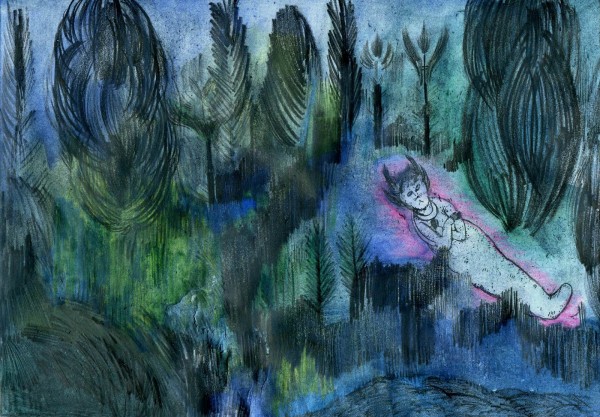 posted 3:30 pm PST
posted 3:30 pm PST |
Permalink
Festivals Extra: Comic-Con International Names First 20 Guests For 2014


Comic-Con International
has announced its first 20 guests for its big summer event, planned for July this year in San Diego. They did so via social media and their devoted blog. The guests represent the range of material covered by the convention, and include a number of super-admirable choices on the comics side of things.
Those guests announced are:
* Amanda Conner
* Brian Crane
* Eleanor Davis
* Jane Espenson
* Raymond E. Feist
* Drew Friedman
* Michael T. Gilbert
* Willie Ito
* Caitlin R. Kiernan
* Lucy Knisley
* David Lasky
* Graham Nolan
* Jimmy Palmiotti
* Benoit Peeters
* Don Rosa
* Jim Rugg
* Francois Schuiten
* Scott Snyder
* Fiona Staples
* Gene Luen Yang
Bunch of stuff jumps out at me here. I got about a half-dozen people e-mailing me right away excited about Schuiten and Peeters; that's a great choice, and that con has a long history of inviting over otherwise difficult to see European cartooning guests, particularly those with a foot in the arts-comics album making of the pre-L'Asso era. Eleanor Davis, Gene Yang and Lucy Knisley all strike me as broadly appealing cartoonists of the kind whose material you could very easily introduce people to on the floor as well as providing people that are already fans of their work a chance to meet them. Dave Lasky and Jim Rugg are super-admirable mainstays of alternative comics. Drew Friedman is an excellent cartoonist and a smart and articulate speaker about his work and things related, so I'm glad he's going to do this show. Scott Snyder and Fiona Staples are key mainstream comics talents of right now. I'm always happy to see Don Rosa... Extremely solid comics list.
The convention has provided biographies of each guest
here, and plans to announce a ton more in coming weeks.
posted 3:25 pm PST |
Permalink
Go, Look: Noticing The Sound Effects In Batman: Year 100

 posted 3:22 pm PST
posted 3:22 pm PST |
Permalink
Festivals Extra: TCAF Announces First Round Of Guests For 2014; Names Expanded Pro Programming Slate

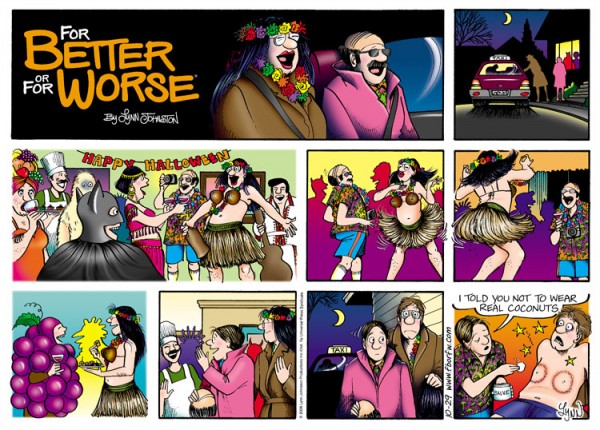
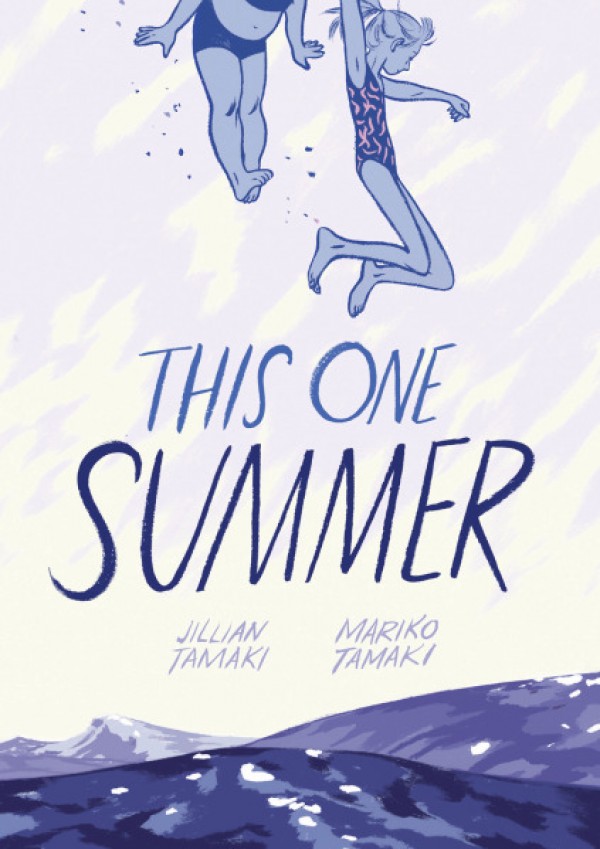
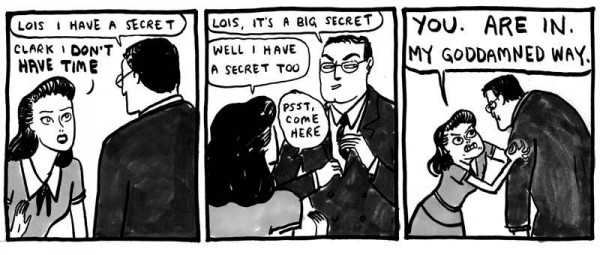
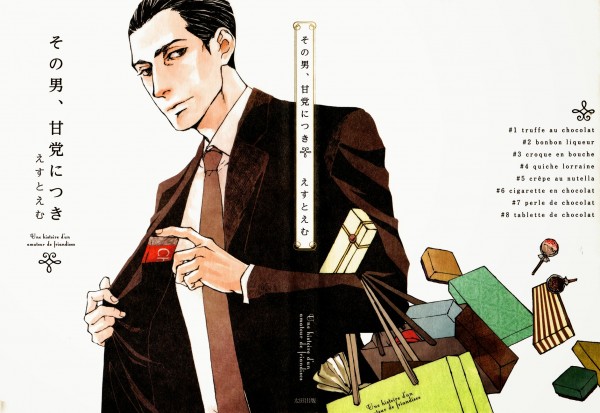
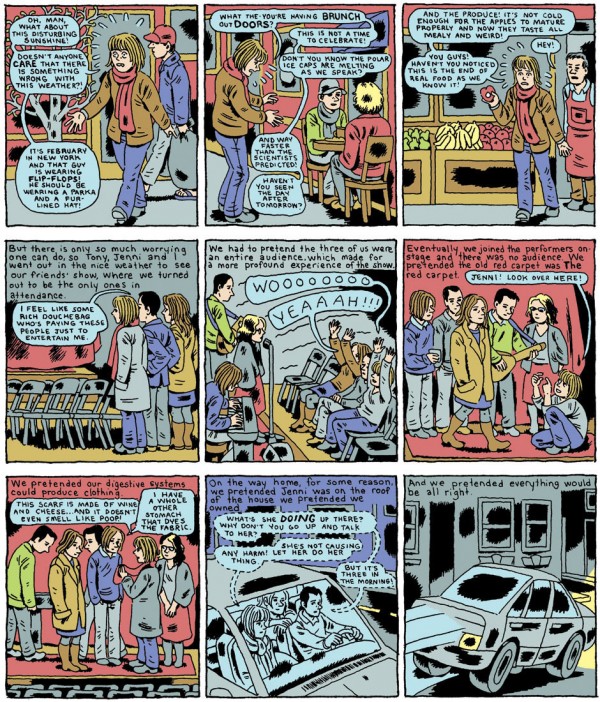
TCAF
has named its first round of guests for the 2014 iteration of its show:
Lynn Johnston,
Mariko Tamaki,
Jillian Tamaki,
Est Em,
Kate Beaton and
Gabrielle Bell. Johnston is a really good get for them as she's Canadian and very much loved by not just the general public but by a huge swathe of the comics-makers in attendance. I'm excited for her to get to experience that weekend. Mariko Tamaki and Jillian Tamaki will have a major book at the show from First Second/Groundwood:
This One Summer. Est Em's appearance continues the festival's admirable approach to significant international guests. Kate Beaton and Gabrielle Bell are two of the best cartoonists under 40.
TCAF also announced that the professionals-focused development programming will be called The Word Balloon Academy. That will take place the day before TCAF proper, along with an academic conference and focused educator/librarian programming.
That show is off to a great start. They promise details and more guest announcements into January. The show itself is Mother's Day weekend in May.
posted 3:21 pm PST |
Permalink
If I Were In Portland, I’d Go To This

 posted 3:20 pm PST
posted 3:20 pm PST |
Permalink
Go, Look: Davis Ozols

 posted 3:10 pm PST
posted 3:10 pm PST |
Permalink
Go, Read: Deeply Idiotic And Assholular Mash Note From Male Cartoonist To Female Cartoonist
 Here
Here. Just read it. It's awful. I'm grateful to the person who allowed it to be published.
Anything a hundred miles in proximity to this kind of thing should end yesterday, the relative awfulness of this act to another one or the comics community to the world at large being entirely beside any point worth making.
posted 3:09 pm PST |
Permalink
Go, Look: Dace Sietina

 posted 3:08 pm PST
posted 3:08 pm PST |
Permalink
Random Comics News Story Round-Up

*
here's another feature article on Neil Cohn's study of comics as a unique and important language.
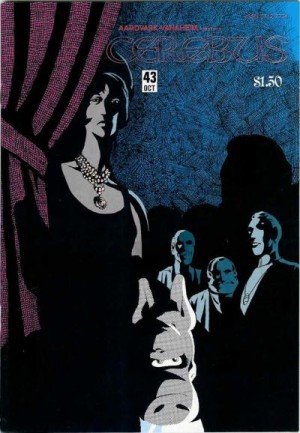
* if you're a big enough comics nerd of certain age and you think about it for a while, you'll probably figure out a single purchase or series of purchases that changed the course of your life. For me it was discovering early indy comics at Comic Carnival in Indianapolis that were published and were purchasable in roughly the same manner as the mainstream comic books that I liked. It's the combination that was crucial: I knew other types of comics existed, but being able to go to a devoted shop and buying them was a big deal in terms of my becoming an active comics reader in a way that random Saul Steinberg books and
Peanuts collections had no chance of being.
Cerebus during this time period was everything I liked about the adult world I wanted to be a part of: politics and humor and violence and melodrama. I loved those days when a new issue appeared on the stands.
*
Benjamin Woo continues to unpack material learned from his cartoonist surveys.
* not comics:
Jason reviews Thor: The Dark World.
*
these presentations at CCS look a lot more fun to put together than my 37-page paper on photojournalism depicting violence in 1960s Latin America.
*
every single superhero is someone's favorite. Except maybe Sentry.
*
Paul Gravett does another one of those giant profiles, this time on Yves Chaland.
* apropos of nothing,
this Matt Bors comic made me laugh.
* I don't know that I've looked at
Cameron Stewart's site in a
really long time. There are a lot of nice-looking prints available there.
* finally, there's a new comic,
Anxiety, at
Letters From Schwarzville.
posted 3:05 pm PST |
Permalink
Happy 62nd Birthday, Dave Scroggy!

 posted 3:00 pm PST
posted 3:00 pm PST |
Permalink
Happy 46th Birthday, Dan Taylor!

 posted 3:00 pm PST
posted 3:00 pm PST |
Permalink
Happy 61st Birthday, Peter Gillis!

 posted 3:00 pm PST
posted 3:00 pm PST |
Permalink
December 17, 2013
 CR Holiday Interview #01—Paul Pope
CR Holiday Interview #01—Paul Pope


*****

I've known
Paul Pope for more than 18 years, and have read his work for two decades. He's one of my favorite people in comics. Pope's latest adventure is
the Young Adult graphic novel series Battling Boy, the first volume of which arrived in October from
First Second. Pope has since that project's inception signed a multiple-project deal with the Macmillan imprint, which should give us a same-universe project next summer, the sequel to the main title the year after hat, and a return to his reputation-making
THB with five volumes, much of the material new, starting in 2016. It is an ambitious run of books whose exact make-up is likely to change as additional opportunities arise for the New York-based artist and illustrator. With Pope, it's always a tiny bit unclear which books stand at which stages of production, and which projects are more fanciful than fully loaded.
Battling Boy was delayed by Pope's recent, multiple-year, sideways sojourn into film-making, an avenue of expression he indicates will remain part of his overall artistic output moving forward. Now firmly focused on managing a slew of publishing projects, Pope seems determined not to have his announcements outpace his work rate. I caught Pope a few days before a holiday season through which he planned to labor. I was happy to continue an ongoing discussion about his life and current orientation towards making art, a sprawling chat that had predecessors in chance meetings in New York and Columbus earlier this year. Last Toronto, Paul Pope gave me his hat. -- Tom Spurgeon
*****
TOM SPURGEON: I have no idea how you work these days, Paul, or even how much time gets devoted to comics as opposed to one of your other gigs. What's going on right now? What's your schedule like for today?
POPE: I don't really have a schedule. I'm trying to get it sorted. Part of the problem is I'm wrapping three projects. I'm wrapping the
Battling Boy art catalog, I have the deadline for
Battling Boy 2, and I'm commuting back into the city again. So it's just a lot. I'm art directing
the Aurora West books. I worked on the scripts with
JT Petty on those, and now it's intermittent art directing with that project. There's a little bit of work to do on
the Escapo project, too, basically scanning some art and corralling some guest artists that will be in the book. So it's non-stop.
SPURGEON: Why this busy? Is it something you brought on yourself? Is it a confluence of events? Do you prefer to work like this?
POPE: No. No, I don't. It's nerve wracking, to be honest. I'm hoping it will be over soon.
Battling Boy is going to become a phenomenon, so it's taking on a life of its own. So there's a lot of interest there. With the gallery shows, they've just sort of blown up. Through
Charles [Brownstein] at the CBLDF, I managed to forge a connection with
MoCCA and the Society of Illustrators and an opportunity opened up to have a show there. That turned into six separate show internationally for
Battling Boy, six exhibits. I'm going over to France in February after Angouleme for a one-man show at a gallery called Ninth Art, which is apparently the premiere Parisian illustration house. It's where
Moebius and
Frank Miller show art. That's going to be amazing. I realized when the Society Of Illustrators thing was coming together, you may recall that I was working with
Dan Nadel at PictureBox to put a catalog together. It turns out now it's going to be at Image.
Jim Pascoe is designing the book, and it looks awesome. But the details fell to me: to find the international translators, hire Charles to write an introduction, hired a guy to photograph all the art from the show. It's actually lightboxed -- what they call shadowboxed art, like an old-school art catalog.
I have a couple of assistants now working for me. It's really become a cottage industry.
SPURGEON: So you're at this dead-on sprint until... Spring, it sounds like.
POPE: Until June. My hard deadline for
Battling Boy 2 is June. It's a lot of work. Because it's the end of quarter four everything needs to be wrapped for 2013. So there's more organizational stuff than usual.
SPURGEON: Based on a conversation we had earlier this year, it seems like you were super-busy before this latest period, but it was super-busy because you also had a run of movie-related opportunities. This, on the other hand, seems more like like a conscious decision to get back into publishing and make more out of the opportunities that come with having a published work out there.
POPE: True.
 SPURGEON: So are you happy with how that's progressed? Are you happy with the way
SPURGEON: So are you happy with how that's progressed? Are you happy with the way Battling Boy
has been received? Are you satisfied with the opportunities that may present themselves there?
POPE: Yeah. They tell me not to talk about the movie too much right now, but we're backshopping it to Paramount with the same team. Everyone involved still wants to make the film. That's good news. I've got a couple of other film options out there... this is all invisible stuff, stuff that people never know about. It's not even really in comics. It's more like the franchise, right?
I worked on
Kavalier & Clay, that was a year or maybe 18 months. I worked briefly on the
Dune film. And then I co-wrote and co-directed a film with an Indian director named Sridhar Reddy that was financed through Sony. It's a short film, not a long film. It's a festival film. It's for Tribeca. That's going to debut I think in January.
SPURGEON: This is the film you shot with a new camera, right?
POPE: Yes.
It's called the F-65. There were only four of them in the world at the time. It was a little bit like having the president's football. [laughter] It was a little strange. They had a guy that flew out from Sony to be on the set with it the entire time. We had a prototype, so it broke down a lot. One day we were stuck for hours doing nothing while they tried to upload some software that was missing. I just played guitar sitting around Lancaster, California. [laughs] It was a little surreal.
SPURGEON: That seems like a lot of work for a sustained period of time. It also seems to me like it would be crazy to try to create in the midst of that. Is it hard to carve out space now? Will this have any impact on the next wave of comics from you, do you think? Is it more of a challenge now to find that creative time?
POPE: It's a challenge. I've talked to
Mike Mignola and Frank Miller about how to manage a creative career where you are simultaneously running a business and getting pages done. My editor
Mark Siegel gave me this really great book. I would recommend it to anybody in any creative field.
It's called Daily Rituals, by Mason Currey. It's a study of 200 philosophers, composers, dancers, writers, film directors from the last 400 years about the mundane shit: how they worked. You asked a question about my work habits, and it's funny because I've been meditating on establishing very set work habits. Some days, particularly a day like a Monday, I'll wake up and I'll have four or five hours of e-mail -- they're all
urgent. [Spurgeon laughs] So the rest of the day I will have text messages all of the time.
By now my personal assistant is handling a lot more of the things we need. For
Escapo we have a bunch of guests artists.
John Cassaday is on the list. He got his piece done. As much as I want to just go hang out with Cassaday tonight, I'm going to send my assistant over to pick up the art and I'll see John some other time. You know what I mean? It's just delegating. We had nine action points yesterday, nine action points of things that needed doing. I'm hoping after Christmas I can just lock myself in the studio and get back to work. I'm getting stuff done, but there's just a lot of stuff right now.
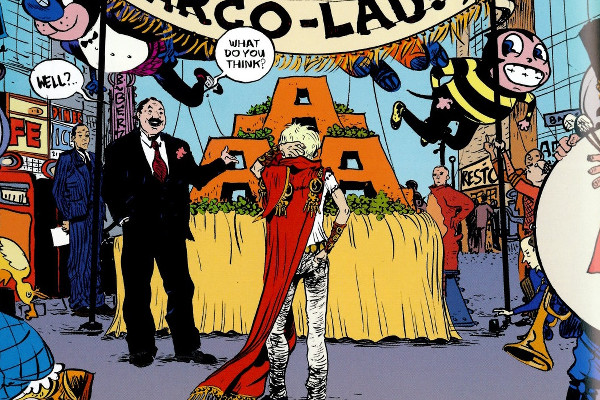 SPURGEON: Do you feel like this is a transitional period for you? You're right at that age where you're no longer that young artist by any reasonable measure. You're fairly well established. People are going to start looking to you for guidance instead of the other way around.
SPURGEON: Do you feel like this is a transitional period for you? You're right at that age where you're no longer that young artist by any reasonable measure. You're fairly well established. People are going to start looking to you for guidance instead of the other way around.
POPE: Oh, that happens all the time already.
SPURGEON: Do you like that transition? Have you enjoyed that transition?
POPE: No... I know that with
Battling Boy, this and
Boxers and Saints have been their big releases. I've got full support from Macmillan -- not just First Second, but Macmillan in terms of publicity and even just right now we're planning a four-city UK tour before my French and Belgian tour. There's a lot more administration. I've been studying... everybody know I'm into music and musicians, but I've been looking at the model of how a recording artist will have time to go into the recording studio and record and still have time to tour.
 SPURGEON: You're mentioned Mark Siegel and First Second... it seems like that's a fruitful partnership for you. What do you value about that relationship, Paul? The resources? The specific personalities? Do they simply know when to leave you alone? It seems like you're pretty solidly in bed with them at this point.
SPURGEON: You're mentioned Mark Siegel and First Second... it seems like that's a fruitful partnership for you. What do you value about that relationship, Paul? The resources? The specific personalities? Do they simply know when to leave you alone? It seems like you're pretty solidly in bed with them at this point.
POPE: Yeah, we have contracts for multiple books. There will be a young adult novelization of
Battling Boy. There will be an audio book of
Battling Boy. We're working on an apparel line. There's like merchandise now, do you know what I mean? It all involves lawyers and contracts and time and negotiations and meetings and stuff. So there is that. It's all valuable. But at the end of the day, what I'm interested in doing with like the new
THB and with the
Battling Boy books. Even though it's graphic novels they were able to see and purpose my books as young adult stuff.
Macmillan publishes cookbooks, they publish books for little kids. They do have an institution, because they publish young adult novels. Right? So when I'm doing these events, I'll do panels with Young Adult fiction writers. The kind of people that write what
JK Rowling would do, something like that. These are books I've never read, and people I don't know. They're interesting people. But it's cool because the audience a lot of the time is teenage girls. I'm at the point where I do signings and I'll be signing for hundreds of kids. It's crazy. For some of them this is their first graphic novel.
Battling Boy. That's pretty cool. I remember when I was a kid, the stuff I remember seeing. My dad brought back this book on the origins of Marvel's super-villains called
Bring On The Bad Guys. I was like six. That blew my mind because I'd never seen anything like that.
I don't make any secret that there's a ton of Moebius and
[Jack] Kirby influence in
Battling Boy. It's part of the purpose of the project: the way that it felt being a kid and discovering these epic-scale stories.
SPURGEON: At the same time, as you've been doing this project, you've been forthright about wanting to do a story that works in the context of what kids are reading now, how they're surrounded by these larger-than-life fantasy constructs. It seems there's a little bit of genre correction here.
POPE: True.
SPURGEON: So what in the work do you feel speaks directly to where these kids are? Those kids that respond, what are they responding to?
POPE: In
Battling Boy?
SPURGEON: Yeah. Beyond the fact that it looks nice, or features elegant cartooning, what do you think kids might be responding to?
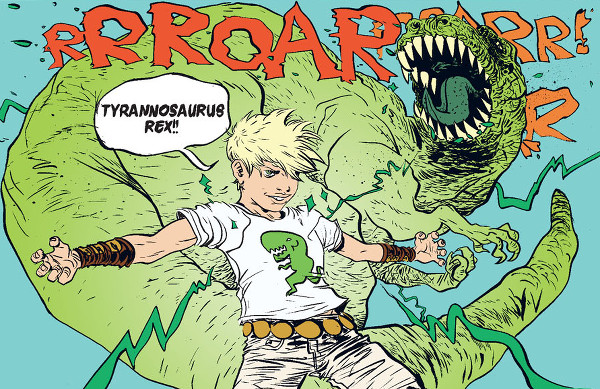
POPE: Well, I think kids like dinosaurs and monsters. I remember thinking they're cool. They like goofy villains who are also scary...
When I started to come up with the idea for
Battling Boy it occurred to me there aren't enough comics aimed at kids that are sophisticated, and that there weren't enough comics with kid characters -- at least not kid characters that felt like real kids. Battling Boy lies and he's lazy and he tries to get out of responsibilities... he's like a real kid. He just happens to be indestructible. [laughs] I just thought it was an interesting idea. I've said this before, but I really loved
Peter Pan.
Fantasia is my favorite Disney film, but
Peter Pan is probably my second -- it's hard to say,
Pinocchio and
Dumbo are both great. A lot of that early Disney film stuff I just love; it's so heartwarming. A lot of people think
Battling Boy is cynical because it has this fairytale notion to it. So I wanted to have this veneer, this sweetness of
Disney, but also have it... not cynical, because I don't think
Battling Boy is cynical, but have it where you don't win just by beating the villain. That was the inspiration.
 SPURGEON: There's a definite critique of violence as a problem-solving tool here. And there are certainly consequences to violence in the story. You open with a death, and then Battling Boy fails when forced to sustain violence for more than a few seconds at a time. He has to call in the power of his parent at one point. Should we take these kinds of things as a critique of the easiness of violence in a lot of popular art?
SPURGEON: There's a definite critique of violence as a problem-solving tool here. And there are certainly consequences to violence in the story. You open with a death, and then Battling Boy fails when forced to sustain violence for more than a few seconds at a time. He has to call in the power of his parent at one point. Should we take these kinds of things as a critique of the easiness of violence in a lot of popular art?
POPE: Yeah. I think so. I have no problem with Iron Man. I did Batman... I have no problem working on the big characters at
Marvel and
DC. I think it's cheating kids not to give them new stories. My nephew is five years old, and he knew that Spider-Man's uncle is killed and that's why he becomes Spider-Man. But those stories were old when
we were kids. I think it's no surprise that
Adventure Time is a big hit, partly because
Adventure Time is new. It's new and because of that it speaks to kids.
SPURGEON: It's theirs.
POPE: It's theirs. Right. When were kids, we had the muppets. I was just talking to a friend of mine, another artist, and we were talking about the muppets. I never thought much about [Jim] Henson. We were talking about how brilliant and original it was. It wasn't the puppets themselves that were original; it was the way it was done. It's the same with this. One of the critiques I've seen of
Battling Boy is that it's too obvious. The bad guy's name is Sadisto. The good guy's name is Haggard West and he's tired. But that's the whole point. It's like
Charles Dickens, where the teacher's name [in
Hard Times] is
Gradgrind.
SPURGEON: I don't know if this is an overly facile reading, but it seems like you're drawing a dichotomy between the two kids in terms of talent and discipline. I don't know if that may even been something that you related to in your memories of being a kid, as a developing artist perhaps. But certainly Battling Boy is gifted in a specific way, and is advantaged, and then you have Aurora, who relies on her training and the way that she engages what she's taught and applies that education to these things she really wants to do. That does seem to me the twin poles of an artist's development -- of any kid's development. Is there anything to that at all?
POPE: For those two, I wanted a contrast more about -- I guess the short answer is "No."
SPURGEON: [laughs]
POPE: I wanted a contrast to them, and I was thinking about a couple of different things. One was the notion of privilege, and not being aware of privilege. Battling Boy takes for granted the things he has; he doesn't know how his magical technology works. It's like a kid with an iPhone. Even a lightbulb -- you don't have to know how a combustion engine works to drive a car. That's the job of a
[Nikola] Tesla or an
Edison, that's for them to figure out. Aurora is more the offspring of a science-hero, as I call them in the book. Battling Boy is the heir of a god of war. They're the next generation. So I wanted a bit of that feeling. Aurora -- in some ways she's the hero of the series because she appears in all four books. She's in the
Aurora West series and she's in
Battling Boy. Whereas Battling Boy is only in
Battling Boy. They both have their through-lines, their different stories.
 SPURGEON: When you have elements like you have here: there's a girl protagonist and a boy protagonist, there are parents and children, there are the t-shirts... I don't want to say they are cynical elements, but there's a
SPURGEON: When you have elements like you have here: there's a girl protagonist and a boy protagonist, there are parents and children, there are the t-shirts... I don't want to say they are cynical elements, but there's a crafting
to it, it seems, where you might want to hit certain buttons or are at least very aware these genre signposts exist. Did you think in those terms, Paul? You talked about kids liking dinosaurs, and certain kinds of villains: is a lot of this work crafted from these things that you think the audience will appreciate or enjoy, and does this extend to story structure and broader narrative elements?
POPE: In this case, I really wanted to make a kick-ass comic for kids. So I
did think in terms of what I thought was cool when I was 11 years old. I did. When I did
Heavy Liquid, I thought in terms of the
Nicolas Roeg film
Performance and
The French Connection and those '70s cliches. And then with Batman, I wanted to make a kick-ass Batman book [
Batman: Year 100], so I thought through what I hadn't seen Batman do yet. I always liked that surveillance state notion with superheroes because of the secret identities.
With
Battling Boy I saw something missing in the market. There aren't enough cool comics for kids. Also, I was tired of doing the adult stuff. I've said this a million times, but when coming up with this idea my nephews knew I did comics but I couldn't show them anything I'd done. That made me think about all the kids out there that aren't going to read
Iron Man. They're not going to be able to understand this
Crossover Of Crisis Infinity Sequel that people seem to be buying. What's cool is that what I was thinking was what I've come to learn since is Young Adult Fiction. It's more like
Adventure Time or even
Harry Potter without intending to.
SPURGEON: Do you feel common cause with any other work that's out there, any comics work specifically? If a kid comes up with their parents and they said how much they liked Battling Boy
, are you confident with where to send them or are you like, "Well, hold on until the next Battling Boy
!" [laughs]
POPE: The few times people ask that, I always tell them about classic comics. Like all the early
Fantastic Fours, I think those are universally great. There's
Adventure Time now, there's
Bone, there's all the
Carl Barks comics. I love the French comic
Valérian, by
Jean-Claude Mezieres and
Pierre Christin. Stuff like that.
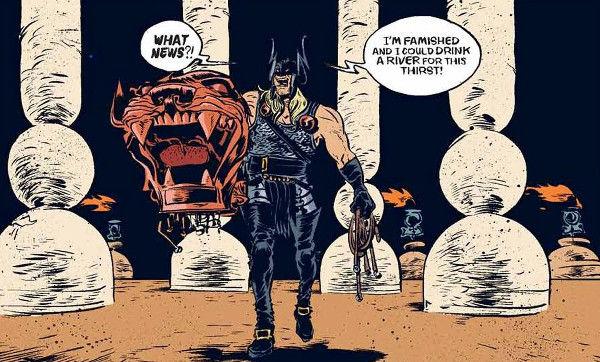 SPURGEON: Where is
SPURGEON: Where is Valerian
in Battling Boy
, Paul?
POPE: Battling Boy's dad is based on a character from one of the
Valerian books, which in turn is based on Thor. This is going into the art catalog, because I'm pretty certain that Kirby got the idea for the look for Thor from the
Fritz Lang film
Die Nibelungen. This is a German silent film from the '20s. He would have seen this. He would have seen this as a young guy living in New York. He would also have seen
[Sergei] Eisenstein's
Ivan The Terrible, which has this great scene in it with this Black Knight character. So in the art catalog, part of the purpose is to show young readers the influences, and the tradition of oral storytelling, the story of Theseus or whatever it might be -- these are everyone's stories. These are universal. When you re-tell them, you embellish them. You add a little more to it. In this case, the character Dad is not Thor, he's not Genghis Khan, he's not Darth Vader. He's secondary, though. The story is about this new kid.
This is all coming from
Joseph Campbell and
Carl Jung. Some people roll their eyes when they hear a cartoonist talking about Joseph Campbell again. He really locked in on a sense of Story in a capital-S sense that I find refreshing and kind of universal.
SPURGEON: Everyone gets to Campbell through Bill Moyers, which is kind of getting him at a slight remove.
POPE: I have about 80 hours of audio records of Joseph Campbell's lectures from
Sarah Lawrence. Back before
TED Talks. He had a series on
the Upanishads. He had a series on the grail mythologies. Tibetan mythology. Native American mythology. A lot of stuff is the bedrock of getting into it. With Carl Jung, I've read a lot of his books. I have a copy of
The Red Book, in fact, which is his personal
mandala book. He has a book called
Man And His Symbols. He lays out the theory of the collective unconscious. I'm not sure if I exactly subscribe to this, but he points out that there are universal symbols: the womb, the moon, blood, skulls, a rose. This type of stuff. He points out how throughout history different cultures have appropriated these images into their stories in order to make sense of the world. This is all mythological stuff, right? But to me this is a lot more interesting than going back and re-doing another version of
Spider-Man.
SPURGEON: You have a body of work now, Paul. Do you
make sense of the world through your art and your comics? We've talked about the problem-solving aspect of making art, but in terms of the wider meaning of things, is engaging that something art enables you to do?
POPE: The thing that makes the world make sense to me is the discipline of drawing. I'm a very neurotic, nervous, agoraphobic personality type. I find a great meditation in drawing. A sense of solace. I'm a sensitive type. I'm prone to brooding a lot, and lethargy. I feel like this is the saving grace. The reason I started drawing as a kid is because it was a way to live. Luckily, I got to the point where I was proficient enough to make a living at it. And now it's a daily discipline. We were saying earlier that right now it isn't always
daily discipline because there's so much more business, but I am patiently thinking that one day... it's like starting up the engine -- someday I won't have to worry about five hours of e-mails.
SPURGEON: Even when something is absent but felt, it's still sort of there. You're not able to do it; it's not that you're not doing it. I think those are two different things in many senses.
POPE: As a self-publisher I did have a lot of experience in the '90s having employees. Cash flow issues, shipping things, but also the public side of it where you're out on the road and you eat and drink but don't get sick. All that type of thing.
 SPURGEON: You've talked about some of your influences already. One thing I've liked about our discussions over the years is that you seem kind of omnivoracious in terms of your reading -- even your comics influences. Do you still do that? Do you still engage with new art that way? When was the last time you saw something that turned your head, maybe something that you wanted to fold into your own work?
SPURGEON: You've talked about some of your influences already. One thing I've liked about our discussions over the years is that you seem kind of omnivoracious in terms of your reading -- even your comics influences. Do you still do that? Do you still engage with new art that way? When was the last time you saw something that turned your head, maybe something that you wanted to fold into your own work?
POPE: I'm reading a lot of biographies. Right now I'm reading the journals of the French painter
Eugène Delacroix along with this book suggested by Mark Siegel,
Daily Rituals. Actually,
Rituals I read in about two days. It's one of those books you can't put it down. I didn't realize this, but in France Delacroix is equally known as a diarist as he is as a painter. He's an 18th Century French classical painter. He was a really brilliant, sensitive, hard-working artist. And he also was very articulate. So it's been really great getting a glimpse into his personality and his daily habits. His thoughts. Right now that's something that's really turning me on. Next I'll probably move onto reading Emerson. Mark Siegel gave me a copy of
Stephen King's book, On Writing, which I'm told is a very good "life of a writer" book. And I keep a journal as well.
Sometimes people ask me if I'm ever going to do a technique book or if I'm going to publish more essays. It might be interesting to do that. I'm not sure we have a lot of cartoonist autobiographies.
SPURGEON: Paul, the last time I saw you was in Ohio, but I think of you as a New York City guy now; you've been there around 20 years. Battling Boy
, like a lot of your work, is very much a city book. The city in Battling Boy
... is it called Acropolis?
POPE: I inverted Acropolis. It's Arcopolis. The arc-light of lightning. Struck lightning, energy and electricity is a big part of this book, so I wanted the name to reflect, somehow, electricity and science fiction.
SPURGEON: Do you see yourself as an urban cartoonist? There are a lot of French comics with a city-centric orientation, books that seem to see themselves as existing, at least in part, for the sake of exploring a city or cityscape. Do you ever feel you're working out your feelings about cities working within these fictional constructs?
POPE: Yeah, maybe. I like the immersion and the randomness of living in the city, the anonymous quality of it. Every day you can go and see new people, experience new things. I grew up in a small town. It was very frustrating. Once you had an identity put upon you, you were that forever. When I was pretty young I knew I wanted to take off and go live in a big city.
For
Battling Boy, I didn't want to set the story on Earth. It's like an Earth-2, an alternate earth -- mainly because the first thing I started thinking about is that if there was a problem here with monsters coming out of the woodwork and stealing children, the first thing you'd think of is blowing them up with a suitcase nuclear bomb or something. I wanted to make this a planet where they didn't have atomic technology. I wanted a feel of the 1930s serials,
the old Flash Gordon serials. Haggard West is a Flash Gordon-type character.
 SPURGEON: When you work with First Second... this first
SPURGEON: When you work with First Second... this first Battling Boy
volume is a book that works squarely within the parameters that First Second has established. One of the ways you made your reputation is as an extravagant designer, particularly within the context of the mid-1990s. I thought your work stood out that way; it was at the very least something quite noticeable about your work. I wondered if it was a shift for you to work with this disciplined, market-sensitive design constraint when so much of what you've done has been extravagant and over the top. Did that take some getting used to?
POPE: It's a real frustration, to be honest. But it's a model they know sells. Jack Kirby might have wanted to do all treasury editions of everything, but he was stuck in the pamphlet. In some ways I know that
Battling Boy provides a foundation.
The art catalog we're doing is pretty far out. The designer is Jim Pascoe. He's a great friend of mine. He just sent in the PDFs of the guts of the book, and it's really sick. I'll send you the cover for
Escapo that he designed. I asked him to do something like
wheatpaste and he turned something in that's so far out. We're talking about doing an omnibus, over-sized
Battling Boy book later. The catalog isn't
The Art Of Battling Boy, it's the touring catalog in French, Italian and English to correspond with the shows.
We hope there's an opportunity to do some stuff with First Second that's a little out of their normal -- I hate to say "wheelhouse." That's such a cynical term. They did publish the
[Emmanuel] Guibert book,
The Photographer, and they're thinking of publishing more books at different sizes. If you look at what Macmillan publishes, it's all kinds of stuff from cookbooks to poetry books to non-graphic novels. That kind of stuff. They are able to do different kinds of things, but they're an established company with a business model that works. In my case, I didn't have a vote for the size of
Battling Boy. The French edition is cool, it's a little larger. It's not quite the size of a normal
bandes dessinees, but it's bigger. So if anybody gets a chance to see that, it's kind of cool.
 SPURGEON: Do you feel that you've had enough of a career to have had an influence on the course of comics? Do you see yourself or your past work in things that come out now? Do you feel like people have picked up on what you've been up to over the years?
SPURGEON: Do you feel that you've had enough of a career to have had an influence on the course of comics? Do you see yourself or your past work in things that come out now? Do you feel like people have picked up on what you've been up to over the years?
POPE: When we last saw each other in Columbus, it did strike me that we were in a full auditorium at the
Mershon, and I was on stage with
Jeff Smith. Everyone knows him. He's a tremendous cartoonist. Multiple millions of copies of
Bone. He's one of my favorite living cartoonists. I'm on stage with this guy. I realized this is my life. I've known this guy for 25 years. I'm now sitting on the stage where I saw
Martha Graham. Where
Jimi Hendrix performed. Where I saw Kabuki theater.
Philip Glass. I'm on that same stage now and people are listening. They're responding. They like the stories we're telling. There are stories to tell. That was kind of cool, although I've never been a guy with a kingly attitude -- where I have to be the best or the greatest. I'm more like a long-distance runner where I have to give myself a challenge.
I don't like teaching. I cringe at the thought of portfolio reviews. [Spurgeon laughs] Telling people critical stuff about their work. I want to be invisible.
*****
*
Battling Boy Vol. 1, Paul Pope, First Second, various formats, 9781596431454 (ISBN13), October 2013.
*****
* cover to the US edition
* photo of Paul Pope by me, 2010
* various images from
Battling Boy, including the one below, save for the woman on the bicycycle, which is just an image I like, the
Escapo cover Paul sent, and a photo I took of Paul doodling in a bar in Columbus in November
*****
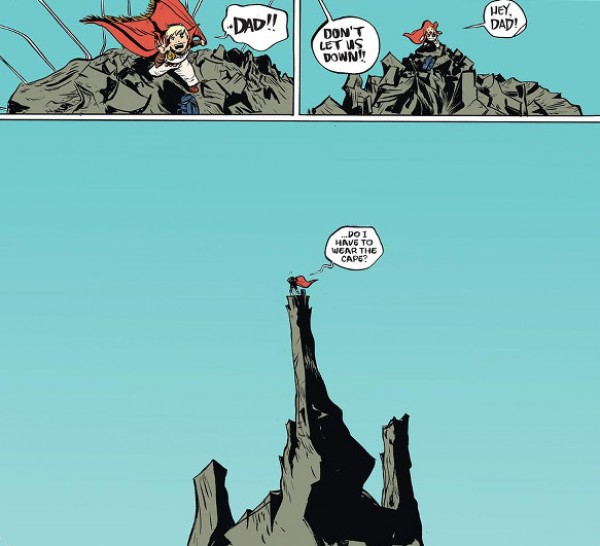
*****
*****
posted 4:00 pm PST |
Permalink
Go, Look: Approaching The Air Fortress

 posted 3:54 pm PST
posted 3:54 pm PST |
Permalink
Go, Look: Marvel Magazine Ads

 posted 3:50 pm PST
posted 3:50 pm PST |
Permalink
Zak Sally Begins A History Of La Mano
 Here
Here. Zak Sally's small press is admirable both for its output and for its general orientation, and I think Sally himself a really interesting cartoonist and comics figure.
posted 3:45 pm PST |
Permalink
Go, Look: John Romita, Jr. Black And White Pages

 posted 3:40 pm PST
posted 3:40 pm PST |
Permalink
Valuable Denys Cowan Original Art Lost By UPS

Michael Davis writes about the frustrations of trying to find an outcome for a significant instance of lost delivery material
here. The primary thing about a story like this is that it's awful for Denys Cowan and to a lesser degree the people that were going to see the work in question in the Milestones show planned. I say that because I don't want to minimize the specific pain here for a more general point. I think the general point here is worth engaging, though, that it's slightly terrifying to ship valuable art for a lot of publishers and artists, and every so often you hear a horror story like this one. For whatever it's worth, when I had to send about $20K in art about three years ago, I asked around with about a dozen people and the general sense was that in order of trustworthiness they favored the USPS sign-at-every-step-and-store-locked option, Fed Ex, and then UPS. The only problem with the USPS option is that at least three years ago it was still so old school that they didn't have the ability to allow you to track the package on-line at every stop.
I hope there's a positive outcome here, and I think a Milestone-related show is a great idea.
posted 3:35 pm PST |
Permalink
Go, Look: Jean de Wet

 posted 3:30 pm PST
posted 3:30 pm PST |
Permalink
This Isn’t A Library: Notable Releases To The Comics Direct Market


Here are the books that make an impression on me staring at this week's no-doubt largely accurate list of books shipping from Diamond Comic Distributors, Inc. to comic book and hobby shops across North America.
I might not buy all of the works listed here. I might not buy any. You never know. I'd sure look at the following, though.
*****
JUL131237 INFOMANIACS HC (MR) $22.95
This is the comic-shop debut for the last book out from Dan Nadel's PictureBox Inc. publishign house, and I agree with Nadel's sentiment that it's a fine one to end on. If your store was a supporter of PictureBox and has this book on hand, you shop at a very fine comic book store.
SEP130460 TARZAN RUSS MANNING NEWSPAPER STRIPS HC VOL 02 1969-1971 $49.99
Back in the 1990s when jaded comics fans would come to me for an area of comics they might enjoy exploring, a new genre or group of books, I always recommended "Tarzan" as its own category. One of the better expressions within that category is the newspaper strip work by Russ Manning, something that might have avoided even the wealthiest and most obsessed comics fan of my acquaintance 15 years ago. You only have to have a reasonable amount of money to have tons of this material now. I'm glad these are being done.
OCT130046 DARK HORSE PRESENTS #31 (MR) $7.99
I have very little to say about the content of these books issue to issue, but I'm always amazed at how regularly published this title is, how many issues they've done so far. I can imagine a life for myself that didn't involve working at Fantagraphics where this new version of their anthology is a major stopping point for my comics shop visits.
OCT130958 SERGIO ARAGONES FUNNIES #11 $3.50
OCT130060 BPRD HELL ON EARTH #114 $3.50
OCT130055 ITTY BITTY HELLBOY #5 $2.99
OCT130185 HARLEY QUINN #1 $2.99
OCT130595 BOUNCE #8 (MR) [DIG] $2.99
OCT130619 SAGA #17 (MR) [DIG] $2.99
OCT130622 SEX #9 (MR) [DIG] $2.99
OCT130713 FANTASTIC FOUR #15 $2.99
OCT130714 FF #15 $2.99
This is a compelling week for the higher-end genre material in serial comic book form. You want everything that Sergio gives us, and this anthology comic has had a lot of primetime material, I think. There are the standard two Mignola-verse titles -- one and a half, if you insist. The
Harley Quinn title has some buzz because of a page that was featured in a try-out contest by DC that featured a joke about suicide that didn't seem like the best idea for the company given issue concerning the depiction of women in mainstream superhero comics. I read this issue; it seems like a really standard borderline superhero/supervillain story, and those bored me to tears even when I was a kid. Lot of good artists for that kind of material contributing a page here and there. Two Joe Caseys sandwich the very popular
Saga comic, which has a nice rhythm to it in terms of balancing this kind of epic sprawl represented by the child's life story with the jittery quality of a narrative that could kill any character any time. That doesn't strike me as common or necessarily easy. Finally, these two
Fantastic Four series are nearing their post Marvel soft not-a-relaunch run; I don't know what you do with that title at this point, and I'm almost afraid that the only thing you can do is an unnecessarily grim approach that would be like watching one of the characters on
Downton Abbey starting to cook meth.
OCT130281 WAKE PART ONE #1 (MR) $9.99
This Scott Snyder/Sean Murphy series is at its halfway point and this expanded "floppy" represents an odd strategy for getting out those first five issues not just putting them into trade form. Snyder is box-office gold right now in certain worlds of comics, so I imagine it will do very well, but I don't get why Image can do trades at this price and DC can't. If I were a fan, I'd skip it entirely, and I might not if it had a spine.
AUG130398 LOCKE & KEY ALPHA #2 CVR A RODRIGUEZ [DIG/P+] $7.99
AUG130399 LOCKE & KEY ALPHA #2 CVR B BISLEY $7.99
AUG130400 LOCKE & KEY ALPHA #2 CVR C FABRY $7.99
AUG130401 LOCKE & KEY ALPHA #2 CVR D KALUTA $7.99
AUG130402 LOCKE & KEY ALPHA #2 CVR E SIENKIEWICZ $7.99
AUG130403 LOCKE & KEY ALPHA #2 CVR F SIM $7.99
AUG130404 LOCKE & KEY ALPHA #2 CVR G WRIGHTSON $7.99
Not a big fan of the variant covers, but that's a semi-astonishing line-up of superstars from the last 35-40 years of genre comics-making. That's interesting to me in and of itself.
AUG131403 ASTERIX AND THE PICTS HC $14.95
A passing of the torch, as this 35th volume in the popular series is the first not written by Rene Goscinny or Albert Uderzo. It will sell bonkers-level amounts anyway. I don't exactly know what it is about the classic series in the French-language market, but they seem to have unique event status due to the cultural ubiquity. I can't imagine this isn't the best selling comic of the year in Europe, and don't know the
One Piece numbers to be able to suggest "the world."
JUN138036 COMPLETE PEANUTS HC VOL 05 1959-1960 (NEW PTG) $29.99
It's good that Fantagraphics is keeping these in print.
OCT131323 WORLD WAR 3 ILLUSTRATED #45 (MR) $7.00
Finally, I'd look at this publication based on the cover even without the pedigree. I always think of WW3I as a very New York book, and it seems to have become even more so over the year -- at least to my way of thinking.
*****
The full list of this week's releases, including some titles with multiple cover variations and a long, impressive list of toys and other stuff that isn't comics,
can be found here. Despite this official list there's no guarantee a comic will show up in the stores as promised, or in all of the stores as opposed to just a few. Also, stores choose what they carry and don't carry so your shop may not carry a specific publication. There are a lot of comics out there.
To find your local comic book store,
check this list; and for one I can personally recommend because I've shopped there, albeit a while back,
try this.
The above titles are listed with their Diamond order code in the first field, which may assist you in finding comics at your shop or having them order something for you they don't have in-stock. Ordering through a direct market shop can be a frustrating experience, so if you have a direct line to something -- you know another shop has it, you know a bookstore has it -- I'd urge you to consider all of your options.
If I failed to list your comic, that's because I hate you.
*****

*****
*****
posted 3:25 pm PST |
Permalink
Go, Look: Lee Weeks Draws The Hulk

 posted 3:20 pm PST
posted 3:20 pm PST |
Permalink
Go, Look: Weng Pixin

 posted 3:10 pm PST
posted 3:10 pm PST |
Permalink
Random Comics News Story Round-Up


* I don't want to overstate the great joys of finding a fun and offbeat comic book series when you're a young person and comics are important to you, but it's a definite pleasure, the early to mid 1980s weren't exactly a time when it was easy for a reader with mainstream-comics expectations to find a lot of work that was different than the rigid norm. I don't know what it was like for most comics-reading teens, but the idea that I had slightly loftier taste than most of the other people at the shop was part of my self-conception as reader back then, and comics like
Thriller were ready-made for me. This was also a time that because of the dearth of good comics on the stands -- you could buy all of them on a 14-year-old's budget -- you were inclined to give a kinder reading to books that tried to do something different but maybe didn't execute everything they tried with aplomb.
* Mike Sterling sent along
this post he made about one of those Neal Adams-drawn
X-Men comics I like, reviewed by a reader right on the book itself. Someone should do a 'zine of comics reviews written on art from the comics themselves. I would buy that 'zine.
* Rob Clough, a recent beneficiary of comics culture largesse,
would like you to know about some of the fundraisers that have caught his attention.
* John Kane on
a bunch of different comics. Andrew T. on
Brooklyn Quesadillas. Sean Gaffney on
Attack On Titan Vol. 10. More folks writing about
comics they'd like you to consider from 2013. Henry Chamberlain on
The Encyclopedia Of Early Earth. Richard Bruton on
It Girl,
Weak As I Am and
Youthful Attack. Robert Stanley Martin on
Blue Is The Warmest Color.
* world,
Bob Temuka would like to visit your comics shops.
* Sean Witzke talks to
Michel Fiffe. Matt Badham talks to
Neill Cameron. Gil Roth talks to
Kipp Friedman.
* finally,
What If The X-Men Were Black?
posted 3:05 pm PST |
Permalink
Happy 60th Birthday, Richard Krauss!

 posted 3:00 pm PST
posted 3:00 pm PST |
Permalink
Go, Read: The Death Of The Age Of Stuff

 posted 3:00 am PST
posted 3:00 am PST |
Permalink
Festivals Extra: Stumptown To Merge Its Events With Rose City Comic-Con, Ending Stand-Alone Show


Alison Hallett at the
Mercury in Portland, Oregon
has the story of the Stumptown Comics Festival ending its stand-alone show in favor of a partnership with Emerald City Comic-Con's Portland-based show Rose City Comic-Con in terms of specific aspects of its primary event, including programming and its awards. They will also seek to fulfill their non-profit mandate by pursuing non-show outreach like a potential lecture series and work with schools.
You should read Hallett's story rather than any summation or liberal quoting of it here.

Stumptown as a stand-alone festival was an important show in the bridge period between the initial
SPX era of small-press shows and the modern, more hardcore arts festivals. I enjoyed the early shows I attended at the Doubletree and had a good time at the one I attended at the convention center last Spring. That there were even shows like Stumptown at all during a period of wobbly health for art-comics making -- even given the relative standards of what health in that world means -- that was sort of a miracle. It was an unlikely thing to have in existence even five years ago. So thank you, Stumptown.
That said, Stumptown was a
strange show the last couple of years. It is the most complained-about show of any I attended in the last three years. It had a strange relationship to some in the Portland comics community. I spent time with two prominent Portland-resident alternative comics cartoonists in 2013 a couple of days before the event who literally did not know which weekend the festival was until my arrival in town told them. Similarly, there were always rumors about a split on the organizing board between those that had what one Portland described to me tongue-in-cheek as "ECCC Envy," and wanted a show with the surging popularity of Seattle's Emerald City, and those that wanted more of a hardcore arts festival that reflected the city's rich tradition of alternative comics talent more wholly and explicitly. As Hallett points out, this battle for the soul of the show was frequently fought on quotidian battlefields, such as a tussle between those that thought the convention center was the only suitable venue for a show of that size and those that felt that any place with a personality would have been preferable, even if that meant a few more people couldn't exhibit or people from outside of the town proper had to struggle a bit for parking.
One thing I noticed when I was at the 2013 version is that enthusiasm for the show had been dampened ahead of anything I could tell was structurally or physically or even conceptually wrong with the event. I stayed at the host hotel within a short walk of the convention center, liked it there, the room where the event itself was held was boring and had problems but didn't seem a deal-breaker of the kind that could have killed an enthusiastic crowd, the programming rooms were fine and the programming slate smart enough, I could walk somewhere for drinks, the parties were good, and so on. But it still felt deflated, like Portland's comics community had had such a horrible argument behind closed doors that this was the final family road trip before the divorce.
There will be other Portland small-press shows. In addition to their having been two "Projects" events focusing on process and comics-making hosted by Floating World, Hallett's article hints at another announcement forthcoming, likely but certainly not guaranteed to be some sort of replacement event. I would imagine the model presented by Short Run in Seattle would be encouraging to anyone attempting to do so. It seems to me that the natural life of the previous show had expired.
 posted 2:00 am PST
posted 2:00 am PST |
Permalink
December 16, 2013
 By Request Extra: I Keep Skipping The Hic And Hoc Sale And Now I Feel Like Krampus So Here It Is
By Request Extra: I Keep Skipping The Hic And Hoc Sale And Now I Feel Like Krampus So Here It Is

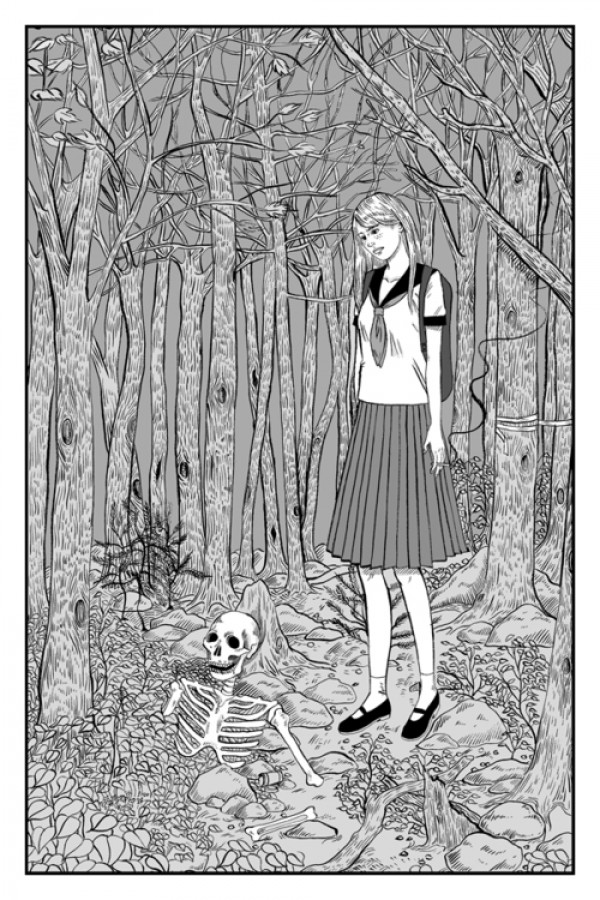
The small-press publisher Hic and Hoc
is having a codeword-enabled sale from now until December 31. This stand-alone post is to remind me I keep forgetting to mention it in the "By Request" posts.
I have to imagine that all the publishers and all the cartoonists and all the stores could use a few extra sales over this holiday season, so I hope you'll spend any money on comics wisely.
posted 10:00 pm PST |
Permalink
Go, Look: Five-Page Sophia Foster-Dimino Comic

 via
posted 4:00 pm PST
via
posted 4:00 pm PST |
Permalink
Shia LaBeouf Apologizes For Elements Of Plagiarizing Daniel Clowes’ Comic For A Short Film

You can go several places on-line --
here's one! -- to track the twitter barrage via which the actor and occasional comics-maker Shia LaBeouf apologized for taking material from Daniel Clowes' comic "Justin M. Damiano" to service his extremely similar short film "HowardCantour.com." A posting of the film -- which was shown at Cannes in 2012 and was directed by the actor -- led to people quickly picking up on similarities including wholesale lifting of lines from Clowes' 2005 comic, a reasonably obscure work for the cartoonist that was published in 2007 in an anthology
The Book Of Other and most recently re-appeared as part of
The Daniel Clowes Reader. The film was subsequently taken down.
This will be played out in Internet court all day, and in comics Internet court for maybe the next three, where I imagine that you're going to see the actor get credit for the straightforward embrace of culpability, but also get slammed for the stuff where he crouches in the gray area between "copy" and "inspiration" as his answer to the perceived question of "what were you thinking there exactly?"
It will also be pointed out -- and it should -- that LaBeouf grew up in that industry and has enough movie experience in all sorts of different roles making them that this kind of thing should be super-clear by now. He's also a comics fan that knows and purports to respect comics.
I have to admit, I kind of thought that this might be the approach pursued. I'm certainly open to the possibility that this is a case that involves the actor just not registering this was a bad thing until it was pointed out to him, as opposed to someone slyly trying to sneak something by folks: a mutant creature of a bizarre moral orientation, self-indulgence, denial, celebrity entitlement, our world of easy borrowing and comics' traditional role as fodder for other media, often uncredited. No matter how you get there, it still sucks. That guy fucked up.
I also feel badly for Daniel Clowes, one of the great cartoonists, who I imagine in no way wanted to deal with this avalanche of bullshit, some rocks from which will likely hit him on top of his head just for having been involved. One of the awful things about plagiarism is that the person being plagiarized is suddenly attending a party against their will, a pain in the ass above and beyond then having to secure credit for your work as it stands opposed to someone else's appropriation of that work or however one chooses to react. No one wants to spend a few days before Christmas like that. I'm sure Dan has things he would much rather be doing.
No positive outcome absolves the negative circumstance that precedes it, but if you haven't read the comic,
The Daniel Clowes Reader was a very strong book of its type, maybe the best I've ever read. You could do worse than to buy a copy for anyone in your circle of friends that expresses interest in this goofy story or that liked the movie (the only reader review of which I read had praise for a funny line: one direct from Clowes).
Weirdly, as reader John Boren
pointed out to me on twitter -- whether his original observation or not, I could not tell you -- LaBeouf's apology seems very close in wording and tone
to a response in this Internet thread on the bad/good artists steal/copy quote.
Update: Mr. Boren has tweeted the observation about LaBeouf's apology originated with
this person.
posted 3:55 pm PST |
Permalink
Go, Read: TEOTFW Over At What Things Do

 posted 3:50 pm PST
posted 3:50 pm PST |
Permalink
Bundled Extra: Marvel + Wizard World Launch Variants Program

I thought
this bit of PR worth mentioning because, if I'm understanding it correctly, it's a program by which people that attend Wizard World shows at certain levels of money paid will get as one of their perks a variant-cover issue of a comic book. Variants aren't a new thing, but the level of specific targeting we see with variant covers is indeed something new, and conventions are one of the entities -- along with specific stores and specific comics-related charities -- participating in such programs. I am of the mind that when rampant they are generally harmful to comics in the way I want to see comics succeed -- as a popular art form driven by content as opposed to a collectibles activity driven by overt market manipulation. I wish they didn't exist. At the same time, I have a hard time working up a panic over individual instances, and can sort of understand wanting a special cover for a special issue of a series I'm following, or whatever. I suppose what I'm getting at is an
orientation towards this kind of thing might become deeply worrisome, or at least needlessly distracting, and thus demands our attention.
posted 3:45 pm PST |
Permalink
Go, Look: John Buscema Cover Mini-Gallery

 posted 3:40 pm PST
posted 3:40 pm PST |
Permalink
By Request Extra: Various Folks In Need Of Funding
 By Tom Spurgeon
By Tom Spurgeon
* efforts to help Stan Sakai as he attempts to make up a home healthcare insurance gap
remain ongoing. Please note the CAPS paypal button is working again. Sakai is one of the great, classy pros out there and I hope you'll consider helping him out.

* if you have a favorite artist and some extra cash it's worth a reminder that a lot of creative people are doing holiday sales and most of them are doing it for the reason they could use the extra money -- not in a desperate way, but in the way that making art isn't always all that secure a profession, and certainly not for as much as we get from a lot of those people. One artist just brought to my attention doing a sale right now is
Joëlle Jones. Two other cartoonists with self-directed sales I've been tracking this holiday season are
Gabby Schulz and
Tony Millionaire. There are a ton more.
* I'm told
this cartoonist is having a sale for the specific purpose of replacing a stolen laptop. That would be a nice thing for you to do, plus the comics look pretty cool.
* as I mentioned yesterday, the other basic advice I have for right is to maybe not
count on any artist being able to fulfill orders at this point; some even suspend sales around this time so as not to disappoint or so as to better reflect time away from the studio and/or the piles of things being sold.
* it also might be a good day to make a trip around the established charitable comics Internet as detailed by scrolling down to #59
here.
* the Sequential Artists Workshop
is seeking a few thousand dollars in support of its 2014 programs. That one has a ton of time left, but it still feels to me like it's underperforming a bit, so please check it out. That money will be well-spent.
* finally, as will be the case this entire month, Dan Nadel
continues his 50 percent off sale at PictureBox as that company winds down the front-list part of its admirable life. There is
so much great material there, so if you're looking for a gift for yourself or for the hardcore art-comics fan in your life, have at it.
posted 3:35 pm PST |
Permalink
Go, Look: Paul Paetzel

 posted 3:30 pm PST
posted 3:30 pm PST |
Permalink
Bundled, Tossed, Untied And Stacked: Publishing News
 By Tom Spurgeon
By Tom Spurgeon
* there's a surprising amount of publishing news given that people are beginning to shut it down for the holidays. Okay, it's not a lot, but basically
any amount of publishing news strikes me as odd right now. If you pair that with stuff that gets announced just as on-line booksellers grind through another month of releases making it to their sites, and it's a party.

* Image Comics put word out of a
Stray Bullets revival of some sort
via a visual teaser. I don't know that I can think of anyone who would think David Lapham's 1990s to mid-'00s crime series a poor match with that publisher's current series line-up, but I guess it's possible. Sounds good to me.
* this caught my eye:
one of the Marschall Books releases promised in 2010 to arrive from Fantagraphics. I asked Eric Reynolds, and they said that even though those works have been delayed, they are still on board and those should start seeing the light of day in 2014.
* finally: I made a stand-alone post of
Pikitia Press announcing its 2014 publishing season highlights, but
here it is in case you missed it.
posted 3:25 pm PST |
Permalink
Go, Look: Small Bernie Wrightson Gallery

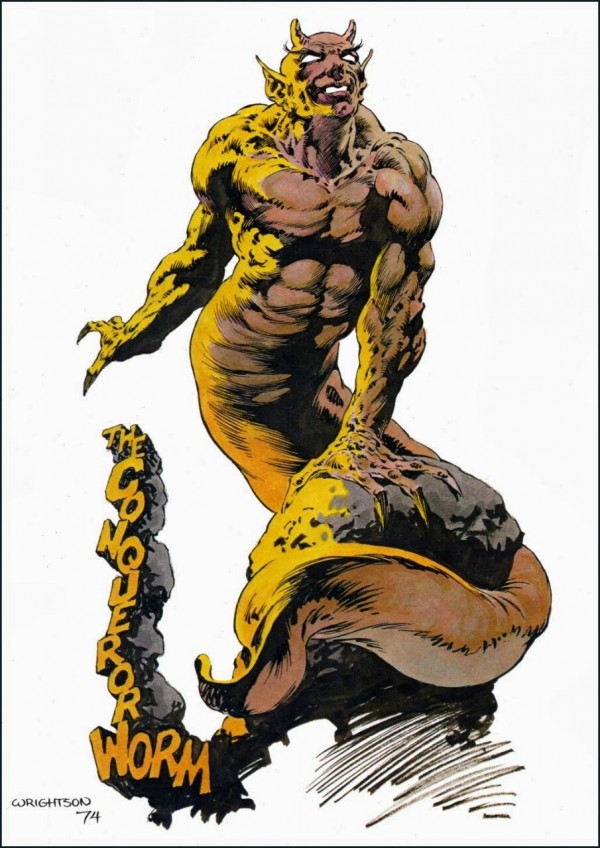 posted 3:20 pm PST
posted 3:20 pm PST |
Permalink
Go, Look: Ruta Briede

 posted 3:10 pm PST
posted 3:10 pm PST |
Permalink
Random Comics News Story Round-Up

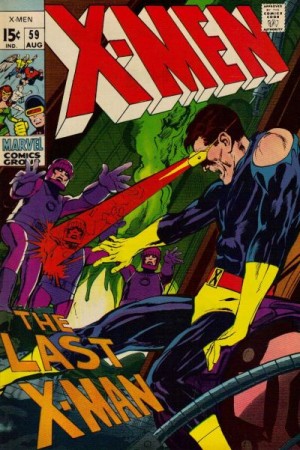
* this was one of the favorite comic books I ever bought through back-issue channels; in fact, I was
hugely fond of that whole post-Xavier's death mini-run on the title. I also like the Werner Roth stuff, for some reason. When I was a kid that style seemed to me to be "old comics" in a way that cleaner styles weren't. Plus they were affordable, and the Jack Kirby-drawn stuff really wasn't. But the Adams issues? I liked the way they looked, and they were obsessed with death in a way that the modern
X-Men comics I was reading at the time enjoyed a fascination with things being killed. Also, for some reason I always really loved that Cyclops was sitting on a sentinel head here.
* Molly Crabapple talks to -- and draws --
Art Spiegelman.
*
I'm not sure I knew that Melissa Mendes has a dedicated store.
* OTBP:
Jonny Negron + Sean T. Collins = Flash Forward.
* Kevin Leslie on
King-Cat. Henry Chamberlain on
Pompeii. Todd Klein on
Green Lantern Annual #2 and
Suicide Risk #1.
*
this is a really old post from Luke Pearson, I think, but the exhibit and his contributions to it both seem interesting.
*
every so often I'll check out Eric Reynolds' massive edited/acquired list with Fantagraphics. No real reason, it just makes me feel good.
* Richard Sala draws Christmas holiday-themed ladies:
1,
2.
* not comics:
I really, really like the Stefan Norblin.
* go, look and/or read: 1)
Lucy Bellwood's origin story. 2)
a Christmas story for Shark And Unicorn. 3)
four drawings from Darryl Cunningham. 4)
cover pencils for a forthcoming issue of Eltingvilleville Club. 5)
Leon Beyond explains dating. 6)
various Will Dinski pages. 7)
Chris Schweizer makes posters for episodes of Sherlock. 8)
actually, I'm not sure what this one is.
* not comics: former Fantagraphics and Devil's Due art director Evan Sult
writes about his day job, drumming.
* finally,
an exhaustive essay on the origins of the Sadie Hawkins dance. That makes it sound like I was really, really dying for an exhaustive essay on that subject, and I am perfectly fine with that.
posted 3:05 pm PST |
Permalink
Happy 50th Birthday, Bart Sears!

 posted 3:00 pm PST
posted 3:00 pm PST |
Permalink
Happy 59th Birthday, Michael Cherkas!

 posted 3:00 pm PST
posted 3:00 pm PST |
Permalink
Happy 61st Birthday, Ronn Sutton!

 posted 3:00 pm PST
posted 3:00 pm PST |
Permalink
Happy 45th Birthday, Matt Hollingsworth!

 posted 3:00 pm PST
posted 3:00 pm PST |
Permalink
Happy 59th Birthday, Beau Smith!

 posted 3:00 pm PST
posted 3:00 pm PST |
Permalink
Shia LaBeouf 2012 Short Film “Howard Cantour” Accused Of Lifting Material From Daniel Clowes Comic

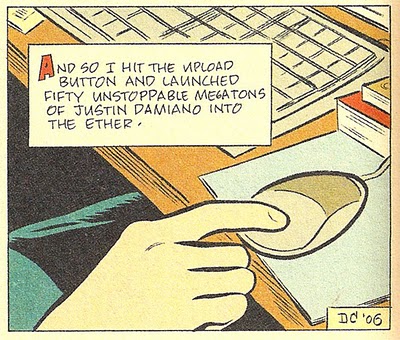
So I guess the actor Shia LaBeouf released a short film he made about an Internet film critic onto the Internet today and it's a lot --
a lot -- like the Daniel Clowes short comic "Justin M. Damiano," most recently included in
The Daniel Clowes Reader. I don't know what's more amazing,
that this happened or that no one noticed for about, I don't know, 18 months? I guess certain worlds don't cross streams, but still. The public posting and people subsequently noticing the similarity is the first Clowes heard of it, apparently.
Actually, let me take that back: that it happened is much weirder than it not being noticed. And the thought process behind it -- a thought process no one I've spoken to can fathom -- is the thing that may be weirder. Maybe we'll see if it gets unpacked a bit what the thinking was there.
I suppose someone might make some sort of stab at an argument that this kind of thing isn't seen as theft in some circles -- I've seen stridently passionate arguments of that type in the face of equally open-and-shut accusations -- but I can't figure out how any argument might be convincing. Someone just pointed out to me there's no script credit, so it could be that there will be a claim for the Clowes comic as something that "informed" the film in the same way that the conception that Jules Feiffer offered up of Superman in his "Great Comic Book Heroes" essay "informed" a chunk of
Kill Bill 2 script. Maybe. I don't know.
The whole thing seems aggressively awful to me, creepy and sad and fucked up.
Here's the comic, although I imagine that's an unwanted appropriation as well.
posted 6:00 am PST |
Permalink
Festivals Extra: First TCAF 2014 Poster Image, By Michael DeForge

 posted 5:00 am PST
posted 5:00 am PST |
Permalink
December 15, 2013
 Go, Look: Kevin O’Neill Nemo: Heart Of Ice Pages Up For Auction
Go, Look: Kevin O’Neill Nemo: Heart Of Ice Pages Up For Auction

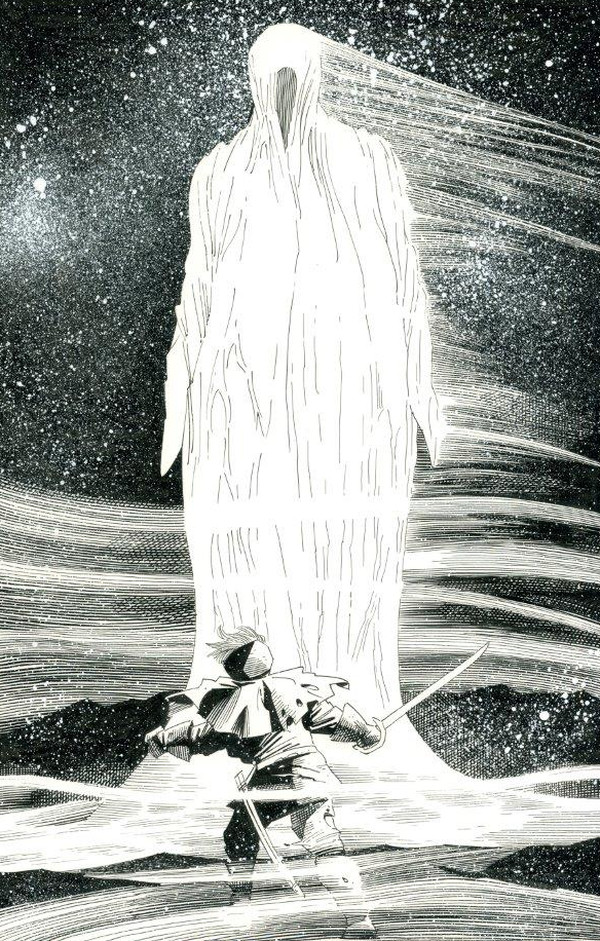 posted 4:05 pm PST
posted 4:05 pm PST |
Permalink
Head Of Fifa Wins Injunction Vs. Book Of Cartoons Featuring Him

The story I read is
here, originating with reporting
here. This story strikes me as a straight-forward one: a public figure with resources has blocked a book of satirical cartoons that he feels could damage his reputation, and as much as it is hard for some of us to wrap our minds around this there are countries where this kind of thinking is a matter of legal concern and therefore you see injunctions like this one. Actually, I guess this kind of thing could happen just about anywhere you could find a sympathetic judge, but it seems largely idiotic. As a billion people will likely point out, this also gives the book international publicity it wouldn't have had before, and whatever negative picture comes out of the book is compounded by the person in question seeking censorious action.
posted 4:00 pm PST |
Permalink
Go, Look: You’ll Be Mark

 posted 3:55 pm PST
posted 3:55 pm PST |
Permalink
Go, Read: Nick Jones’ Top Comics For 2013


The only very occasional writer-about-comics Nick Jones
has posted a best-of for 2013 at Existential Ennui. He does it in the form of "comics I read" which is really only a digression from a more standard list with one selection.
His choices are:
10.
Saga, Brian K. Vaughan and Fiona Staples (Image, 2012-2013)
9.
Sex, Joe Casey and Piotr Kowalski (Image, 2013)
8.
Fury MAX: My War Gone By, Garth Ennis and Goran Parlov (Marvel, 2012-2013)
7.
Hellboy in Hell, Mike Mignola (Dark Horse, 2012-2013)
6.
New Avengers, Jonathan Hickman, Steve Epting and Mike Deodato (Marvel, 2013)
5.
JLA, Grant Morrison and Howard Porter (DC, 1997)
4.
Optic Nerve #13, by Adrian Tomine (Drawn & Quarterly, 2013)
3.
East of West, Jonathan Hickman and Nick Dragotta (Image, 2013)
2.
The Manhattan Projects, Jonathan Hickman and Nick Pitarra (Image, 2012-2013)
1.
Lazarus, Greg Rucka and Michael Lark (Image, 2013)
posted 3:45 pm PST |
Permalink
OTBP: Kid Mafia Digest

 posted 3:40 pm PST
posted 3:40 pm PST |
Permalink
Pikitia Press Announces Highlights Of 2014 Publishing Slate


The New Zealand publisher Pikitia Press has announced highlights of its publishing slate for the first half of 2014
in a lengthy blog post appearing Saturday. Projects are:
*
Claire Melody, Bob McMahon
*
Die Popular
*
Let Me Be Frank #5, Sarah Laing (work pictured)
*
Lucky Aki, Barry Linton
*
Moa #4, James Davidson
*
New Zealand Reprint Comics, Geoff Harrison
*
The Art of Harry Bennett, Tim Bollinger and Geoff Harrison and Matt Emery
*
Wellington Stories, Tim Bollinger
Some of these may be continuation of series; the announcement is hard to parse in terms of certain particulars. You can also get basic descriptions project to project through that link.
posted 3:35 pm PST |
Permalink
Go, Look: Behind The Comics

 posted 3:30 pm PST
posted 3:30 pm PST |
Permalink
Comics By Request: People, Projects In Need Of Funding
 By Tom Spurgeon
By Tom Spurgeon
* looks like longtime DC editor
Bob Kahan's fundraiser to stay in his current apartment has gone over its initial goal, although I can't imagine any additional funding wouldn't be put to good use. I don't know that the surge came from the comics community when people started posting about it late last week, but maybe so, and if so, good on comics.

* just a note: this might be just about the last day that a lot of cartoonists -- even struggling ones -- will be able to accept a Etsy order to get something to you by Christmas, as 1) they'd be fulfilling the order themselves, 2) many single-owner Etsy set-ups start to shut down this week because of holiday travel and/or similar plans. Two cartoonists with self-directed sales I've been tracking this holiday season are
Gabby Schulz and
Tony Millionaire.
* efforts to help Stan Sakai as he attempts to make up a home healthcare insurance gap
remain ongoing.
Here's an even better link with -- hooray! -- a working paypal button. I guess the art is coming in for their planned art auction and they report that initial donations have been forwarded to the Sakais.
* as far as I know, you can still support Mark Newgarden and Megan Montague Cash
and their sale to help pay off recent flooding damage.
* the Sequential Artists Workshop
is seeking a few thousand dollars in support of its 2014 programs. That one has a ton of time left, but it still feels to me like it's underperforming a bit, so please check it out.
* there are still some old-fashioned "make my dreams come true" crowd-funders going this holiday season:
this Periscope Studios one will likely meet its goal in the next 50 hours or so, but nothing is guaranteed and you might want to get in on that if only in a pre-order fashion.
Here's one I ran last time from a very hopeful and insistent cartoonist.
* finally, as will be the case this entire month, Dan Nadel
continues his 50 percent off sale at PictureBox as that company winds down the front-list part of its admirable life. There is
so much great material there, so if you're looking for a gift for yourself or for the hardcore art-comics fan in your life, have at it.
posted 3:25 pm PST |
Permalink
Go, Look: Love And Rockets Collection Endpapers

 posted 3:20 pm PST
posted 3:20 pm PST |
Permalink
Go, Look: Roméo Julien

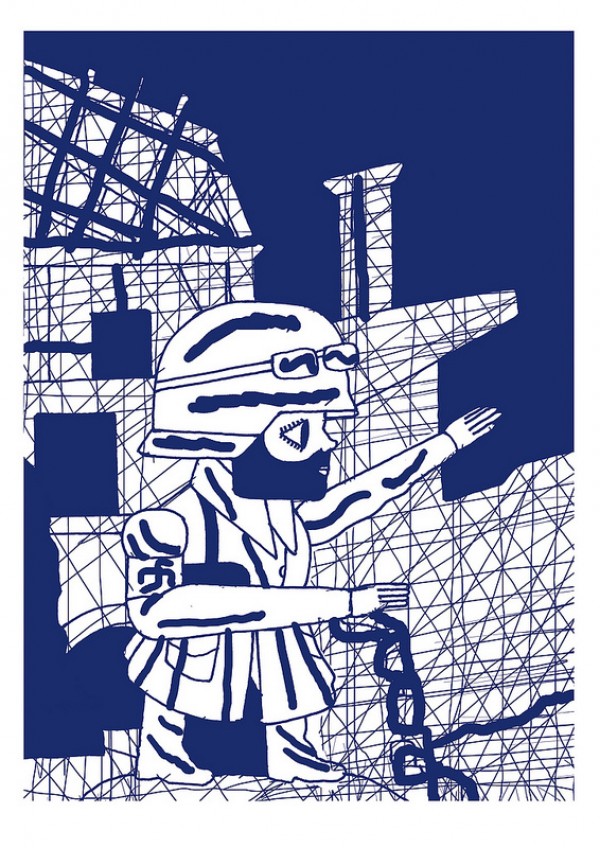 posted 3:10 pm PST
posted 3:10 pm PST |
Permalink
Random Comics News Story Round-Up


* for no particular reason, I'm going to eschew posting images related to a review for the holidays and just post old comic book covers where I remember liking the comic book when I encountered it 100 years ago. It took me a while to get on board with
Love And Rockets -- maybe three issues of the magazine -- but when it hit it hit like a ton of bricks and to this day it's the only comic book I've ever read in the car outside of the comic book shop. This was during that astonishing run in the issues from about #17-18 through #35 or so, my favorite period.
* sad to hear
that the Grasshut space in Portland's Floating World shop is closing. There is apparently a sale. I like very much the idea of comic shops giving over part of their space to other retailers when that's a strategy that works, and I thought that particular relationship added to the distinctive nature of that very fine shop.
* Richard Bruton on
Carry Me and
Seasons. Derik A Badman on
a bunch of different comics.
* I have next to no eye for restoration and re-coloring, but
this European version of those Lee/Kirby Thor looks terrible to me. That probably means it looks super-terrible
or that it's actually awesome, such is my disconnect from any sort of ability to suss such things out.
*
there are very few comic strips that looked as good as Pogo.

*
there is a call out for presentations at the Comics & Medicine conference, schedule for June 2014 in that great city of Baltimore.
* Ryan Holmberg talks to
Deeptanil Ray. Tom Murphy profiles
Oliver East. Francoise Mouly profiles
Ad Reinhardt. Douglas Wolk profiles
Gilbert Hernandez.
*
Frank Santoro is starting up another round of his correspondence course and answers a bunch of questions about it here.
* not comics:
Matt Bors made a vine.
* finally,
this is a fondly-remembered
X-Men comic book splash page. One of the things I find intriguing when I look back at these kind of plot-driven elements is how much they seem to depend on the characters being a mostly blank slate, by which I mean they have a strong core identity -- or even a lack of one -- against which acting "out of character" stood as a strong contrast. I'm not sure you get the same "oomph" if the character of Storm were to act in a similar way now, because she's had so much history that she's acted in a variety of ways according to the dictates of creators and the needs of whatever plotline.
posted 3:05 pm PST |
Permalink
Happy 54th Birthday, Steve Murphy!

 posted 3:00 pm PST
posted 3:00 pm PST |
Permalink
Happy 81st Birthday, Quentin Blake!

 posted 3:00 pm PST
posted 3:00 pm PST |
Permalink
Happy 34th Birthday, Mike Bertino!

 posted 3:00 pm PST
posted 3:00 pm PST |
Permalink
Happy 45th Birthday, Ariel Bordeaux!

 posted 3:00 pm PST
posted 3:00 pm PST |
Permalink
What It Feels Like Turning 45

 posted 2:55 pm PST
posted 2:55 pm PST |
Permalink
December 14, 2013
 Go, Look: The Elements Of Painting
Go, Look: The Elements Of Painting

 posted 7:55 pm PST
posted 7:55 pm PST |
Permalink
Five Things I’ll Be Thinking Over As 2013 Becomes 2014

On a coffee-fueled Sunday morning, here are some of my broader thoughts on the shape of comics near the end of 2013, what underlying issues are of significant importance.
1. People And Their Contributions Matter
This sounds platitudinous, I know. I'm talking about something slightly more specific than the important way in which we all matter. I wonder sometimes that because so much of the money in the various comics industries is settled around those things where a property and its facilitators matter more than any single person working on that property or for that company, that we don't sometimes downplay the unique contribution of individuals across the board. This may be assisted by the fact that all of the industries that serve comics are quick to repeat success on all levels, so that what is one person's unique contribution one day is a corporate practice or artistic legacy the next. This is even further assisted by the self-lacerating mindset that everyone's contributions are of equal value. This last one I find fascinating because you can see it infecting a lot of how we grapple with institutions as well. If all achievement in comics does is simply to get you into the club through the same rope line as everyone else, if all anything you do grants you is an invitation to the party, then the nature and shape of your achievement hardly matters, and, besides, someone will pick up the slack if you want to take off. Hey, maybe they'll be hiring.
We should never shrug our shoulders when someone passes away, or reduce them by minimizing the collective loss to art form, community and industry. We should stop making facile connections between publishers and artists and entities as if what connects them -- usually phrased as what connects
us to them -- is easily achieved. There is no new Kim Thompson or new PictureBox Inc. or new Stan Lynde. There are those inspired by them and those working in their spirit, and maybe even those that surpass what they've done; that's not the same thing. It never is. We are diminished by those things we lose just as we are strengthened by their existence. We can value the House That Jack Built but realize and appreciate that Jack doesn't live there anymore. And if we choose to grapple with what losing people and precious institutions really means, it may be that we can better appreciate those that are still around.
2. We Still Have A Lot Of Work To Do On The Industry End Of Things
For as much as the bulk of the rewards seem to flow in their direction, I'm not sure we have anything close in terms of the collective non-creatives in comics to match the creative talent on hand right now. I include myself in that criticism. I think we could be a lot harder on that end of things, on our way to doing a lot better. I think we can improve even as we already have.
Why might this afflict non-creatives? I suspect that unlike the low threshold of participation that benefits the art form by helping us find voices and talents that we might never find otherwise, there isn't the same ruthless element of
making comics in comics-related roles that serves to winnow out the undeserving and slack in the same way as a blank page, a bottle of ink and pens and brushes might. I think non-creatives have a greater opportunity to settle in, and the same way this has never been healthy for the art form on those rarer occasions it happens for creatives the fact that our specific arts culture doesn't regularly challenge its non-creatives may be causing damage now, or at the very least allowing for things to settle far below where they should be. I also think that a lot of the defeatist horseshit that gets passed around about comics being really hard and hey, what are you going to do is something in which non-creatives as a collective whole maybe shouldn't get to traffic in because, with very few exceptions, they simply haven't accomplished enough to merit that cynicism.
3. Industry Is Desirable
I mean industry in the broadest sense here, so while I know that term can be manipulated to make a funny wisecrack or dismissive put-down and suspect that might be done in response to this point, what I really mean by industry is a connection that isn't based on everyone being friends but on a shared value of work and accomplishment. If you must: a community served by businesses and institutions in addition to being the place where your friends live.
I value my friendships in comics as much as anyone does; they are a great treasure of my life. Still, there are satisfactions and rewards and wonderful moments of actualization in having relationships other than those defined by being pals, just as one gets different things in one's everyday, physical life from businesspeople and elected officials and neighbors way different than we are, and from fellow citizens with whom our interest to interact is minimal. I think that may be true for comics as well. To put it another way: most people could not ask for better friends through comics, but they could probably use a few more customers, a few more generous patrons, a few more life-changing resources, a few more people to call and reasons to call them that aren't restricted to a personal support system.
A first step may be to value someone outside of our personal narratives, whose story is like our own but in whose index we might never appear, and go from there. A second step may be to act in ways and on behalf of people through the connection of comics rather than through the connections that comics facilitates.
4. Exploitation Is Everywhere
The three scariest things about the recent coverage of classic instances of industry exploitation are 1) the idea that what is legally permissible is the best outcome, 2) the idea that this doesn't happen anymore even if it's less likely to happen the exact same way, 3) the idea that this is only something that happens with million dollar properties and big-time corporations.
Comics is soaked in exploitation, and a person providing free content for someone else's glory and/or pocketbook is a shame no matter the number of zeroes involved. Ditto disproportional reward. Conversely, it's a victory whenever these policies and practices change. If we could come out of 2013 with the simple idea that if
anyone gets paid for something, the
maker should be paid, we would be significantly better off as an arts community. That's not enough, but it would be a start, and it would be moving the line of acceptable behavior from an embarrassing place to a less mortifying one. It's okay to judge a project by the reward it brings to its creators; that should matter, too. It's heartbreaking that even as our form's great artists have created work that shapes the world, we do so very little to shape a world that benefits those artists. We should look back on conversations like this ten years from now amazed that they ever happened. And because all of it matters, so does any progress made.
5. We Need To Take Better Care Of Ourselves
Too many artists have no idea what happens to their work when they die, no plan for retirement even for those who see that as an option, and no idea how they might participate in best securing their legacy when they're gone. I sympathize; I have work to do here, too.
I think all of us that make art or that work near the making of art can at some time in the next year confront the twin possibilities of what happens if we die before we hope to and what happens if we continue to live for a much longer time than our ability to see to our grandest plans allows. If your ability to work depends on willful denial, I get it, but that doesn't mean we're any less worried about you. That also doesn't mean there probably isn't something you can do in
some area of this kind of thing. If your art is so important to you right now that you're not going to think about the financial sacrifices you feel you have to make to see that through, then maybe you can figure out who controls that art if you get hit by a train. There are institutions that would love your comics and oh my goodness your personal papers -- this isn't true of all of us, but it's true for some. It might be worth reaching out. It's definitely worth mulling over.
One great thing about comics right now is that there's so much that can still happen but we can see the shape of it, and we can certainly engage with a lot of the realities as we ourselves move from one place to another. I'm encouraged that so many people want to spend a lifetime making comics or a lifetime in service of those that do. Next year might be the time to sort out what that really means, and to expand our definitions of taking care of things to something beyond going to the gym.
*****
This site will host some everyday blogging over the next few days, and then move into the Holiday Interview Series with full blogging on down the page in terms of any breaking news, a model that will end with us on the other side of the New Year. Hopefully in 2014 I can write about some of the above issues on this site in more straight-forward, detailed fashion. An even greater hope is that we might progress on these and other issues that matter.
*****
*****
posted 7:50 pm PST |
Permalink
I Have A Couple Of Spare Wildwood Things To Mail Out


I have a few loose sheet collections of
Wildwood sheets from a book proposal that failed to find much interest back in 2010. It's about 10 pages of strips, a pretty good selection. If you actually know me/know me or can claim to have been a fan of Dan Wright's strip and want me to mail you one,
.(JavaScript must be enabled to view this email address) I wrote for the feature. It's not really worth a darn thing, and it may be material I've posted on-line, but tossing them in the trashcan without at least asking first would seem weird. They were even already in envelopes. (US-only, I'm afraid.)
Update: And they're gone; thanks!
posted 7:45 pm PST |
Permalink
Go, Look: Chris Samnee Selling Artwork

 posted 7:30 pm PST
posted 7:30 pm PST |
Permalink
OTBP: MAS Context #20

 posted 7:25 pm PST
posted 7:25 pm PST |
Permalink
If I Were In Lisbon, I’d Go To This

 posted 6:30 pm PST
posted 6:30 pm PST |
Permalink
Go, Look: What I Wore Today

 posted 3:30 pm PST
posted 3:30 pm PST |
Permalink
If I Were In Seattle, I’d Go To This

 posted 3:20 pm PST
posted 3:20 pm PST |
Permalink
If I Were In Chicago, I’d Go To This

 posted 3:20 pm PST
posted 3:20 pm PST |
Permalink
If I Were In Chicago, I’d Go To This

 posted 3:20 pm PST
posted 3:20 pm PST |
Permalink
Go, Look: Reinis Petersons

 posted 3:10 pm PST
posted 3:10 pm PST |
Permalink
Happy 43rd Birthday, Matthew Southworth!

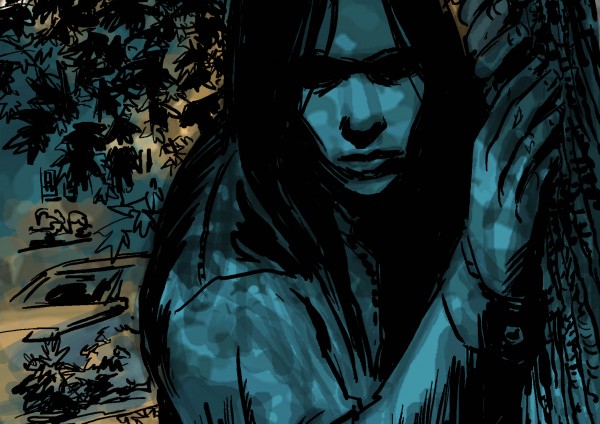 posted 3:00 pm PST
posted 3:00 pm PST |
Permalink
Happy 48th Birthday, Ted Slampyak!

 posted 3:00 pm PST
posted 3:00 pm PST |
Permalink
Happy 60th Birthday, JM DeMatteis!

 posted 3:00 pm PST
posted 3:00 pm PST |
Permalink
Happy 53rd Birthday, Philippe Dupuy!

 posted 3:00 pm PST
posted 3:00 pm PST |
Permalink
Happy 46th Birthday, Zep!

 posted 3:00 pm PST
posted 3:00 pm PST |
Permalink
FFF Results Post #361—The Year In Comics

On Friday,
CR readers were asked to "Name Five Comics You Enjoyed In 2013 -- From Five Different Publishers, At Least Four Of Which Were Published This Year." This is how they responded.
*****
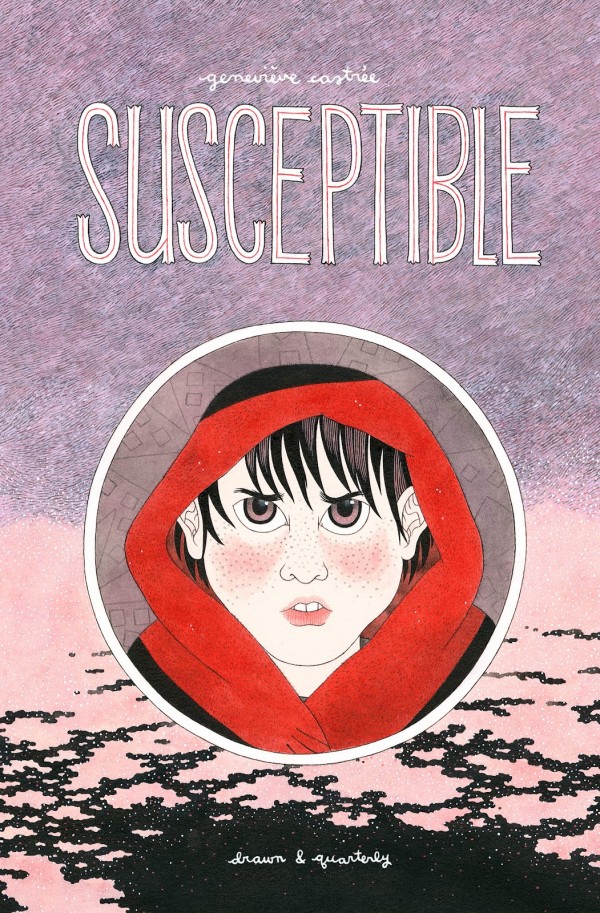 Tom Spurgeon
Tom Spurgeon
1.
Susceptible, Genevieve Castree (D+Q)
2.
The Children Of Palomar, Gilbert Hernandez (Fantagraphics)
3.
The Best Of Comix Book (Dark Horse)
4.
Incidents In The Night Vol. 1 (Uncivilized)
5.
Very Casual, Michael Deforge (Koyama)
*****
 Sean Knickerbocker
Sean Knickerbocker
1.
Pompeii, Frank Santoro (Picturebox)
2.
Optic Nerve #13, Adrian Tomine (D&Q)
3.
The Collected Deep Girl, Ariel Bordeaux (Paper Rocket)
4.
The Adventures of Jodelle, Guy Peelaert (Fantagraphics)
5.
Rubber Blanket # 3, David Mazzucchelli (Self-published)
*****
 Jamie S. Rich
Jamie S. Rich
1.
Journey Into Mystery, Kathryn Immonen, Matteo Scalera, & Valerie Schiti (Marvel)
2.
Kinski, Gabriel Hardman (Monkeybrain)
3.
Helheim, Cullen Bunn, Joëlle Jones, & Nick Filardi (Oni Press)
4.
Genius, Steven T. Seagle & Teddy Kristiansen (First:Second)
5.
East of West, Jonathan Hickman & Nick Dragotta (Image Comics)
*****
 Colin Panetta
Colin Panetta
1)
Rain Comic #1, Mickey Z, Michael Deforge, and Patrick Kyle (self published)
2)
Pond Smelt, Jane Mai (PEOW Studio)
3)
Inflated Head Zone, Zach Hazard Vaupen (Spithouse Publications)
4)
Alien Invasion Volume 3, Lauren Albert (self published)
5)
Edna II, Sophie Goldstein (self published)
*****
 Shannon Smith
Shannon Smith
1)
Habit #1 (Oily)
2)
The Grizzly (Study Group/Patrick Dean)
3)
X-O Manowar (Valiant)
4)
Satellite Sam (Image)
5)
Ame-Comi Girls (DC Comics)
*****
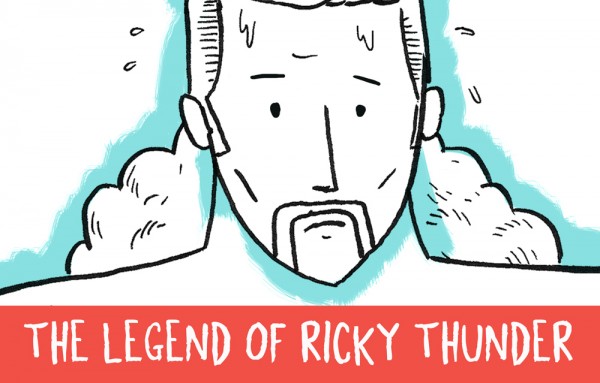 Stergios Botzakis
Stergios Botzakis
1.
Mind Mgmt (Dark Horse)
2.
You Are All Jealous of My Jetpack (Drawn and Quarterly)
3.
Heck (Top Shelf)
4.
Julio’s Day (Fantagraphics)
5.
The Legend of Ricky Thunder (Robot Mountain)
*****
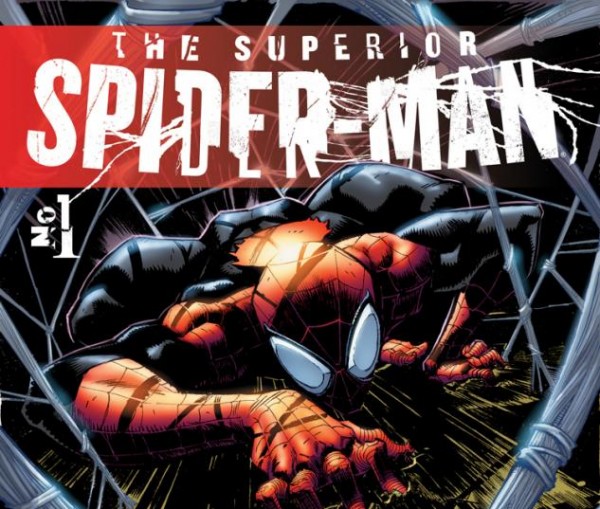 Matthew Craig
Matthew Craig
1.
The Dandy (DC Thomson)
2.
Viz (Dennis Publishing)
3.
The Beano (DC Thomson)
4.
Superior Spider-Man (Dan Slott, Ryan Stegman, Giuseppe Camuncoli, Humberto Ramos, Marvel Comics)
5.
Sugar Glider #3 (Gary Bainbridge & Daniel Clifford, Unterwelt Comics/Daniel Clifford)
*****
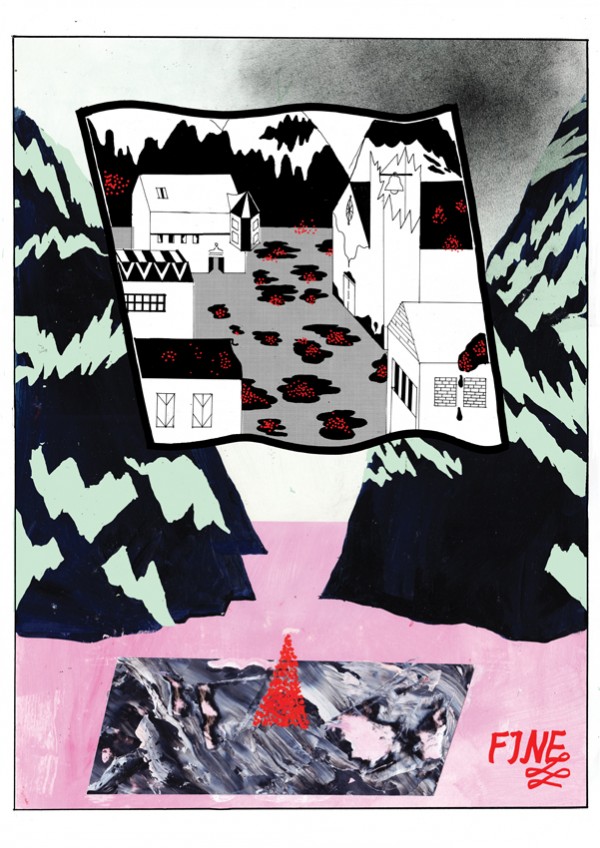 Ryan Sands
Ryan Sands
1.
Lose #5, Michael Deforge (Koyama)
2.
Sunny, Vol. 1 & 2, Taiyo Matsumoto (Viz)
3.
Helter Skelter, Kyoko Okazaki (Vertical)
4.
Life Zone, Simon Hanselmann (Space Face)
5.
Roghi, Anna Deflorian (Canicola Edizioni)
*****
 Art Baxter
Art Baxter
1.
Study Group Magazine #2 (Study Group Comics)
2.
Captain Easy - Volume 1, Roy Crane (Fantagraphics)
3.
Nobrow 8: Hysteria (Nobrow)
4.
Nemo: Heart of Ice, Alan Moore & Kevin O'Neill (Top Shelf)
5.
Lose #5, Michael Deforge (Koyama)
*****
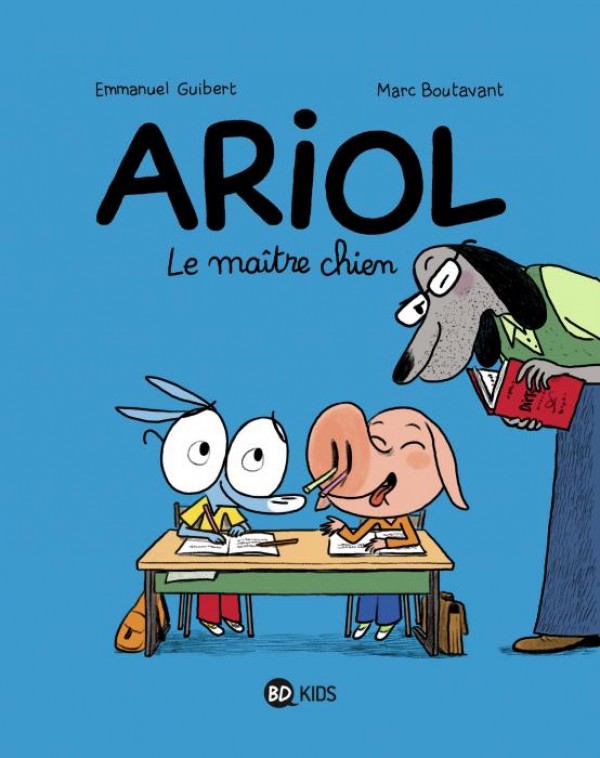 Woodrow Phoenix
Woodrow Phoenix
1.
Love and Rockets new stories 6, Jaime Hernandez (Fantagraphics)
2.
Souvenirs de L'Empire da Atom, T Smolderen & A Clerisse (Dargaud)
3.
ARIOL, Marc Boutavant & Emmanuel Guibert (Bayard)
4.
Après-midi a Drouot, Serge Clerc (Le 9ème Monde, 2010)
5.
Hand-Drying in America and other stories, Ben Katchor (Pantheon)
*****
 Scott Ashworth
Scott Ashworth
1.
Copra, Michael Fiffe (self-published)
2.
Supermag, Jim Rugg (Ad House)
3.
Batman Inc, Grant Morrison and Chris Burnham (DC)
4.
My Dirty Dumb Eyes, Lisa Hanawalt (D+Q)
5.
The Airtight Garage, Moebius (Marvel/Epic)
*****
 Andrew Mansell
Andrew Mansell
1.
The Great War: July 1, 1916: The First Day of the Battle of the Somme (WW Norton)
2.
Manifest Destiny 1 (Image)
3.
Barnaby (Fantagraphics)
4.
Brothers of the Spear Volume 3 (Dark Horse)
5.
Society is Nix (Sunday Press)
*****
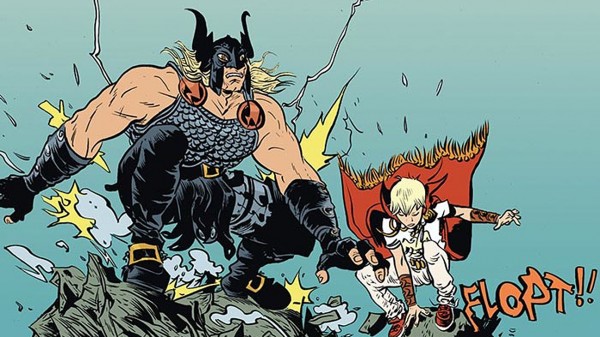 Johnny Bacardi
Johnny Bacardi
1.
Battling Boy, Paul Pope (First Second)
2.
Daredevil, Mark Waid & Chris Samnee (Marvel)
3.
Copra, Michel Fiffe (self-published)
4.
Wonder Woman, Brian Azzarello & a multitude of artists, some named Cliff Chaing (DC)
5.
Stumptown Vol. 2, Greg Rucka & Matt Southworth (Oni Press)
*****
 Andrew White
Andrew White
1.
Gold Pollen and Other Stories, Seiichi Hayashi (Picturebox)
2.
Smoo 7, Simon Moreton (Self Published)
3.
Slam Dunk Vol. 31, Takehiko Inoue (Viz)
4.
The Elements of Painting, Aidan Koch (Online)
5.
Journal 3, Fabrice Neaud (Ego Comme X)
*****
 Evan Dorkin
Evan Dorkin
1.
Kitaro, Shigeru Mizuki (D&Q)
2.
Barnaby, Crockett Johnson (Fantagraphics)
3.
King Aroo vol. 2, Jack Kent (IDW)
4.
Hellboy Library Edition vol 6, Mignola, Fegredo, Stewart, et al (Dark Horse)
5.
Black Hole, Charles Burns (Pantheon)
*****
 Joe Decie
Joe Decie
*
The Black Project, Gareth Brookes (Myriad)
*
Lose #5, Michael DeForge (Koyama Press)
*
RL #2 by Tom Hart (Self Published)
*
Take Away, Lizz Lunney (Blank Slate)
*
Picnic Ruined, Roman Muradov (Retrofit)
*****
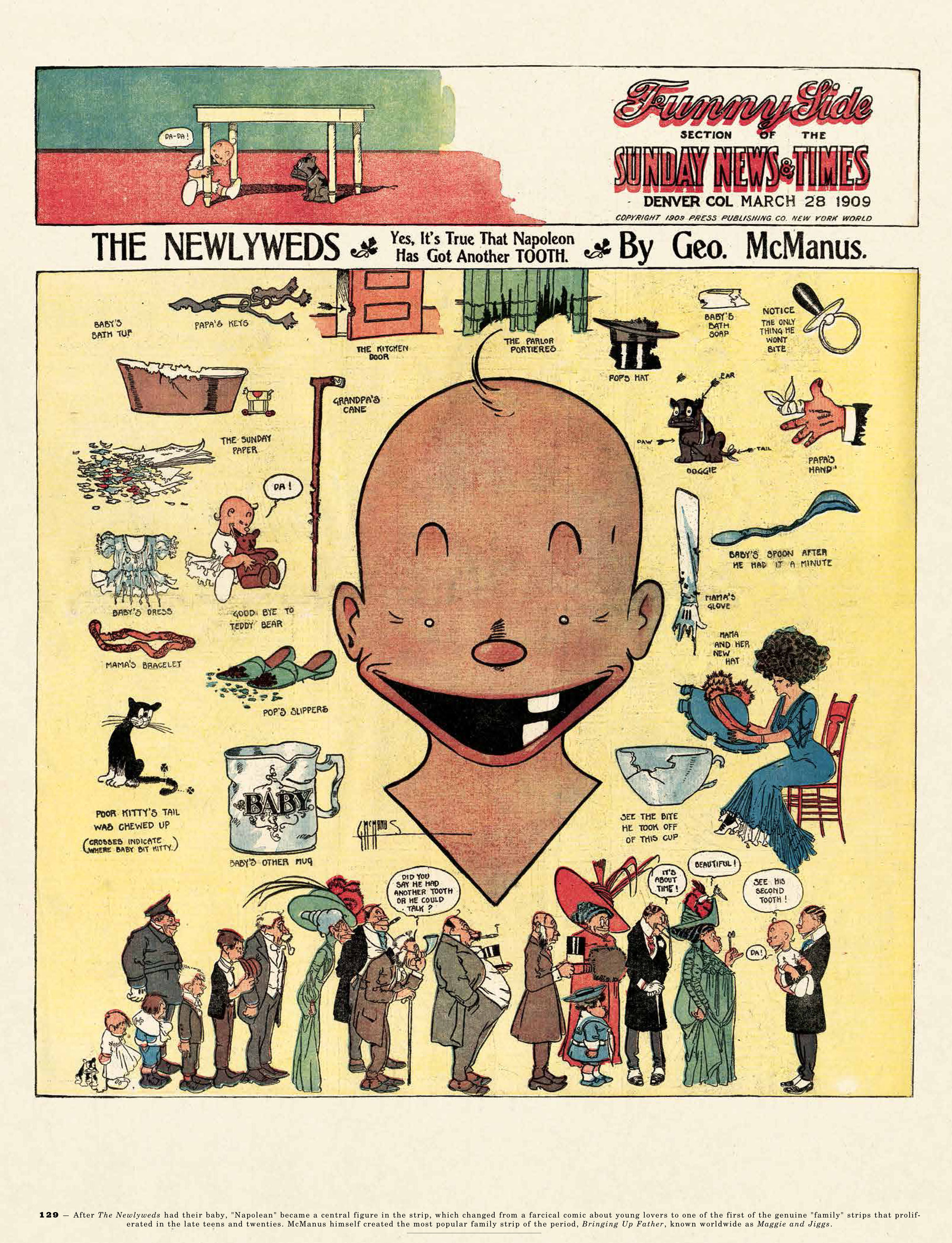 Michael Dooley
Michael Dooley
I appear to have a "thing" for colons:
1.
Society is Nix: Gleeful Anarchy at the Dawn of the American Comic Strip 1895-1915, Peter Maresca (Sunday Press)
2.
The Art of Rube Goldberg: (A) Inventive (B) Cartoon (C) Genius, Jennifer George (Abrams)
3.
Pretty in Ink: American Women Cartoonists 1896-2013, Trina Robbins (Fantagraphics)
4.
In Love with Art: Françoise Mouly's Adventures in Comics with Art Spiegelman, Jeet Heer (Coach House)
5.
Aesthetics: A Memoir, Ivan Brunetti (Yale)
*****
 Evan Harrison Cass
Evan Harrison Cass
1.
Anti-Hero #1, Jay Faerber & Nate Stockman (Monkeybrain)
2.
Clockwork: Volume 1, Paul Allor et al (Gov't Comics)
3.
Saint Cole, Noah Van Sciver (TheExpositorComics.com)
4.
Satan's Soldier, Tom Scioli (AmBarb.com)
5.
Sin Titulo, Cameron Stewart (Dark Horse)
*****
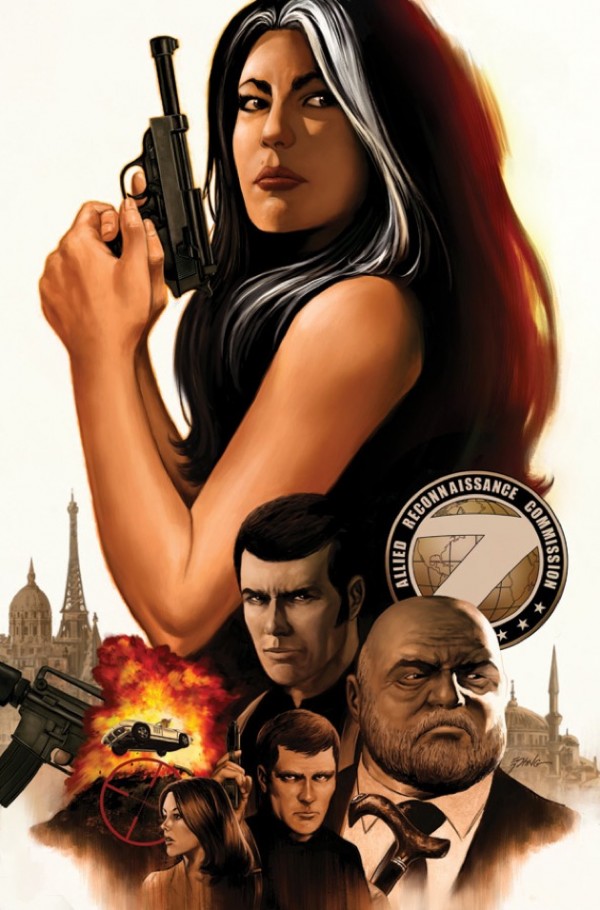 Michael Russo
Michael Russo
1.
Velvet, Ed Brubaker & Steve Epting (Image Comics)
2.
Battling Boy, Paul Pope (First Second Books)
3.
Buck Rogers, Howard Chaykin (Hermes Press)
4.
Trillium, Jeff Lemire (Vertigo)
5.
Copra, Michel Fiffe (Copra Press)
*****
 Jeff Flowers
Jeff Flowers
1.
The Manara Library, Milo Manara (Dark Horse)
2.
Marada The She-Wolf, Chris Claremont and John Bolton (Titan Comics)
3.
The Star*Reach Companion, Richard Arndt (Twomorrows)
4.
The End Of The Fucking World, Chuck Forsman (Fantagraphics)
5.
Habit #1, Josh Simmons (Oily Comics)
*****
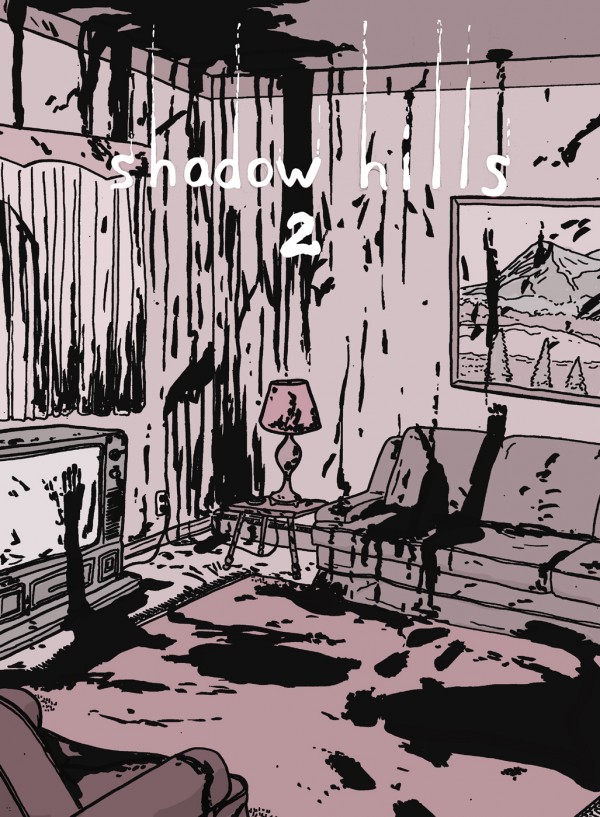 Charles Forsman
Charles Forsman
1.
Velvet, Brubaker & Epting (Image)
2.
Men's Feelings, Ted May (Revival House Press)
3.
Blobby Boys, Alex Schubert (Koyama Press)
4.
Shadow Hills, Sean Ford (self-published)
5.
Incredible Hulk #138, Herb Trimpe & Roy Thomas (Marvel)
*****
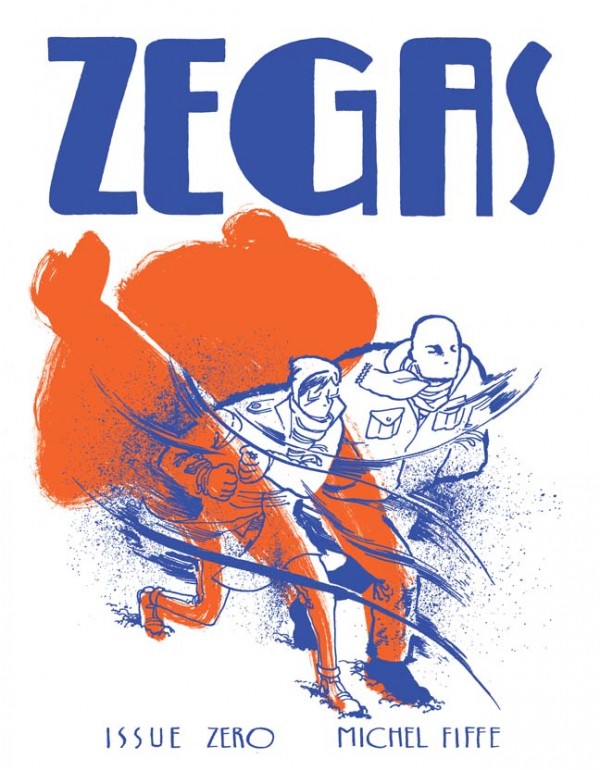 Oliver Ristau
Oliver Ristau
1.
L' Intervista/Die Ãœbertragung by Manuele Fior, Writer, Artist/Anne-Lise Vernejoul, Special Effects/Tinet Elgren, Lettering (Coconino Press/avant verlag)
2.
Change by Ales Kot, Writer/Morgan Jeske, Art/Sloane Leong, Colors/Ed Brisson, Lettering (Image)
3.
Dial H #13 "Tekel Upharsin" by China Miéville, Writer/Alberto Ponticelli, Pencils/Dan Green, Inks /Tanya & Richard Horie, Colors/Taylor Esposito, Lettering (DC Comics)
4.
Frontier #2 by Hellen Jo (Youth In Decline)
5.
Zegas #0 by Michel Fiffe (self published)
*****
 Bluna Williams
Bluna Williams
1:
Fuchs sein fetzt, Tim Gaedke (self-published)
2:
Das UPgrade 2, Ulf S. Graupner and Sascha Wustefeld (Zitty)
3:
Eremit, Marijpol (Avant)
4:
Tesserakt, Tim Gaedke (SuKuLTuR)
5:
Bettgeschichten, various (Zwerchfell)
*****
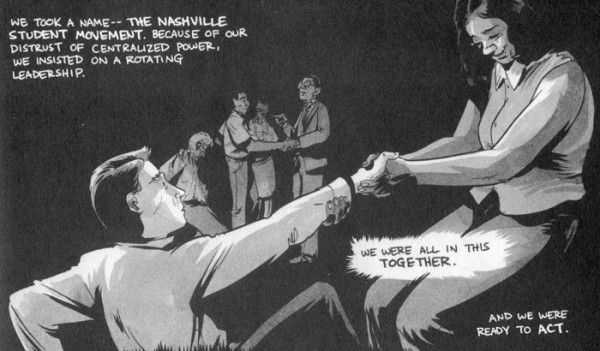 John Platt
John Platt
1.
March, Book One (Top Shelf)
2.
Rachel Rising: Cemetery Songs (Abstract Comics)
3.
You're All Just Jealous of My Jetpack (Drawn & Quarterly)
4.
Ditko Public Service Package # 2 (Robin Snyder)
5.
Primates: The Fearless Science of Jane Goodall, Dian Fossey, and Biruté Galdikas (First Second)
*****
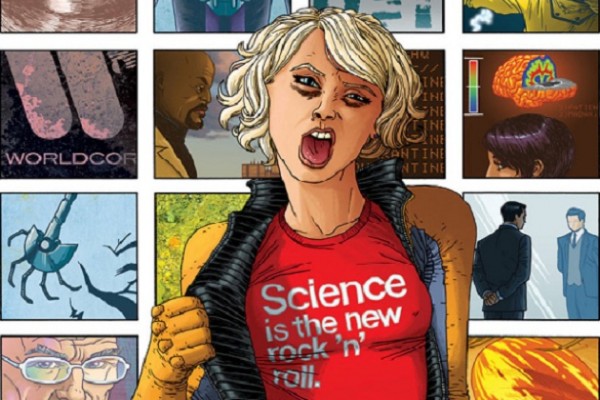 Charles Brownstein
Charles Brownstein
*
Nowhere Men, Stephenson & Bellegarde, Image Comics
*
Lone Wolf & Cub Omnibus, Koike & Kojima, Dark Horse
*
Captain America, Remender & Romita Jr., Marvel
*
Couch Tag, Jesse Reklaw, Fantagraphics
*
Capacity #8, Theo Ellsworth, Secret Acres
*****
 Matt Emery
Matt Emery
1.
The End of The Fucking World, Charles Forsman (Fantagraphics)
2.
Raw Power 2, Josh Bayer (Retrofit)
3.
Squirt Stone: the Collected Plump Oyster Volume One, Ben Constantine (Milk Shadow Books)
4.
Deep Park, David C Mahler (Pikitia Press)
5.
Dalies #3, Various (Silent Army)
*****
 Danny Ceballos
Danny Ceballos
1.
Raw Power #2 (Retrofit)
2.
Butler Comic #1 (self published)
3.
CAN'T LOSE A Friday Night Lights Fanzine (Oily Comics)
4.
Smoke Signal #16 (Desert Island)
5.
RL #3 (SAW Workshop)
*****
 Dan Morris
Dan Morris
1.
Prophet by Brandon Graham and various (Image)
2.
Andromeda Stories by Keiko Takemiya (Vertical)
3.
Gamma by Ulises Farinas and Erick (Dark Horse)
4.
The Grizzly by Patrick Dean (online)
5.
Optic Nerve #13 by Adrian Tomine (Drawn and Quarterly)
*****
 Jones
Jones
1.
Problematic: Sketchbook Drawings 2004-2012, Jim Woodring (Fantagraphics)
2.
Complete Little Orphan Annie vol 9, Harold Gray (IDW)
3.
21st Century Boys, Naoki Urasawa (Viz)
4.
Long Cours, Boulet (bouletcorp.com)
5.
Showcase Presents: Superman Family vol. 4, Kurt Shaffenberger, Curt Swan et al. (DC)
*****
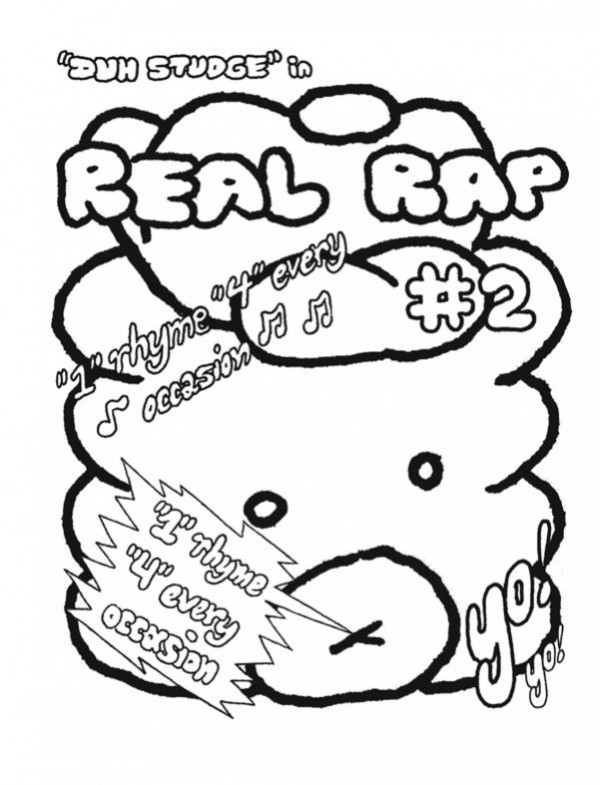 Mike Baehr
Mike Baehr
1.
Real Rap, Benjamin Urkowitz (Oily)
2.
Sammy the Mouse Book 2, Zak Sally (Uncivilized)
3.
Good Dog, Graham Chaffee (Fantagraphics)
4.
Prophet, Brandon Graham et al. (Image)
5.
Space Basket, Jonathan Petersen (Domino, 2012)
*****
 Scott Dunbier
Scott Dunbier
*
Hellboy in Hell (Dark Horse)
*
Joe Kubert Presents (DC Comics)
*
Barnaby, Vol. One (Fantagraphics)
*
Hawkeye (Marvel)
*
Locke & Key (IDW -- but not edited by me!)
*****
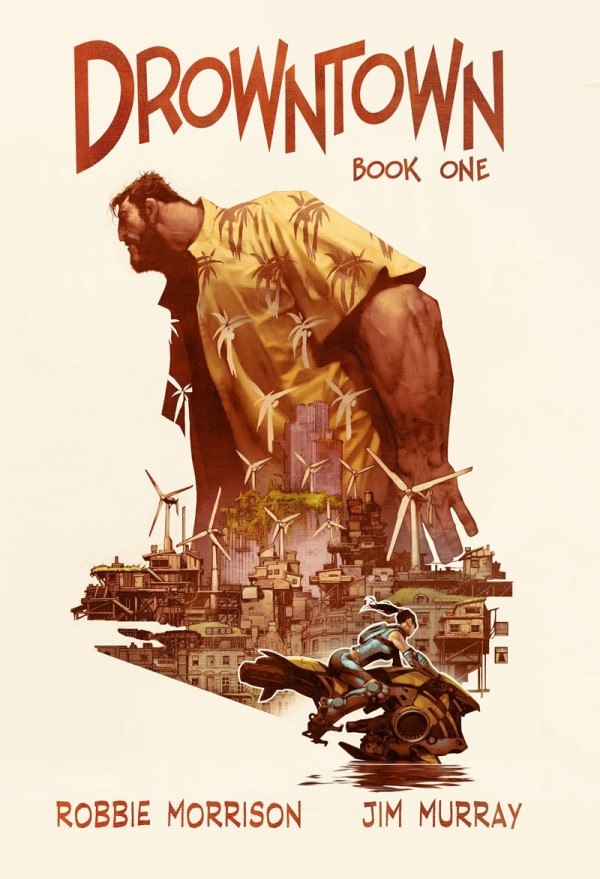 Zainab Akhtar
Zainab Akhtar
*
Nava: ruins of a dream/tree of life, Olle Forsslof and Mikael Lopez (Peow! Studio)
*
The Infinite Wait and Other Stories, Julia Wertz (Koyama Press)
*
Drowntown book 1, Robbie Morrison and Jim Murray (Jonathan Cape)
*
Do Not Disturb My Waking Dream, Laura Park (Uncivilised Books)
*
Delusional, Farel Dalrymple (AdHouse Books)
*****
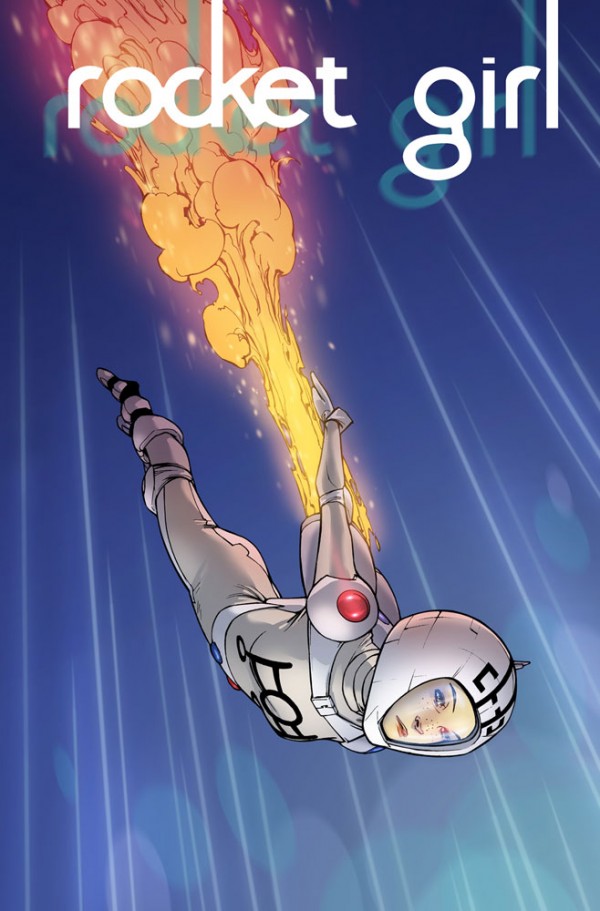 John Parkin
John Parkin
1.
Rocket Girl by Brandon Montclare and Amy Reeder (Image Comics)
2.
Head Lopper by Andrew MacLean with Mike Spicer (self published)
3.
Over the Wall by Peter Wartman (Uncivilized)
4.
Lost Cat by Jason (Fantagraphics)
5.
Superior Foes of Spider-Man by Nick Spencer, Steve Lieber, Rachelle Rosenberg, Joe Caramagna and many other talented folks (Marvel)
*****
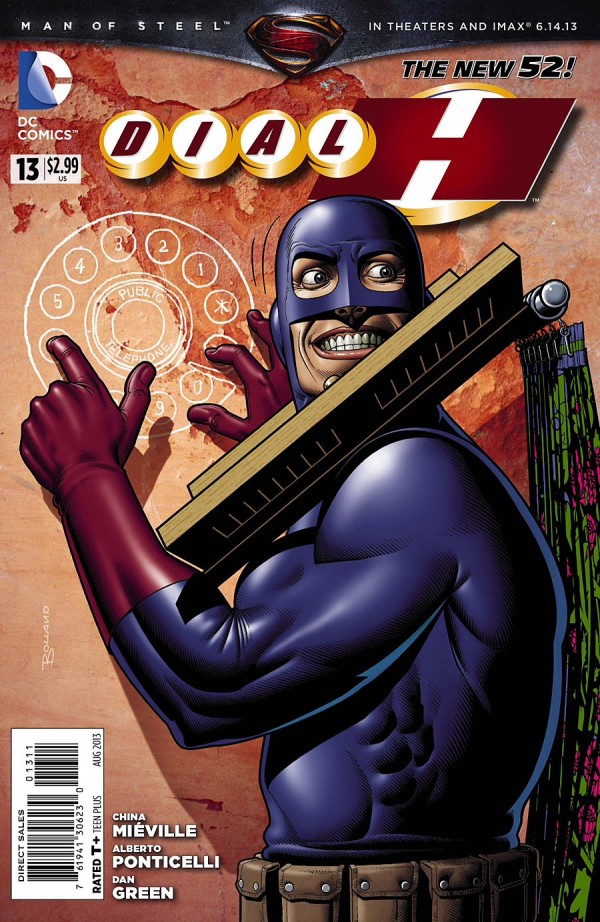 Tom Bondurant
Tom Bondurant
1.
Dial H (DC Comics)
2.
Fearless Defenders (Marvel Comics)
3.
The X Files: Season 10 (IDW)
4.
Bad Machinery (Scary Go Round)
5.
The Star Wars (Dark Horse)
*****
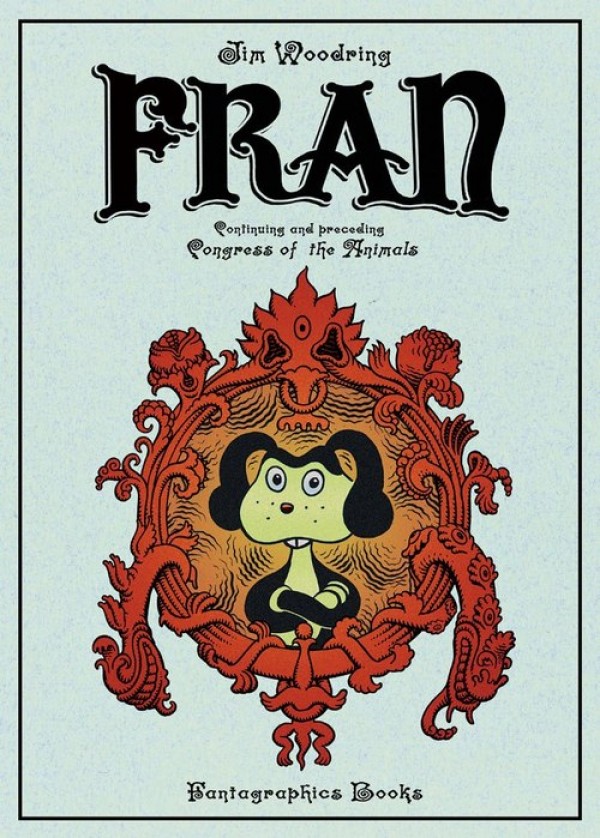 Marc-Oliver Frisch
Marc-Oliver Frisch
1.)
Optic Nerve 13, Adrian Tomine (Drawn & Quarterly)
2.)
Fran, Jim Woodring (Fantagraphics Books)
3.)
Very Casual, Michael DeForge (Koyama Press)
4.)
Copra, Michel Fiffe (Copra Press)
5.)
Vakuum, Lukas Juliger (Reprodukt)
*****
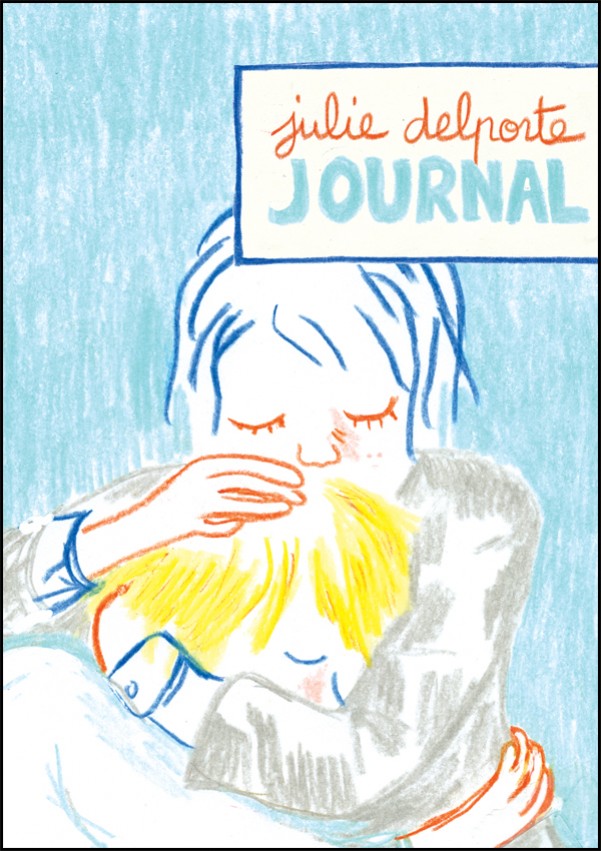 Derik A. Badman
Derik A. Badman
1.
Journal, Julie Delporte (Koyama)
2.
The End, Anders Nilsen (Fantagraphics)
3.
Pompeii, Frank Santoro (Picturebox)
4.
Ecole de la misère, Yvan Alagbé (FRMK)
5.
Alack Sinner, integrale t.2, Munoz and Sampayo (Casterman)
(Since you said publisher, I didn't choose webcomics or self-published minis.)
*****
 Steven Stwalley
Steven Stwalley
1.
K-Mart Shoes, Lance Ward (Seventh Avenue Productions)
2.
Double Barrel, Kevin Cannon and Zander Cannon (Top Shelf)
3.
Sammy the Mouse, Zak Sally (La Mano/Uncivilized Books)
4.
Barnaby, Crockett Johnson (Fantagraphics)
5.
Forgotten Fantasy, various artists (Sunday Press Books)
*****
 Robert Boyd
Robert Boyd
1. Fran, Jim Woodring (Fantagraphics)
2. The Property, Rutu Modan (Drawn & Quarterly)
3. How to Look, Ad Reinhardt (Hatje Cantz Verlag/David Zwirner)
4. World Map Room, Yuichi Yokoyama (PictureBox)
5. Had-Drying In America and Other Stories, Ben Katchor (Pantheon)
*****
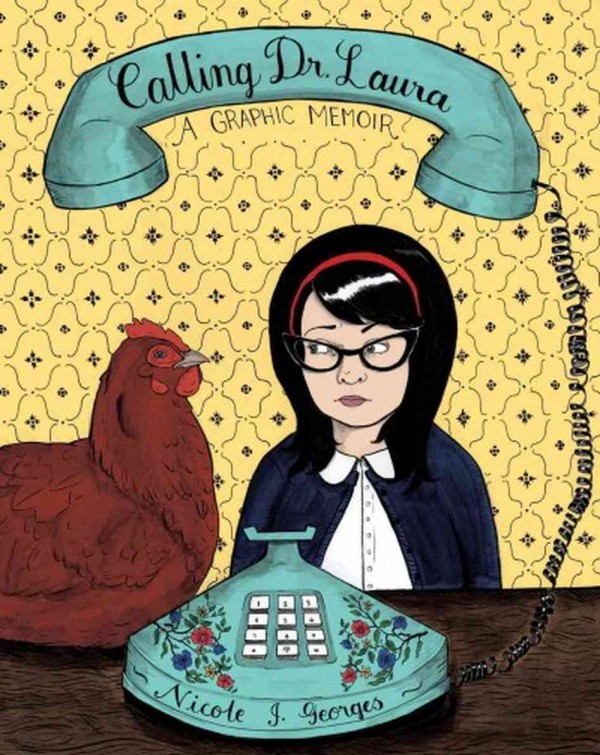 Janice Headley
Janice Headley
1)
susceptible -- geneviève castrée (d&q)
2)
the end -- anders nilsen (fantagraphics)
3)
journal -- julie delporte (koyama)
4)
calling dr. laura: a graphic memoir -- nicole j. georges (houghton mifflin harcourt)
5) incidents in the night -- david b (uncivilized)
*****
*****
posted 2:00 pm PST |
Permalink
The Comics Reporter Video Parade
 Renata Gasiorowska-Made Video
Prizon Food Trailer
From The Gutters: Ted Naifeh
From The Gutters: Eric Stephenson
From The Gutters: Dave Stewart
Cartoonist Simon Tofield Presents
via
Commercial Video For The Turtle Tamer Of Istanbul
Video From Leif Goldberg
posted 6:00 am PST
Renata Gasiorowska-Made Video
Prizon Food Trailer
From The Gutters: Ted Naifeh
From The Gutters: Eric Stephenson
From The Gutters: Dave Stewart
Cartoonist Simon Tofield Presents
via
Commercial Video For The Turtle Tamer Of Istanbul
Video From Leif Goldberg
posted 6:00 am PST |
Permalink
Totally Missed That There’s A Fantagraphics Pop-Up Store Presence In Downtown Seattle

 It looks like Amex is sponsoring this for Fanta and some other non-downtown Seattle businesses
posted 12:30 am PST
It looks like Amex is sponsoring this for Fanta and some other non-downtown Seattle businesses
posted 12:30 am PST |
Permalink
CR Week In Review

 The top comics-related news stories from December 7 to December 13, 2013:
The top comics-related news stories from December 7 to December 13, 2013:
1. A significant number of comics people and entities
are pressing for needed, necessary funds as Christmas roars into view.
2. Editorial cartoonists
mark the passing of a significant world leader, Nelson Mandela; some cartoonists
are more involved with his legacy than others.
3. Best Of lists in comics
like this one mark the significant sprawl of opinions as to what constitutes the best of the art form, particularly past a few, widely-accepted "prestige" projects.
Winner Of The Week
Brian Hibbs
Loser Of The Week
Anyone that ever dreamed of going to all the comics shows
Quote Of The Week
"Despite the updated coloring, it probably isn't fair or even realistic to hold the series up against contemporary comics, despite
Miracleman's significant influence on a good deal of them. Instead, it's best to view these stories in the context of the times, which makes it easier to see why
Miracleman (or
Marvelman, if you prefer) is the natural stepping stone to
Watchmen, and established many of the themes Alan Moore and many creators that followed him would explore in subsequent works up through the present day." --
Corey Blake
*****
today's cover is from the all-time series Classics Illustrated
*****
*****
posted 12:00 am PST |
Permalink
December 13, 2013
 Go, Read: Massive, Lushly Illustrated Brandon Graham Post
Go, Read: Massive, Lushly Illustrated Brandon Graham Post

 posted 8:00 pm PST
posted 8:00 pm PST |
Permalink
If I Were In Lisbon, I’d Go To This

 posted 6:30 pm PST
posted 6:30 pm PST |
Permalink
If I Were In Baltimore, I’d Go To This

 posted 6:30 pm PST
posted 6:30 pm PST |
Permalink
If I Were In Seattle, I’d Go To This

 posted 6:30 pm PST
posted 6:30 pm PST |
Permalink
If I Were In San Francisco, I’d Go To This

 posted 6:30 pm PST
posted 6:30 pm PST |
Permalink
If I Were In Charlotte, I’d Go To This

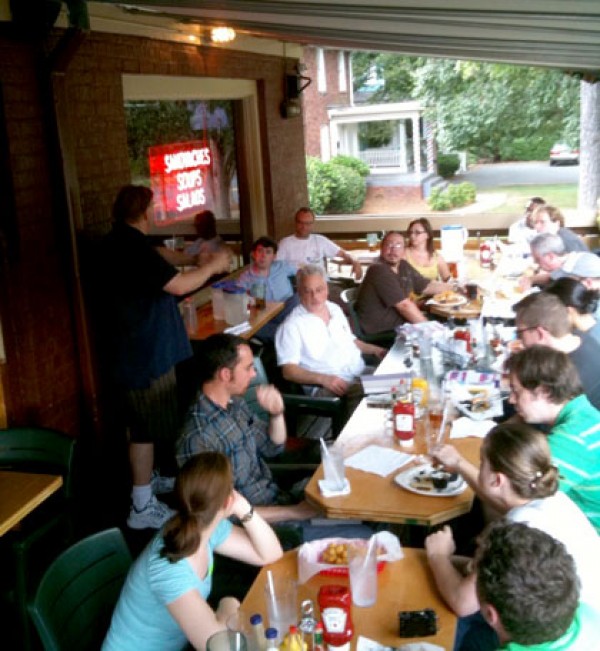 posted 6:30 pm PST
posted 6:30 pm PST |
Permalink
Happy 54th Birthday, David Quinn!

 posted 3:00 pm PST
posted 3:00 pm PST |
Permalink
Happy 36th Birthday, Brendan Burford!

 posted 3:00 pm PST
posted 3:00 pm PST |
Permalink
By Request Extra: Longtime DC Fixture Bob Kahan Could Use Your Help

 posted 12:30 am PST
posted 12:30 am PST |
Permalink
December 12, 2013
 OTBP: Linework #1
OTBP: Linework #1

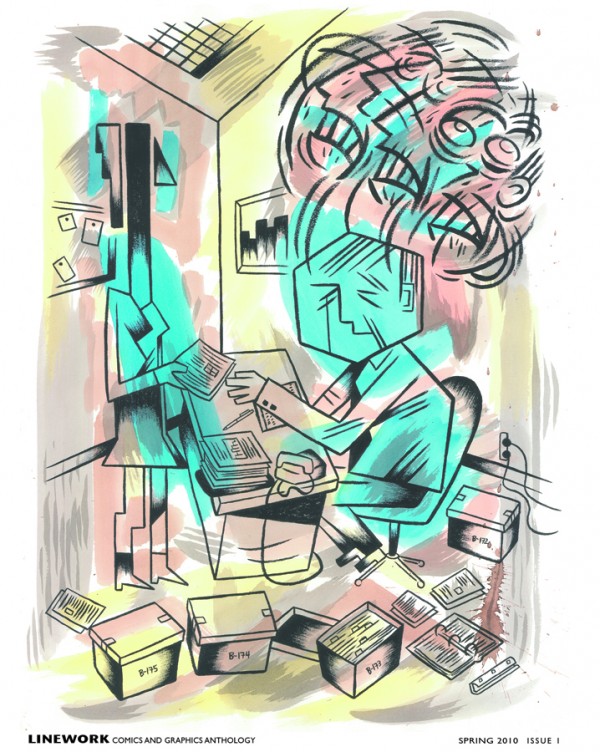 posted 10:35 pm PST
posted 10:35 pm PST |
Permalink
Go, Read: Profile Of Clifford K. Berryman


There are four or five super-interesting things in
this genteel, feature-article profile of the editorial cartoonist Clifford K. Berryman, best known for his role in the conceptualization of the "Teddy Bear." I don't know that I was aware that the original teddy bear cartoon included offhand commentary about lynching for instance. I'm also always delighted when I'm reminded that Berryman and his won Pulitzer Prizes for editorial cartooning within a few years of one another: the Ken Griffey Sr./Ken Griffey Jr. of political drawing. Mostly, though, I wanted to point out that apparently a Berryman drawing -- the one above -- is apparently still in active use by a North Carolina newspaper. Now that is value.
posted 10:30 pm PST |
Permalink
Go, Watch: Jenette Kahn, Ed Piskor At Chicago Humanities Festival
 Jenette Kahn
Ed Piskor
posted 10:25 pm PST
Jenette Kahn
Ed Piskor
posted 10:25 pm PST |
Permalink
By Request Extra: Various Folks In Need Of Funding

 By Tom Spurgeon
By Tom Spurgeon
* here's the latest on a bunch of the sales/fundraisers we've been tracking. As far as I know, efforts to help Stan Sakai as he attempts to make up a home healthcare insurance gap
remain ongoing. They haven't cashed the checks I sent in yet, at least. Sakai is one of the best people in comics, and I hope you'll give that one a look. I'm a little dismayed they never set up an alternate paypal address nor have they updated the original post since November 25, but I trust that these folks are simply busy. As mentioned before, I'm happy to process anyone's paypal into a check sent into the fundraiser if you want to send something to
[email protected].
Zak Sally continues to have a big sale in honor of La Mano's 21st birthday. That's a model publisher. Julia Wertz
has unleashed a bunch of art and prints on the world at her Etsy store. You can't get the prints on time for Christmas, and the deadline for comics-stuff is closing fast. It seems to me that since a lot of Wertz's work is driven by humorous anecdotes that her originals would be well suited for the walls of many homes. As far as I know, you can still support Mark Newgarden and Megan Montague Cash
and their sale to help pay off recent flooding damage. I'm going to try and pull
this out into its own post, but I noticed that Gabby Schulz has a bunch of stuff up for sale including a "pay what you will + shipping" posters offer. And Tony Millionaire
has cut prices as well.
* there are still a bunch of regular crowd-funders up, even if right around Christmas time might seem an odd part of the calendar on which to place such an effort.
This person wrote me and stressed their dire need for support.
* I'm sure Richard Pace would like to sell a few more of
this project, if you're so inclined.
*
there are no longer special deals for Mothers News, but you can buy a regular subscription.
* the Sequential Artists Workshop
is seeking a few thousand dollars in support of its 2014 programs. That one has a ton of time left, but it still feels to me like it's underperforming a bit, so please check it out.
* Rina Ayuyang's art auctions in support of typhoon relief efforts in the Philippines
has reached its final item.
* finally, as will be the case this entire month, Dan Nadel
continues his 50 percent off sale at PictureBox as that company winds down the front-list part of its admirable life.
posted 10:20 pm PST |
Permalink
Go, Look: Gabby Schulz On-Line Store

 posted 10:15 pm PST
posted 10:15 pm PST |
Permalink
Go, Watch: Zapiro On Mandela

The cartoonist Zapiro has done a lot of cartoons critical of Nelson Mandela, and some outright brutal ones about those that have followed Mandela in power in South Africa. It's also been clear that Zapiro thought Mandela a great man, and he talks about that a bit
here. My sense was that as savage as Zapiro's work could be that Mandela was a believer in a free press and its mission to exercise that freedom through opinion work in both written and cartoon form. One can imagine a much dimmer reality for cartoonists in that region of the world if Mandela had turned on them the way a few others on the world stage have at times.
Here's a cartoon tribute to Mandela via a comics translation of his favorite poem.
posted 10:10 pm PST |
Permalink
Go, Look: Comics From Tatiana Gill

 posted 10:05 pm PST
posted 10:05 pm PST |
Permalink
Your 2013 Village Voice Best Of Comics List

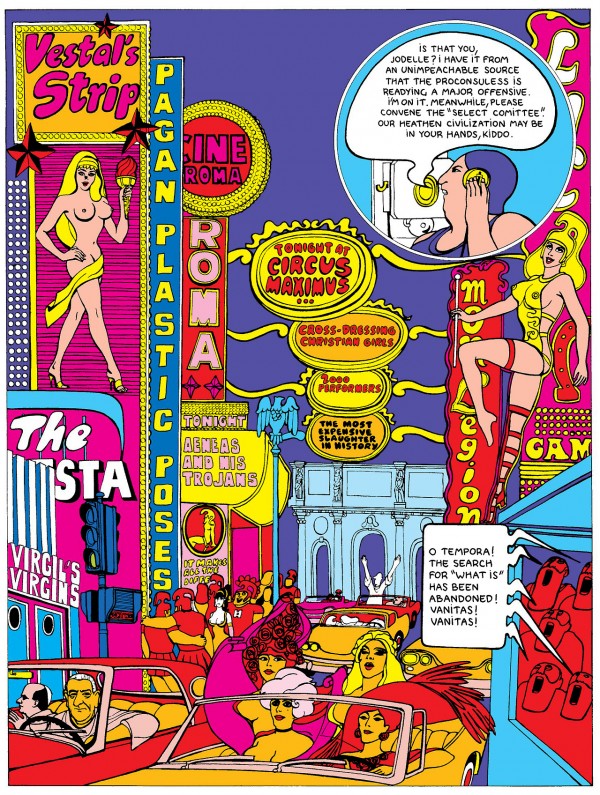
RC Baker
put together a list of top comics for
Village Voice. His choices are:
*
Battling Boy, Paul Pope (First Second)
*
Before Watchmen: Comedian/Rorschach Deluxe Edition, Brian Azzarello, Lee Bermejo And J.G. Jones (DC Comics)
*
Curing the Postmodern Blues: Reading Grant Morrison And Chris Weston's The Filth In The 21st Century, Tom Shapira (Sequart)
*
Law of the Desert Born: A Graphic Novel, Louis L'Amour And Charles Santino, et al (Bantam)
*
Occupy Comics #1-2, Various (Black Mask)
*
Ray and Joe: The Story Of A Man And His Dead Friend, Charles Rodrigues With Bob Fingerman And Gary Groth (Fantagraphics)
*
Sacrifice, Sam Humphries and Dalton Rose (Dark Horse)
*
Sandcastle, Pierre Oscar Levy and Frederik Peeters (SelfMadeHero)
*
The Adventures of Jodelle, Guy Peellaert And Pierre Bartier (Fantagraphics)
*
The Best of EC Comics Artists Edition Vol. 1, Various Artists (IDW Publishing)
*
The Alluring Art of Margaret Brundage: Queen of Pulp Pin-Up Art, Stephen D. Korshak And J. David Spurlock (Vanguard)
That is a really interesting list of books, very idiosyncratic and all over the place. You can see it in gallery format
here.
posted 10:00 pm PST |
Permalink
Go, Look: A Noah Van Sciver 2012 Local Event Coverage Comic

 posted 9:55 pm PST
posted 9:55 pm PST |
Permalink
Bleeding Cool Catches A 2014 UK Convention Claiming Stan Lee’s Final Personal Appearance In Europe
 Here
Here. That's worth noting just for how many of these types of appearances that Lee had made in the last decade as his 80s have become his early 90s. Lee is a remarkably fit man -- he's always been a walker, and was even a stand-and-write guy for years and years. He has always seemed to enjoy the unique public spotlight provided him by such events, and they do seem lucrative. But still, I don't think anyone would begrudge any change in his schedule.
posted 9:50 pm PST |
Permalink
Go, Read: Robert Steibel On Fantastic Four Annual #6

 it's a fun reading, but man: all that art
posted 7:05 pm PST
it's a fun reading, but man: all that art
posted 7:05 pm PST |
Permalink
Assembled, Zipped, Transferred and Downloaded: Digital News
 By Tom Spurgeon
By Tom Spurgeon
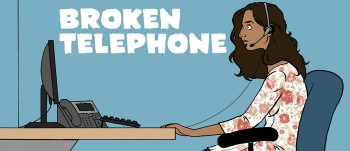
*
Broken Telephone was funded, although not by a significant margin.
* the writer, editor and cartoonist Shaenon Garrity, one of my favorite people to read on any subject related to comics she cares to cover,
discusses the notion of work being reposted or otherwise used without attribution.
* you can sign up
here to be notified when the
Tripwire app is ready for download. I don't even know what that means, but now I'm worried I've forgotten to do something.
* Stephanie McMillan
has a new book out and would like to tell you why capitalism sucks and what can be done to crush it into dust.
* the writer about and writer of comics Sean T. Collins
has moved a bunch of his webcomics reviews to a devoted tumblr.
* nice to see some of the old
Big Mouth comics
will be getting at run at Boing Boing; there's a rich reservoir of material in the 1990s alt-comics movement that speaks in enough of a modern voice that they could be used right now on-line.
* the writer Sean Kleefeld
promises a weekly focus on various comics "-isms" at his on-line commentary platform.
* finally,
here's a Jeet Heer and Ethan Rilly comic that I've seen referred to as a webcomic but actually seems more like the on-line publication of a work that first appeared or more "primarily" appeared in print. I imagine that most of us passionately interested in what Heer and Rilly have going on will encounter that work on-line.
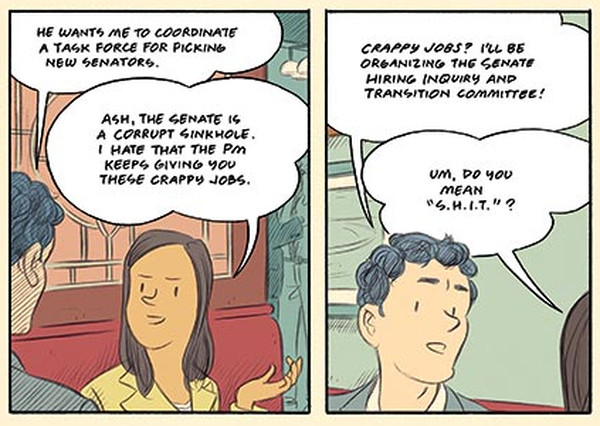 posted 7:00 pm PST
posted 7:00 pm PST |
Permalink
Go, Look: A Mort Meskin Western For Prize Comics

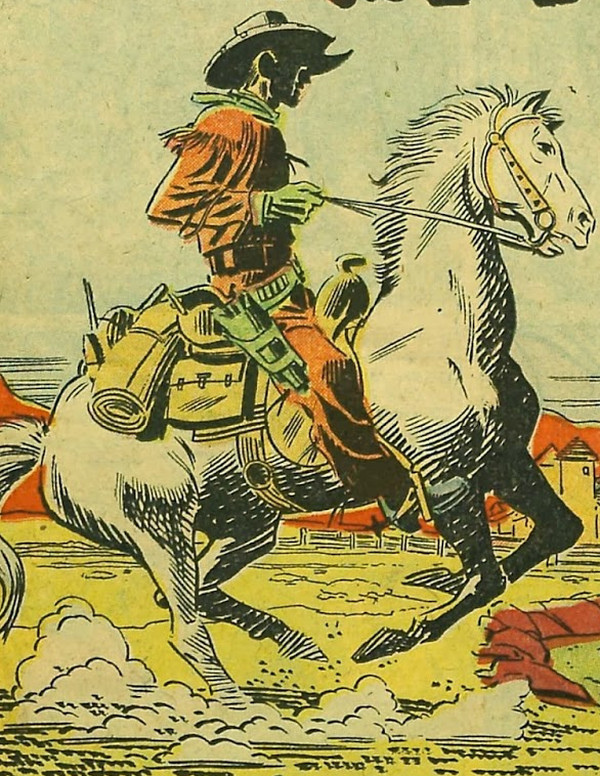 posted 6:30 pm PST
posted 6:30 pm PST |
Permalink
Missed It Back In 2012: A Letter To Sharon Needles

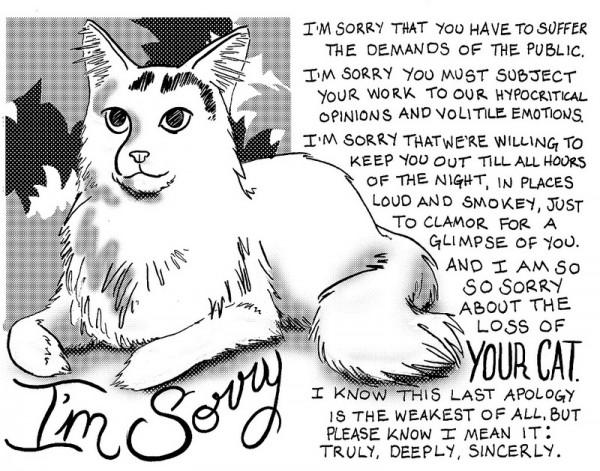 posted 5:00 pm PST
posted 5:00 pm PST |
Permalink
Random Comics News Story Round-Up

*
congratulations to Brian Hibbs on his second store.

* Sean Gaffney on
Sweet Rein Vol. 1. Tahneer Oksman on
Co-Mix. Ben Hawluk on
The Heckler. Iestyn Pettigrew on
Miracleman. Tom Bondurant on
JLA 3000 #1, a comic I read and found sort of baffling conceptually. Rob Clough on
Chico & Rita. Andrew T on
Other Stories And The Horse You Rode On In. Sean Gaffney on
the comics available via Mangabox. Jeffrey O. Gustafson on
The Fox. Joe Gordon on
Signal To Noise. Richard Bruton on
Dangerine.
* not comics: it may just be my imagination, but it feels like I'm starting to see stories every 10-11 days that suggest
a dire future for Barnes & Noble. The Ozymandias school of blogging never usually works out in the real world, though.
*
role-models.
*
that's a hell of a strike-through.
* Jason Love talks to
John Porcellino. Danica Davidson talks to
Sarah Lightman. Albert Ching talks to
Mick Foley. Alex Dueben talks to
Max Badger. Vi-An Nguyen talks to
Jeannie Schulz.
* the very well-respected comics scholar Qianna Whitted writes
on anthropomorphism and race in Krazy Kat.
*
Petersen does McCay.
*
an end for this iteration of Animal Man.
* finally, Roland Kelts
looks at the global publishing phenomenon that is One Piece.
posted 4:00 pm PST |
Permalink
Happy 45th Birthday, Joseph Michael Linsner!

 posted 3:00 pm PST
posted 3:00 pm PST |
Permalink
Happy 48th Birthday, Kyle Baker!

 posted 3:00 pm PST
posted 3:00 pm PST |
Permalink
Happy 52nd Birthday, Philippe Francq!

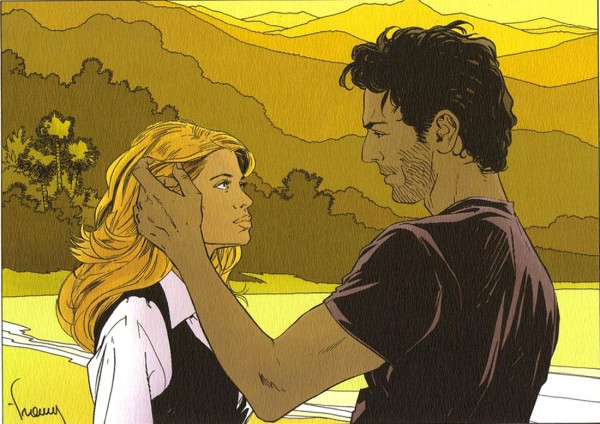 posted 3:00 pm PST
posted 3:00 pm PST |
Permalink
December 11, 2013
 Go, Look: Images From The Limited Edition Maus Portfolio
Go, Look: Images From The Limited Edition Maus Portfolio

 posted 7:30 pm PST
posted 7:30 pm PST |
Permalink
Well, Hello To You, Too, Mr. Richard Thompson


I received a note from Caitlin McGurk at the Billy Ireland Cartoon Library & Museum giving me permission to use this photo -- which I'm sure she's also placed on her Facebook feed -- of her with the cartoonist Richard Thompson, recovering from hip replacement surgery. I'd mentioned that the Reuben winner and much-missed daily strip presence had gone in for surgery but I'm not sure I ever mentioned that he made it out the other side and was in recovery. McGurk is visiting Thompson for the sake of putting together a flattering selection of his work for display in the Museum space at the library; the other cartoonist having work shown at that same time at the new facility (March 22 to July 6) will be big-time Thompson fan Bill Watterson. Thompson's originals are ridiculous-looking, particularly those he graced by painting them, so that will be something to see.
It's good to see a photo of Richard and I hope he's resting up. No nicer man in comics.
posted 7:20 pm PST |
Permalink
Go, Look: Classic Mr. X Poster Imagery

 posted 7:15 pm PST
posted 7:15 pm PST |
Permalink
Go, Read: A Miracleman History Lesson


Corey Blake
makes a point that I hadn't considered, that the
Marvelman re-do spearheaded by writer Alan Moore some 30+ years ago now has since been used as a springboard by so many works that, when you combine that rampant borrowing with elements of the comic book series' presentation that are very much of its time, the end result is modern readers may not get the same thrill out of the adventures of Michael Moran and his sparkly alter-ego that comic-shop denizens did in the mid-1980s. I tend not to think of comics in that way; I think creative work has value above and beyond its ability to perpetually re-enter the modern marketplace as a contemporary contender that makes someone even more money, or, leaving money out of it, to even just appeal in the same way.
Pogo is difficult now, but
Pogo is still great. I do recognize this is a model a lot of people consider and that relevancy is a validation that a lot of readers want from the popular art with which they interact. Me, I'm happy with the once-popular, the old, or the outright unfashionable.
posted 7:10 pm PST |
Permalink
OTBP: Dennis Eichhorn’s Real Good Stuff #1-2


 posted 7:05 pm PST
posted 7:05 pm PST |
Permalink
The Never-Ending, Four-Color Festival: Cons, Shows, Events

 By Tom Spurgeon
By Tom Spurgeon
* WonderCon
continues to build its guest list in Brady Bunch increments. It might be fun to look at this round to round to see how a guest list is built for a show like that, although I'm not sure a lot of people have fun doing the same things I do.
*
The Devastator takes a survey of some of their fellow con exhibitors, and the results are interesting in the broad strokes.
*
Sean Azzopardi went to the comics show in Malta and has the pictures to prove it.
* so here's what I have down for shows in which I have a general interest next year:
Image Expo, January 9
Angouleme, January 30-February 2
Emerald City Comic-Con, March 28-30
MoCCA Festival, April 5-6
Stumptown Comics Fest, April 12-13
SPACE, April 12-13
Wonder Con, April 18-20
C2E2, April 25-27
TCAF, May 9-11
MeCAF, May 18
VANCAF, May 24-25
NCS Yearly Meeting/Reubens (San Diego, CA), Memorial Day Weekend
CAKE, May 31-June 1
Denver Comic Con, June 13-15
HeroesCon, June 20-22
Comic-Con International, July 23-27
Baltimore Comic-Con, September 5-7
SPX, September 13-14
APE, October 4-5
New York Comic-Con, October 9-12
Lakes International Comic Arts Festival, October 17-19
ICAF (Columbus, OH), November 13-15
Comic Arts Brooklyn, As Yet Unscheduled
Thought Bubble, As Yet Unscheduled
Short Run, As Yet Unscheduled
Genghis Con, As Yet Unscheduled
That is a lot of shows, and I'm almost certainly forgetting six to eight worth attending for most people, and another dozen worth attending for specific subsets of comics folk.
* Heroes Con, which takes place in June,
already has a lengthy list of guests. Always nice to Evan Dorkin and Sarah Dyer in Charlotte. That's a show where people go year to year because you can actually build the audience's expectation for your presence over time -- that's not always the case with various conventions and festivals.
* speaking of favorite major regional/smaller national shows, Emerald City is a bit later but
is still loaded with guests and all the con rate hotels are disappearing. With all due respect to Image Expo, Angouleme and a number of growing cons including a couple of the Wizard shows, the Seattle ECCC will be the year's kick-off for a lot of comics people, both physically (by attending) and mentally ("oh, it's con season now").
* I had a really great year of going to shows. Thank you to all the people I met or with whom I hung out along the way.
posted 7:00 pm PST |
Permalink
OTBP: The Fika Diaries

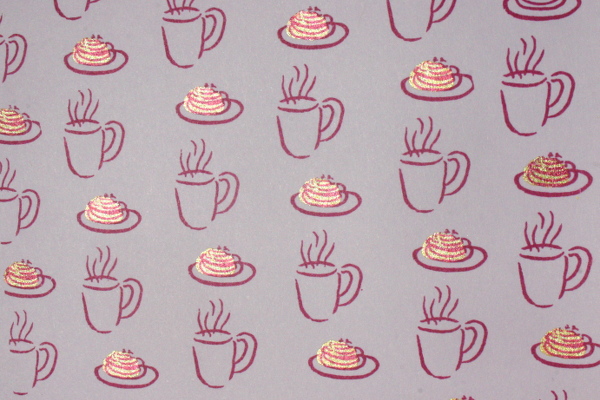 posted 6:30 pm PST
posted 6:30 pm PST |
Permalink
OTBP/Not Comics: Dustin Harbin Prints At InPrnt

 posted 5:00 pm PST
posted 5:00 pm PST |
Permalink
Random Comics News Story Round-Up


* totally missed
this piece by Dan Nadel on
Sandman: Overture #1. Paul Morton on
March: Book One. Jimbus Christ on
Fear Agent: Re-Ignition.
* Xavier Guilbert talks to
John Porcellino. John Kost talks to
Jimmy Palmiotti.
* a bunch of people
comment on the thread about OGNs vs. serialization of comics material at Heidi MacDonald's site. I'm not sure either side "wins" the argument, and the biggest notion that seems to be strengthened by the rhetoric being thrown around is that the Internet is ill-suited to serious discussion. That is a bunch of people talking past and around each other.
*
here's a series of interviews of people that work with BOOM! that happen to be female... I'm not sure what the point of a series like that is, but I'm certain a lot of smart people are getting interviewed.
* two of the executives each involved at one time with a southern California high-end graphic novels publisher
combine forces into a company that seems to publish the same kinds of books those other companies publish. I'm not really sure what the business model is there, but I assume that a lot of the assumed good fortune depends on Hollywood development deals -- I could be totally wrong, though. I look forward to the full book list.
* finally,
here are some illustrated tributes to the late Nelson Mandella. And
here are the Cagle cartoonists on that same subject.
posted 4:00 pm PST |
Permalink
Happy 60th Birthday, Mark Landman!

 posted 3:00 pm PST
posted 3:00 pm PST |
Permalink
Happy 93rd Birthday, Fred Kida!

 posted 3:00 pm PST
posted 3:00 pm PST |
Permalink
Happy 90th Birthday, Morrie Turner!

 posted 3:00 pm PST
posted 3:00 pm PST |
Permalink
Happy 38th Birthday, Pat Lewis!

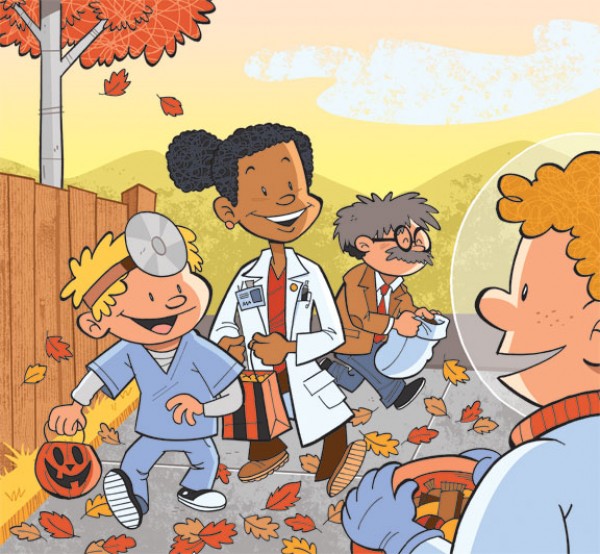 posted 3:00 pm PST
posted 3:00 pm PST |
Permalink
December 10, 2013
 Not Comics: Portrait Work From Telegraphy Gallery Face Value Show
Not Comics: Portrait Work From Telegraphy Gallery Face Value Show

 posted 10:25 pm PST
posted 10:25 pm PST |
Permalink
Missed It: Wine, Women And Song

 posted 10:15 pm PST
posted 10:15 pm PST |
Permalink
Your AV Club Best Art- And Alt-Comics Works Of 2013

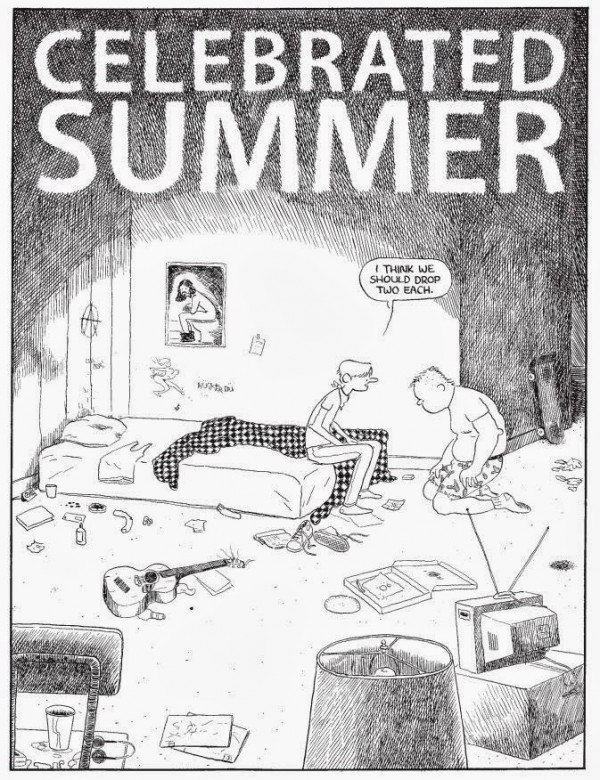 Here
Here. It's a largely idiosyncratic list even though not stridently so, and thus much appreciated on that level at least. The #1 and #9 choice are two I haven't seen on any other lists thus far.
Their choices are:
10.
Out Of Skin, Emily Carroll (Self-published)
9.
Kinski, Gabriel Hardman (Monkeybrain)
8.
Julio's Day, Gilbert Hernandez (Fantagraphics)
7.
Little Tommy Lost: Book One, Cole Closser (Koyama)
6.
Over The Wall, Peter Wartman (Uncivilized)
5.
Battling Boy, Paul Pope (First Second)
4.
The Encyclopedia Of Early Earth, Isabel Greenberg (Little, Brown and Company)
3.
Boxers and Saints, Gene Luen Yang (First Second)
2.
The Property, Rutu Modan (Drawn And Quarterly)
1.
Celebrated Summer, Chuck Forsman (Fantagraphics)
Those picking were Jason Heller, Oliver Sava and Matt D. Wilson.
posted 10:10 pm PST |
Permalink
OTB: The Turtle Tamer Of Istanbul

 posted 10:05 pm PST
posted 10:05 pm PST |
Permalink
This Isn’t A Library: Notable Releases To The Comics Direct Market


Here are the books that make an impression on me staring at this week's no-doubt largely accurate list of books shipping from Diamond Comic Distributors, Inc. to comic book and hobby shops across North America.
I might not buy all of the works listed here. I might not buy any. You never know. I'd sure look at the following, though.
*****
OCT130333 RICHARD STARKS PARKER SLAYGROUND HC $17.99
I quite enjoy these Darwyn Cooke adaptations, and find them an intriguing vehicle for what Cooke likes to do on the page with staging, figure drawing and design in much the same way that a couple of the many
Parker movies allow for aesthetic interest you might no expect to work. It's great to have a book like this out right before the holiday, as it give me something to pick up when I'm in a Barnes & Noble somewhere. Starting today, though, you can buy it in a comics shop.
 OCT130321 STAR TREK ANNUAL 2013 [DIG] $7.99
OCT130321 STAR TREK ANNUAL 2013 [DIG] $7.99
I was going to add a few more books but I don't have access to the Diamond text with the order lines, so instead of hearing about the Oni Press book
Buzz as the book with a featured covered in the midst of this text please consider John Byrne doing a photo novel featuring the classic
Star Trek cast. I love the idea of this book so much I don't even care about its execution, and I've come to greatly enjoy the books IDW has done in partnership with the cartoonist.
OCT130062 ABE SAPIEN #8 $3.50
AUG130091 ABE SAPIEN TP VOL 03 DARK TERRIBLE NEW RACE MAN $19.99
These are your Mignola-verse books of the week, which means they always get a look from me. I decided a while ago that if I was ever going to collect these it would be in comic-book form, but I suspect one of the reasons the series has been successful despite only every selling in modest fashion is how strongly they hit multiple formats.
AUG130697 INVINCIBLE #107 [DIG] $2.99
SEP130635 SATELLITE SAM #5 (MR) [DIG] $3.50
OCT130633 WALKING DEAD #118 (MR) [DIG] $2.99
Three random comics from Image, all in the heavier weight-classes of the books that publisher puts out on the market. That's a double dose of writer Robert Kirkman, including the accelerated
Walking Dead serial featuring a way amongst the zombies.
SEP130808 IMMORTAL IRON FIST COMPLETE COLLECTION TP VOL 01 $39.99
Marvel's book publishing program doesn't make a whole lot of sense in a big picture way
or a fine details way -- there's little in the way of discrnible, overriding strategy; things frequently go out of a print in a way that not only represents a lost opportunity but frustrates the sale of other books -- but you can find several books to buy in there if you like just about any significant aspect of their post-1960 output. This is one of those books I don't want in another form but that people might want to have this way.
JUL131096 SUNDAY NIGHT MOVIES SC $19.95
This looks to be one of those little art books that the publisher occasionally publishes, although I should probably make that "publishes with significant regularity" because there are a bunch of them. This is as the title suggests drawn from the artist's memories of movie-going.
SEP130509 GODLAND FINALE $6.99
Congratulations to Joe Casey and Thomas Scioli on finishing up their extended riff on 1970s cosmic comics, sung almost entirely in the key of Kirby. I own them all.
*****
The full list of this week's releases, including some titles with multiple cover variations and a long, impressive list of toys and other stuff that isn't comics,
can be found here. Despite this official list there's no guarantee a comic will show up in the stores as promised, or in all of the stores as opposed to just a few. Also, stores choose what they carry and don't carry so your shop may not carry a specific publication. There are a lot of comics out there.
To find your local comic book store,
check this list; and for one I can personally recommend because I've shopped there, albeit a while back,
try this.
The above titles are listed with their Diamond order code in the first field, which may assist you in finding comics at your shop or having them order something for you they don't have in-stock. Ordering through a direct market shop can be a frustrating experience, so if you have a direct line to something -- you know another shop has it, you know a bookstore has it -- I'd urge you to consider all of your options.
If I failed to list your comic, that's because I hate you.
*****

*****
*****
posted 10:00 pm PST |
Permalink
Go, Look: I Want My Helmet Back

 posted 7:30 pm PST
posted 7:30 pm PST |
Permalink
2D Cloud Announces Five Books For 2014




The small comics publisher 2D Cloud earlier today
announced five books for 2014 via e-mail and blog post. They are:
*
Rudy, Mark Connery
*
Detrimental Information, John And Luke Holden
*
Dragon's Breath, MariNaomi
*
Qviet, Andy Burkholder
* An As-Yet Unnamed Collection Of Work, Blaise Larmee
The Connery book will be edited by Marc Bell.
The first three are the Spring books, while the Burkholder and the Larmee will come out in Fall, thus the inclusion of the first three covers in that blog post.
You can read comics by Luke Holden, Blaise Larmee and MariNaomi
at the publisher's on-line platform for comics.
posted 7:00 pm PST |
Permalink
OTBP: Comics And Merchandise From Massive

 posted 6:30 pm PST
posted 6:30 pm PST |
Permalink
OTBP/Not Comics: Legendary Cartoonists Card Set

 posted 5:00 pm PST
posted 5:00 pm PST |
Permalink
Random Comics News Story Round-Up

* Ethan Gach at
Forbes writes about the inexorable rise of comics for table-type devices.

* Daniel Kalder on
The Strange World Of Your Dreams. Richard Bruton on
Throw Your Keys Away,
A1 Annual,
The Bizarre Adventures Of Gilbert & Sullivan: Volume Two: The Sound Of Music and
The Heroines Zine. Joe Gordon on
Dungeon Fun: Book One. Rob Clough on
Woman Rebel.
*
congratulations to Sean Kleefeld.
*
here's a look at the
Miracleman pages from Marvel's new edition, side by side with the original versions. And
here's another one. I have the least sophisticated appetite for mainstream comic book color in the entire world, so I'd basically have to say a magic word and change into someone else entirely before I'd be able to render an opinion. I'm sure people hate it, though. They always do.
Here's the full preview.
* not comics:
Warren Ellis is getting back into the e-mailed newsletter business.
* not comics:
that is a lovely label. You can put it next to your Ralph Steadman wines.
* Steve Sunu talks to
Jason Aaron. Tim O'Shea talks to
Lee Garbett. Benjamin Bailey talks to
Rick Remender.
* Chris Arrant
would like Marvel to make better use of its god characters after they've enjoyed some recent success with Thor.
* finally, that Frank Miller comic book series follow-up to
300 will not be ready for the marketplace at the time the movie follow-up of the movie version of
300 makes it to theaters.
posted 4:00 pm PST |
Permalink
Happy 56th Birthday, Peter Bagge!

 posted 3:00 pm PST
posted 3:00 pm PST |
Permalink
Happy 49th Birthday, Lewis Trondheim!

 some people have 11-11, some have 12-11; I'd wish that guy a happy birthday twice
posted 3:00 pm PST
some people have 11-11, some have 12-11; I'd wish that guy a happy birthday twice
posted 3:00 pm PST |
Permalink
Go, Look: Michael Kupperman Art For Sale

 posted 12:30 am PST
posted 12:30 am PST |
Permalink
Avatar Press Names Hannah Means-Shannon EiC Of Bleeding Cool

Congratulations to Hannah Means-Shannon
on the announcement of her new gig at Bleeding Cool. Means-Shannon is smart, prolific and well-liked; that's a good hire for them.
posted 12:00 am PST |
Permalink
December 9, 2013
 OTBP: Sugar Booger #1
OTBP: Sugar Booger #1

 posted 10:25 pm PST
posted 10:25 pm PST |
Permalink
Go, Read: A Pair Of Cartoonist Profiles


* I greatly enjoyed
this extensive profile of Jaime Hernandez by Paul Gravett. It's the kind of article that makes you want to write nothing but that kind of article. If
this isn't the damndest spread of the last decade, I'm not sure what is.
* Dana Jennings
does sort of a Rube Goldberg 101, by which I mean a solid mainstream-magazine style profile-in-general of the kind that always used to accompany any new book or movie or play about an artist. I had not known that Rube Goldberg was so prolific, although I'm still more of a Rowland Emett man.
posted 10:20 pm PST |
Permalink
Go, Bookmark: Big Mouth At Boing Boing

 posted 10:15 pm PST
posted 10:15 pm PST |
Permalink
Your AV Club Best Mainstream/Superhero Works Of 2013

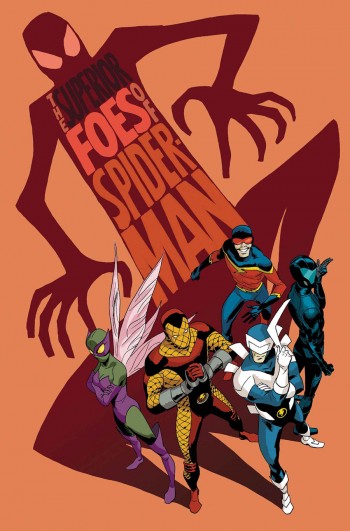 Here
Here.
I appreciate a list like this because while I'm familiar with most of the books on here, and have read 18 of 20 here (I haven't caught up to the
X-Men book mentioned, or this iteration of
Locke & Key), I don't have a refined aesthetic when it comes to sorting one out from the other. I'm also old enough that I might fall prey to liking a work more because it operates within parameters with which I'm familiar, and could over-like the comic book equivalent of one of those horrible shows on TV Land. With that pair of admissions in place, I guess there's also a chance I might mislabel someone else's scattershot examination as the product of significant and thoughtful engagement, but it seems to me that having much-loved series like
Saga and
Daredevil in the second ten indicates this is something other than a rhetorical exercise in positioning one's taste for public view.
Their choices:
20.
Dream Thief, Jai Nitz and Greg Smallwood (Dark Horse)
19.
Trillium, Jeff Lemire, Trillium (Vertigo)
18.
Fatale, Ed Brubaker and Sean Phillips (Image)
17.
Wonder Woman, Brian Azzarello, Cliff Chiang, et al. (DC)
16.
Zero, Ales Kot, Michael Walsh, et al. (Image)
15.
Daredevil, Mark Waid, Chris Samnee, et al. (Marvel)
14.
Prophet, Brandon Graham, Simon Roy, et al. (Image)
13.
X-Men: Legacy, Simon Spurrier, Tan Eng Huat, et al. (Marvel)
12.
Hellboy In Hell, Mike Mignola (Dark Horse)
11.
Saga, Brian K. Vaughan and Fiona Staples (Image)
10.
Five Ghosts, Frank J. Barbiere, Chris Mooneyham, et al. (Image)
9.
The Superior Foes Of Spider-Man, Nick Spencer and Steve Lieber (Marvel)
8.
East Of West, Jonathan Hickman and Nick Dragotta (Image)
7.
Locke & Key: Omega And Alpha, Joe Hill and Gabriel Rodriguez (IDW)
6.
FF, Matt Fraction, Lee Allred, Michael Allred, (Marvel)
5.
Swamp Thing, Charles Soule, Kano, et al. (DC)
4.
Astro City, Kurt Busiek and Brent Anderson (Vertigo)
3.
Hawkeye, Matt Fraction, David Aja, et al. (Marvel)
2.
Nowhere Men, Eric Stephenson and Nate Bellegarde (Image)
1.
Mind MGMT, Matt Kindt (Dark Horse)
posted 10:10 pm PST |
Permalink
OTBP: New Batch Of Mini Kuš! For Sale




 posted 10:05 pm PST
posted 10:05 pm PST |
Permalink
Your Whitney Matheson Best Of Comics/Graphic Novels 2013

The longtime
USA Today pop culture columnist Whitney Matheson has named her top comics list for 2013, stressing that she can only read so many comics so that this is a list that grows out of her regular consumption of the medium as opposed to a systematic exploration. Her choices:

11.
Burning Building Comix, Jeff Zwirek (Top Shelf)
10.
A Matter of Life, Jeffrey Brown (Top Shelf)
9.
Bad Houses, Sara Ryan And Carla Speed McNeil (Dark Horse)
8.
Trillium, Jeff Lemire (Vertigo)
7.
Pippi Fixes Everything, Astrid Lindgren And Ingrid Vang Nyman (D+Q)
6.
The Private Eye, Brian K. Vaughan And Marcos Martin (Self-Published)
5.
Red Handed: The Fine Art of Strange Crimes, Matt Kindt (First Second)
4.
My Dirty Dumb Eyes, Lisa Hanawalt (D+Q)
3.
Calling Dr. Laura, Nicole J. Georges (Houghton Mifflin Harcourt)
2.
Relish, Lucy Knisley (First Second)
1.
March (Book One), John Lewis And Andrew Aydin And Nate Powell (Top Shelf)
Matheson also selected
Saga Vol. 2,
Today is the Last Day of the Rest of Your Life,
Iron Bound,
Fairy Tale Comics and
Echo Island as honorable mentions.
posted 10:00 pm PST |
Permalink
Go, Look: The Worm Garden

 posted 7:30 pm PST
posted 7:30 pm PST |
Permalink
Bundled, Tossed, Untied And Stacked: Publishing News

 By Tom Spurgeon
By Tom Spurgeon
* the FPI blog
has a nice preview of the forthcoming
Bojeffries Saga collection from Top Shelf/Knockabout. You can see the entire cover through that link: front, back, spine, flaps.

* I am coming late to this news of
a book called Incomplete Works from Dylan Horrocks, but I am as happy as if I were the only person aware. It would be
so nice to have a bunch of new editions and works from Horrocks over the next several years.
* Zak Sally
lets us know he's halfway through
Recidivist #4, which is very exciting.
* in case you missed it,
Zainab Akhtar posted a whole bunch of imagery from Emily Carroll's 2014 book. Spring/early summer 2014 is going to see a big run of interesting books-with-spines from female cartoonists under 40: Jillian Tamaki (with Mariko Tamaki) and
This One Summer,
Katie Skelly at AdHouse, the Carroll previewed above and
the Eleanor Davis promised in the Fantagraphics kickstarter.
* a
new batch of mini kuš! is always exciting.
* Lucas Siegel talks to
Matt Gagnon and Shannon Watters of BOOM! Studios about their alt-/indy- imprint Boom! Box. Building on their relationships with artists, writers and cartoonists brought into the fold for the
Adventure Time license seems like a super-smart idea to me, and perhaps there's something to be said for extending that expanded relationship into stores that sell the licensed books. I can imagine this being a good home for a certain kind of comic and a certain kind of comics-maker, and I'll be interested to see where they are a year from now.
*
Vandroid. Not a whole lot to say other than that.
* a pair of mainstream comic book publishing news stories I missed, so they're quite old by now. The first is that last week
marked the end of writer Geoff Johns' run on Aquaman, which was a very effective run in terms of getting the character over a bit with a fan base kind of reluctant to care about that one. Those kinds of books are reputation makers for writers like Johns, not that he isn't already in the land of the perpetually over. The second is
that they're relaunching Daredevil, which wasn't really a secret but that's a well-liked comic and it shows just how Marvel feels captive to market forces that give an automatic sales boost to first issues. I didn't really miss that
Felipe Smith and Tradd Moore are the creators behind a Ghost Rider re-launch because this is my first opportunity to run that story. I would imagine that most of the attention there is on putting that character in a car rather than on a motorcycle, but it's Smith's involvement that has my attention.
* if I'm reading
this correctly, the
Stranger is running comics through a new arts publication/focused presentation. Sounds great.
*
congratulations to Michel Fiffe for making it to the 12th issue of his Copra and hooray that it will continue.
* CF's "Monorail High"
joins a stellar line-up of comics-makers at
Mothers News.
*
Robin McConnell briefly discusses future publishing plans.
* finally,
Jacob Covey doing an art book of LB Cole's comics covers for Fantagraphics? Yes, please.
 posted 7:00 pm PST
posted 7:00 pm PST |
Permalink
Go, Look: Two Newer Comics From Boulet

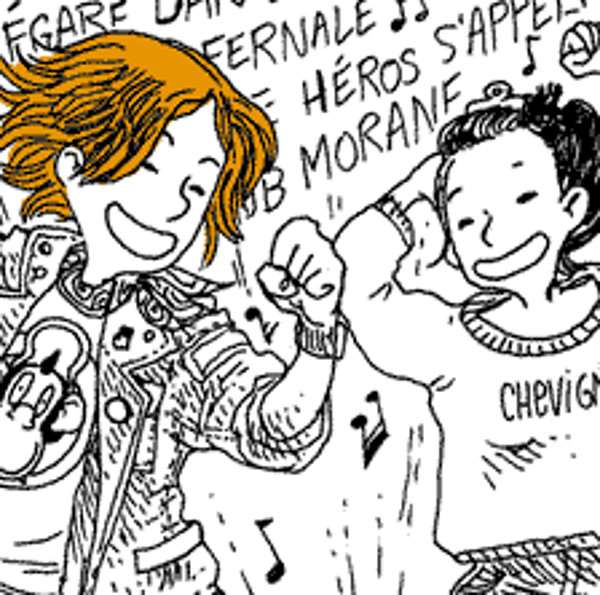
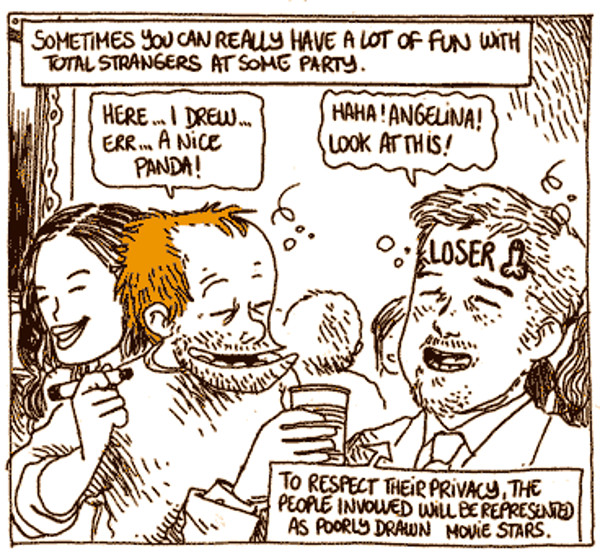 posted 6:30 pm PST
posted 6:30 pm PST |
Permalink
Go, Look: Walt Kelly In Tiny Tots Comics #1

 posted 5:00 pm PST
posted 5:00 pm PST |
Permalink
Random Comics News Story Round-Up


* Paul Buhle on
Daredevil -- the one from early comic books. J. Caleb Mozzocco on
various comics. Henry Chamberlain on
Velvet #2. Jeffrey O. Gustafson on
Infinity #6 and Uncanny Avengers #14. Taylor Lilley on
Borb. Richard Bruton on
Chloe Noonan 4.5 and
Between The Billboards Volume Five: The Nothing That You Know. Gabriele Di Fazio on
Life Zone.
*
overlooked comics analyzed at Multiversity Comics. Man, there are a lot of overlooked comics these days.
* Heidi MacDonald
asks a small group of Direct Market retailers if they think the lack of serialization on non-genre indy, alt and art comics is a poor model. There's some good material in those responses but overall I think this is kind of a silly argument. None of these publishers are averse to money, and the model of serializing the bulk of what those publishers produced wasn't strategically withdrawn; it outright failed in the marketplace. I just don't see what's changed that you can say with any certainty that everyone should be doing it again, and the fact that nearly none of the cartoonists in alternative comics with healthy careers serialize has a little more weight with me than asserted extra sales, which is something you can always argue. So even though I think there's plenty of room for someone to try serial alt-comics in a big way right now, and there are some comics for which it works great and there could be a few more of them, you really can't trumpet with any certainty this model works or that model works or that one doesn't. It's almost all situational these days.
*
Lark Pien made a Kick-Ass Annie comic.
*
that's a good-looking drawing of the Marvel character Havok. I always thought that was a good litmus test for superhero readers: some people think that character design looks pretty cool, some don't. While I'm enjoying random superhero art,
here's Michel Fiffe drawing the Image characters.
* finally,
here are the Short Run Prom photos.
posted 4:00 pm PST |
Permalink
Happy 93rd Birthday, Dan Spiegle!

 posted 3:00 pm PST
posted 3:00 pm PST |
Permalink
Happy 54th Birthday, Chas Troug!

 posted 3:00 pm PST
posted 3:00 pm PST |
Permalink
Happy 35th Birthday, Jason Leivian!

 posted 3:00 pm PST
posted 3:00 pm PST |
Permalink
Bundled Extra: 2014 Emily Carroll Collection Previewed

 posted 8:00 am PST
posted 8:00 am PST |
Permalink
December 8, 2013
 Go, Look: Clip Joint
Go, Look: Clip Joint

 posted 10:25 pm PST
posted 10:25 pm PST |
Permalink
Your Paste Magazine List Of Best Comics Artists Of 2013


I'm coming to this one way late, but a crew of writers at
Paste -- Hillary Brown, Robert Tutton, Mark Rozeman and Sean Edgar --
have assembled a list of really good artists working in comics during 2013, in part a celebration of the diversity of styles on display. Their choices are:
10. Noelle Stevenson, for
Nimona
9. Sean Murphy, for
The Wake and
Punk Rock Jesus
8. Dash Shaw, for
New School
7. Mike Allred, for
FF
6. David Aja, for
Hawkeye
5. Nate Powell, for
March
4. Paul Pope, for
Battling Boy
3. J.H. Williams III, for
Batwoman and
Sandman: Overture
2. Jae Lee, for
Batman/Superman
1. Fiona Staples, for
Saga
posted 10:20 pm PST |
Permalink
Go, Look: A 1941 Mac Raboy Comic Book Story

 posted 10:15 pm PST
posted 10:15 pm PST |
Permalink
CR Newsmaker Interview: Benjamin Saunders

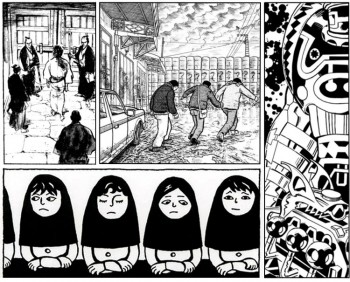 Benjamin Saunders
Benjamin Saunders is a professor of English at the University Oregon and the director of its
Comics & Cartoon Studies program. On December 3, the university
announced that a private donor had pledged $200,000 -- to be donated at a rate of $50,000 a year for four years -- to go into an endowment for the program, which supports an undergraduate minor at the university, hailed as the first of its kind. Saunders noted that while the investment would be used to support classroom visits from working comics professionals and potential comics-art exhibitions at
the Jordan Schnitzer Museum of Art, the value of the contribution could also be felt in the vote of confidence from one donor for the program entire.
I had a few follow-up questions, which Saunders answered so well I wanted to provide their entirety here, the only change being taking the questions themselves out of e-mailed short-hand and tweaking a couple of things syntax-wise. I hope he won't mind.
I thank Professor for his time and these articulate answers. There are dozens of good things that can happen to comics over the next couple of decades, and the
institutional attention of universities where actualized individuals work not within a splendid class or two but in terms of a program drawing on resources from multiple departments and the wider communities, that is indeed one of those things.
TOM SPURGEON: Was the money you received directed
to be spent a certain way?
BENJAMIN SAUNDERS: The donor was very specific that the funds be used to enhance the study of comics -- i.e. panel cartoons, comic books, comic strips, graphic novels, digital comics -- as distinct from other forms of cultural production. We have been granted plenty of leeway to determine how best that can be done within the parameters of our program. I think the primary desire of the donor is that programs such as ours will contribute to a better appreciation and understanding among the general public with regard to the emotional and aesthetic range, the global character, and the extended history of this beautiful expressive medium that we call "comics." That happens to be my goal, too. I'd like to see more people reading more, and more different, comics. This endowment will help to make that task easier.
SPURGEON: Does that money need to be spent over a specific, designated period of time.
SAUNDERS: The way endowment gifts work is that
the UO Foundation invests the money in high-yield accounts and then we faculty working in the Minor get to spend a portion of the interest, annually. So the money never runs out -- this is a permanent income stream. Of course that means that, from year to year, the sums we actually have to spend are relatively modest -- perhaps between $8000 and $10000 annually. But when you have nothing, $8000 is a lot.
And if we don't touch it for, say, a year, then we have quite a nice amount for a bigger event -- a two-day conference or an education exhibit, for example.
The real beauty of this arrangement is that the endowment is always there -- and we can build on it, if other donors choose to invest in our program.
I see this as just the first peg of the tent. I'd love to be able to create, say, an "artist-in-residence" program next. I imagine -- I dream -- that one day we could get a large enough endowment to keep a young, ambitious creator fed and sheltered for, say, a term, giving him/her the space to work in an uninterrupted fashion -- with the only requirement being to meet with students for a few hours a week and help them with their own comics. That's one of my longer-range goals.
Bottom line is that universities are spaces in which to foster creative inquiry of all kinds -- and this medium has been neglected by us. There's so much more that the institution of the University can do for comics, to make the form grow.
SPURGEON: As you announced the money is going toward bringing in industry folks and supporting exhibitions, I wonder we should infer from that that the program itself is pretty well supported there at the school in terms of its basic needs.
SAUNDERS: Institutionally and administratively I have been supported at every level. But we've been able to get this far in part because of what we assembled
without asking for a lot of money. I pitched the minor as "cost neutral" -- just using the talented people we already had on the ground. I have so many brilliant colleagues who are excited to be part of this, and who can bring their specialist skills to bear. A professor of French Literature like
Fabienne Moore is always going to do a better job than I can with the Franco-Belgian tradition, for example, because of her language skills.
Steven Brown,
Akiko Walley and
Glynne Walley are all experts in different aspects of Japanese visual art and literature. Their Manga and Anime classes are tremendously exciting because the course content is informed by that broader knowledge.
Elizabeth Wheeler in our English Department,
Michael Allan in Comparative Literature, and
Surabhi Ghosh in our Art department all bring different specialisms and skills to bear -- and there are other faculty who I know will pitch new classes in the coming years who will continue to broaden and deepen the program. I'd love to see more classes in the Romance Languages, a class in the Journalism school on editorial cartoons...
We have talented graduate students here, too, who bring the energy of youth to their own classes.
But the point is that these wonderful people are here doing their work anyway. Gathering together under the umbrella of comics studies was all we needed to do -- and that's where the initial administrative support and good will was key.
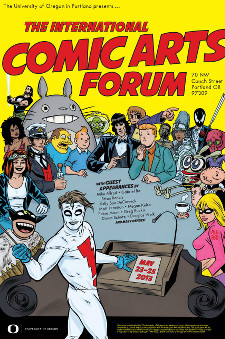
Also...
Over the last few years I personally have taken on extra teaching -- smaller one-credit classes for which I get paid
not in salary but in
research funds, which I have then spent bringing professionals to campus, or on organizing conferences like ICAF (which we hosted at our Portland space last Spring; you may have seen the amazing poster
Mike Allred did for that). I use those funds as "seed money" when I then go round various departments looking for more help. ("Say, I'm putting in $2000 to make ICAF happen -- will your department kick in another $500?" -- that kind of thing.)
I've also applied for and won a few internal grants -- a few $1000 here or there -- to help pay for things like
ICAF or the
Schulz exhibit we did last year.
Because of our location near Portland, a little money can go quite a long way in terms of bringing a variety of guests to the campus -- so many great professionals live within hailing distance. I've tried to be conscientious in reaching out to that great artistic community, and have been amazed at the willingness and generosity of so many members of the Portland comics scene to help out -- no matter how busy they are. It means a great deal to the students to meet the people who write, draw, edit, publish, and teach comics. It helps them to see themselves doing similar work, I think. The guests we've had over the last few years -- the list is pretty amazing. Mike Allred,
Marc Andreyko,
Brian Bendis,
Howard Chaykin,
Matt Fraction,
Chris Roberson,
Greg Rucka,
Diana Schutz,
Gail Simone... and at ICAF we had the brothers
Ba and Moon,
Kelly Sue Deconnick,
Megan Kelso,
Tommi Musturi... jeez, who am I forgetting...
And now Brian is teaching a class for us!
These wonderful people are willing to give their time for relatively little remuneration because, I think, I hope, that they believe in what we are trying to achieve with our program. That faith and support from actual creators is what make me want to keep expanding Comics Studies here and making it better.
And I should say that I've also been really lucky in that we have a supportive Library -- particularly the folks in Special Collections, where we have the Gardner Fox collection of golden age comics -- and a visionary director, Jill Hartz, at our University Art Museum, the Jordan Schnitzer Museum of Art. Jill has supported some terrific exhibitions of original art over the last couple of years and we have more planned.
*****
Professor Saunders can be contacted through the page linked-to through the initial mention of his name.
*****
*****
posted 10:10 pm PST |
Permalink
Go, Look: Captain Midnight #54

 posted 10:05 pm PST
posted 10:05 pm PST |
Permalink
Comics By Request: People, Projects In Need Of Funding
 By Tom Spurgeon
By Tom Spurgeon
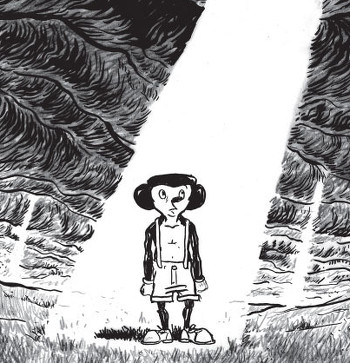
* a bunch of the sales/fundraisers we've been tracking continue even as some fade from view. As far as I know, efforts to help Stan Sakai as he attempts to make up a home healthcare insurance gap
remain ongoing. Sakai is one of the best people in the industry, and I hope you'll give that one a look.
Zak Sally continues to have a big sale in honor of La Mano's 21st birthday. Julia Wertz
has unleashed a bunch of art and prints on the world at her Etsy store. As far as I know, you can still support Mark Newgarden and Megan Montague Cash
and their sale to help pay off recent flooding damage.
* via Steve Blatchford comes a reminder that the comics-soaked
Mothers News is heading into the final hours of its fourth-year fundraiser. That seems like a worthy project to me. There's a CF print available, image of which is at the bottom of this post.
* Rob Clough
thanks those that donated after his recent plea for tips/donations in support of his critical writing in light of some family money issues. He says their crisis is averted. Good job, comics. Also,
congratulations to Team Top Of The Line.
* the Sequential Artists Workshop
is seeking a few thousand dollars in support of its 2014 programs. Tom Hart and Leela Corman are some of the best people in comics, and would put any money raised to good use. Please take a look at that one, particularly if you know them or their work.
* in specific comics-related efforts for things outside of comics, the charity anthology
Panels For Primates has two volumes available for sale digitally right now, with proceeds to a primate rescue center in Kentucky. Rina Ayuyang
is raising a bit more money via a last round of art auctions featuring various alt-comics heavy-hitters to benefit Philippines typhoon relief. The veteran writer Ron Marz continues to raise money for children via eBay auctions
here. A donation drive at Comic Creators For Freedom
continues until mid-month. There are also ongoing efforts like
Hero Initiative,
Aurora Rise, the
CBLDF and
Child's Play.
* there are a bunch of more standard projects out there for your perusal, and it's always fun to spend some time near the holidays looking around at people trying to facilitate one dream of publishing or another.
Here's a project that has some traction in the webcomics realm that should make its amount but not by a whole ton.
* finally, as will be the case this entire month, Dan Nadel
continues his 50 percent off sale at PictureBox as that company winds down the front-list part of its admirable life.
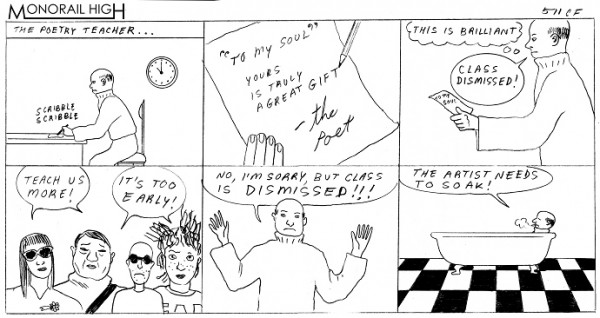 posted 10:00 pm PST
posted 10:00 pm PST |
Permalink
Go, Look: Jeremy Eaton’s Etsy Store

 posted 7:30 pm PST
posted 7:30 pm PST |
Permalink
Your List Of Michael Dooley-Picked Best Design Books/Digital Works With A Graphic Narrative Slant


Michael Dooley over at
Print's on-line presence has picked a list of books he describes as his "latest list of best design books, with a slant toward graphic narrative." He claims the medium has been much on the mind lately, and I won't complain.
His choices are:
1.
The Art of Rube Goldberg: (A) Inventive (B) Cartoon (C) Genius
2. Peter Maresca's
Society Is Nix Anthology
3.
IDW's Artist Editions: Best of EC
4.
Goddamn This War!
5.
Iron Bound
6. Trina Robbins'
Pretty In Ink
7. Ivan Brunetti's
Aesthetics: A Memoir
Dooley goes into each choice for about a paragraph or so.
posted 7:00 pm PST |
Permalink
Go, Look: Another Ryan Sook Mini-Gallery

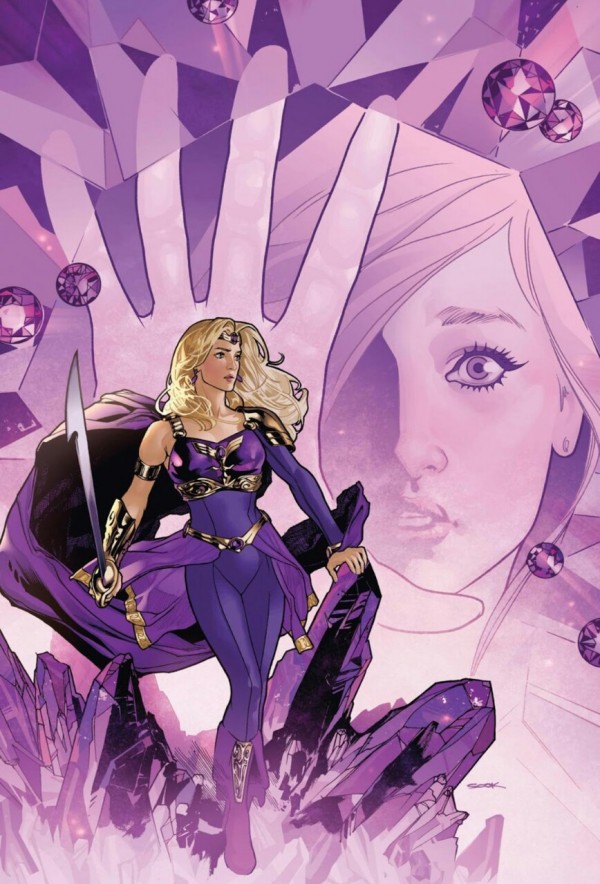 posted 6:30 pm PST
posted 6:30 pm PST |
Permalink
Go, Look: Bonus Army

 posted 5:00 pm PST
posted 5:00 pm PST |
Permalink
Random Comics News Story Round-Up

* Andy Khouri's collections-oriented comics gift guide
looks exemplary at a first glance.

* Sarah Boxer on
The Great War. Shannon Smith on
various mainstream comics. Don MacPherson on
Harley Quinn #0. Sean Gaffney On
Alice In The Country Of Clover: Cheshire Cat Waltz Vol. 7. J. Caleb Mozzocco on
Batman: The Joker's Last Laugh. Richard Pachter on
a bunch of different comics.
* I'd love to know what kind of list Faith Erin Hicks would think actually constitutes having enough time to make one, because
this is a fine, lengthy list of Christmas recommendations.
* the Collective Memory we ran at
CR has already been moved to the right-hand column, but it's worth noting that J. Caleb Mozzocco wrote a bit at length about the demise of PictureBox Inc.
here, and
this humorous promotional video for final publication
Infomaniacs shows Dan Nadel referring to the company in past tense.
*
where all the Wolverine comics live.
*
happy 10th blogging anniversary to Mike Sterling, on the Mt. Rushmore of comics bloggers.
* I think I mentioned this on Twitter but failed to do so here: Bob Levin
reviewed the
Ray & Joe book that Fantagraphics puts out. That collection of Charles Rodrigues comics was kind of all by itself a reason to support the Fantagraphics kickstarter -- what a weird, wonderful thing to put out there. Bob Levin, of course, is one of the two or three great writers about comics.
*
TCJ has put up an accessible version of
their lengthy, cover-featured Bill Watterson interview from years and years ago, right as Watterson began to surge in popularity and before he stopped having a lot of interaction with the press. As I recall, it's best interview the cartoonist has done.
* Michael Cavna talks to
Ed Piskor.
* finally, KC Carlson ruminates on
Matter-Eater Lad. What a great character concept.
posted 4:00 pm PST |
Permalink
Happy 35th Birthday, Nate Neal!

 posted 3:00 pm PST
posted 3:00 pm PST |
Permalink
Happy 55th Birthday, Kelly Alder!

 posted 3:00 pm PST
posted 3:00 pm PST |
Permalink
Happy 55th Birthday, Jack Ruttan!

 posted 3:00 pm PST
posted 3:00 pm PST |
Permalink
CR Sunday Interview: Karl Stevens


*****

Every year there's one interview at
The Comics Reporter that boasts a difficult production pedigree. This year it was my conversation with the painter and cartoonist Karl Stevens.
Stevens and I talked mid-Summer about his then-recent release
Failure, one of the debut books from the relaunched
Alternative Comics. Stevens had worked with the publisher in its previous incarnation, so in a sense the project was a return home as well as the next book in Stevens' ongoing examination of the lives of young people growing older and slightly roughed up by the exhaustion that settles in after years of resists the monolith of economic necessity.
I think Stevens' work is frequently funny, I like the cultural milieu he's chosen to document, and he's learned to make effective use of his ability to craft stop-and-stare visuals.
Stevens is currently exhibiting work at Carroll and Sons in Boston. I always enjoy seeing him on the road, and I hope he'll forgive me the delay in getting this interview turned around. Please consider a purchase of his book or his work as a stand-in apology on my behalf. -- Tom Spurgeon
*****
TOM SPURGEON: Are you happy with the book? Is that a weird question to ask? You've done a few of them now. Is it still nice to have a new book in your hands, and to have a work like this out there where people can see it?
KARL STEVENS: Yeah. Absolutely. I definitely have a weird thing in my head where I just want to make a lot of books. I want to have a book coming out every couple of years. If it were up to me, if I could have my way, I'd have one out every year. At this point they're all pretty small press, but it's nice to keep putting product out there.
SPURGEON: You worked with Alternative in their previous incarnation, but is that how you ended up working with Marc Arsenault this time? I'm unclear as to how that relationship was rekindled. I have to admit, I was sort of surprised when it showed up -- I was not aware that you were doing this one with them. How did you end up with the new incarnation of Alternative?
STEVENS: The last book that came out with Jeff Mason was the
Whatever collection, the second book that I did. Marc reached out to me about the backstock of
Whatevers. It was this whole complicated thing. There are a few thousand copies of
Whatever that were at the printer in Quebec. Marc basically contacted to see if I wanted a couple of boxes. So I brought it up to him that I was looking for a publisher for the last collection of the
Failure strips and he was like, "Yeah, sure." [Spurgeon laughs] It was really informal. But yeah, he's taken control of the back catalog, including my books, and translated them into digital form. We're going to do a reprint of
Guilty -- that's the
Xeric book that I did.
SPURGEON: Sure.
STEVENS: I'm going to re-scan those pages, and then fix the spelling mistakes. [laughter]
 SPURGEON: I don't think I've ever talked to anyone that was work with Jeff when he kind of... departed the field. Winked out. There wasn't a spectacular crash and burn, it was like Jeff went out for cigarettes and never came back. And he's certainly around, and he has his career in law and he's a supporter of what they're doing down at SAW. But was that a weird circumstance for you as an artist working with that company? Everyone likes Jeff, I like Jeff, and I've not heard of anyone holding a professional grudge on any level with him, but that had to be a unique experience.
SPURGEON: I don't think I've ever talked to anyone that was work with Jeff when he kind of... departed the field. Winked out. There wasn't a spectacular crash and burn, it was like Jeff went out for cigarettes and never came back. And he's certainly around, and he has his career in law and he's a supporter of what they're doing down at SAW. But was that a weird circumstance for you as an artist working with that company? Everyone likes Jeff, I like Jeff, and I've not heard of anyone holding a professional grudge on any level with him, but that had to be a unique experience.
STEVENS: My book was the last book that he put out. [laughter]
SPURGEON: Well, there you go. It's your fault. It's on you.
STEVENS: It's all my fault. [laughter]
SPURGEON: You broke him, after all those books.
STEVENS: Exactly. He was like, "I don't know what to do anymore." [laughs] I remember at the time his wife was going to grad school, and the financials of wanting to keep publishing weren't there. He had to make some decisions about that. Yeah. I hadn't really had an experience with other publishers. Reading all
these tributes to Kim Thompson recently about how he was hands-on as an editor and arguing with
Chris Ware and
Peter Bagge, I could see how you might want that kind of relationship. He was sort of distant by the time he was putting out
Whatever, he maybe had one foot out the door, so I didn't have that kind of relationship with him that he might have had with artists on the earlier books.
SPURGEON: I hope this doesn't look bad in print, because I don't think either of us could ever be mad about the realities of small-press publishing. We know the score. It's kind of a miracle that any books come out.
STEVENS: Yeah.
SPURGEON: So was it weird getting the books back?
STEVENS: You mean recently?
SPURGEON: Yeah, I mean, it's like having an old friend come stay on your couch, at least in a sense. And I guess I further wonder if it was strange at all that at the moment you needed a publisher for this book, this old relationship kind of roars back into view. Lo and behold there are a bunch of Whatevers and this new opportunity.
STEVENS: Marc's been really good about the transition. He's been getting review copies out, he has a couple of people in their with him that do stuff for the books as well.
SPURGEON: Now was Marc hands-on at all in terms of the material?
STEVENS: I'm not much of a graphic designer, and I had a bunch of other projects I was doing, so he basically designed the
Failure book after I provided him with the raw materials. I even said to him, "I don't really care about how it's designed and the package, I'm not much of fetishist about the way it looks."
SPURGEON: Marc's an old-school art director; that's certainly in his skill-set.
STEVENS: Yeah, he's a graphic designer.
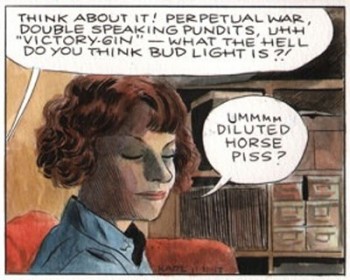 SPURGEON: The last book of yours was similarly conceived in that there was a mix of art and some color work in there, and the strips as well, some of which are presented in this form in color. It doesn't strike me as the easiest couple of books to sequence. It's not a bare bones presentation: there's a animating intelligence to it.
SPURGEON: The last book of yours was similarly conceived in that there was a mix of art and some color work in there, and the strips as well, some of which are presented in this form in color. It doesn't strike me as the easiest couple of books to sequence. It's not a bare bones presentation: there's a animating intelligence to it.
STEVENS: Yeah, yeah. As far as the art goes, I did pick images that I thought would work well with the strips. There was a lot of editing. I gave them about 180 pages of material and then it got cut down to about 157 -- so there was a lot of editing in that sense. It was a difficult book for me to conceive because those last couple of years of doing the weekly strip were very random. I went off in about a million different directions. I feel... at the time, I thought that; but looking back at the book it seemed more of a natural thing. It didn't seem as chaotic as it did while I was drawing it.
SPURGEON: You do go off in some different directions, but it seems like there are always through-lines that kind of ground the different paths you take. One thing I wanted to ask you about is that you said that this collection is the last, so I take that to mean it matches up with the last strips you did for The Phoenix before you were let go.
STEVENS: Yeah, this is it. This is all of them.
SPURGEON: So the infamous strip that mentions Budweiser in disparaging terms, the one you feel played a role in their letting you go -- is that the last strip that appears in The Phoenix? Because it's one of the last ones here.
STEVENS: There was one more after that. And the book isn't chronological. So the last one was Pope Cat dancing, which was a tribute to Jules Feiffer. I was trying to do Feiffer's dancer with Pope Cat. And failing miserably. [laughs] In the last panel I did have the dancer poke her head in and say something. But that was the last one.
 SPURGEON: The bulk of the book, then, is this period of wrapping up your alt-weekly effort. Even though you didn't know at the time when the end would come, there is a definite last day of summer camp vibe in a lot of the strip. It feels like there's a ticking clock off panel. It feels like the last time you'll be depicting certain things, there's an overripe quality to some of the scenes. [Stevens laughs] People complain about being a little older now; the content seems to address the end of
SPURGEON: The bulk of the book, then, is this period of wrapping up your alt-weekly effort. Even though you didn't know at the time when the end would come, there is a definite last day of summer camp vibe in a lot of the strip. It feels like there's a ticking clock off panel. It feels like the last time you'll be depicting certain things, there's an overripe quality to some of the scenes. [Stevens laughs] People complain about being a little older now; the content seems to address the end of something
.
STEVENS: As far as my time at the paper goes?
SPURGEON: As far as the strip's content. I don't know what your platform will look like in the future, but no matter the format it seems like there is something late-period about the content, that you were aware on some level of documenting a period in your life and in the lives of those around you as it came to a close.
STEVENS: Oh, yeah, definitely. There's definitely a sense of that. I would have done it for the next 30 years, just merely because they paid me well enough. It was nice to have that steady gig. But in the back of my head... and always. For most of the run I knew I wanted to do longer stories. I went from doing the Xeric book, which is a longer story to wanting to do something longer and trying to top myself with a longer work. Then they offered me the job of doing this strip. I never lost sight of those longer works. So having this strip was sort of like this albatross, wanting to do these longer stories but not having the time to do it because I was spending all of my time doing this weekly comic.
I think I was just trying to figure some things out.
SPURGEON: It seems like you're basically saying the way you had to work in order to do the strip may not be the way you'd most like to work.
STEVENS: Yeah. Exactly. I'd like to do longer stories, and would like to no longer have certain constraints. Although they did give me a lot of freedom. I got away with a lot, a lot more than most alt-weekly cartoonists.
SPURGEON: You mean in terms of content? Or the indulgence aspect in terms of engaging whatever you wanted to engage how you wanted to engage it?
STEVENS: Both. I just basically had to fill that space. I did it for so long. After
Failure ended I wondered if I should revamp it and pitch it to syndicates, or take it to another paper. But I just felt that I didn't want to commit to it, and that I'm not that kind of cartoonist. I'm not
Keith Knight or
Matt Bors that can put out this consistently brilliant product. I felt my work was to esoteric, too artistic or something.
SPURGEON: What do you mean by saying "artistic"?
STEVENS: There wasn't a theme to it. I was so spoiled to be able to write whatever I wanted to that there was never an overall theme it was attached to. Whenever I read a review of it and they review to hip, cool Boston kids, I don't understand what that means. I don't see that in the strip! [laughs] It's like, "What are they talking about?"
 SPURGEON: What do you seen in there, then? This isn't you exercising your creative id, there are a number of impulses on hand, some of which are distancing. You do this satirical material about a future version of yourself. There are recurring characters -- like Abby -- and you get used to seeing people over again as you're reading it. Certainly your visual sensibility all by itself is a binding element. There's "Vegan Dad." There's the process of making art that comes up as a theme, and then there's the parody of that. So if it's not focused on young, hip people, how would you conceive of it now that it's under a couple of covers.
SPURGEON: What do you seen in there, then? This isn't you exercising your creative id, there are a number of impulses on hand, some of which are distancing. You do this satirical material about a future version of yourself. There are recurring characters -- like Abby -- and you get used to seeing people over again as you're reading it. Certainly your visual sensibility all by itself is a binding element. There's "Vegan Dad." There's the process of making art that comes up as a theme, and then there's the parody of that. So if it's not focused on young, hip people, how would you conceive of it now that it's under a couple of covers.
STEVENS: I don't know. That's the question I was wrestling with. I don't know how to describe it. Going back to working on it, it was me trying to make my deadline. So it was week to week, whatever I thought was funny. I would ask myself every week, "What do I feel like drawing this week?" And then it would kind of spring from that. I wish I had more... Matt Bors has politics, I would like this thing I could rely on. With
Failure I feel like I was figuring that out. I had "
Pope Cat," and the future strips, and coming back to the realism of earlier strips and
The Lodger. I was trying to mix it all, but I wasn't satisfied with any one thing. I couldn't settle on doing one thing week after week.
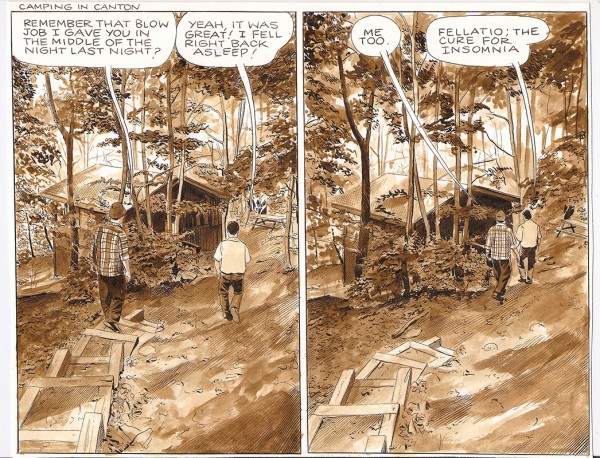 SPURGEON: Earlier this year I watched you read some of this work. It made me appreciate it in a different way. It was lighter. There's a humor that comes out in your voice regarding the characters in the strip, a slight mocking of what's going on with them. You have some distance from it -- you have a clear view on what's funny on its own terms and what's funny because by any rational standard it's outsized, ridiculous behavior. There's no endorsement of the absurdities that you're covering.
SPURGEON: Earlier this year I watched you read some of this work. It made me appreciate it in a different way. It was lighter. There's a humor that comes out in your voice regarding the characters in the strip, a slight mocking of what's going on with them. You have some distance from it -- you have a clear view on what's funny on its own terms and what's funny because by any rational standard it's outsized, ridiculous behavior. There's no endorsement of the absurdities that you're covering.
STEVENS: It's very lighthearted.
SPURGEON: I would imagine you sort of have to maintain a sense of humor drawing your own face, your own problems, over and over again.
STEVENS: Absolutely.
SPURGEON: I think people might feel the work is hopelessly self-absorbed if they look at it from the outside in and don't get in there and engage with the work strip to strip.
STEVENS: Why do I get stuck with that? How do I get that and
Gabrielle Bell avoids that, for the most part?
SPURGEON: I don't know. What do you think, Karl? Are we just being mean to you? Are we just being dicks for labeling you that way? I can't speak for other readers or people that write about comics, but I will admit that it took me a long time to come around on there being a lighter hand involved in your work, or at least a lighter touch than I would have guessed from my initial impression.
STEVENS: You thought I was taking myself too seriously.
SPURGEON: I'm not sure I thought exactly
that, but that's a rough version of it, sure. It seemed to me there was a self-satisfaction that you exuded in depicting your life. It took me a long time to come around to the humor as easily as I see it now.
STEVENS: But what was it about the content that made me seem like that to you?
SPURGEON: I don't know... maybe it's a hang-up about the kind of art involved? I'm not real sure.
STEVENS: It's something I think about. What is it about the art that puts some people off?
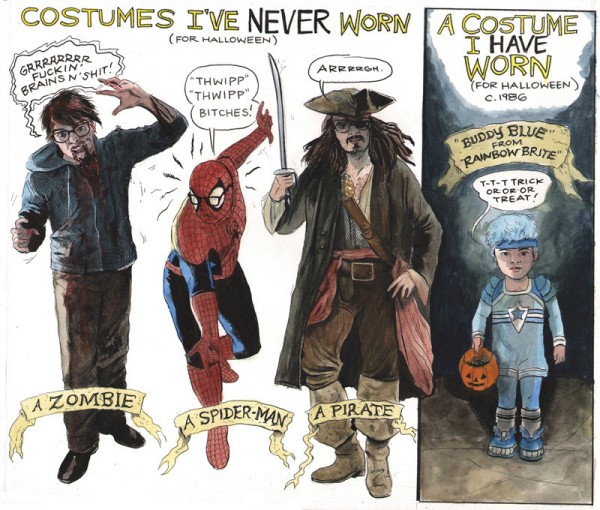 SPURGEON: I don't know -- or at least just behind the kinds of expectations we have for certain kinds of style, I couldn't tell you. It's a really fine line, right? Like with the Halloween strip in
SPURGEON: I don't know -- or at least just behind the kinds of expectations we have for certain kinds of style, I couldn't tell you. It's a really fine line, right? Like with the Halloween strip in Failure
, where you depict yourself as a kid, there are ways to take that where the ridiculousness of it is front and center, but there's a way to take it in where it's just you front-and-center, you being Karl Stevens, or a way to take it that favors the that it's you over anything you might be saying through this self-depiction. But I'm not sure why this would result in more people interpreting it one way over the other.
STEVENS: I'm curious about that. That's the very nature of autobiographical cartooning. How is what I do different in that way from [cartoonist
Robert] Crumb? Is it the art style? Is it because I wear glasses?
SPURGEON: [laughs] I think you'd have to be a pretty dim reader to -- I think in one point in one of the cartoons you even say "It's not easy being Karl Stevens." You'd have to be sort of a dimbulb to look at a strip like that and not see a distancing there, and a humor present. Hm. Why aren't we more generous with your work, Karl? I don't know. Maybe it's just me.
STEVENS: I think back to when I started, to want to become a cartoonist. When I was a teenager I read all these
Fantagraphics books and
Drawn and Quarterly books, Peter Bagge and
Julie Doucet, and being really inspired by these cartoonists. I wanted to be in that world. I went to conventions and sold mini-comics, and ingratiated myself. I submitted the comics I was working on then to those publishers and was rejected for so many years. I don't know. And where I'm at now, just building up whatever career I have, I guess, it still feels like I'm striving for the approval of a Fantagraphics or a Drawn and Quarterly. I don't know. I still feel like an outsider figure. I feel like all of my peers have passed me by. I'm like, "What is it?" [laughs] "What is it about my work?"
And there are real-world accolades.
The Lodger being nominated for the LA Times thing... I don't know.
 SPURGEON: With work that appears like yours has... I assume since it was in
SPURGEON: With work that appears like yours has... I assume since it was in The Phoenix
it had a Boston audience and because it was comics that it had a comics audience that didn't all the way overlap with the Boston audience. And sometimes when you have a natural split in your reading audience, those audiences will read your work completely differently. So let me ask you this: was the Boston audience a good audience for your work? Did you feel like they took the work on the terms you'd prefer people take it?
STEVENS: It was a popular strip. I got letters and stuff. But that's another thing: I don't feel like it was necessarily reflective of Boston.
SPURGEON: I'm not so interested in Boston specifically but that Failure
was appearing somewhere in front of an audience that would have no way of bringing comics-culture signposts to their understanding of it.
STEVENS: They weren't. And it was very popular. I would hear from
Tony Davis at Million Year Picnic that people would come into the store that had never been to a comic book store before and want to find one of the books. There was stuff like that. But it's definitely a weird hang-up that I have. Why does the snobby comics community [laughs] ignore me?
SPURGEON: This is the third time we've talked, Karl. I think. I haven't totally
ignored you. [Stevens laughs]
STEVENS: I'm venting.
SPURGEON: I do think there's a way you're processed differently than cartoonists doing similar work, a way that's maybe not generous to the humor involved. I don't think that's an unfair observation. I wish I had a better answer for you why people don't appreciate your strip for all of its qualities as opposed to settling in on one or two. Of course, once you start to dissect things on that level, you're talking about these very refined reactions from a limited pool, you're wanting a couple of dozen people to see work a highly specific way. And then you might even be getting to a place where it's just a series of differences of opinion in terms of what people see in the work, and what they might value about it. It's hard to project a systematic reaction onto what people are saying because it's actually so few people that engage work in that way at all.
I don't know. It's all messed up. We should all go back to bed. [laughter] "Please re-try Karl's work, everybody."
The inarticulate nature of our conversation -- at least from my end -- is a sign of how specific and delicate these kinds of cultural conversations can be. But I've definitely feel you've benefited from having an audience that isn't familiar with Gabrielle Bell or Robert Crumb.
STEVENS: I'm working on this book for
Candlewick Press -- it's an illustration project. It's a drama about a woman that's a war vet as she tries to reinsert herself into her small town in New Hampshire. I just finished sketching it all out. It's been this great process for me, to work on a longer story -- which is something I've been jones-ing for this last few years -- and to work within a professional structure. They gave me an advance so I can actually live off of comics for another year.
SPURGEON: That's come up a couple of times in recent interviews I've done, Karl, the positives of the traditional book-publishing set-up in terms of there being an editor whose job it is to work with you towards making the book in question better, and that there's a process for completing the work that doesn't automatically exhaust you.
STEVENS: It's nice having some editorial input after working at
The Phoenix, where they were like "Get this in by Tuesday night."
 SPURGEON: [laughs] Are you a different cartoonist now for this last run of work for
SPURGEON: [laughs] Are you a different cartoonist now for this last run of work for The Phoenix
, the material that appears in Failure
? And if so, how so? Where are you that's different?
STEVENS: I feel much more confident in my work. [pause] I guess. [laughter]
It's strange, because this new book, the book I'm working on, I didn't write it. It's my first experience translating a script. I did collaborate on the strip
Success, which ran for a year in
The Phoenix. But that was much more friendly. So I'm gaining discipline from this. I'm thinking about structure more. I'm also a different draftsman now. I've loosened up quite a bit in the last couple of years. I don't feel the need to crosshatch everything to death, and I'll try different techniques.
SPURGEON: There is an element to your art in Failure
that feels more lively than maybe some of the earlier books. You're not overworking the art, or even pressing your jokes -- at least not in most cases. There's more of a fuck-it attitude in terms of the humor landing that I thought might be a sign of increased confidence. The other option is that it comes from deep fear and that you did it from a stone panic. [laughter] But my first guess is that you just feel more like you know what you're doing.
STEVENS: After sobering up, too. Almost every one of those strips was done the day before deadline, and incredibly hung over. [laughs] I wasn't able to really concentrate, and sometimes I had like no joke. The classic cliché of the cartoonist before deadline.
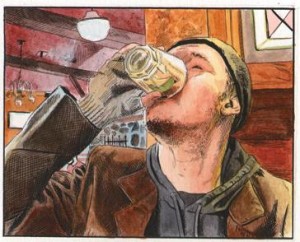 SPURGEON: There's a specific tradition of that in alt-weeklies, the kind of terrified, last-minute production as lifestyle.
SPURGEON: There's a specific tradition of that in alt-weeklies, the kind of terrified, last-minute production as lifestyle.
STEVENS: Oh, yeah. Yeah, yeah, yeah. I mean, I still drink. But now I take days off. [laughter]
SPURGEON: Your point is the overall production schedule is less... furtive.
STEVENS: It's definitely more under control. I know I'm like an alcoholic. It's just one of those things I have to deal with. Maybe I'll have to quit someday. [laughs] It's been okay. I just moved into this new place in downtown Boston with my girlfriend and she's on par with me as far as drinking goes. We definitely keep each other in check during the week.
This is boring personal stuff.
SPURGEON: This is the compelling stuff. [Stevens laughs] I'm going to run all of this in bold, with a slightly bigger font.
STEVENS: I definitely think about that, keeping the drinking under control. I wonder if I were more sober if I might have produced better work. Whatever. I definitely thrive on structure -- which is an alcoholic kind of trait. I'll spend eight to ten hours a day working really hard on comics or on painting and then at night get blotto.
 SPURGEON: Assuming those factors fall into place, how much comics would you ideally want to do? You have opportunities in painting -- you just mentioned the painting. You said you would have done the
SPURGEON: Assuming those factors fall into place, how much comics would you ideally want to do? You have opportunities in painting -- you just mentioned the painting. You said you would have done the Failure
strip for as long as they would have had you, and that was a vocational proclamation, but still. At the same time, you said you want to do longer work. Is there a perfect career path for you? I know it's odd for some people to even think of this stuff as a career, but you're in your mid-30s now, you must have thought about it once or twice that way.
STEVENS: Oh, yeah. Oh my God, yeah. I'm 34.
SPURGEON: So you're 34. New apartment with the girlfriend. Not drinking as much. So what's ideal? How big a role does comics play in your ideal vocational outcome?
STEVENS: It remains the main muse. I can't see myself ever not doing comics. I've always had it in my head, this desire to have a new book every couple of years. I'm really kind of working all of the angles. I'm excited by this Candlewick book, I'm excited by the Kickstarter book I started that got moved to the back of things because the Candlewick book came up and couldn't say no. I'm hoping to sell that next if not to Candlewick than to another publisher. Just keep putting out books. Having Marc there, knowing that I would put out just about everything I would do, it's nice having that security. I can never shake comics. I came to them at such a young age. I look at
Bernie Krigstein, who freed himself of them. I read that
Art Spiegelman story about him talking about his panting in terms of those being his panels now. I just hope that doesn't happen to me. [laughter] I hope I never say "Fuck it. I'm just going to paint." I don't think I could, you know? The hook is in too deep.
SPURGEON: Do you have a longer form comic in mind, after this current gig? Is that the Kickstarter project you mention?
STEVENS: It's called
Imitating Life. It's a comedy, a love-triangle story. And there's a zombie story that I have, too. But I might wait on that.
SPURGEON: You draw a good-looking zombie, Karl.

STEVENS: I've been doing some superhero stuff, too. I would love to get my feet into that. I thought it might be fun to do mainstream work.
SPURGEON: You have a whole Tumblr devoted to that. [Editor's note: It has since this summer become a more general tumblr.] Have people responded to your superhero drawings?
STEVENS: Yeah, just not in the way I hoped. [Spurgeon laughs] I was hoping that some editor would see that and say, "Hey, do you want to do the cover to
Punisher?" And I would be, "Yes. Yes, I do." Maybe not
Punisher.
Swamp Thing, that's the book I want to do. I was looking at the
Steve Bissette/
John Totleben stuff for inspiration. I thought, "That might be a fun book to work on." That might be fun. And there's money, too.
It's the old saw of being a freelancer/grifter. You're just trying not to get a job. I talk to [the writer and cartoonist]
Tim Kreider about this a lot. Our one goal in life is to not have to get a job. [laughter] How long can we keep this going?
*****
*
Failure, Karl Stevens, Alternative Comics, softcover, 1934460028, 160 pages, 2013, $21.95.
*****
* cover to
Failure
* photo of Stevens from 2012
* various images from this latest
Failure book, hopefully understandable by choice due to proximity to some sort of passage that explains the context
* the Swamp Thing image I don't think is from the
Failure book and instead appeared on the cartoonist's Tumblr
* a drawing from Stevens I found on-line (below)
*****

*****
*****
posted 12:00 am PST |
Permalink
December 7, 2013
 Go, Look: Isaac Lenkiewicz
Go, Look: Isaac Lenkiewicz

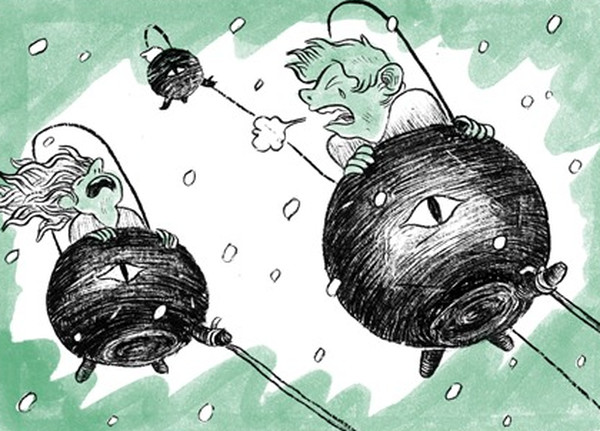 posted 7:30 pm PST
posted 7:30 pm PST |
Permalink
Go, Look: New Tony Millionaire T-Shirt Site

 posted 7:28 pm PST
posted 7:28 pm PST |
Permalink
Not Comics: JRR Tolkien’s Fantasy Art

 i always like looking at this stuff a few days before taking my mom to see the modern movie expression
posted 7:25 pm PST
i always like looking at this stuff a few days before taking my mom to see the modern movie expression
posted 7:25 pm PST |
Permalink
Not Comics: Sherlock Holmes As Presented By Collier’s

 posted 7:20 pm PST
posted 7:20 pm PST |
Permalink
Go, Look: Mysterious Suspense #1

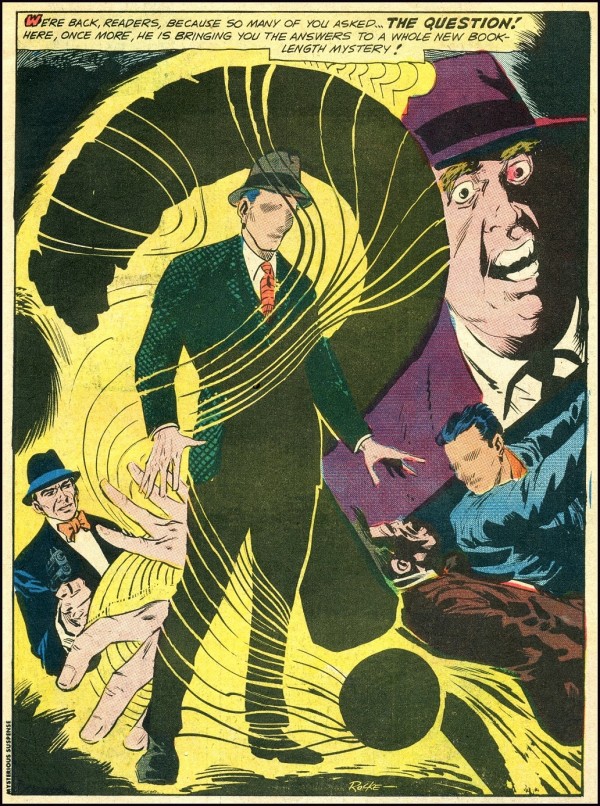 posted 7:15 pm PST
posted 7:15 pm PST |
Permalink
Go, Look: Moritat Pages For Sale

 worth it for the artist photo all by itself
posted 7:10 pm PST
worth it for the artist photo all by itself
posted 7:10 pm PST |
Permalink
OTBP: Julia Gfrörer Has An Etsy Shop

 posted 7:05 pm PST
posted 7:05 pm PST |
Permalink
OTBP: Dust Motes

 posted 7:00 pm PST
posted 7:00 pm PST |
Permalink
Random Comics News Story Round-Up
 posted 3:05 pm PST
posted 3:05 pm PST |
Permalink
Happy 46th Birthday, David Lasky!

 posted 3:00 pm PST
posted 3:00 pm PST |
Permalink
Happy 51st Birthday, Erik Larsen!

 posted 3:00 pm PST
posted 3:00 pm PST |
Permalink
FFF Results Post #360—2013 As A Year Of Events

On Friday,
CR readers were asked to "Name Five Memorable Comics-Related Events For 2013." This is how they responded.
*****
 Tom Spurgeon
Tom Spurgeon
1. Autoptic Launched In Minneapolis.
2. Danish Imam Expresses Regret Over Danish Cartoon Controversy
3. The Opening Of The Sullivant Hall Location For The Billy Ireland Cartoon Library
4. Jack Kirby's Birthday Seemed Like It Turned The Corner In Terms Of Becoming A Thing
5. The Passing Of Kim Thompson.
*****
Michael Grabowski
1. Political cartoonists in too many countries around the world continue to experience legal troubles with their own governments over the content of their cartoons, some getting incarcerated or worse. Thank God for those who can fight back!
2. Apple policies restrict comics sales through its devices/services.
3. Kim Thompson passes away, leaving a void in both valuable online and public personalities who advocate smartly for certain types of comics and those personalities who produce them.
4. Fantagraphics successfully procures funding from its readers for a big chunk of its 2014 publishing schedule.
5. Billy Ireland Library opens to public.
*****
 Buzz Dixon
Buzz Dixon
1. DC GTFO NYC 4 WB PDQ
2. Comics Collectors Finally Realize 99%+ Of Their Valuable Collectibles... Aren't
3. RIP Kim Thompson
4. In The Last Year Of His Life, Al Plastino Discovered He Was Lied To 50 Years Ago By Somebody At DC Comics re Art For Superman Meets JFK Story He Drew
5. If Every Marvel Cosplayer At Both New York And San Diego Comic Cons Walked Four Abreast Past The Thurgood Marshall U.S. Courthouse, The Kirby Family Would Still Be Screwed.
*****
 Sean Kleefeld
Sean Kleefeld
1.
Comixology opens European offices
2.
Opening of the new Billy Ireland Library & Museum
3.
Strip Search: Penny-Arcade's reality show about webcomics
4.
Closing of corporate-owned comic news sites (ComicsAlliance under AOL, MTV Geek, etc.)
5.
Daredevil and DC Comics are moving out to California
*****
 Oliver Ristau
Oliver Ristau
1. Fantagraphics launching a Kickststarter to fund their upcoming releases.
2. Uderzo finally letting Asterix out of his iron grip and giving a new creative team a chance to revitalize the series.
3. Stan Lynde dies.
4. Spirou's 75th Anniversary.
5. Superman killing a villain... it sucks, even though it is *only a movie*.
*****
 Michael Dooley
Michael Dooley
I sincerely wish that some positive events had come immediately to mind...
1. The far, far, far too early passing of Kim Thompson.
2. The absurdity of Daily Kos forbidding Ted Rall from drawing Barack Obama exactly the way they knew he always draws him.
3. Apple’s interfering with the distribution of Matt Fraction and Chip Zdarsky’s Sex Criminals.
4. Diamond’s interfering with the distribution of Howard Chaykin’s Black Kiss.
5. ComiXology’s interfering with the distribution of Black Kiss, Guido Crepax’s Story of O, Brian K. Vaughan and Fiona Staples’s Saga, etc., etc.
*****
 Alan David Doane
Alan David Doane
1. The death of Joey Manley. Joey was a visionary pioneer of of both putting comics on the internet and finding ways to talk about comics online. He was a great and generous guy and I can't believe he's gone.
2. The death of Kim Thompson. Imagine how different the last thirty years would have been without him, and how different the next 30 will be because of all he accomplished.
3. Agents of SHIELD debuts on ABC and blows it so completely that literally everyone on the planet has written about how to fix it. Only time will tell if the series can capture the energy and fun of the Avengers movie, which everyone expected it to do with one Uru hammer tied behind its back.
4. Everyone figures out that in addition to being an arrogant jerk, Brian Wood is also a sexist arrogant jerk. The internet comes alive with the sound of music, music about what an asshole Brian Wood is.
5. DC releases Before Watchmen in handsome hardcover editions designed to fool people into thinking the books are somehow related to Watchmen by Alan Moore and Dave Gibbons, or at least are any goddamned good at all. The fans fail to set the books on fire, because the fans suck.
*****
 Zainab Akhtar
Zainab Akhtar
1. Growth of UK convention/events circuit: Stripped festival, Lakes International Comics Art festival, ELCAF, Thought Bubble doubling ticket sales for biggest ever year, numerous smaller events
2. Boulet blowing everyone out of the water with his usage of the web-comics platform
3. Kim Thompson passing away
4. Glyn Dillon and Jon McNaught becoming first Brits to win at Angouleme
5. Sam Alden's output
*****
 Charles Brownstein
Charles Brownstein
1) Missouri man Christjan Bee
receives three year sentence after pleading guilty to possession of "obscene material"
2)
Attempted Ban on Persepolis in Chicago Public Schools
3)
Three people, including Core Magazine editor Akira Ota, arrested in Tokyo under Article 175 of city penal code
4) Apple's inconsistent enforcement of policy leading to
April limitation on Izneo catalog and
November ban of Sex Criminals
5)
Gordon Lee's passing
*****
 Danny Ceballos
Danny Ceballos
1. UW Madison welcomes Professor Lynda Barry
2. PictureBox, R.I.P.
3. Frank Miller's original art for the cover of DKR #2 sells for just under half a million bucks
4. Fantagraphics uses Kickstarter
5. King-Cat #74
*****
 Rob Salkowitz
Rob Salkowitz
1. Publication of the March graphic novel by John Lewis, Nate Powell and Andrew Aydin -- seems to represent a new high in seriousness, relevance and cultural salience of graphic storytelling in the US.
2. Growing evidence that digital comics sales are helping, not hurting, the direct market
3. Loss of Kim Thompson and the overwhelming outpouring of affection for him
4. Record attendance at dozens of conventions in the US and worldwide
5. Karen Berger leaves Vertigo -- end of a very definite era in US mainstream comics publishing.
*****
 Matt Emery
Matt Emery
1. The passing of Kim Thompson.
2. The entirety of SPX.
3. The winding down of Picturebox.
4. The debut of Chromacon, New Zealand Comics and Arts festival.
5. Fantagraphics successful foray into crowdfunding.
*****
 Matt Silvie
Matt Silvie
1. Kim Thompson, RIP
2. Picturebox closure announcement
3. Shortrun
4. Fantagraphics' kickstarter
5. Joe Sacco event at Town Hall in Seattle
*****
*****
posted 2:00 pm PST |
Permalink
The Comics Reporter Video Parade
 Highly Entertaining Commercial Video For Infomaniacs
Brian Walker At The Billy Ireland
via
From The Gutters: Mike Allred
From The Gutters: Becky Cloonan
From The Gutters: Michael Avon Oeming
posted 6:00 am PST
Highly Entertaining Commercial Video For Infomaniacs
Brian Walker At The Billy Ireland
via
From The Gutters: Mike Allred
From The Gutters: Becky Cloonan
From The Gutters: Michael Avon Oeming
posted 6:00 am PST |
Permalink
CR Week In Review

 The top comics-related news stories from November 30 to December 6, 2013:
The top comics-related news stories from November 30 to December 6, 2013:
1. Dan Nadel
announces that award-winning boutique comics, culture and art book publisher PictureBox Inc. is done.
2. Fantagraphics
makes its ambitious crowd-funding goal for the Spring 2014 season with $72K+ to spare; I was a contributor, too, and look forward to my incentive. Aside from the issue of Fantagraphics being a virtuous publisher worthy of support, the crowd-funder itself was extremely well-run.
3. A massive flurry of comics people in need
dominates the pre-holiday comics community landscape.
Winner Of The Week
Fantagraphics
Losers Of The Week
Folks that won't consider
the idea of appropriation of art as a creator's right, or that cast the issue according to what legalities allow. I think there's a better way there.
Quote Of The Week
"I can't stop you from ripping off my work, but I can fucking floor it to new heights, destroy you in my wake, and make you eat my dust." --
Hellen Jo
*****
today's cover is from the all-time series Classics Illustrated
*****
*****
posted 12:00 am PST |
Permalink
December 6, 2013
 Go, Look: Hungry
Go, Look: Hungry

 posted 8:00 pm PST
posted 8:00 pm PST |
Permalink
If I Were In Olympia, I’d Go To This

 posted 6:30 pm PST
posted 6:30 pm PST |
Permalink
Happy 50th Birthday, Katsuya Terada!

 posted 3:00 pm PST
posted 3:00 pm PST |
Permalink
Happy 46th Birthday, Jason Lutes!

 posted 3:00 pm PST
posted 3:00 pm PST |
Permalink
December 5, 2013
 Colleen Doran Would Like You To Take A Step Back And Relax
Colleen Doran Would Like You To Take A Step Back And Relax

 posted 11:30 pm PST
posted 11:30 pm PST |
Permalink
Your 2013 Time Top 10 Comics And Graphic Novels Of The Year


The longtime writer about comics Douglas Wolk
has penned this year Top 10 Comics and Graphic Novels list for
Time.
10.
Incidents in the Night, David B (Uncivilized Books)
9.
Bad Houses, Sara Ryan and Carla Speed McNeil (Dark Horse)
8.
Very Casual: Some Stories, Michael DeForge (Koyama Press)
7.
Hand-Drying in America and Other Stories, Ben Katchor (Pantheon)
6.
Zombo: You Smell of Crime and I'm the Deodorant!, Al Ewing and Henry Flint (2000AD)
5.
Boxers & Saints, Gene Luen Yang (First Second)
4.
Fran, Jim Woodring (Fantagraphics)
3.
Saga, Brian K. Vaughan and Fiona Staples (Image Comics)
2.
The Phoenix Weekly Story Comic, various (The Phoenix)
1.
Sex Criminals, Matt Fraction and Chip Zdarsky (Image)
In addition,
Encyclopedia Of Early Earth by Isabel Greenberg was #2 on the fiction list for all books. Congratulations to all people placing and I'm jealous of Mr. Wolk's post office box.
posted 11:00 pm PST |
Permalink
Go, Look: Color Breccia At Mercurial/Fond



 posted 10:25 pm PST
posted 10:25 pm PST |
Permalink
Go, Read: Cartoonist Whit Taylor On Being Bipolar Type II
 Here
Here. Subjects covered include comics-making as therapy and the range of material in comics form about mental health issues.
posted 10:20 pm PST |
Permalink
Not Comics: Bernie Wrightson’s The Stand Portfolio

 1, 2
posted 10:15 pm PST
1, 2
posted 10:15 pm PST |
Permalink
By Request Extra: Why You Should Maybe Send The Critic Rob Clough A Few Bucks If You Have It


Because with a full-time job, a part-time gig that's not his full-time job, and a family, the guy spent 30 days writing about over 40 CCS grads just because that seemed like a fine organizing principle for a bunch of engagement with comics art.
Here's the index.
Here's information about the fundraising.
that's Clough on the left at SPX 2013, standing up to famed alt-comics bully Chris Pitzer
posted 10:10 pm PST |
Permalink
Go, Look: The Block

 posted 10:05 pm PST
posted 10:05 pm PST |
Permalink
By Request Extra: Today’s 2013 Holiday Season Advocacy Sales And Needed Fundraising Updates

 By Tom Spurgeon
By Tom Spurgeon
* we've had a lot of sales with an advocacy element, straight-up fundraisers and calls for attention spring up the last seven days or so. Let me see if I can get most if not all of the major ones into one post. God bless you if have the money and inclination to buy and/or give.
*
Zak Sally is having a big sale in honor of La Mano's 21st birthday. It's not tied into any specific need about which I'm aware, but Sally is an admirable comics-maker and publisher in that he plows just about everything back into his company so every dollar thrown his way is a good thing. That Deitch offering is great if you know someone that has all the Deitch books.
* Dan Nadel
continues his 50 percent off sale at PictureBox as that company winds down the front-list part of its admirable life.
* a big one for this season, at least from my vantage point, is
the effort to raise money via art auction and direct donation for Stan Sakai, caught in an home healthcare shortfall regarding beloved wife Sharon. I am happy to process any direct donations via paypal if that's easier for you than sending money via check -- I'm at
[email protected] via that mechanism. A few of you have already taken me up on this, for which I'm grateful.
* the cartoonist and photographer Julia Wertz
has a bunch of art and photos up at her Etsy shop, which is a rare thing.
* there are out there a few charitable efforts facilitated by comics people or comics art where the proceeds are going to folks outside of the industry. Rina Ayuyang
is raising money via art auctions of various alt-comics heavy-hitters to benefit Philippines typhoon relief. This will be the last round of those auctions. Someone sent in a link to get you where you'll find
a cartoonist-heavy campaign to benefit charities working with the horrific reality of human trafficking. Meanwhile, the veteran writer Ron Marz is
arranging eBay auctions to benefit kids. There are also ongoing efforts like
Hero Initiative,
Aurora Rise, the
CBLDF and
Child's Play.
* the Sequential Artists Workshop
is seeking a few thousand dollars in support of its 2014 programs. Tom Hart and Leela Corman are some of the best people, and would put any money raised to good use.
* in case you missed today's stand-alone post, here's
information on how to send money to critic Rob Clough, who could definitely make use of it.
* Mark Newgarden and Megan Montague Cash
set up this Facebook page to facilitate a sale to help pay off recent flooding damage. They seem to be very nice people.
* finally,
congratulations to Fantagraphics.
the image is a page of Julia Wertz art for sale
posted 10:00 pm PST |
Permalink
Not Comics: Comics-Related Album Cover Art

 posted 9:55 pm PST
posted 9:55 pm PST |
Permalink
Collective Memory: PictureBox Inc. Closes Its Doors


Reactions, news stories and analysis on the closure of Dan Nadel's prominent alt-comics and art-comics publisher PictureBox, Inc.
Institutional
*
PictureBox Inc. Site
*
Announcement Of Closure
*
Announcement Of Sale Related To Closure
Blog Entries
*
AnimationNews
*
animeshape
*
ComicsDC
*
ComicsDC 02
*
CR
*
Entrecomics
*
fumetto logica
*
internal celebri
*
Longbox Coffin
*
Meathaus
*
PictureBox Tumblr
*
PictureBox Tumblr Post On Closure
*
Robot 6
*
Robot 6 02
*
Sean T. Collins
*
The Beat
*
The Beat 02
*
Think Faest
Facebook
*
Announcement Post On PictureBox Facebook Page
*
Lauren Weinstein
*
PictureBox Facebook Page
Miscellaneous
*
Fumetto Logica Slideshow
*
Great Photo Of Dan Nadel And Frank Santoro
News Stories and Columns
*
Anime News Network
*
Bleeding Cool
*
Comic Book Bin
*
ComicsAlliance
*
crunchyroll
*
Digital Spy
*
PW
*
TCJ
*
TCJ 02
*
USA Today
 Twitter
Twitter
*
PictureBox Account
*
Search On PictureBox As A Term
*
Andrew White 01
*
Andrew White 02
*
Andrew White 03
*
Andrew White 04
*
Box Brown
*
Brian Chippendale
*
ComicsAlliance
*
CR
*
DaggersForever
*
DarrylAyo 01
*
DarrylAyo 02
*
Eden
*
Harry Moyer
*
Heidi MacDonald
*
Ian Harker
*
Ivan Brandon
*
Jog 01
*
Karen Green
*
Melinda Beasi
*
Michael DeForge 01
*
Michael DeForge 02
*
RM Rhodes
*
Robot 6
*
Ryan Cecil Smith
*
Sean T. Collins 01
*
Sean T. Collins 02
*
Secret Acres
*
Solo Comics
*
Sophia Foster-Dimino 01
*
Sophia Foster-Dimino 02
*
Van Jensen
*****
.(JavaScript must be enabled to view this email address)
*****

*****
*****
posted 9:50 pm PST |
Permalink
Go, Look: This Is Eric Early

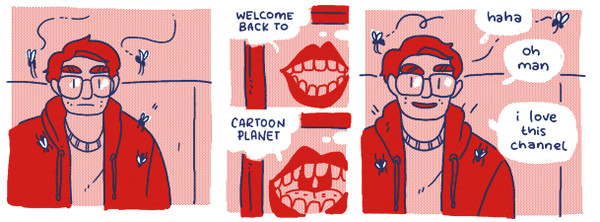 posted 9:45 pm PST
posted 9:45 pm PST |
Permalink
Collective Memory: Short Run


Links to stories, eyewitness accounts and resources concerning the 2013 edition of
Short Run, held November 30 at
Washington Hall in
Seattle.
This entry will continue to be updated for as long as people
.(JavaScript must be enabled to view this email address)
*****
Institutional
*
Convention Site
*
Physical Location
*
Host City
Blog Entries
*
#ShortRun2013 On Tumblr
*
#Short Run Seattle On Tumblr
*
Alec Longstreth
*
Bitch Media
*
Chris Cilla
*
Comics Grinder
*
Eli Draws Stuff
*
Gabrielle Gamboa
*
Jason T. Miles
*
Neoglyphic Media
*
People Of Print
*
Reid Psaltis
*
Seattle Globalist
*
Slog 01
*
Slog 02
*
Spark
*
Sugar Beast
Facebook
*
Event Page
*
Caitlin McGurk 01
*
Caitlin McGurk 02
*
Caitlin McGurk 03
*
Eric Reynolds
*
Link To Photo Set That I Think Also Exists In The Photos Section
*
Random Prom Photo
Miscellaneous
*
Comic For Sale That Debuted At Short Run
*
Comics Prom GIF
*
Short Run 2013 Anthology For Sale
News Stories and Columns
*
Seattle Weekly
Photos
*
Jacq Cohen
*
James Gill Album
*
James Gill Album (Again)
*
Kids Drawing On One Of The Boards/Posters
*
kinokogallery
*
luzvimindauzuri
*
seattleboomking
*
Short Run 01
*
Short Run 02
*
Short Run 03
*
Short Run 04
*
Short Run 05
*
Short Run 06
*
Short Run 07
*
Short Run 08
*
Short Run 09
*
Short Run 10
*
Super Adorable Short Run Head Shot Picture Array
*
theseattlepa
*
Zack Soto Running A DIY Panel
Twitter
*
Event Account
*
#shortrun2013
*
Atoosa Moinzadeh
*
cody pickrodt
*
Jason Fischer
*
Postmoderncore
*
Tugboat Press
*
Wonder And Risk
*
Zack Soto
*****
.(JavaScript must be enabled to view this email address)
*****

*****
*****
posted 9:40 pm PST |
Permalink
Missed It: Zombies Vs. Vampires “Pitch” + Line Art


 posted 7:30 pm PST
posted 7:30 pm PST |
Permalink
Assembled, Zipped, Transferred and Downloaded: Digital News
 By Tom Spurgeon
By Tom Spurgeon
* my hunch is that a big story in the world of on-line comics that may be a bit underplayed right now is
this crowd-funder by Ryan Estrada. Gary Tyrrell explains its importance from his perspective
in this impassioned blog post. It will be close, but I bet it gets over. My personal interest is in different models for work of that type, and what will get supported by crowd-funding and what won't, none of which is settled yet.
* I have a note that says
this issue of Double Barrel is the last and that it's brand new; I can confirm the former from looking at the PR copy and have no reason to disbelieve the latter, but even if it's not I'm sure it's new to someone. It's hard to remember this, but
Double Barrel at its start was seen as some sort of strange, rare beast for simply offering content at a cost, and now that mode is more generally accepted.
* the on-line review site
Books By Its Cover is gearing up for an early 2014 relaunch. Get on board right now with those review copies.
* Shaenon Garrity
revels in the randomness of encountering webcomics solely by letting reader recommendations carry her wherever. Sounds good to me.
* finally,
Alan David Doane is blogging comics industry news again at his Comic Book Galaxy site. Doane is one of the more unique personalities to ever do that, and he has a real broadcaster's touch with collating and presenting information.
posted 7:00 pm PST |
Permalink
If I Were In Brooklyn, I’d Go To This

 posted 6:30 pm PST
posted 6:30 pm PST |
Permalink
If I Were In San Francisco, I’d Go To This

 posted 6:30 pm PST
posted 6:30 pm PST |
Permalink
If I Were In Minneapolis, I’d Go To This

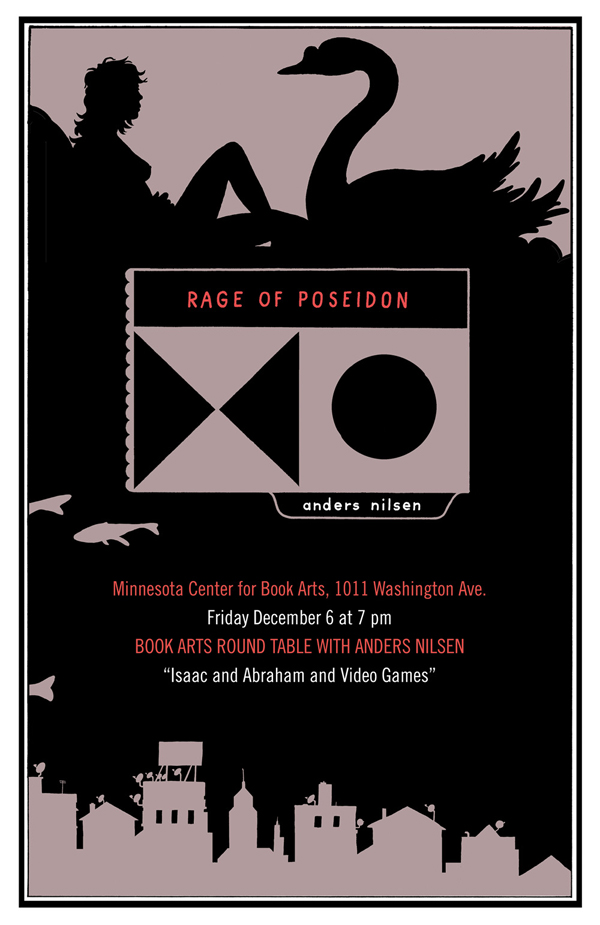 posted 6:30 pm PST
posted 6:30 pm PST |
Permalink
OTBP: More Mundane

 posted 5:00 pm PST
posted 5:00 pm PST |
Permalink
Random Comics News Story Round-Up


* Rob Kirby on
Treasury Of Mini Comics Vol. 1. Domingos Isabellinho on
Pim & Francie. Kevin Huizenga on
Couch Tag.
* not comics: it's funny, and maybe I'm reading it wrong, but
this Megan McArdle article that says collapse of print isn't due in part to lack of production from journalists kind of makes the opposite point to my mind. It's not that people like me that think this believe that journalists aren't technology advantaged over the Woodward/Bernstein era, it's that they're not expected to produce content according to those advantages.
* Rob McMonigal talks to
Alex De Campi.
*
Sonia Harris on guilty pleasures. I'm not sure that we've all the way figured out just how different comics reading is right now for the reduction in stigma regarding their consumption.
* Kathleen David is one of my favorite bloggers about the fan communities that kind of bump up against the world of comics, and about living in a household with comics at its center. She strikes me as a very nice person. A few of you sent along
this long post of hers about Ed Kramer and the resolution to his legal matters, which kind of acts as a general marking-out of the difficult emotional landscape involved for a lot of people there. I'm glad there's a resolution; I do think there were some extremely odd values on display at different times from different quarters through the whole controversy, but I'm glad for the folks closest to it not Kramer that they have a chance to move on.
* not comics: the cartoonist Diana Tamblyn has been contacted enough times by media sources for quotes on female representation in superhero movies that
she finally wrote a lot of those thoughts down into one place.
* Jamaal Thomas
writes about the comic book format, specifically the idea of intermittent purchases as opposed to systematic purchasing.
* finally, I never know which of these things is viewable by the public and which ones aren't, so apologies in advance, but
Laura Park has a cool-looking studio.
posted 4:00 pm PST |
Permalink
Happy 52nd Birthday, Robin Riggs!

 posted 3:00 pm PST
posted 3:00 pm PST |
Permalink
Happy 47th Birthday, Leonard Kirk!

 posted 3:00 pm PST
posted 3:00 pm PST |
Permalink
Happy 48th Birthday, Paul Jenkins!

 posted 3:00 pm PST
posted 3:00 pm PST |
Permalink
Happy 46th Birthday, Claire Wendling!

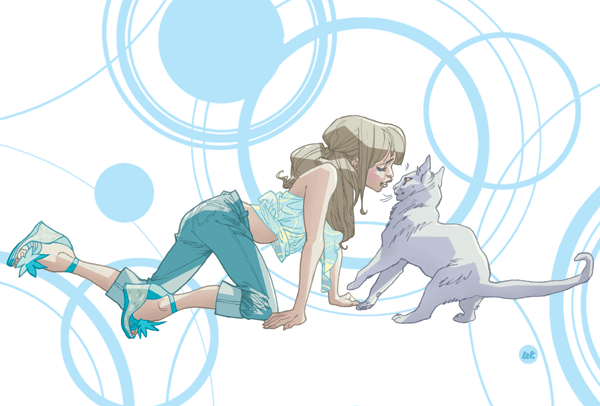 posted 3:00 pm PST
posted 3:00 pm PST |
Permalink
Go, Look: How Zapiro Drew Nelson Mandela

 posted 5:25 am PST
posted 5:25 am PST |
Permalink
MoCCA’s International Guests For 2014 Festival: Joost Swarte, Marion Fayolle, Brecht Vandenbrouke



 Joost Swarte
Joost Swarte,
Marion Fayolle, and
Brecht Vandenbrouke will be the international guests for this Springs MoCCA Arts Festival, according to a release sent out by the organizers today. They were arranged through the festival's relationship with Bill Kartalopoulos.
You can read that press release here:
MoCCAFest.14.2.pdf
Joost Swarte is a giant of comics and design; that's a great get. If you're interested in his work as a comics-maker, the Fantagraphics collection once described to me by the late Kim Thompson as one of the highlights of his career as a publisher is available
here.
Swarte will also have a show at the Society Of Illustrators to coincide with the comics festival.
posted 5:05 am PST |
Permalink
Go, Look: Don Newton Charlton Horror Covers

 posted 5:00 am PST
posted 5:00 am PST |
Permalink
The Never-Ending, Four-Color Festival: Cons, Shows, Events

 By Tom Spurgeon
By Tom Spurgeon
* as I'm typing this line in the middle of the night on Tuesday it looks like TCAF table confirmations are going out. Or at least there are happy people on twitter saying so. It's amazing, but the Spring 2014 -- 2014! -- shows are definitely a take-action distance away in terms of securing rooms and flights. It's pretty much a full-out spring from the last weekend of March until mid-May. Heck, you can score cheap rooms from SPX right now.
*
holy crap, that's a lot of conventions.
*
Daryl Cagle went to China. The next five years are all about non-commercial comics shows, shows in far-off lands and hyper-local events.
* in case you missed it,
WonderCon named its first round of comics guests. That first major Spring convention announcement like that always reorients me to the next year's con calendar in a way that similar news about important Wizard shows does not.
*
fifth year of Genghis Con = best year of Genghis con.
* finally, I don't do a lot of art shows in this column -- there's no reason, I just haven't done them -- but
this one featuring a mounting of Nicolas De Crecy's New York art looks super-cool. That one second to last, yikes.
posted 4:00 am PST |
Permalink
December 4, 2013
 Go, Look: The Incredibly Photogenic Attendees Of Short Run 2013
Go, Look: The Incredibly Photogenic Attendees Of Short Run 2013

 posted 7:40 pm PST
posted 7:40 pm PST |
Permalink
Go, Look: Michael Jordan

 posted 7:30 pm PST
posted 7:30 pm PST |
Permalink
If I Were Near Brussels, I’d Go To This

 posted 6:30 pm PST
posted 6:30 pm PST |
Permalink
If I Were In Portland, I’d Go To This

 posted 6:30 pm PST
posted 6:30 pm PST |
Permalink
Congratulations To Fantagraphics On Making Its Kick-Starter Goal Plus More Than 72,000 Dollars

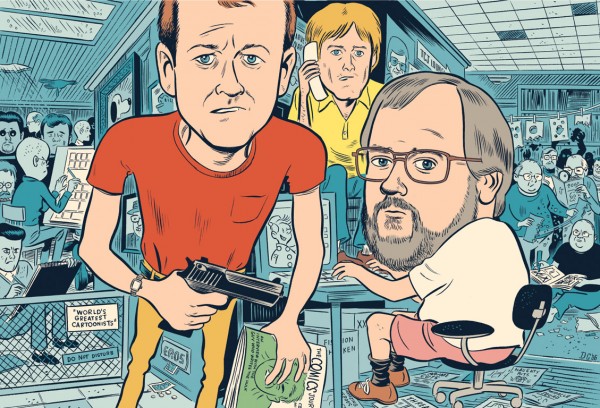
Fantagraphics is a virtuous company with years of displayed excellence to their credit. That Kickstarter was also
extremely well-run. Congratulations to my former employer and to the folks in the office who put that campaign together.
posted 4:50 pm PST |
Permalink
Random Comics News Story Round-Up


* Chris Mautner on
Woman Rebel. Matt Derman on
more 1987 comics. Sean Gaffney on
Soul Eater Vol. 17. Paul O'Brien on
Wolverine And The X-Men Annual #1. J. Caleb Mozzocco on
a bunch of different comics from the comics shop. Henry Chamberlain on
The Lengths. Jeffrey O. Gustafson on the art change in
Ten Grand #5. Camila Barboza on
Picnic Ruined.
*
Sean T. Collins writes at some length on Fantagraphics and PictureBox.
* here's Michael Dooley talking to
Ted Rall. Here's Noah Berlatsky on
Ted Rall and Daily Kos. Here's Ted Rall on
Noah Berlatsky and The Atlantic.
*
Hulk reject crass, cobbled-together, consumer-driven holidays.
* the writer Chris Sims has a list of 10 worst comics-related holiday gifts up
here. There are some lousy gifts out there. You know what's sort of odd now that I think of it? I never got comics anything when I was a kid. I think maybe I got some rubber-dart Spider-Man web shooters for a birthday from another kid, and one year my best pal bought me some old X-Men comics from the local pawn shop, but as far as my parents making comics part of the things that were purchased for me, that never happened.
*
a small group of good-looking comics publications. For some reason, I thought
Sunny was going to end with the second volume.
* finally,
here's Zainab Akhtar at some length on Thought Bubble, which according to the way the comics Internet works was 10,000 years ago.
posted 4:00 pm PST |
Permalink
Happy 44th Birthday, Ron Regé Jr.!

 posted 3:00 pm PST
posted 3:00 pm PST |
Permalink
Happy 43rd Birthday, Chris Mautner!

 posted 3:00 pm PST
posted 3:00 pm PST |
Permalink
Happy 89th Birthday, Sam Glanzman!

 posted 3:00 pm PST
posted 3:00 pm PST |
Permalink
Happy 38th Birthday, Bill Mudron!

 posted 3:00 pm PST
posted 3:00 pm PST |
Permalink
Go, Buy: Bunch Of Julia Wertz Stuff Up At Her Etsy Shop

 Here
Here. There's no corresponding explanation, but I don't recall there ever being a bunch of her art work up at any one time. I used to own like five or six pieces from JR Williams, and one of the reasons is because they were one-page cartoons that people could read and enjoy that way; I would imagine that a lot of Wertz's material would work the same way.
posted 5:00 am PST |
Permalink
December 3, 2013
 There’s An Olivier Schrauwen Comic At The Mould Map 3 Site
There’s An Olivier Schrauwen Comic At The Mould Map 3 Site

 posted 11:05 pm PST
posted 11:05 pm PST |
Permalink
Festivals Extra: WonderCon Announces First Round Of Guests

WonderCon announced its first round of guests a few minutes ago: Rick Burchett, Cliff Chiang, Tony Daniel, Steve Lieber, Franics Manapul, Yanick Paquette, Sara Ryan and Rob Venditti.
Here. Bios
here.
1. This is in many ways basically the formal kick-off to the North American established big-con 2014 season.
2. None of these comics people are bald, and I would have bet $4300 that in any random selection of eight comics pros, one of them would be bald.
3. I am always happy when Steve Lieber gets recognized by the industry he serves as a stalwart community member.
4. Based on item #2, I clearly have a gambling problem.
The show is in Anaheim again this year, and I hope to be there: April 18-20.
posted 11:00 pm PST |
Permalink
Go, Look: Gray City Part One

 posted 10:00 pm PST
posted 10:00 pm PST |
Permalink
Your 2013 SPACE Prize Finalists


The finalists for this Spring's SPACE Prizes, affiliated with the Columbus, Ohio show and I believe one of the longer-running small press prizes going,
has listed its finalists drawn from material displayed at the 2013 show which will be awarded at the 2014 show.
The finalists are, by category:
Graphic Novels
*
Black Rose Book One: Between Worlds, Aaron Minier And Christopher Arndt And Brandon Peat (Self-Published)
*
Burning Building Comix, Jeff Zwirek (Imperial Press)
*
District Comics: An Unconventional History of Washington, DC, Edited By Matt Dembicki (Fulcrum Publishing)
*
Endtime: The Arrival, Gerry Kissell And Tim Kenyon (Capstan Comics)
*
Homesick, Jason Walz (Tinto Press LLC)
*
Little Guardians Book One, Leo Cherolis And Ed Cho (Self-Published)
*
With Only Five Plums, Terry Eisele and Jonathon Riddle (Self-Published)
*
Xoc: The Journey of a Great White, Matt Dembicki (Oni Press)
Generalist
*
Binary Gray #3-4, Chris Charton And Rowel Roque (Assailant Comics)
*
Black Heart #1, Chris Charlton And David Hollenbach (Assailant Comics)
*
Panel: Columbus, Edited By Sean McGurr And Dara Naraghi (Self-Published)
*
Plastic Farm #22, Rafer Roberts (Plastic Farm Press)
*
Radio Free Gahanna #3, Joel Jackson And James Moore (2 Headed Monster Comics)
*
Ragged Rider: Tales of a Cowboy Mummy, Andrew Meyerhoefer And Seth Kumpf (So How 'Bout Comics?)
*
The Signifiers #1-2, Michael Neno (MR Neno Productions)
*
The Trouble w/ Love, Victor Dandridge And Harold Edge (Vantage: Inhouse Productions)
*
Wild Women of the Kitty-Kat Galaxy!, Sean Frost And Rafer Roberts And Wendi Strang-Frost (Hula Cat Comics)
Mini-Comics/Short Story
*
As Eavesdropped Vol. 4, Suzanne Baumann (Fridge Magnet Concoctions)
*
Better Together, Ryan Clayton (Elephant Eater Comics)
*
Blind Spot #2, Joseph Remnant (Self-Published)
* "
Dead Air" from
Dark Horse Comics, Chad Lambert And Apri Kusbiantro (Dark Horse)
*
Death After a Rather Nice Lunch, Christina Wald (Pop-Smoothie)
*
D-Tales #2-3, Tom Davidson (Self-Published)
*
Dutchy Digest #7, Steven Hager And Bruce Rosenberger (Self-Published)
* "
Free City" From
Panel: Columbus, Tony Goins And Craig Bogart (Ferret Press)
* "
Home" From
Panel: Columbus, KT Swartz And Brent Bowman (Ferret Press)
*
Iris, John Steventon (Happy Glyphs Comics)
* "
It Felt Like a Kiss" from
NIX Comics Quarterly #5, James Moore And Joel Jackson (NIX Comics)
*
Paul & Olly, Samantha Kyle (Self-Published)
*
Perpetual Motion, Pam Bliss (Self-Published)
*
Ragged Rider: Eat Lead, Sasparilla Silly, Doodle Dawdlin' & Hustler Horse, Andrew Meyerhoefer And Seth Kumpf (So How 'Bout Comics?)
*
Small Wars of Inconsequential Beings, Jason Hart (Self-Published)
*
Traveler Seeks Gainful Employ from Ladies Chatter, Marta Tanrikulu And Leila Del Duca (Spectare Creative)
* "
Urban Legend" from
District Comics, Chad Lambert And Kevin Czapiewski (Fulcrum Publishing)
Webcomics
*
From Three to Four, Chris Monday, (Flying Weevil Productions)
*
Little Guardians, Lee Cherolis And Ed Cho (Self-Published)
*
Mixed Drink Wednesday, Derek Baxter, Brian Canini & Dave Grant (Drunken Cat Comics)
*
Mutant Elf, Steven Myers (1st Issue Comics)
*
Nextuss: Search for the Ocean Shard Vol. 1, Thomas Hotka And Trey Peterson (515 Comics)
*
Thirty Four, Chris Monday, (Flying Weevil Productions)
*
Zombi Marge Comix, Tim Fuller (Hooha Comics)
posted 9:00 pm PST |
Permalink
Go, Look: Pair Of Tom Galambos Superhero Sketches

 in support of this fundraiser for SAW
posted 8:00 pm PST
in support of this fundraiser for SAW
posted 8:00 pm PST |
Permalink
By Request Extra: Your December 2013 Holiday Season Advocacy Sales And Needed Fundraising Updates

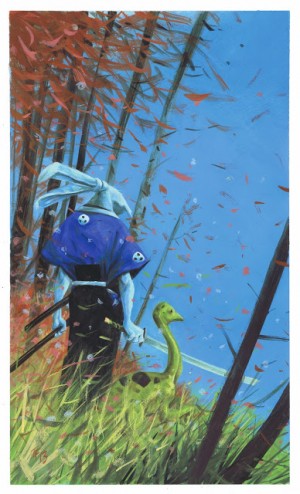 By Tom Spurgeon
By Tom Spurgeon
* we've had a lot of sales with an advocacy element (slight to severe), straight-up fundraisers and calls for attention spring up the last seven days or so. Let me see if I can get most if not all of the major ones into one post. God bless you if have the money and inclination to buy and/or give.
* Dan Nadel
continues his 50 percent off sale at PictureBox in an attempt to lighten up his backstock load heading into a new chapter of his life, one without new front-list PictureBox work.
*
the Fantagraphics kickstarter is heading into its final 24 hours at some point today, maybe even as this post scrolls out on the site. Fantagraphics is a virtuous company with a long history of excellence in its corner of culture, so good on you if you recognized that with a pledge or the pursuit of an incentive. That particular crowd-funder has been
really well run, so you might want to take a second, more selfish look as a consumer looking for special incentives.
* Rina Ayuyang's
highly admirable fundraising efforts on behalf of Philippines typhoon relief have moved into their final round -- there's two or three things there I'd kill for, to be honest with you, so I hope a freelance check comes in soon.
* two other fundraising efforts to benefit groups outside of the comics community were brought to my attention after this was initially posted:
a cartoonist-heavy campaign to benefit charities working with the horrific reality of human trafficking, the writer Ron Marz
arranging eBAy auctions to benefit kids.
* it seems like
a lot of things are still on sale at Drawn and Quarterly -- who are doing super-well, thank you -- although I couldn't tell you if that's a continuation of their holiday sale or just regular bargains. Still, I'd look.
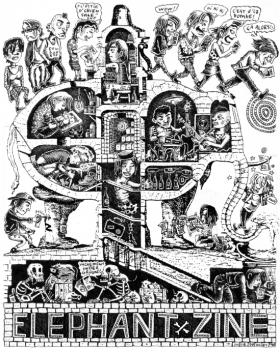
* the Sequential Artists Workshop
is seeking a few thousand dollars in support of its 2014 programs. Tom Hart and Leela Corman seem to me lovely people, and running a school sans wider community support doesn't seem to me to be very easy.
* there are still efforts
going on to raise money via art auction and direct donation for Stan Sakai, the admirable cartoonist and lovely man who despite being fully insured could use some money to bridge the gap between his family's coverage and the money needed for significant home care for his beloved wife Sharon. I am happy to process any direct donations via paypal if that's easier for you than sending money via check -- I'm at
[email protected] via that mechanism, and a few of you have already taken me up on this, for which I'm grateful.
* that super nice man and stalwart presence on the front lines of art- and alt-comics reviewing Rob Clough
could use any tips for his years of service you might want to send his way right now due to a perfect storm of money needs.
* finally, this might just be a friends-only thing, I can't quite tell, but Mark Newgarden and Megan Montague Cash
have set up this Facebook page to facilitate a little sale in support of recent, significant flooding damage.
the image is Tom Fowler's contribution to the Sakai art auction, which he discusses here
posted 7:55 pm PST |
Permalink
Not Comics: Pippi Longstocking Aborted Ghibli Film Imagery

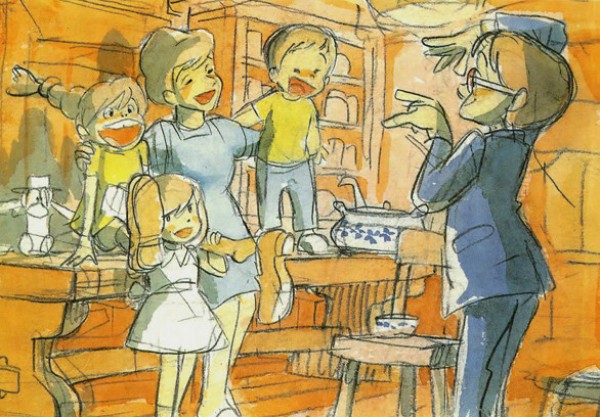 posted 7:50 pm PST
posted 7:50 pm PST |
Permalink
This Isn’t A Library: Notable Releases To The Comics Direct Market


Here are the books that make an impression on me staring at this week's no-doubt largely accurate list of books shipping from Diamond Comic Distributors, Inc. to comic book and hobby shops across North America.
I might not buy all of the works listed here. I might not buy any. You never know. I'd sure look at the following, though.
*****
JUN131140 BLACK IS THE COLOR GN $14.99
This is Julia Gfrorer's fine-looking work, very idiosyncratically told in a way that makes you love cartoonists that take those opportunities and run with them. The work Fantagraphics has been doing with younger alt-cartoonists hasn't been spotlighted to the same degree as their work with archival material has been the last few years, and that's a shame.
 SEP131169 COUCH TAG HC $26.99
SEP131169 COUCH TAG HC $26.99
Jesse Reklaw is near my age and has been around for years and years, so his
Couch Tag isn't the work of a newer cartoonist the way that
Black Is The Color might be. Still, it's another work in a very strong year for Reklaw that included the short he did for Robyn Chapman. An autobiographical tale that gets increasingly unhinged, Reklaw's work also reminded me of some of the emotionally infused alt-manga I read this year: a really unique comics-reading experience.
AUG130114 CBLDF MANGA INTRODUCTION CHALLENGES & BEST PRACTICES TP $15.99
Everything thing CBLDF puts out there is worth checking out. Challenges is a great word here.
OCT130066 HELLBOY IN HELL #5 $2.99
JUL130536 PROPHET #41 [DIG] $3.99
SEP130646 VELVET #2 (MR) [DIG] $2.99
It doesn't seem like a whole lot in the way of genre-driven serial comic books for teenagers and older this time out. The
Velvet is the second issue of the Ed Brubaker/Steve Epting series and is the kind of comic book one reads in an airport when one can't find an issue of
Monocle.
JUL130701 FANTASTIC FOUR BY JOHN BYRNE OMNIBUS HC VOL 02 $125.00
JUL130700 FANTASTIC FOUR OMNIBUS HC VOL 02 NEW PTG $99.99
I have a few friends that buy a lot of material in Marvel's omnibus format, which all by itself makes me suspect that this is one of the stronger ways they present people in the kind of heaving, decaying, Miyazaki-creature like mess that is their books program viewed from the outside-in. The
Fantastic Four material is some of the strongest ever made in superhero comics, and the echoes of it into the '70s and then again with the John Byrne-driven 1980s stuff and even the more recent Millar/Hickman written material are all sort of fun as well.
SEP131012 ADVENTURE TIME ORIGINAL GN VOL 02 PIXEL PRINCESSES $11.99
I always try to keep an eye out for the
Adventure Time material because I don't all the way understand it. I mean, I sort of get that property and those comics when I read them, but the publishing of it with the various series and the variant covers frustrates me in the same way that I don't understand all the different superhero titles with the different adjectives and the revolving artists. Still, I always look.
OCT131190 CAPTAIN EASY HC VOL 04 SOLDIER OF FORTUNE $49.99
I could just have this and be happy with comics this week. I don't actually think as much of this run of material as I do the earlier stuff -- there's a shift in tone that doesn't capture my little-boy imagination the way the more rambunctious stuff in the first two volumes does. Still, Crane was an important figure and when it came to his set pieces,
he never cheated.
OCT131241 FAIRY TALES OF OSCAR WILDE VOL 4 SC NEW PTG $8.99
I would imagine these being a part of every serious comics library, but I'm also guessing that they're a part of relatively few. I once named my publishing "company" -- by which I mean the name on my business cards that I did at the local copy shop during lunch break in Lancaster, Pennsylvania -- after an Oscar Wilde fairy tale.
 OCT131031 BROOKLYN QUESADILLAS GN $15.00
SEP131222 GUY WHO FLOATS GN $12.95
OCT131031 BROOKLYN QUESADILLAS GN $15.00
SEP131222 GUY WHO FLOATS GN $12.95
This is two books about which I know very little -- as opposed to the two Fantagraphics books -- but which I'd also seek out and look over were I in a shop. The latter is what looks like an honest to go self-published OGN (I could be wrong) from a cartoonist with intermittent but real world-publishing credentials. The former is a CAB debut
which looks potentially lovely; I just haven't caught up to it. I have this weird blind spot when it comes to Conundrum works, and they've had a really solid last 36 months or so.
JUL131211 MERMIN HC VOL 02 $19.99
This is a continuation of Joey Weiser's saga, which I didn't know until encountering it on this list had another volume's worth of continuation. I sure as hell would look at it in a store, were I near one today.
SEP130878 MOUSE GUARD LEGENDS O/T GUARD HC VOL 02 $19.95
JUL130786 MOUSE GUARD LEGENDS O/T GUARD VOL 2 #4 $3.50
This is an extremely sturdy franchise that performs well yet still feels under-appreciated. I like looking at it without ever taking that final step to becoming immersed.
OCT131364 ONE PIECE TP VOL 69 $9.99
OCT131360 SLAM DUNK GN VOL 31 $9.99
Add them up to get a hundred.
One Piece is of course the most popular series of significant length regular published right now, while
Slam Dunk is to modern manga series what the show
Oz is to modern cable drama: a series that allowed for other series but is sort of not paid attention to itself. Okay, that's probably not the best comparison. Still, basketball manga! Incredibly, painstakingly incremental basketball manga! The conclusion to an English translation of a really fun, incredibly and painstakingly incremental basketball manga!
OCT131189 COMICS JOURNAL LIBRARY TP VOL 08 EC ARTISTS $28.99
I hate that the fine craftsmen that wrote and drew the EC book are becoming signposts for old and outdates ways of doing and looking at comics outside of the superhero norm. A lot of those folks were very thoughtful artists, and this
TCJ generated book can take you into what many of them were thinking.
SEP131230 ENCYCLOPEDIA OF EARLY EARTH GN $23.00
I've always thought that the fact that so many best-of-year lists find themselves published so early works at the detriment of the art form -- at least as much as best-of-year lists matter. One reason this isn't a bigger deal, I think, is that most of the material that fits into "best of" parameters -- prestige projects -- come out from publishers that really make sure those books are out in time for at least the holiday buying season and are well known to those gatekeepers. This Isabel Greenberg book strikes me as the first book in some time that might have slipped past the attention of critics that would like it very much in best-of-year ways.
*****
The full list of this week's releases, including some titles with multiple cover variations and a long, impressive list of toys and other stuff that isn't comics,
can be found here. Despite this official list there's no guarantee a comic will show up in the stores as promised, or in all of the stores as opposed to just a few. Also, stores choose what they carry and don't carry so your shop may not carry a specific publication. There are a lot of comics out there.
To find your local comic book store,
check this list; and for one I can personally recommend because I've shopped there, albeit a while back,
try this.
The above titles are listed with their Diamond order code in the first field, which may assist you in finding comics at your shop or having them order something for you they don't have in-stock. Ordering through a direct market shop can be a frustrating experience, so if you have a direct line to something -- you know another shop has it, you know a bookstore has it -- I'd urge you to consider all of your options.
If I failed to list your comic, that's because I hate you.
*****

*****
*****
posted 7:45 pm PST |
Permalink
OTBP: The Dormitory

 posted 7:40 pm PST
posted 7:40 pm PST |
Permalink
Go, Bookmark: Jacob Covey Is Building An LB Cole Gallery

 posted 7:30 pm PST
posted 7:30 pm PST |
Permalink
Go, Look: Moebius Jimi Hendrix Mini-Gallery

 posted 6:30 pm PST
posted 6:30 pm PST |
Permalink
Go, Look: Headline Comics #27

 posted 5:00 pm PST
posted 5:00 pm PST |
Permalink
Random Comics News Story Round-Up


* Alex Dueben talks to
Zeina Abirached.
* missed it:
here's a nice process post from Kevin Huizenga on moving from blank page to first, rough layout. I think Dylan Horrocks is the one who found that one and posted it to his Facebook feed.
* Tim Gruar on
From Earth's End.
* there's a petition movement to shut down a suburban Seattle anime con
here. I'm all for the pressing of legal solutions to legal issues and I'm all for the pressing of extra-legal solutions to highly regrettable activities that may fluster legal solutions; I'm always a little flummoxed when the two seem to cross streams, and there's really no way to express that without looking like you're making an allowance for potentially hideous behavior. It kind of reminds me of 25 years ago and the movement to codify better behavior on college campuses: it was a goal everyone but the most churlish supported, but the incidents which granted the moves agency and legitimacy seemed to far out-strip the proposed response.
*
I always enjoy Mike Mignola's thick-waisted Batman. And I'm always happy to see Kool Moe Dee, no matter who draws him;
Jonny Negron makes it even better.
* missed
the president's smart purchase of Crockett Johnson from the
terribly comics-friendly Politics and Prose.
* I'm not sure if
this post is public, but it's nice that Shannon Wheeler gets so much enjoyment out of the Too Much Coffee Man Opera being performed where friends and family can see it.
* finally,
Derf sums up 2013. He also
advises the youngs.
posted 4:00 pm PST |
Permalink
Happy 43rd Birthday, Joel Priddy!

 posted 3:00 pm PST
posted 3:00 pm PST |
Permalink
Happy 40th Birthday, Scott Morse!

 posted 3:00 pm PST
posted 3:00 pm PST |
Permalink
Happy 62nd Birthday, Régis Loisel!

 posted 3:00 pm PST
posted 3:00 pm PST |
Permalink
Happy 49th Birthday, R. Sikoryak!

 posted 3:00 pm PST
posted 3:00 pm PST |
Permalink
Happy 53rd Birthday, Geof Isherwood!

 posted 3:00 pm PST
posted 3:00 pm PST |
Permalink
By Request Extra: D+Q Sale Extended

 posted 2:30 am PST
posted 2:30 am PST |
Permalink
Go, Look: Matt Baker Profiled

 posted 2:00 am PST
posted 2:00 am PST |
Permalink
By Request Extra: Comics Criticism Stalwart Rob Clough Could Use A Donation, If You’re So Inclined


No one plows into the body of alternative and arts comics and reviews until there's nothing left standing like Rob Clough. If you've ever enjoyed or benefited from his work,
now might be the time to toss him a dollar or two. Thanks for considering it; he's a very nice man, and has a valuable role in the modern comics culture.
posted 1:00 am PST |
Permalink
December 2, 2013
 Go, Look: Groan World
Go, Look: Groan World

 posted 9:55 pm PST
posted 9:55 pm PST |
Permalink
Missed It: Ryan Sands Of Youth In Decline Announces 2014 Subscription Drive For Its Frontier Title





The boutique comics publisher Youth In Decline, owned and run by Ryan Sands,
announced its 2014 subscription drive for its flagship solo-anthology Frontier over the long holiday shopping weekend.
According to the subscription-offer post, there will be four issues of the publication in 2014. Three of the creators have been announced. Issue #3 in February will feature three comics from the German cartoonist Sascha Hommer. Issue #4 in April/May will be a monograph featuring new work from Ping Zhu, a Brookly-based illustrator. Issue #5 will come out in September a be a Risograph-printed comic from Sam Alden. Issue #6, due in November, is yet-to-be announced; Sands told
CR he is hoping for one of two artists and should be able to announce this person in early 2014.
The subscription offer gets you all four issues and various "goodies" including a nice membership card. It also, one guesses, provides Youth In Decline with some operating capital, a way to ballpark print runs, and a mailing list for future endeavors. I liked the first two issues of
Frontier quite a bit and am generally bullish on Sands as a publisher. I think this would make a find Christmas present for anyone interested in this realm of comics.
images are, in order: from Ping Zhu; from Sam Alden; two from Sascha Hommer with the second being the issue's back cover
posted 9:50 pm PST |
Permalink
Go, Look: Fun Steve Ditko Art

 posted 9:45 pm PST
posted 9:45 pm PST |
Permalink
By Request Extra: Mark & Megan’s Disaster Relief Sale


Those nice people Mark Newgarden and Megan Montague Cash
are running a rolling sale for the next six weeks with proceeds to go to repair recent flood damabe. They are also highly-skilled creative people and I hope some of you will go check out what they might be offering. It doesn't seem like a massive plea for outside help to forestall dire, immediate consequences as much as a way for friends and well-wishers to have a way to help out during an unexpected, act-of-god style tough spot, but that kind of circumstance is just as real and worth noting and supporting efforts to help.
posted 9:40 pm PST |
Permalink
Go, Look: Jingle Jangle Comics #13

 posted 9:35 pm PST
posted 9:35 pm PST |
Permalink
Bundled Extra: Strangehaven To Return In Spring 2014


Gary Spencer MIllidge
announced earlier today that his
Strangehaven series will make a return to publication in Spring 2014, this time from Soaring Penguin Press as a feature in their anthology
Meanwhile.... It's been several years since the one-time foundational self-published comic book series has seen print, and Millidge engages that delay, why he isn't self-publishing, and his attempt to contact long-ago subscribers in the short essay available through that initial link. I'm always happy when cartoonists return to the act of making comics.
posted 9:34 pm PST |
Permalink
Just A Reminder That No One Understands Hulk

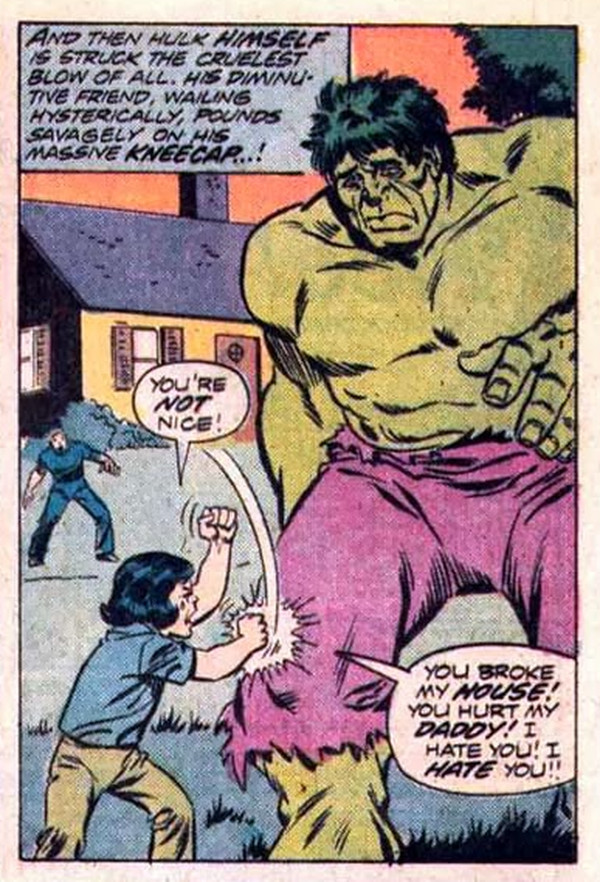 nothing this side of Casper and his constant begging for friends got me emotionally in my single digits than sad-face hulk
posted 9:33 pm PST
nothing this side of Casper and his constant begging for friends got me emotionally in my single digits than sad-face hulk
posted 9:33 pm PST |
Permalink
Go, Look: Horror Of The Gag

 posted 9:25 pm PST
posted 9:25 pm PST |
Permalink
Your Salon.com Unforgettable Graphic Novels Of 2013


The on-line magazine institution
Salon has posted one of those multiple-hit slideshows featuring "unforgettable" graphic novels of 2013. I have proven them wrong by having to go back and look at the list a couple of times to make the following:
*
Boxers & Saints, Gene Luen Yang (First Second)
*
Calling Dr. Laura, Nicole J. Georges (Houghton Mifflin Harcourt)
*
Encyclopedia of Early Earth, Isabel Greenberg (Bond Street Books)
*
How To Fake A Moon Landing, Darryl Cunningham (Abrams)
*
Opera Adaptations, P. Craig Russell (NBM)
*
RASL, Jeff Smith (Cartoon Books)
*
The Case of Charles Dexter Ward, H.P. Lovecraft and I.N.J. Culbard (Abrams)
*
The Freddie Stories, Lynda Barry (D+Q)
*
The Property, Rutu Modan (D+Q)
*
When David Lost His Voice, Judith Vanistendael (Abrams)
The writer Laura Miller makes a very strong case for the Greenberg.
posted 9:20 pm PST |
Permalink
Go, Look: The Spitzner Museum’s Wax Woman

 posted 9:15 pm PST
posted 9:15 pm PST |
Permalink
Go, Read: Kevin Melrose On The Ed Kramer Plea

The superior link-blogger Kevin Melrose
has a smart write-up on yesterday's plea agreement taken by Dragon*Con co-founder Ed Kramer on charges related to child molestation. Apparently, Kramer maintains his innocence and the DA was worried about the cost of the prosecution and housing the apparently perpetually ailing prisoner.
The Kramer affair became an interesting story within comics and the other fan cultures served by the mega-successful Atlanta convention in that there was some fairly nasty butting of heads over whether or not the convention had any culpability for anything that Kramer did or should have been expected to pursue an end to that profitable partnership with greater speed and deliberation than they ended up being able to accomplish. I would imagine that many of the people that pursued greater attention to Kramer's legal troubles feel vindicated by the guilty plea and dismayed by the lack of jail time in that plea. I would imagine that many of those whose primary advocacy was for not taking Kramer's bad deeds out on the convention feel satisfied this has reached a point of closure.
posted 9:10 pm PST |
Permalink
Not Comics: Uncle Wiggily And The Sleds

 posted 9:05 pm PST
posted 9:05 pm PST |
Permalink
By Request Extra: Various Updates, Sales

 By Tom Spurgeon
By Tom Spurgeon
* you're starting to see Stan and Sharon Sakai-related art auction images pop up on-line, like
this one from Eric Henson (pictured) and
this one from Tom Fowler. I am still happy to process any random donations as best as I can through my paypal account at
[email protected]. There is a lot of affection out there for the Sakais, and there should be: he's a classy pro, they're a lovely couple, and Sakai's comics are much loved by a couple of generations of indy comics readers now.
* the very successful Fantagraphics kickstarter
is rounding into its final hours.
* finally, PictureBox Inc.
is running a 50 percent off sale linked to its closure at the end of the month. I will write about this more than once in the days ahead, but there are a
lot of fine books there and you likely
won't be able to get at several of them after this month.
posted 9:00 pm PST |
Permalink
Go, Look: Living In The Now

 posted 8:55 pm PST
posted 8:55 pm PST |
Permalink
James Vance Publishes Text To Will Eisner Presentation He Made Back On Billy Ireland Opening Weekend

 Here
Here. I quite liked Vance's presentation sitting in the audience, both for its content and the shift in style from the heavily Ted Talk influenced multimedia presentations that dominated the academic conference preceding the festival. Eisner is probably due a massive reconsideration over the next decade as we shift away from the last generation of those that have a personal stake with the man and in his work and the work more or less begins to stand alone.
posted 8:50 pm PST |
Permalink
Go, Look: Jane McGuinness

 posted 7:40 pm PST
posted 7:40 pm PST |
Permalink
Richard Thompson Surgery Delayed; Best Wishes To Him

 Let's hope the complications sort themselves out, and that in the meantime the morphine works
Let's hope the complications sort themselves out, and that in the meantime the morphine works.
posted 7:35 pm PST |
Permalink
Go, Look: Henry Aldrich #4

 posted 7:30 pm PST
posted 7:30 pm PST |
Permalink
Go, Look: Random Gag Cartoon Mini-Gallery

 posted 6:30 pm PST
posted 6:30 pm PST |
Permalink
OTBP: Mis(h)adra

 posted 5:00 pm PST
posted 5:00 pm PST |
Permalink
Random Comics News Story Round-Up

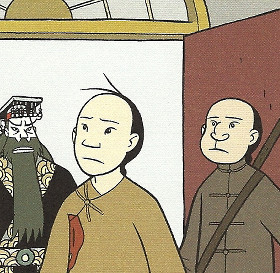
* Chris Mautner talks to
Gene Luen Yang.
*
Zack Kruse announces a new position.
* Jake Austen on
Little Tommy Lost. Sterg Botzakis on
The Troublemakers. Shea Hennum on
Sabertooth Swordsman. May on
Supercakes.
* missed it:
Batman is a hoarder.
* that
HG Peter revival I was hoping for from Dan Nadel's attention to the artist in one of those Abrams book never quite materialized, damn it.
* I'm not doing a regular "Bundled" this week, so I think I'll mention this preview of the next Mark Millar series
here. Millar does a lot of things well with his mainstream comic book series, but other than his attention to the choreography (in the broadest sense) of his fight scenes and the taste he's displayed in choosing collaborators not a lot of his strengths interest me.
*
I never know what to do with links like this when they're sent to me.
* Neil Cohn
would like you to know that comics are a language all of their own. (via Bob Levin)
* several folks have reminded me that Matthew Carasella
has a bunch of photos up from the cartoonist/comics reception preceding Art Spiegelman's retrospective at the Jewish Museum.
* Mike Lynch
has a short post on working TV/film actors with cartooning chops; follow the link to work by Fred Gwynne.
* finally,
hooray for Wonder Woman!
posted 4:00 pm PST |
Permalink
Happy 42nd Birthday, Grant Goggans!

 posted 3:00 pm PST
posted 3:00 pm PST |
Permalink
Happy 52nd Birthday, Don Simpson!

 posted 3:00 pm PST
posted 3:00 pm PST |
Permalink
Happy 61st Birthday, John Warner!

 posted 3:00 pm PST
posted 3:00 pm PST |
Permalink
Happy 54th Birthday, Mike Saenz!

 posted 3:00 pm PST
posted 3:00 pm PST |
Permalink
All Best Wishes To Richard Thompson On Hip Replacement Surgery That Begins… Well, Right About Now


The cartoonist broke his hip yesterday. Details
here.
posted 2:30 am PST |
Permalink
Ed Kramer Pleads Guilty; Avoids Entirely More Jail Time

Dragon*Con co-founder Ed Kramer, whose lengthy avoidance of charges related to child molestation became enough of an issue that the convention finally ended its relationship with Kramer and reformed elsewhere,
has submitted a plea of guilty to three of six charges facing him and will serve the remainder of his sentence under home arrest. The plea came as Kramer was about to have his first week in court on the charges.

It is believe that the medical conditions claimed by Kramer throughout much of the delay in prosecution may have been a factor in giving him house arrest.
Each plea was linked to an alleged victim, to whom Kramer must also pay $100,000 each in restitution. A five-year concurrent sentence for each charge was recommended by the District Attorney; Kramer has already served 26 of those months.
Kramer was arrested in 2000 after two boys, then teenagers, came forward about an inappropriate to their relationship. The third accuser joined the case in 2003.
Various breaks in the lengthy holding pattern established by Kramer in part by paying hefty legal fees with monies earned from the increasingly successful were a) his arrest in Connecticut while in the company of another underaged male, b) a push by some member of the comics and fan communities served by Dragon*Con to draw attention to the convention's relationship with Kramer, which may have help lead to that relationship being severed.
Kramer avoids a potential life sentence on two of the charges and a minimum 25 years on others if he had gone to trial and been convicted.
The former convention organizer is now a criminal sex offender.
posted 1:30 am PST |
Permalink
December 1, 2013
 Dan Nadel Announces End To PictureBox, Inc.
Dan Nadel Announces End To PictureBox, Inc.

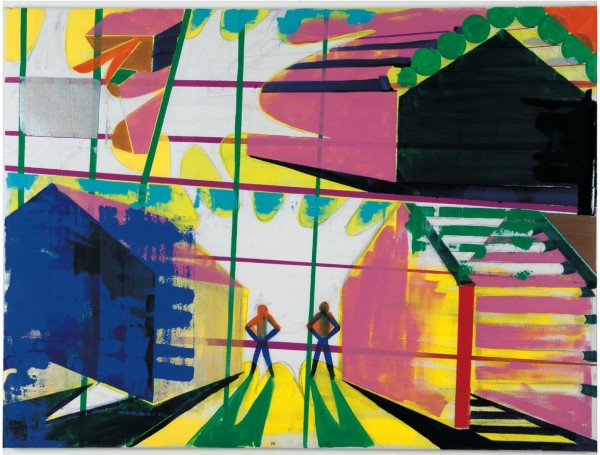

In
a statement today at his site, Dan Nadel officially announced the end of PictureBox, Inc., his longtime and currently thriving publishing company featuring comics, art books, and books related to music. There will be no more books published by the company. Nadel plans to liquidate as much backstock as possible
through a holiday sale starting today, and then maintain backorders and backstock for as long as it's necessary to fulfill those obligations.
The closure ends a thirteen-year run by Nadel as a publisher. Before becoming PictureBox Inc. in 2004, Nadel was publishing a full slate under his own name, including the well-regarded publication
The Ganzfeld.
PictureBox was a major force within alternative comics for nearly the entirety of its existence. Among the cartoonists published there were CF, Lauren Weinstein, Frank Santoro, Yuichi Yokoyama, Renee French, Ben Jones, Paper Rad, Mat Brinkman, Gengoroh Tagame, Sammy Harkham, Anya Davidson, Brian Chippendale, Julie Doucet, Blutch, Brandon Graham, Jonny Negron, Matthew Thurber and Gary Panter. Non-cartoonists published through the company include Jesse Pearson, Richard Kern, Nicole Rudick, and of course the band Wilco, the subjects and participants of
The Wilco Book, which launched Nadel as a publisher and book-packager in 2004 to great success. It should enjoy a significant legacy as a publisher of comics with a fine arts imprimatur including in broad terms the aesthetic that came to prominence via the Providence-based art collective Fort Thunder, as a company that worked closely with a targeted distributor, and for advancing the cause of non-rigidly commercial manga.
The publisher shared in the Los Angeles Times Book Prize for Best Graphic Novel, 2012 for
Everything Together by its author Sammy Harkham. It won the Grammy for Best Packaging Design for the Wilco Album
A Ghost Is Born and Nadel won an NEA Design Innovation award for
The Ganzfeld. PictureBox works were nominated for a couple of Eisners according to Nadel, and one Ignatz.
While the company was primarily known for books, it also published the comic book series
Cold Heat, some works in tabloid form, and the oversized but not-bearing-a-spine
Goddess Of War. It also facilitated the on-line publication of certain works from its core artists.
Nadel also frequently distributed related material through
the PictureBox Inc. web site.
The official final book to be published by Picturebooks is
Infomaniacs, by Matthew Thurber. "That's a good one to end on," Nadel told
CR.
Nadel told
CR that the decision was personal rather than professional, and that the idea of closing the company was instigated by him for reasons related to the course of his life rather than forced by business concerns. According to the writer, editor and designer, PictureBox was a viable concern right up to the end, and could have been continued at its current level of success in perpetuity. He was the company's only full-time employee: art direction was freelanced and the artists that worked for PictureBox did so through standard publishing contracts. It did allow for Nadel's living in New York City, and, he stressed, could have continued.
What Nadel couldn't guarantee, and which had become a major concern having recently become a father, is insulation from the ups and downs of publishing: that he could somehow always make it so that that every book would work, that he could somehow avoid one or two books that might take a heavy chunk of his personal savings when they failed to meet sales expectations. This was further complicated by the changing state of publishing as print continues to feel the effects of a growing market for digital and the impact that new methods of production and new priorities had on those devoted to print. While Nadel claimed a fantastic relationship with his book distributor and a solid one with the shows he regularly attended, including TCAF and
SPX in terms of sales at those shows, his penetration into the bulk of North American comic shops was limited due to the nature of the material he published.
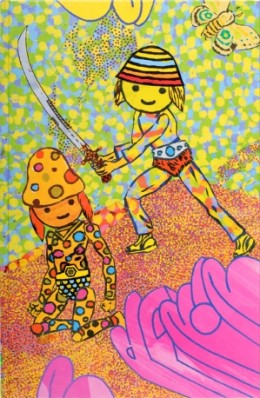
Rather than take on a business partner or a co-publisher or even a devoted money-manager at the urging of some of his friends and those he published -- at least according to what some of them told
CR they suggested as a possible course of action -- and rather than change the way in which he selected work, Nadel decided to end PictureBox while in all but those terms of financial certainty worked the way he wanted it to. Nadel will have published over 20 books in 2013, some perhaps due to the fact that he wanted to get as many of his planned projects out the door as possible before the closure. Only one book, a Paul Pope art book called
The Road To Battling Boy and planned for early 2014, made it to a formal announcement and on-line bookseller phase and was subsequently canceled.
Nadel has transitioned to this point with what he claims is the full support those he publishes; certainly this publication could not find a dissenting, angry voice upset with Nadel's conduct in this last stage of his publishing company's existence. News of PictureBox's imminent closure had been an item of discussion within alt-comics circles as long ago as the week before Small Press Expo. Nadel kept the closure away from industry news sources in the hopes of maintaining a sense of continuity through his Fall plans. He had originally wanted to announce the day after Comic Arts Brooklyn, and then pushed that back to today to continue some work on behalf of a book or two.
Nadel has also working behind the scenes with the cartoonists and with his fellow publishers to find as many homes for planned publishing projects as is possible for him to find. Those publishers have been reluctant to speak on the record about what projects they may pursue or even which one they've already landed, so that should become part of the regular publicity cycle company to company. My understanding, though, is that this won't be a 100 percent industry assumption of planned books, and that some are still looking for a home that might provide some of the things they enjoyed about their working relationship with Nadel. It should be worth noting how the overall publishing landscape changes with PictureBox's demise.
In addition to the Pope book, it's expected that Sammy Harkham, CF and Frank Santoro had books in rough-stage planning with the publisher. An anthology follow-up to
The Passion Of Gengoroh Tagame called
Massive had been discussed but not to the point of being listed, and is currently orphaned. Ryan Holmberg's Ten-Cent Line was designed to continue past its initial pair of books with PictureBox; a statement to
CR about the publisher's demise indicates that line has not found a new home as of yet.
CR spoke briefly to the alternative-comic book publishers Fantagraphics and D+Q. "I haven't lined up anything proper but I've spoken to a few folks and am certainly interested in most of what Dan published," Eric Reynolds, Associate Publisher at Fantagraphics, told
CR when asked of the possibility that a specific planned project of two might end up at that publisher. Drawn And Quarterly declined to respond at this time to a similar inquiry.
*****

The comics critic Joe McCulloch, whose time writing about the art form roughly parallel's the existence of Nadel's publishing house and who currently writes for Nadel at TCJ.com, spoke to
CR about the company's legacy in terms of his overall impression of Nadel's artistic efforts rather than a list of books. "I find it very difficult to qualify my feelings about PictureBox with necessities like continuum; certainly they were not the first outlet to work vigorously toward an appreciation of certain vagrant strains of comics art. Highwater is an obvious predecessor for its embrace of Fort Thunder artists, 'noise' comics, design-conscious packaging, vigorous distillations of youthful superhero iconography down to pleasurable marks on paper, panel-by-panel -- all 'PictureBox things,' per our limited collective memory.
"But PictureBox was not just publishing; it was Dan and his artists, and the conversation they promulgated. It was
Art Out of Time -- which they didn’t even publish -- and
Comics Comics, and Frank Santoro setting up his longboxes at the show table, and Dan annotating the treasures he'd disinter from the Joe Koch warehouse, and all of these things that would seem to inform the books PictureBox would publish -- and if they didn't, the books and the treasures and the conversation would somehow, nonetheless, interrelate. There are not many publishers in as small a field as comics that cannot benefit, somehow, from this -- so logically, so obviously that to behave like PictureBox did is not to 'behave' at all, because that would construe as an affirmative choice, instead of being in the way a thing is being if it is breathing and blinking and lifting leg to a mallet's touch. It is
bravura, but hardly
non sequitur, to imagine that PictureBox was born for Tumblr so eagerly that it suffered three years' wait for contemporaneity, huffing and wheezing, to catch itself up.
"That it is now gone, as a publishing concern, is painful and awful and a considerable loss, but its imprint on the rhetoric of comics has guaranteed its legacy, which too will eventually fade into subtext and assumption and received wisdom, yes, but you can't say that of most things ostensibly dead and gone."
****
A limited bibliography for PictureBox Inc. reveals its diverse publishing slate and certain cartoonists' names that repeat.
2013
*
Blow Your Head: A Diplo Zine: Volume Two: New York, Shane McCauley and Diplo
*
Coming Together, Coming Apart, Lumi Tan and Julia Chiang
*
Contact High, Jesse Pearson and Richard Kern
*
DNA Failure: British Weapon Comics, Jon Chandler, Leon Sadler and Stefan Sadler
*
Drawings, Chris Martin
*
Dyes, Naomi Fry and Sam Moyer
*
Gold Pollen and Other Stories, Seiichi Hayashi and Ryan Holmberg
*
Infomaniacs, Matthew Thurber
*
In the Good Name of the Company: Artworks and ephemera produced by or in tandem with the Colby Printing Company... Jan Tumlir, Chris Michlig and Brian Roettinger
*
Last of the Mohicans, Shigeru Sugiura and Ryan Holmberg
*
Men's Group: The Video, David Kramer, Nicole Rudick, Daniel Nadel and Ben Jones
*
Mere, C.F.
*
Nudity Today, Jesse Pearson
*
Paintings, Ross Simonini, Glenn O'Brien, Monica Ramirez-Montagut and Eddie Martinez
*
Pompeii, Frank Santoro
*
School Spirits, Anya Davidson
*
So Long, Silver Screen, Edward Gauvin and Blutch
*
Sun Ra & Ayé Aton: Space, Interiors and Exteriors 1972, John Corbett and Glenn Ligon
*
The Mysterious Underground Men, Osamu Tezuka and Ryan Holmberg
*
Walrus: Brandon Graham's All Bum Album, Brandon Graham
*
Wes Lang, James Frey and Wes Lang
*
World Map Room, Yuichi Yokoyama
*
The Passion of Gengoroh Tagame: Master of Gay Erotic Manga, Anne Ishii, Chip Kidd, Graham Kolbeins, Edmund White and Gengoroh Tagame
2012
*
Blow Your Head: A Diplo Zine: Volume One: Dancehall, Shane McCauley and Diplo
*
De Profundis, James Jarvis
*
Everything Together: Collected Stories, Sammy Harkham
*
Interiors, Michael Ned Holte, Jonas Wood, Ana Vejzovic Sharp
*
Kramers Ergot 8, Sammy Harkham, Gary Panter, Ben Jones and C.F.
*
Negron, Jonny Negron
*
Sara Greenberger Rafferty: Remote, Claire Barliant and Sara Rafferty
*
Yield to Temptation, Todd Reas James
2011
*
1 800 Mice, Matthew Thurber
*
Cockfighter, Charles Willeford and Jesse Pearson
*
Color Engineering, Yuichi Yokoyama
*
Garden, Yuichi Yokoyama
*
Odd Future: Golf Wang, Nick Weidenfeld, Michael Schmelling and Odd Future
*
Sediment, C.F.
*
Return of the Repressed: Destroy All Monsters 1973-1977, Nicole Rudick, Mike Kelley, Daniel Nadel and Cary Loren
2010
*
Cold Heat, Frank Santoro and Ben Jones
*
H Day, Renee French
*
heads, 44, Mat Brinkman
*
If 'n Oof, Brian Chippendale
*
I Was Looking for a Street, Charles Willeford and Luc Sante
*
My New New York Diary Julie Doucet and Michel Gondry
*
Powr Mastrs Vol. 3, CF
2009
*
Cold Heat Special #6 Frank Santoro and Ben Jones
*
Cold Heat Special #9 Lane Milburn, Frank Santoro and Ben Jones
*
Multiforce, Mat Brinkman
*
NADA Catalogue, NADA Art Fair
*
Sports Book, Jonas Wood
2008
*
Cola Madnes, Gary Panter
*
Crazy Town, Paul Gondry
*
Eddie Martinez & Chuck Webster, Geoffrey Young, Joao Ribas, Eddie Martinez and Chuck Webster
*
For the Love of Vinyl: The Album Art of Hipgnosis, Storm Thorgerson, Aubrey Powell, Paula Scher and Peter Blake
*
Gary Panter, Gary Panter
*
Goddess of War, Lauren Weinstein
*
Mail Order Monsters, Kathy Grayson
*
Monster Men Bureiko Lullaby, Takashi Nemoto
*
MYTHTYM, Trinie Dalton
*
New Painting & Drawing, Ben Jones
*
Overspray: Riding High with the Kings of California Airbrush Art, Norman Hathaway and Mike Salisbury
*
Powr Mastrs Vol. 2, C.F.
*
Prospect.1 New Orleans, Barbara Bloemink, Lolis Elie, Claire Tancons and Dan Cameron
*
The Magnificent Excess of Snoop Dogg, Nick Stillman, Lisa Ruyter and Katherine Bernhardt
*
Travel Yuichi Yokoyama
*
You'll Like This Film Because You're In It, Michel Gondry
2007
*
1-800-Mice #1, Matthew Thurber
*
Cartoon Workshop Pig Tales Digest, Paper Rad
*
Some Kinda Vocation, Cheryl Dunn
*
Maggots, Brian Chippendale
*
Powr Mastrs Vol. 1, CF
*
Real Fun: Polaroids from the Independent Music Landscape, Ashod Simonian
*
Storeyville, Frank Santoro
*
Wipe that Clock Off Your Face, Taylor McKimens, Joe Grillo, Brian Belott and Donald Baechler
*
Yuichi Yokoyama: New Engineering, Yuichi Yokoyama
2006
*
Cold Heat #1, Ben Jones and Frank Santoro
*
Elle-Humour by Julie Doucet
*
Gore, Jason Rothenberg and Black Dice
*
Me a Mound, Trenton Doyle Hancock
*
Ninja, Brian Chippendale
*
Nog a Dod: Prehistoric Canadian Psychedoolia Marc Bell
*
The Trenton Doyle Handbook Vol. 1, Trenton Doyle
2005
*
Free Radicals, Mat Brinkman, Christopher Forgues, Josh Simmons and Fiona Smyth
*
Paper Rad, B.J. And Da Dogs, Ben Jones and Paper Rad
2004
*
The Wilco Book, Michael Schmelling, Fred Tomaselli and Wilco
Nadel also published two magazine series:
2006-2008
*
Comics Comics
2000-2008
*
The Ganzfeld
*****
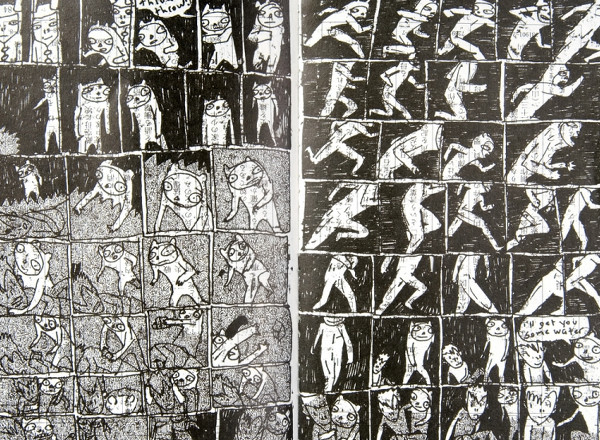
*****
Contacted by
CR, a small number of the cartoonists with whom Nadel has worked and a few of his peers in publishing provided their reactions to the news of PictureBox's closure and its legacy in terms of alternative comics publishing.
Anne Koyama
"I'm very sad to hear this news.
"I love Dan's line, people may not remember that in when I started the company, I had intended Koyama Press to be more of an art book publisher but due partially to the closing in 2009 of two of the only art book stores in Toronto, I shifted to more comics.
"From Ben Jones and Yuichi Yokoyama to Sammy Harkham to the black and white zines, I can always find interesting work at PictureBox. Artists such as Anya Davidson and Johnny Negron getting a voice there is wonderful too.
"In my limited experience, I find people don't 'get it' when you try to do more than one thing. In my case, doing the odd art book, zine, print, installation as well as the comics elicits a sort of puzzled reaction. I've never understood this, I think you can have a cohesive line with a very diverse catalog. I have wondered sometimes whether PictureBox suffered from that reaction, too.
"Of all of the comic publishers out there, I feel a bit of a kinship to Dan's company because we seem to have somewhat similar interests when it comes to art stuff. I certainly don't mean to compare the companies as he has so many 'heavy hitters' in comics, but Dan's sensibility is not foreign to me.
"I have emptied my wallet more than once at Dan's table. I'm not looking forward to the void that is left once the press is gone."
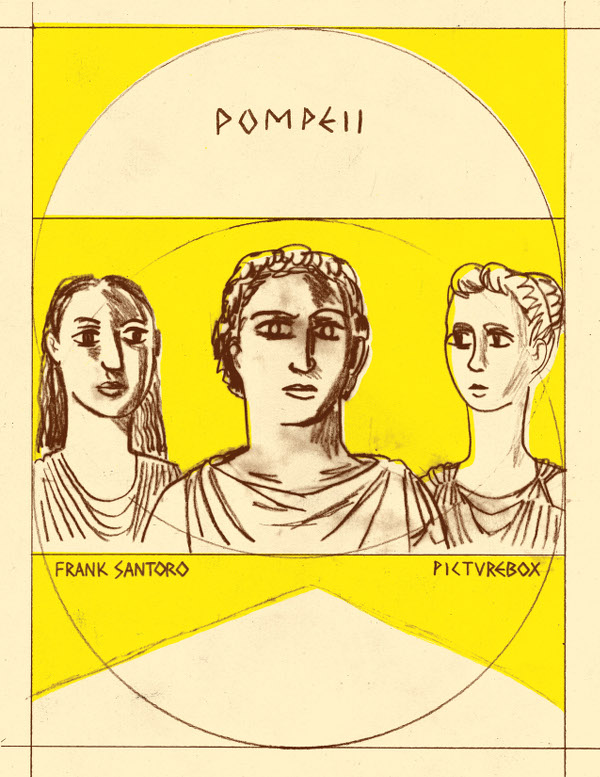 Frank Santoro, Pompeii, Storeyville and Cold Heat
Frank Santoro, Pompeii, Storeyville and Cold Heat
"Dan's run as a publisher was like the most amazing kick off return for a touchdown that I've ever seen. The line was like the Pittsburgh Steelers in the late 1970s. A real force. I thought of Mat Brinkman as Jack Lambert. I thought of myself as Franco Harris. Dan is Chuck Noll.
"Dan is a great hands-off publisher who knows how to get what he wants out of his artists. He can be tough, though. Like with what kind of books he wants to make and how he wrangles personalities. I think that toughness is necessary. I admire that about him.
"I'm going to ponder what's next. Take some time off. Maybe I'll move to France."
Sammy Harkham, Everything Together and Kramers Ergot 8
"Dan is great to work with, thorough and present and accountable all through the process, from conception of the idea to selling the product. His line is unequaled as far as I'm concerned, one of the most exciting publishing houses in the World. It was a great honor to publish with them. PictureBox created an awesome context within the wider world of culture for comics and for marginalized works in general to exist in. Nadel is a real professional, and while it is sad to see him move on, I appreciate what he did for comics as a publisher, and am excited to see what he does next. Nothing lasts.
"I currently don't have a publisher. When I have a project ready, I guess l'll figure something out. The industry depresses me."
Tom Devlin, Drawn And Quarterly
"Is it funny or sad that it never seems like a total shock when a small publisher (especially what is essentially a one man operation) shuts down. I hate to see any publisher that I like shut down but I am very sympathetic to why one would cease operation. I think anyone who has started publishing comics in the past ten years has pretty much picked the most artistically rich time and the worst economic time to do so. PictureBox's comics line was certainly closest to my own personal interests in comics (Fort Thunder, classic and modern Japanese comics) so I will miss that. Certainly no other comics or art publisher is going to be as agressive in smearing the lines between comics and fine art as Dan was with PictureBox.
"Dan's taste is impeccable and he searched deep into comics to find some great stuff that I really can't imagine anyone else publishing. I loved being woken up and puzzled by his art books choices alongside his comic choices. Nobody is going to replace that. I hope Dan continues to package comic stuff and return to criticism though because as
that guy he's been indispensable to how any of us read comics in the modern era. Dan has always had this sideline as a critic and I think he's been one of the most valuable in the most recent comics era. His interest in revisiting a lot of ignored genre work from the early and mid-20th century being a particularly important part of how we read comics today."
Anne Ishii, The Passion Of Gengoroh Tagame
"It was awesome working with a sleep-deprived stay-at-home dad with the loudest most annoying dog on earth and no staff. But seriously, Dan is a consummate editor, who is in love with his artists and good art, with a healthy sense for staying in the background or stepping up as necessary. I'm super duper bummed he can't keep up PictureBox, for more than personal reasons."
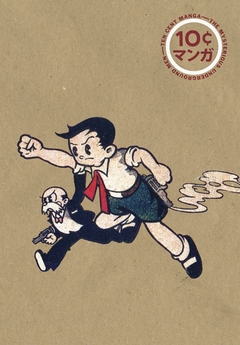 Ryan Holmberg, The Ten-Cent Line
Ryan Holmberg, The Ten-Cent Line
"Dan was great. Patient. Open. Supportive. Punctual. Pliable! Then firm when it was important. Those were my first books, so I thank him deeply for helping me getting started and working out some rookie stupidity.
"Of course, I was totally heartbroken when I found out. We had built up the idea for two series, and then the project was aborted after its first steps. Between Ten-Cent Manga and Alternative Manga Masters, the goal was to get many of the classics of manga history out in quality English editions.
"While Dan and I had spoken agreements for the next two books in the Ten-Cent line, only one contracted book got cancelled, which was the second volume in the Alternative Manga line. That is being picked up by another publisher (cannot say who just yet), so the Alternative Manga line will continue in another form.
"I am not so hopeful about the Ten-Cent line, since the idea is unconventional, even if major artists were to be part of it. And that, for me, is the real bummer about PictureBox stopping. Dan's adventurism might have landed him in financial trouble, but it also meant he was willing to do interesting books that otherwise would not get published. Also, in the Ten-Cent line, we were planning on doing some books that were kind of in the public domain but not really -- Dan was willing to explore that grey zone without legal assurances... I am not sure any other publisher would do that, which means some truly special books will probably now never see the light of day. No one will ever know what they missed out on, but let me tell you that PictureBox stopping is really a set-back for manga publishing in general.
"But if another publisher is out there and liked the Mohicans and Mysterious Underground Men books, I am ready to go."
Eric Reynolds, Fantagraphics Books
"I really admire Dan and what he built, and how he positioned his books more to the greater art world than just the comic book world. He has great taste and he's a great writer and editor. Picturebox was and is a noble endeavor."
Lauren Weinstein, The Goddess Of War
"It was way too easy working with Dan on
The Goddess Of War. He gladly agreed to print a large format soft-cover-book that was a mixture of sci-fi fantasy and military history that was written by a woman who had no precedent for that kind of work. He paid for a press sheet so I could pick the right pantone. He dealt with all my neuroses about finishing the book and really got behind it. It makes me sad that Picturebox is going to end, because Dan did this for so many people, like Gary Panter, Ben Jones, and CF who have become incredibly influential cartoonists. I wish a big pot of money would fall from the sky to help him out. I hope he can find some other publishing outlet, because who else is going to wholeheartedly support the deeply weird shit?"
*****
Dan Nadel has recently taken a full-time position with ARTBOOK/D.A.P. as their "Key Account Sales Director." This was Nadel's distributor while at PictureBox. He starts December 9th. "I know and love the company." A book he coauthored with Norman Hathaway,
Dorothy and Otis Shepard: Designing the American Dream is due from HarperCollins in Fall 2014. That same season he will curate an exhibition at the RISD Museum of Art: "What Nerve! Alternative Figures in American Art 1960-present," which he told
CR will feature "Forcefield, Jack Kirby, Gary Panter, the Hairy Who, Destroy All Monsters and others."
Nadel also promised to keep his hand in with comics as a writer about the art form and as co-editor of the
TCJ.com web site, a position he holds with Timothy Hodler. Nadel accepted that position in 2010 and started work there in 2011 after closing down the
Comics Comics web site. He told
CR that ending PictureBox should free him up to write more frequently and perhaps even more freely for the web site.
*****

*****
*****
posted 9:30 pm PST |
Permalink
Go, Look: The Cartoonist

 posted 4:00 pm PST
posted 4:00 pm PST |
Permalink
Go, Look: Wander

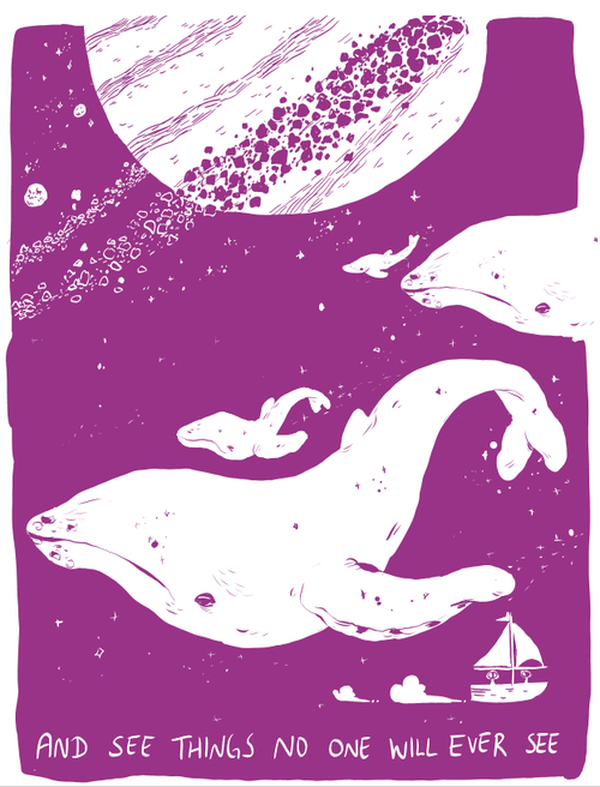 posted 3:50 pm PST
posted 3:50 pm PST |
Permalink
Go, Read: Rachel Dukes On Uncredited Use Of Art

I found fairly fascinating
this post by Rachel Dukes where she follows a popular cartoon she posted and what traffic the credited and uncredited versions received. The frustrating thing about this is I'm not sure there's much you can do except note it -- but it's also extremely important you make the kind of protest she's making. One of the big canards of digital culture is that certain behaviors are locked in stone and unchanging; this is so untrue it's not even funny, and you start to notice such changes if you pay attention for more than a few years at a time. I've been putting material up on-line since 1994 and the way and the extent to which certain material has been used over the years has changed a lot. So keep pushing; change isn't just possible, I'd say that change of some sort is inevitable, even when it comes to the way people use other folks' material.
posted 3:45 pm PST |
Permalink
Go, Look: Aaron Kuder

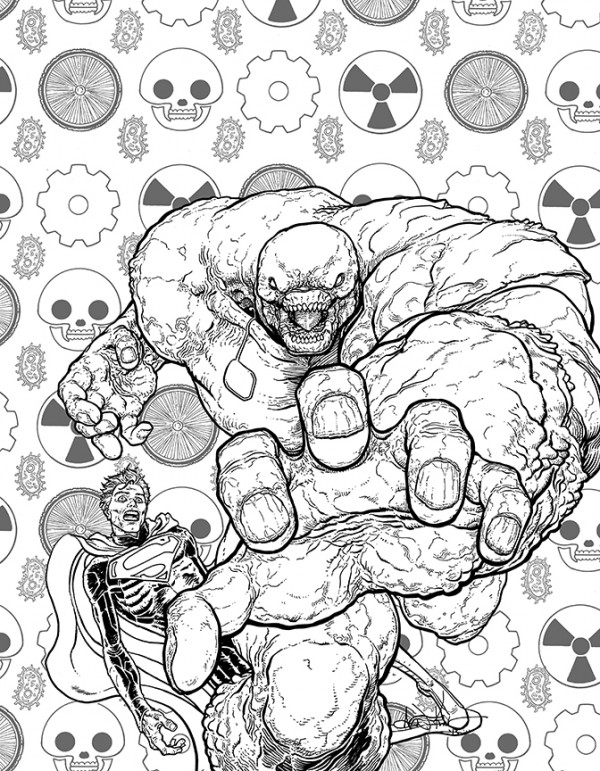 posted 3:40 pm PST
posted 3:40 pm PST |
Permalink
Go, Look: Ben Sea Prints

 posted 3:30 pm PST
posted 3:30 pm PST |
Permalink
Comics By Request: People, Projects In Need Of Funding
 By Tom Spurgeon
By Tom Spurgeon

* please consider
donating to the fund started for Stan and Sharon Sakai. I am more than happy to process any paypal donations at
[email protected] -- I've done that before for older cartoonists that don't have Internet access, and am happy to do it again. A few of you have already availed yourself of this option. Thank you. The Sakais are lovely people.
* last few days to get on board with
the Fantagraphics kickstarter. That was a really well run crowd-funder.
* there is also not a lot of time left to buy books
through Drawn and Quarterly's big sale.
*
this Top Of The Line crowd-funder is in its last week. That might be over its goal by the time this rolls out.
*
this giant poster project may not be comics, but a few of you have passed it along.
*
Frank Beddor is the latest name creator to take a signature work to crowd-funding.
* finally, Periscope Studios is full of good people, and
this crowd-funder to do art books out of the studio is a solid one, I think.
posted 3:25 pm PST |
Permalink
Go, Look: Classic Stanley/Tripp Little Lulu Story

 posted 3:20 pm PST
posted 3:20 pm PST |
Permalink
Go, Look: Some Ross Andru Art Work

 posted 3:10 pm PST
posted 3:10 pm PST |
Permalink
Random Comics News Story Round-Up


* R. Fiore on
In Love With Art. Taylor on
Cartoonshow.
* some nice person employed by Ryerson University profiles
Barbara Postema.
* I mentioned in my Billy Ireland that the academic conference that preceded the festival proper is the kind of place where you can pick up quality ideas and have the panels play off of one another; I'm not the only who does this, apparently, as Brian Cremins
dug into another scholar's presentation for an idea on how to approach Grass Green.
* Maggie Thompson's sale of her collection once shared with her late husband Don Thompson
brought in over $800K; I hope she gets to do something worthwhile with the money she gets out of that after all fees and taxes are paid and I'm sure this will be so.
*
he was played on the TV show by Eddie Bracken.
* totally missed
this piece on Mumbai lending libraries by Ryan Holmberg. Holmberg is doing really interesting work.
* Andrea Tsurumi
writes about a particularly cool-sounding night at Ben Katchor's ongoing symposium.
* finally,
this is very funny and so, I think, is
this.
posted 3:05 pm PST |
Permalink
Happy 42nd Birthday, John Hankiewicz!

 posted 3:00 pm PST
posted 3:00 pm PST |
Permalink
Happy 27th Birthday, RJ Casey!

 posted 3:00 pm PST
posted 3:00 pm PST |
Permalink
Happy 89th Birthday, Jack Davis!

 posted 3:00 pm PST
posted 3:00 pm PST |
Permalink
Happy 47th Birthday, Andy Mangels!

 posted 3:00 pm PST
posted 3:00 pm PST |
Permalink
Daily Blog Archives
November 2019
October 2019
September 2019
August 2019
July 2019
Full Archives


